Form 6-K NATIONAL GRID PLC For: May 19
SECURITIES AND EXCHANGE COMMISSION
Washington D.C. 20549
FORM 6-K
REPORT OF FOREIGN ISSUER
PURSUANT TO RULE 13a-16 OR 15d-16
OF THE SECURITIES EXCHANGE ACT OF 1934
Date: 19 May 2022
Commission File Number: 001-14958
NATIONAL GRID plc
(Registrant’s Name)
1-3 Strand
London WC2N 5EH, England
(Registrant’s Address)
Indicate by check mark whether the registrant files or will file annual reports under cover of Form 20-F or Form 40-F.
☒ Form 20-F ☐ Form 40-F
☒ Form 20-F ☐ Form 40-F
Indicate by check mark if the registrant is submitting the Form 6-K in paper as permitted by Regulation S-T Rule 101(b)(1): ☐
Indicate by check mark if the registrant is submitting the Form 6-K in paper as permitted by Regulation S-T Rule 101(b)(7): ☐
Indicate by check mark whether the registrant by furnishing the information contained in this Form is also thereby furnishing the information to the Commission pursuant to Rule 12g3- 2(b) under the Securities Exchange Act of 1934. ☐ Yes ☒ No
If “Yes” is marked, indicate below the file number assigned to the registrant in connection with Rule 12g3-2(b): n/a
Please see Exhibit 99.1 Announcement sent to the London Stock Exchange on 19 May 2022 — 'Full Year Results 2021/2022'
SIGNATURE
Pursuant to the requirements of the Securities Exchange Act of 1934, the registrant has duly caused this report to be signed on its behalf by the undersigned, thereunto duly authorized.
NATIONAL GRID plc | |||||||||||
| By: | /s/Ceri Jamond _______________________ | ||||||||||
| Ceri Jamond Senior Assistant Company Secretary | |||||||||||
Date: 19 May 2022
EXHIBIT INDEX
Exhibit No. | Description | ||||
Exhibit 99.1 Announcement sent to the London Stock Exchange on 19 May 2022 — 'Full Year Results 2021/2022' | |||||
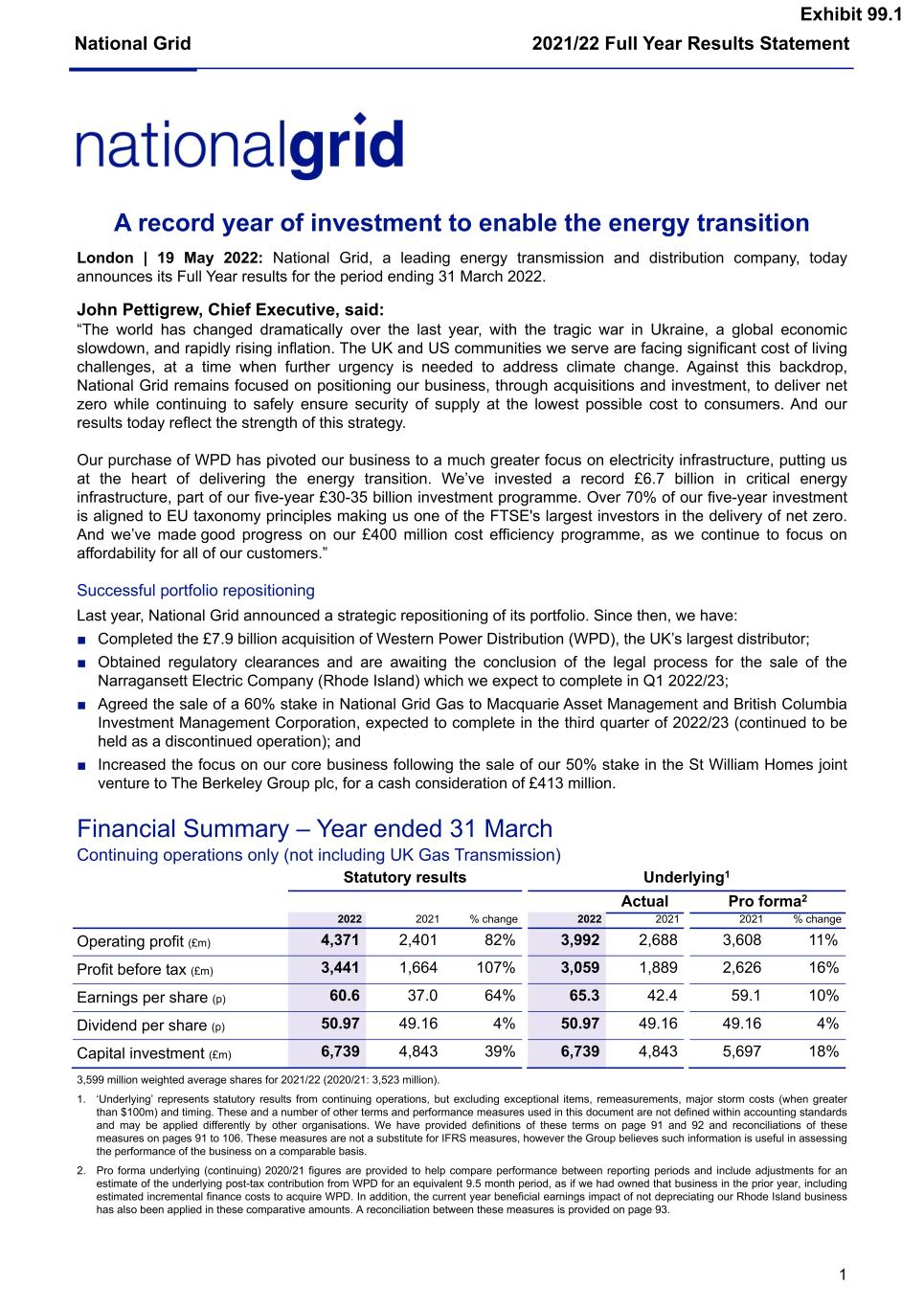
National Grid 2021/22 Full Year Results Statement 1 A record year of investment to enable the energy transition London | 19 May 2022: National Grid, a leading energy transmission and distribution company, today announces its Full Year results for the period ending 31 March 2022. John Pettigrew, Chief Executive, said: “The world has changed dramatically over the last year, with the tragic war in Ukraine, a global economic slowdown, and rapidly rising inflation. The UK and US communities we serve are facing significant cost of living challenges, at a time when further urgency is needed to address climate change. Against this backdrop, National Grid remains focused on positioning our business, through acquisitions and investment, to deliver net zero while continuing to safely ensure security of supply at the lowest possible cost to consumers. And our results today reflect the strength of this strategy. Our purchase of WPD has pivoted our business to a much greater focus on electricity infrastructure, putting us at the heart of delivering the energy transition. We’ve invested a record £6.7 billion in critical energy infrastructure, part of our five-year £30-35 billion investment programme. Over 70% of our five-year investment is aligned to EU taxonomy principles making us one of the FTSE's largest investors in the delivery of net zero. And we’ve made good progress on our £400 million cost efficiency programme, as we continue to focus on affordability for all of our customers.” Successful portfolio repositioning Last year, National Grid announced a strategic repositioning of its portfolio. Since then, we have: ■ Completed the £7.9 billion acquisition of Western Power Distribution (WPD), the UK’s largest distributor; ■ Obtained regulatory clearances and are awaiting the conclusion of the legal process for the sale of the Narragansett Electric Company (Rhode Island) which we expect to complete in Q1 2022/23; ■ Agreed the sale of a 60% stake in National Grid Gas to Macquarie Asset Management and British Columbia Investment Management Corporation, expected to complete in the third quarter of 2022/23 (continued to be held as a discontinued operation); and ■ Increased the focus on our core business following the sale of our 50% stake in the St William Homes joint venture to The Berkeley Group plc, for a cash consideration of £413 million. Financial Summary – Year ended 31 March Continuing operations only (not including UK Gas Transmission) Statutory results Underlying1 Actual Pro forma2 2022 2021 % change 2022 2021 2021 % change Operating profit (£m) 4,371 2,401 82% 3,992 2,688 3,608 11% Profit before tax (£m) 3,441 1,664 107% 3,059 1,889 2,626 16% Earnings per share (p) 60.6 37.0 64% 65.3 42.4 59.1 10% Dividend per share (p) 50.97 49.16 4% 50.97 49.16 49.16 4% Capital investment (£m) 6,739 4,843 39% 6,739 4,843 5,697 18% 3,599 million weighted average shares for 2021/22 (2020/21: 3,523 million). 1. ‘Underlying’ represents statutory results from continuing operations, but excluding exceptional items, remeasurements, major storm costs (when greater than $100m) and timing. These and a number of other terms and performance measures used in this document are not defined within accounting standards and may be applied differently by other organisations. We have provided definitions of these terms on page 91 and 92 and reconciliations of these measures on pages 91 to 106. These measures are not a substitute for IFRS measures, however the Group believes such information is useful in assessing the performance of the business on a comparable basis. 2. Pro forma underlying (continuing) 2020/21 figures are provided to help compare performance between reporting periods and include adjustments for an estimate of the underlying post-tax contribution from WPD for an equivalent 9.5 month period, as if we had owned that business in the prior year, including estimated incremental finance costs to acquire WPD. In addition, the current year beneficial earnings impact of not depreciating our Rhode Island business has also been applied in these comparative amounts. A reconciliation between these measures is provided on page 93. Exhibit 99.1
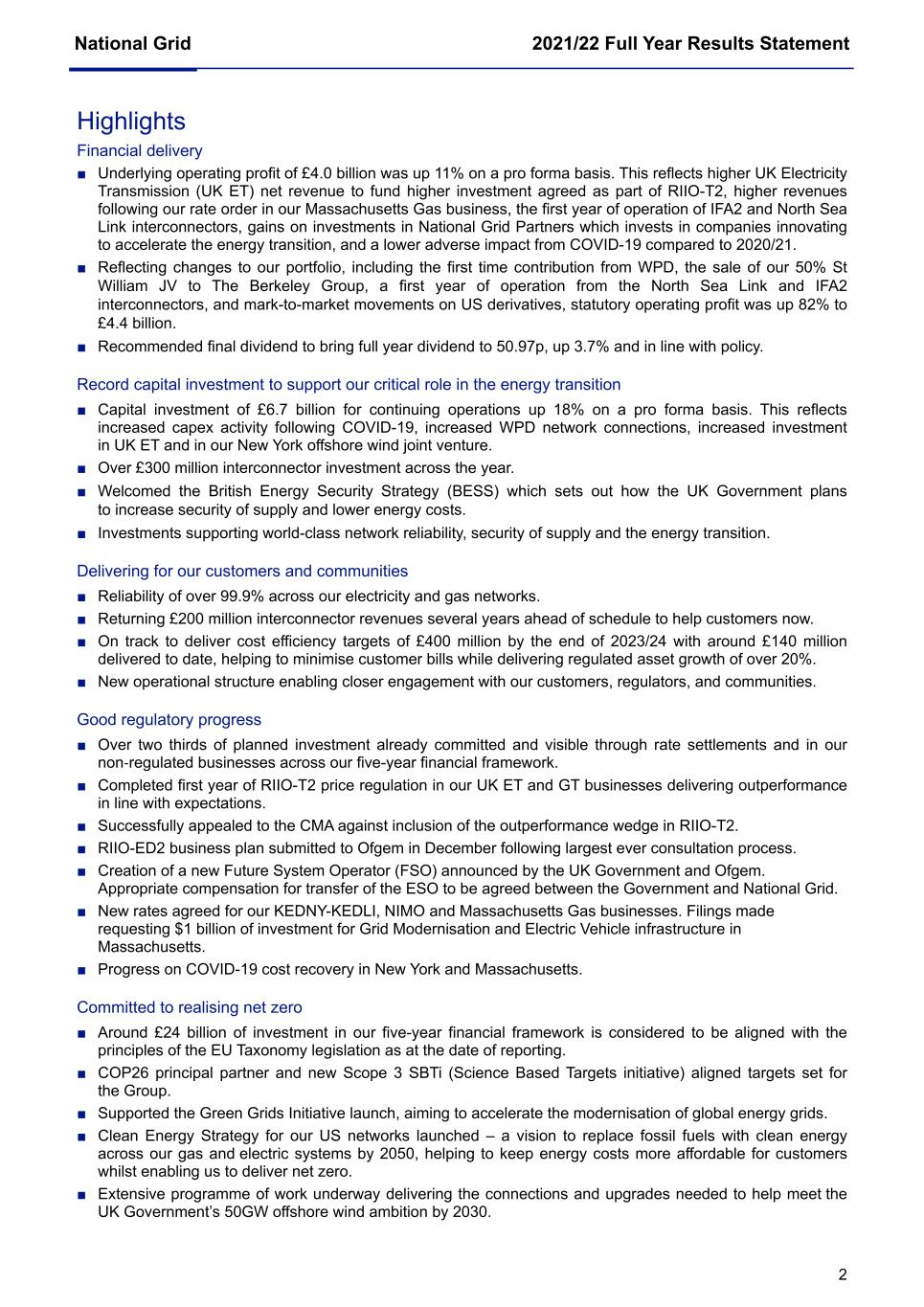
National Grid 2021/22 Full Year Results Statement 2 Highlights Financial delivery ■ Underlying operating profit of £4.0 billion was up 11% on a pro forma basis. This reflects higher UK Electricity Transmission (UK ET) net revenue to fund higher investment agreed as part of RIIO-T2, higher revenues following our rate order in our Massachusetts Gas business, the first year of operation of IFA2 and North Sea Link interconnectors, gains on investments in National Grid Partners which invests in companies innovating to accelerate the energy transition, and a lower adverse impact from COVID-19 compared to 2020/21. ■ Reflecting changes to our portfolio, including the first time contribution from WPD, the sale of our 50% St William JV to The Berkeley Group, a first year of operation from the North Sea Link and IFA2 interconnectors, and mark-to-market movements on US derivatives, statutory operating profit was up 82% to £4.4 billion. ■ Recommended final dividend to bring full year dividend to 50.97p, up 3.7% and in line with policy. Record capital investment to support our critical role in the energy transition ■ Capital investment of £6.7 billion for continuing operations up 18% on a pro forma basis. This reflects increased capex activity following COVID-19, increased WPD network connections, increased investment in UK ET and in our New York offshore wind joint venture. ■ Over £300 million interconnector investment across the year. ■ Welcomed the British Energy Security Strategy (BESS) which sets out how the UK Government plans to increase security of supply and lower energy costs. ■ Investments supporting world-class network reliability, security of supply and the energy transition. Delivering for our customers and communities ■ Reliability of over 99.9% across our electricity and gas networks. ■ Returning £200 million interconnector revenues several years ahead of schedule to help customers now. ■ On track to deliver cost efficiency targets of £400 million by the end of 2023/24 with around £140 million delivered to date, helping to minimise customer bills while delivering regulated asset growth of over 20%. ■ New operational structure enabling closer engagement with our customers, regulators, and communities. Good regulatory progress ■ Over two thirds of planned investment already committed and visible through rate settlements and in our non‑regulated businesses across our five-year financial framework. ■ Completed first year of RIIO-T2 price regulation in our UK ET and GT businesses delivering outperformance in line with expectations. ■ Successfully appealed to the CMA against inclusion of the outperformance wedge in RIIO-T2. ■ RIIO-ED2 business plan submitted to Ofgem in December following largest ever consultation process. ■ Creation of a new Future System Operator (FSO) announced by the UK Government and Ofgem. Appropriate compensation for transfer of the ESO to be agreed between the Government and National Grid. ■ New rates agreed for our KEDNY-KEDLI, NIMO and Massachusetts Gas businesses. Filings made requesting $1 billion of investment for Grid Modernisation and Electric Vehicle infrastructure in Massachusetts. ■ Progress on COVID-19 cost recovery in New York and Massachusetts. Committed to realising net zero ■ Around £24 billion of investment in our five-year financial framework is considered to be aligned with the principles of the EU Taxonomy legislation as at the date of reporting. ■ COP26 principal partner and new Scope 3 SBTi (Science Based Targets initiative) aligned targets set for the Group. ■ Supported the Green Grids Initiative launch, aiming to accelerate the modernisation of global energy grids. ■ Clean Energy Strategy for our US networks launched – a vision to replace fossil fuels with clean energy across our gas and electric systems by 2050, helping to keep energy costs more affordable for customers whilst enabling us to deliver net zero. ■ Extensive programme of work underway delivering the connections and upgrades needed to help meet the UK Government’s 50GW offshore wind ambition by 2030.
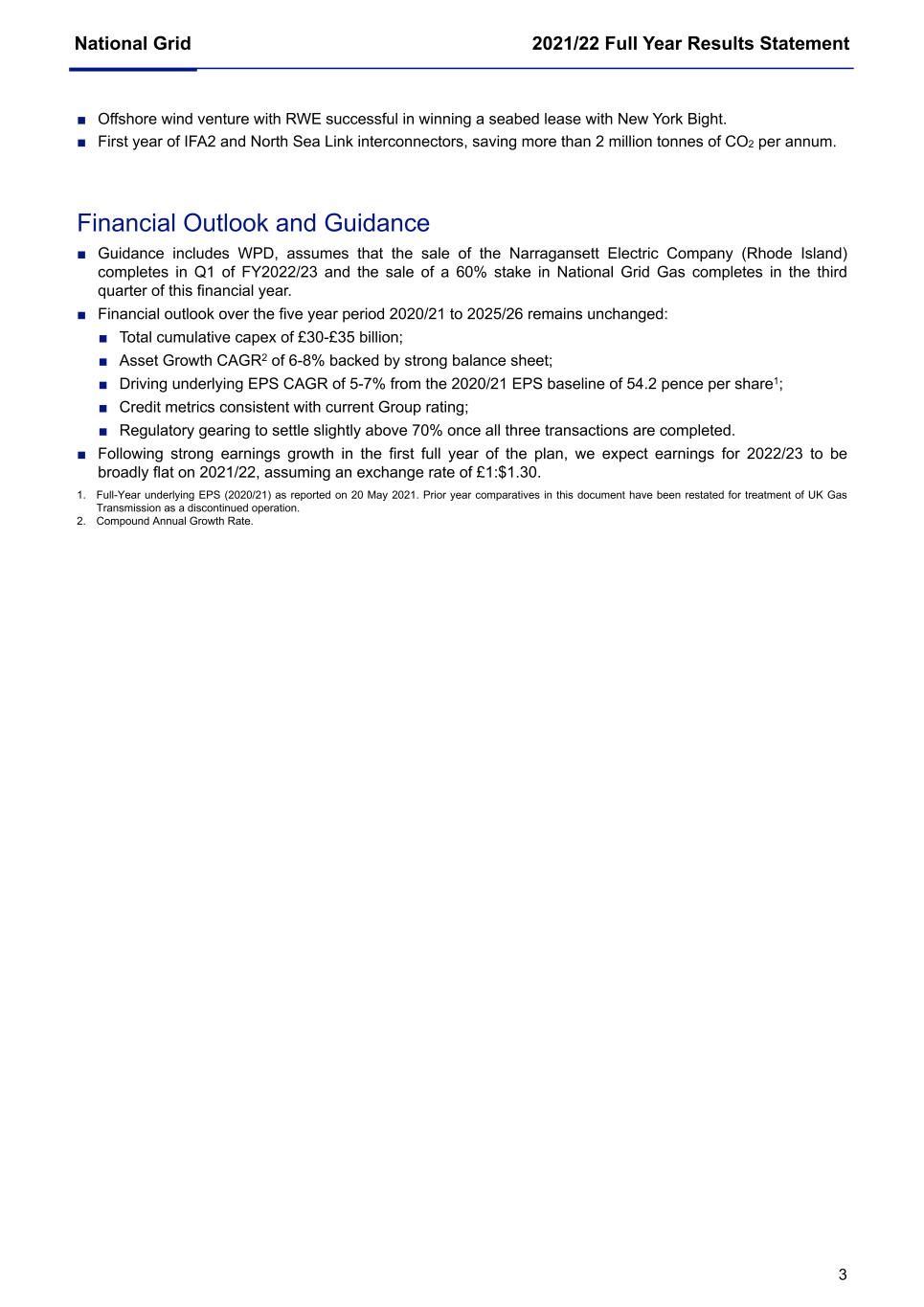
National Grid 2021/22 Full Year Results Statement 3 ■ Offshore wind venture with RWE successful in winning a seabed lease with New York Bight. ■ First year of IFA2 and North Sea Link interconnectors, saving more than 2 million tonnes of CO2 per annum. Financial Outlook and Guidance ■ Guidance includes WPD, assumes that the sale of the Narragansett Electric Company (Rhode Island) completes in Q1 of FY2022/23 and the sale of a 60% stake in National Grid Gas completes in the third quarter of this financial year. ■ Financial outlook over the five year period 2020/21 to 2025/26 remains unchanged: ■ Total cumulative capex of £30-£35 billion; ■ Asset Growth CAGR2 of 6-8% backed by strong balance sheet; ■ Driving underlying EPS CAGR of 5-7% from the 2020/21 EPS baseline of 54.2 pence per share1; ■ Credit metrics consistent with current Group rating; ■ Regulatory gearing to settle slightly above 70% once all three transactions are completed. ■ Following strong earnings growth in the first full year of the plan, we expect earnings for 2022/23 to be broadly flat on 2021/22, assuming an exchange rate of £1:$1.30. 1. Full-Year underlying EPS (2020/21) as reported on 20 May 2021. Prior year comparatives in this document have been restated for treatment of UK Gas Transmission as a discontinued operation. 2. Compound Annual Growth Rate.
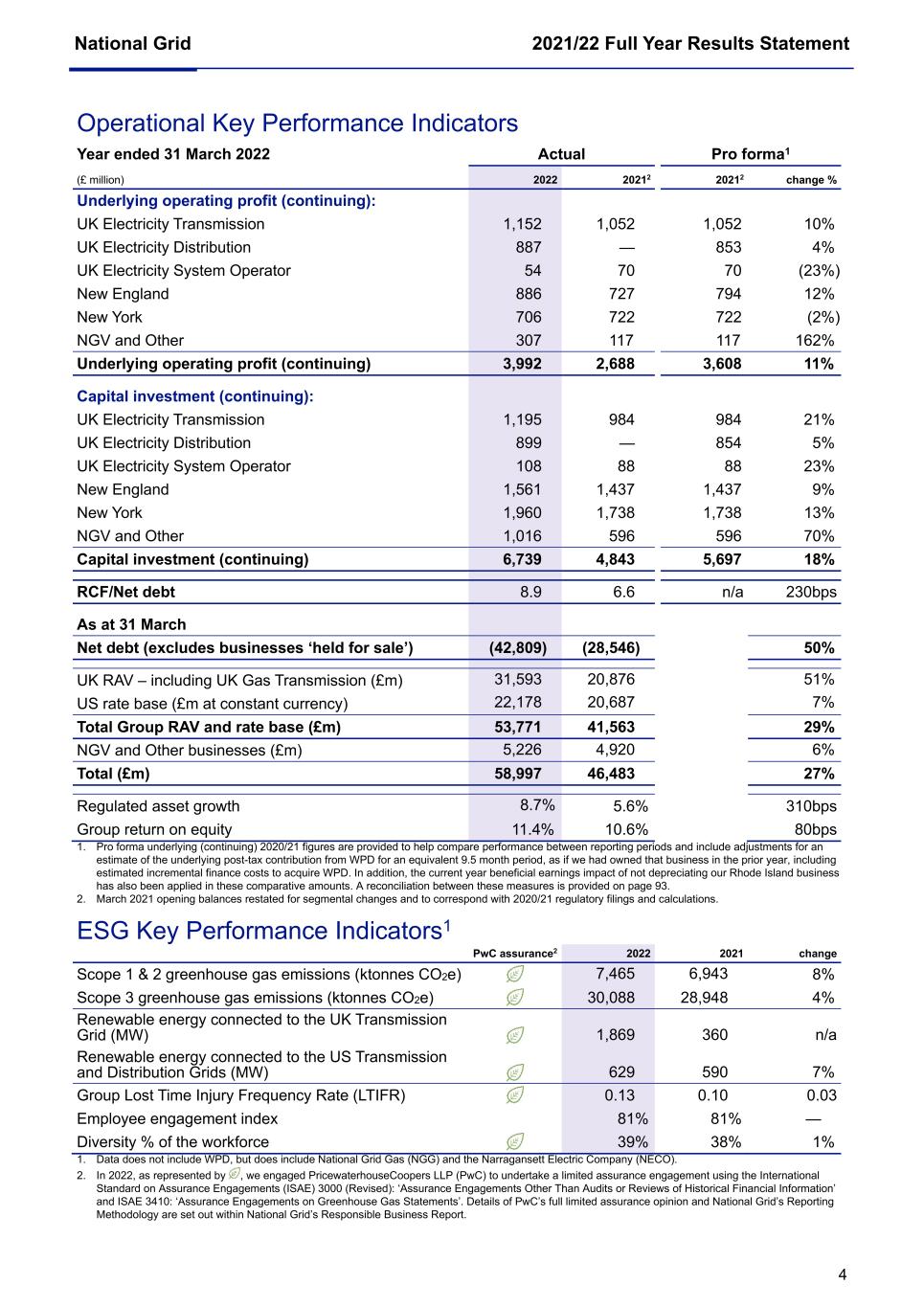
National Grid 2021/22 Full Year Results Statement 4 Operational Key Performance Indicators Year ended 31 March 2022 Actual Pro forma1 (£ million) 2022 20212 20212 change % Underlying operating profit (continuing): UK Electricity Transmission 1,152 1,052 1,052 10% UK Electricity Distribution 887 — 853 4% UK Electricity System Operator 54 70 70 (23%) New England 886 727 794 12% New York 706 722 722 (2%) NGV and Other 307 117 117 162% Underlying operating profit (continuing) 3,992 2,688 3,608 11% Capital investment (continuing): UK Electricity Transmission 1,195 984 984 21% UK Electricity Distribution 899 — 854 5% UK Electricity System Operator 108 88 88 23% New England 1,561 1,437 1,437 9% New York 1,960 1,738 1,738 13% NGV and Other 1,016 596 596 70% Capital investment (continuing) 6,739 4,843 5,697 18% RCF/Net debt 8.9 6.6 n/a 230bps As at 31 March Net debt (excludes businesses ‘held for sale’) (42,809) (28,546) 50% UK RAV – including UK Gas Transmission (£m) 31,593 20,876 51% US rate base (£m at constant currency) 22,178 20,687 7% Total Group RAV and rate base (£m) 53,771 41,563 29% NGV and Other businesses (£m) 5,226 4,920 6% Total (£m) 58,997 46,483 27% Regulated asset growth 8.7% 5.6% 310bps Group return on equity 11.4% 10.6% 80bps 1. Pro forma underlying (continuing) 2020/21 figures are provided to help compare performance between reporting periods and include adjustments for an estimate of the underlying post-tax contribution from WPD for an equivalent 9.5 month period, as if we had owned that business in the prior year, including estimated incremental finance costs to acquire WPD. In addition, the current year beneficial earnings impact of not depreciating our Rhode Island business has also been applied in these comparative amounts. A reconciliation between these measures is provided on page 93. 2. March 2021 opening balances restated for segmental changes and to correspond with 2020/21 regulatory filings and calculations. ESG Key Performance Indicators1 PwC assurance2 2022 2021 change Scope 1 & 2 greenhouse gas emissions (ktonnes CO2e) 7,465 6,943 8% Scope 3 greenhouse gas emissions (ktonnes CO2e) 30,088 28,948 4% Renewable energy connected to the UK Transmission Grid (MW) 1,869 360 n/a Renewable energy connected to the US Transmission and Distribution Grids (MW) 629 590 7% Group Lost Time Injury Frequency Rate (LTIFR) 0.13 0.10 0.03 Employee engagement index 81% 81% — Diversity % of the workforce 39% 38% 1% 1. Data does not include WPD, but does include National Grid Gas (NGG) and the Narragansett Electric Company (NECO). 2. In 2022, as represented by , we engaged PricewaterhouseCoopers LLP (PwC) to undertake a limited assurance engagement using the International Standard on Assurance Engagements (ISAE) 3000 (Revised): ‘Assurance Engagements Other Than Audits or Reviews of Historical Financial Information’ and ISAE 3410: ‘Assurance Engagements on Greenhouse Gas Statements’. Details of PwC’s full limited assurance opinion and National Grid’s Reporting Methodology are set out within National Grid’s Responsible Business Report.
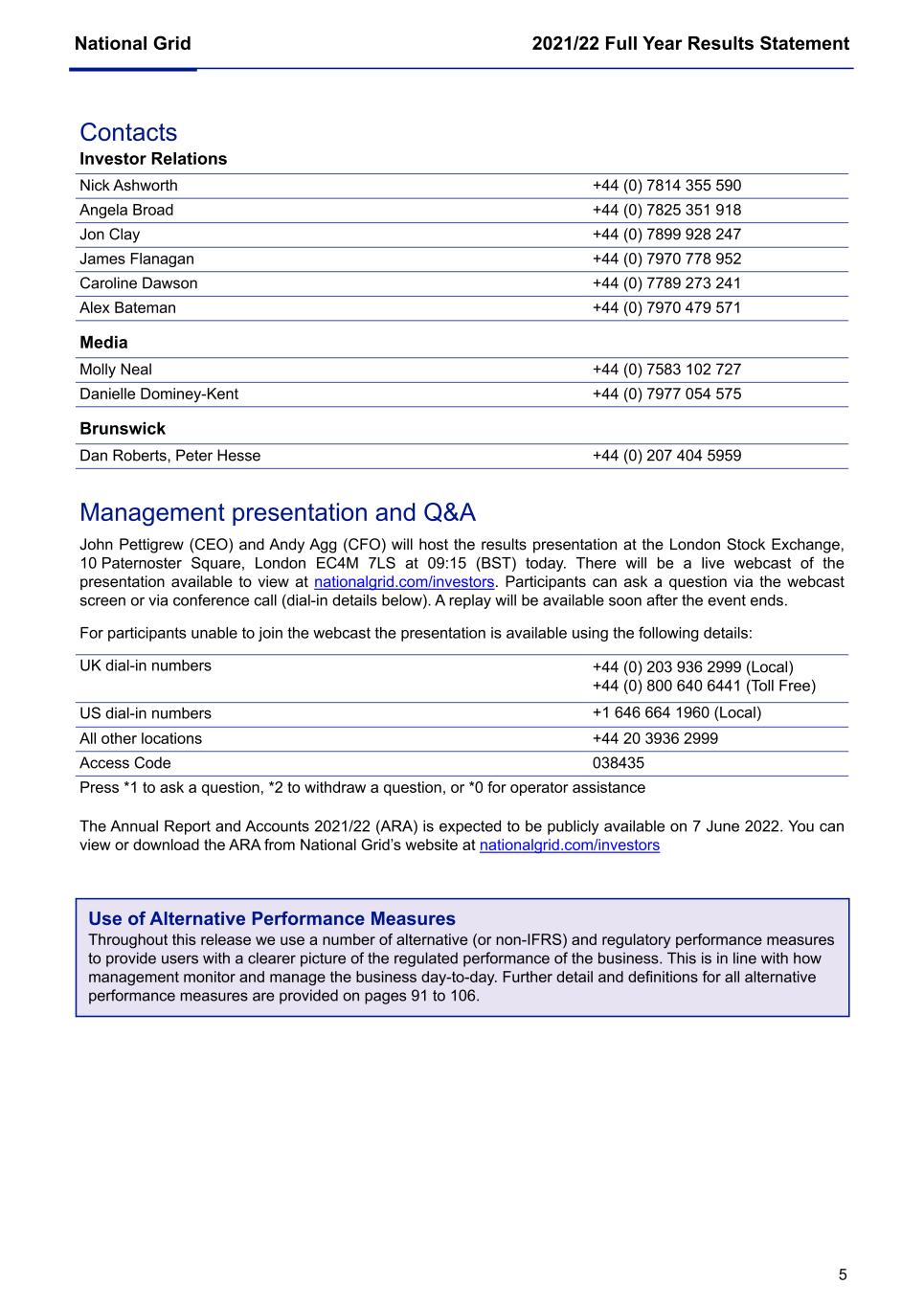
National Grid 2021/22 Full Year Results Statement 5 Contacts Investor Relations Nick Ashworth +44 (0) 7814 355 590 Angela Broad +44 (0) 7825 351 918 Jon Clay +44 (0) 7899 928 247 James Flanagan +44 (0) 7970 778 952 Caroline Dawson +44 (0) 7789 273 241 Alex Bateman +44 (0) 7970 479 571 Media Molly Neal +44 (0) 7583 102 727 Danielle Dominey-Kent +44 (0) 7977 054 575 Brunswick Dan Roberts, Peter Hesse +44 (0) 207 404 5959 Management presentation and Q&A John Pettigrew (CEO) and Andy Agg (CFO) will host the results presentation at the London Stock Exchange, 10 Paternoster Square, London EC4M 7LS at 09:15 (BST) today. There will be a live webcast of the presentation available to view at nationalgrid.com/investors. Participants can ask a question via the webcast screen or via conference call (dial-in details below). A replay will be available soon after the event ends. For participants unable to join the webcast the presentation is available using the following details: UK dial-in numbers +44 (0) 203 936 2999 (Local) +44 (0) 800 640 6441 (Toll Free) US dial-in numbers +1 646 664 1960 (Local) All other locations +44 20 3936 2999 Access Code 038435 Press *1 to ask a question, *2 to withdraw a question, or *0 for operator assistance The Annual Report and Accounts 2021/22 (ARA) is expected to be publicly available on 7 June 2022. You can view or download the ARA from National Grid’s website at nationalgrid.com/investors Use of Alternative Performance Measures Throughout this release we use a number of alternative (or non-IFRS) and regulatory performance measures to provide users with a clearer picture of the regulated performance of the business. This is in line with how management monitor and manage the business day-to-day. Further detail and definitions for all alternative performance measures are provided on pages 91 to 106.
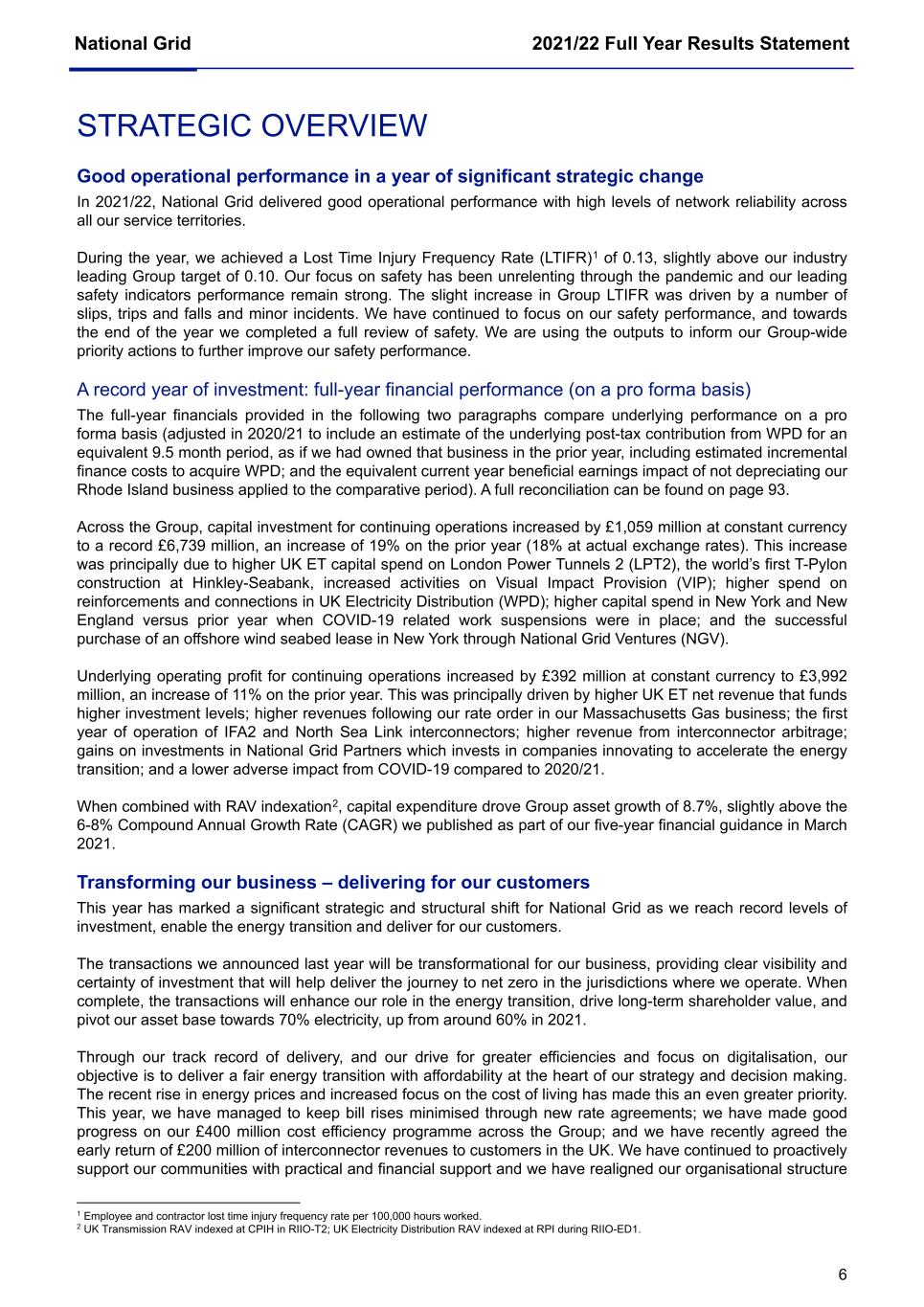
National Grid 2021/22 Full Year Results Statement 6 STRATEGIC OVERVIEW Good operational performance in a year of significant strategic change In 2021/22, National Grid delivered good operational performance with high levels of network reliability across all our service territories. During the year, we achieved a Lost Time Injury Frequency Rate (LTIFR)1 of 0.13, slightly above our industry leading Group target of 0.10. Our focus on safety has been unrelenting through the pandemic and our leading safety indicators performance remain strong. The slight increase in Group LTIFR was driven by a number of slips, trips and falls and minor incidents. We have continued to focus on our safety performance, and towards the end of the year we completed a full review of safety. We are using the outputs to inform our Group-wide priority actions to further improve our safety performance. A record year of investment: full-year financial performance (on a pro forma basis) The full-year financials provided in the following two paragraphs compare underlying performance on a pro forma basis (adjusted in 2020/21 to include an estimate of the underlying post-tax contribution from WPD for an equivalent 9.5 month period, as if we had owned that business in the prior year, including estimated incremental finance costs to acquire WPD; and the equivalent current year beneficial earnings impact of not depreciating our Rhode Island business applied to the comparative period). A full reconciliation can be found on page 93. Across the Group, capital investment for continuing operations increased by £1,059 million at constant currency to a record £6,739 million, an increase of 19% on the prior year (18% at actual exchange rates). This increase was principally due to higher UK ET capital spend on London Power Tunnels 2 (LPT2), the world’s first T-Pylon construction at Hinkley-Seabank, increased activities on Visual Impact Provision (VIP); higher spend on reinforcements and connections in UK Electricity Distribution (WPD); higher capital spend in New York and New England versus prior year when COVID-19 related work suspensions were in place; and the successful purchase of an offshore wind seabed lease in New York through National Grid Ventures (NGV). Underlying operating profit for continuing operations increased by £392 million at constant currency to £3,992 million, an increase of 11% on the prior year. This was principally driven by higher UK ET net revenue that funds higher investment levels; higher revenues following our rate order in our Massachusetts Gas business; the first year of operation of IFA2 and North Sea Link interconnectors; higher revenue from interconnector arbitrage; gains on investments in National Grid Partners which invests in companies innovating to accelerate the energy transition; and a lower adverse impact from COVID-19 compared to 2020/21. When combined with RAV indexation2, capital expenditure drove Group asset growth of 8.7%, slightly above the 6-8% Compound Annual Growth Rate (CAGR) we published as part of our five-year financial guidance in March 2021. Transforming our business – delivering for our customers This year has marked a significant strategic and structural shift for National Grid as we reach record levels of investment, enable the energy transition and deliver for our customers. The transactions we announced last year will be transformational for our business, providing clear visibility and certainty of investment that will help deliver the journey to net zero in the jurisdictions where we operate. When complete, the transactions will enhance our role in the energy transition, drive long-term shareholder value, and pivot our asset base towards 70% electricity, up from around 60% in 2021. Through our track record of delivery, and our drive for greater efficiencies and focus on digitalisation, our objective is to deliver a fair energy transition with affordability at the heart of our strategy and decision making. The recent rise in energy prices and increased focus on the cost of living has made this an even greater priority. This year, we have managed to keep bill rises minimised through new rate agreements; we have made good progress on our £400 million cost efficiency programme across the Group; and we have recently agreed the early return of £200 million of interconnector revenues to customers in the UK. We have continued to proactively support our communities with practical and financial support and we have realigned our organisational structure 1 Employee and contractor lost time injury frequency rate per 100,000 hours worked. 2 UK Transmission RAV indexed at CPIH in RIIO-T2; UK Electricity Distribution RAV indexed at RPI during RIIO-ED1.
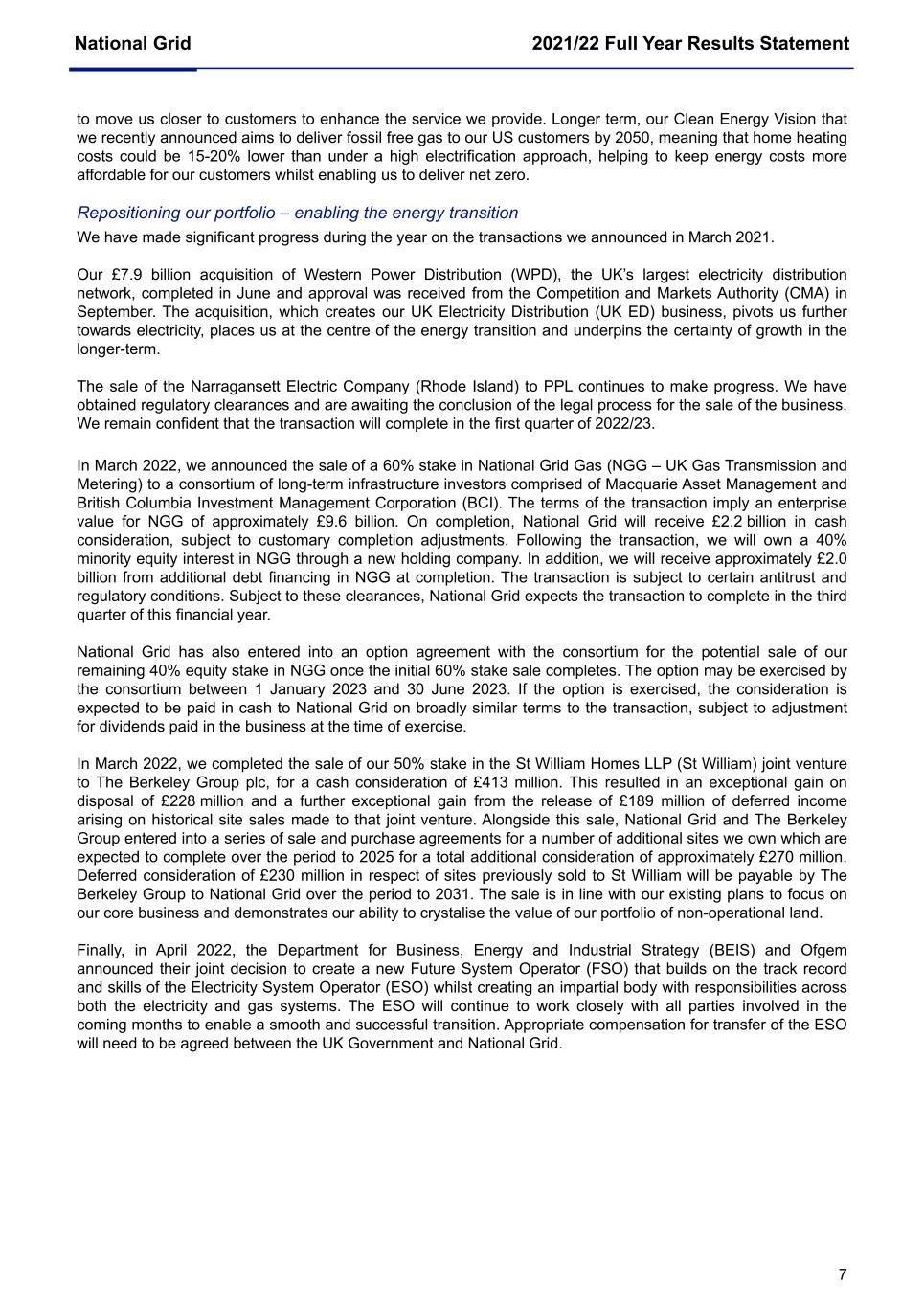
National Grid 2021/22 Full Year Results Statement 7 to move us closer to customers to enhance the service we provide. Longer term, our Clean Energy Vision that we recently announced aims to deliver fossil free gas to our US customers by 2050, meaning that home heating costs could be 15-20% lower than under a high electrification approach, helping to keep energy costs more affordable for our customers whilst enabling us to deliver net zero. Repositioning our portfolio – enabling the energy transition We have made significant progress during the year on the transactions we announced in March 2021. Our £7.9 billion acquisition of Western Power Distribution (WPD), the UK’s largest electricity distribution network, completed in June and approval was received from the Competition and Markets Authority (CMA) in September. The acquisition, which creates our UK Electricity Distribution (UK ED) business, pivots us further towards electricity, places us at the centre of the energy transition and underpins the certainty of growth in the longer-term. The sale of the Narragansett Electric Company (Rhode Island) to PPL continues to make progress. We have obtained regulatory clearances and are awaiting the conclusion of the legal process for the sale of the business. We remain confident that the transaction will complete in the first quarter of 2022/23. In March 2022, we announced the sale of a 60% stake in National Grid Gas (NGG – UK Gas Transmission and Metering) to a consortium of long-term infrastructure investors comprised of Macquarie Asset Management and British Columbia Investment Management Corporation (BCI). The terms of the transaction imply an enterprise value for NGG of approximately £9.6 billion. On completion, National Grid will receive £2.2 billion in cash consideration, subject to customary completion adjustments. Following the transaction, we will own a 40% minority equity interest in NGG through a new holding company. In addition, we will receive approximately £2.0 billion from additional debt financing in NGG at completion. The transaction is subject to certain antitrust and regulatory conditions. Subject to these clearances, National Grid expects the transaction to complete in the third quarter of this financial year. National Grid has also entered into an option agreement with the consortium for the potential sale of our remaining 40% equity stake in NGG once the initial 60% stake sale completes. The option may be exercised by the consortium between 1 January 2023 and 30 June 2023. If the option is exercised, the consideration is expected to be paid in cash to National Grid on broadly similar terms to the transaction, subject to adjustment for dividends paid in the business at the time of exercise. In March 2022, we completed the sale of our 50% stake in the St William Homes LLP (St William) joint venture to The Berkeley Group plc, for a cash consideration of £413 million. This resulted in an exceptional gain on disposal of £228 million and a further exceptional gain from the release of £189 million of deferred income arising on historical site sales made to that joint venture. Alongside this sale, National Grid and The Berkeley Group entered into a series of sale and purchase agreements for a number of additional sites we own which are expected to complete over the period to 2025 for a total additional consideration of approximately £270 million. Deferred consideration of £230 million in respect of sites previously sold to St William will be payable by The Berkeley Group to National Grid over the period to 2031. The sale is in line with our existing plans to focus on our core business and demonstrates our ability to crystalise the value of our portfolio of non-operational land. Finally, in April 2022, the Department for Business, Energy and Industrial Strategy (BEIS) and Ofgem announced their joint decision to create a new Future System Operator (FSO) that builds on the track record and skills of the Electricity System Operator (ESO) whilst creating an impartial body with responsibilities across both the electricity and gas systems. The ESO will continue to work closely with all parties involved in the coming months to enable a smooth and successful transition. Appropriate compensation for transfer of the ESO will need to be agreed between the UK Government and National Grid.
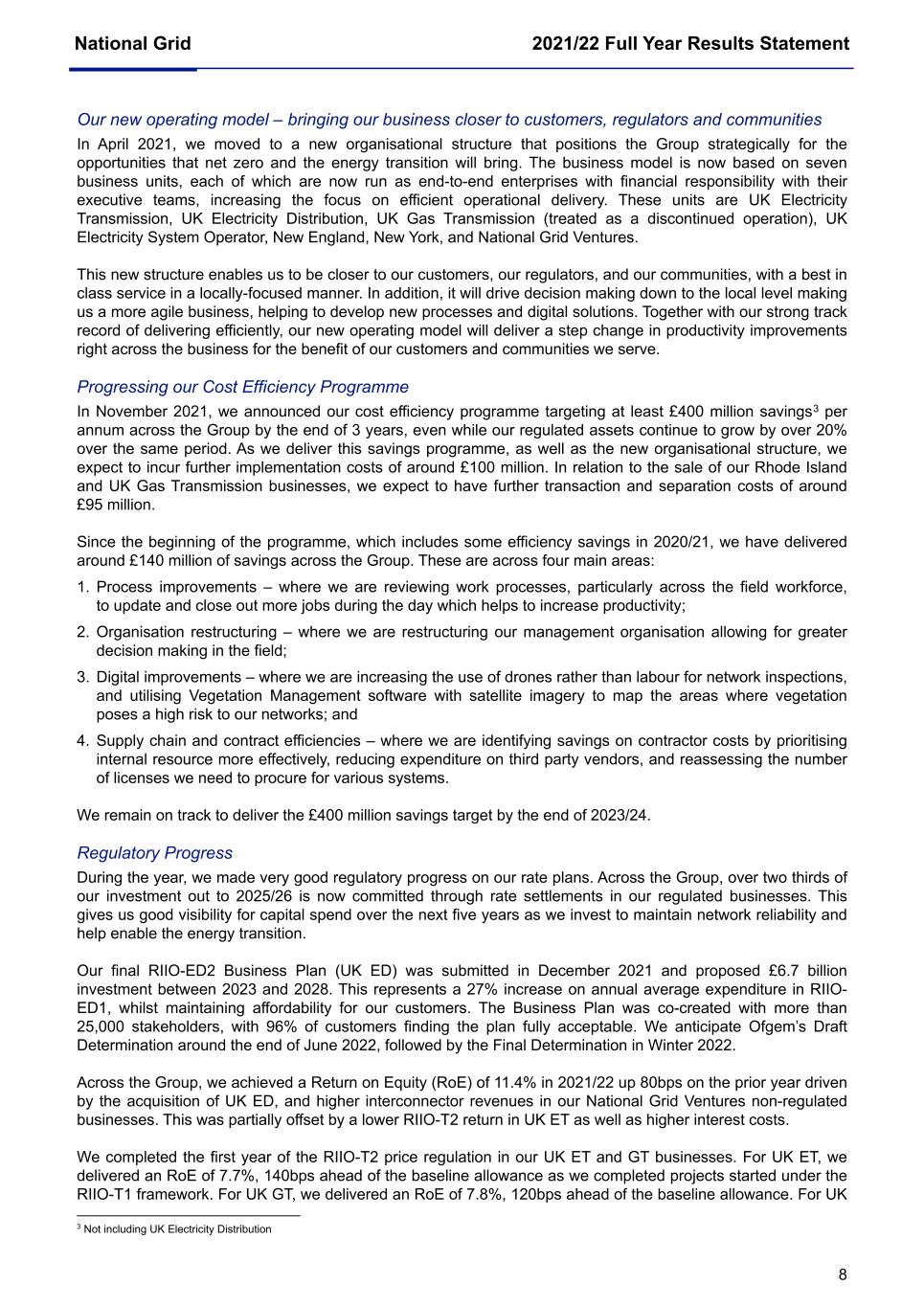
National Grid 2021/22 Full Year Results Statement 8 Our new operating model – bringing our business closer to customers, regulators and communities In April 2021, we moved to a new organisational structure that positions the Group strategically for the opportunities that net zero and the energy transition will bring. The business model is now based on seven business units, each of which are now run as end-to-end enterprises with financial responsibility with their executive teams, increasing the focus on efficient operational delivery. These units are UK Electricity Transmission, UK Electricity Distribution, UK Gas Transmission (treated as a discontinued operation), UK Electricity System Operator, New England, New York, and National Grid Ventures. This new structure enables us to be closer to our customers, our regulators, and our communities, with a best in class service in a locally-focused manner. In addition, it will drive decision making down to the local level making us a more agile business, helping to develop new processes and digital solutions. Together with our strong track record of delivering efficiently, our new operating model will deliver a step change in productivity improvements right across the business for the benefit of our customers and communities we serve. Progressing our Cost Efficiency Programme In November 2021, we announced our cost efficiency programme targeting at least £400 million savings3 per annum across the Group by the end of 3 years, even while our regulated assets continue to grow by over 20% over the same period. As we deliver this savings programme, as well as the new organisational structure, we expect to incur further implementation costs of around £100 million. In relation to the sale of our Rhode Island and UK Gas Transmission businesses, we expect to have further transaction and separation costs of around £95 million. Since the beginning of the programme, which includes some efficiency savings in 2020/21, we have delivered around £140 million of savings across the Group. These are across four main areas: 1. Process improvements – where we are reviewing work processes, particularly across the field workforce, to update and close out more jobs during the day which helps to increase productivity; 2. Organisation restructuring – where we are restructuring our management organisation allowing for greater decision making in the field; 3. Digital improvements – where we are increasing the use of drones rather than labour for network inspections, and utilising Vegetation Management software with satellite imagery to map the areas where vegetation poses a high risk to our networks; and 4. Supply chain and contract efficiencies – where we are identifying savings on contractor costs by prioritising internal resource more effectively, reducing expenditure on third party vendors, and reassessing the number of licenses we need to procure for various systems. We remain on track to deliver the £400 million savings target by the end of 2023/24. Regulatory Progress During the year, we made very good regulatory progress on our rate plans. Across the Group, over two thirds of our investment out to 2025/26 is now committed through rate settlements in our regulated businesses. This gives us good visibility for capital spend over the next five years as we invest to maintain network reliability and help enable the energy transition. Our final RIIO-ED2 Business Plan (UK ED) was submitted in December 2021 and proposed £6.7 billion investment between 2023 and 2028. This represents a 27% increase on annual average expenditure in RIIO- ED1, whilst maintaining affordability for our customers. The Business Plan was co-created with more than 25,000 stakeholders, with 96% of customers finding the plan fully acceptable. We anticipate Ofgem’s Draft Determination around the end of June 2022, followed by the Final Determination in Winter 2022. Across the Group, we achieved a Return on Equity (RoE) of 11.4% in 2021/22 up 80bps on the prior year driven by the acquisition of UK ED, and higher interconnector revenues in our National Grid Ventures non-regulated businesses. This was partially offset by a lower RIIO-T2 return in UK ET as well as higher interest costs. We completed the first year of the RIIO-T2 price regulation in our UK ET and GT businesses. For UK ET, we delivered an RoE of 7.7%, 140bps ahead of the baseline allowance as we completed projects started under the RIIO-T1 framework. For UK GT, we delivered an RoE of 7.8%, 120bps ahead of the baseline allowance. For UK 3 Not including UK Electricity Distribution
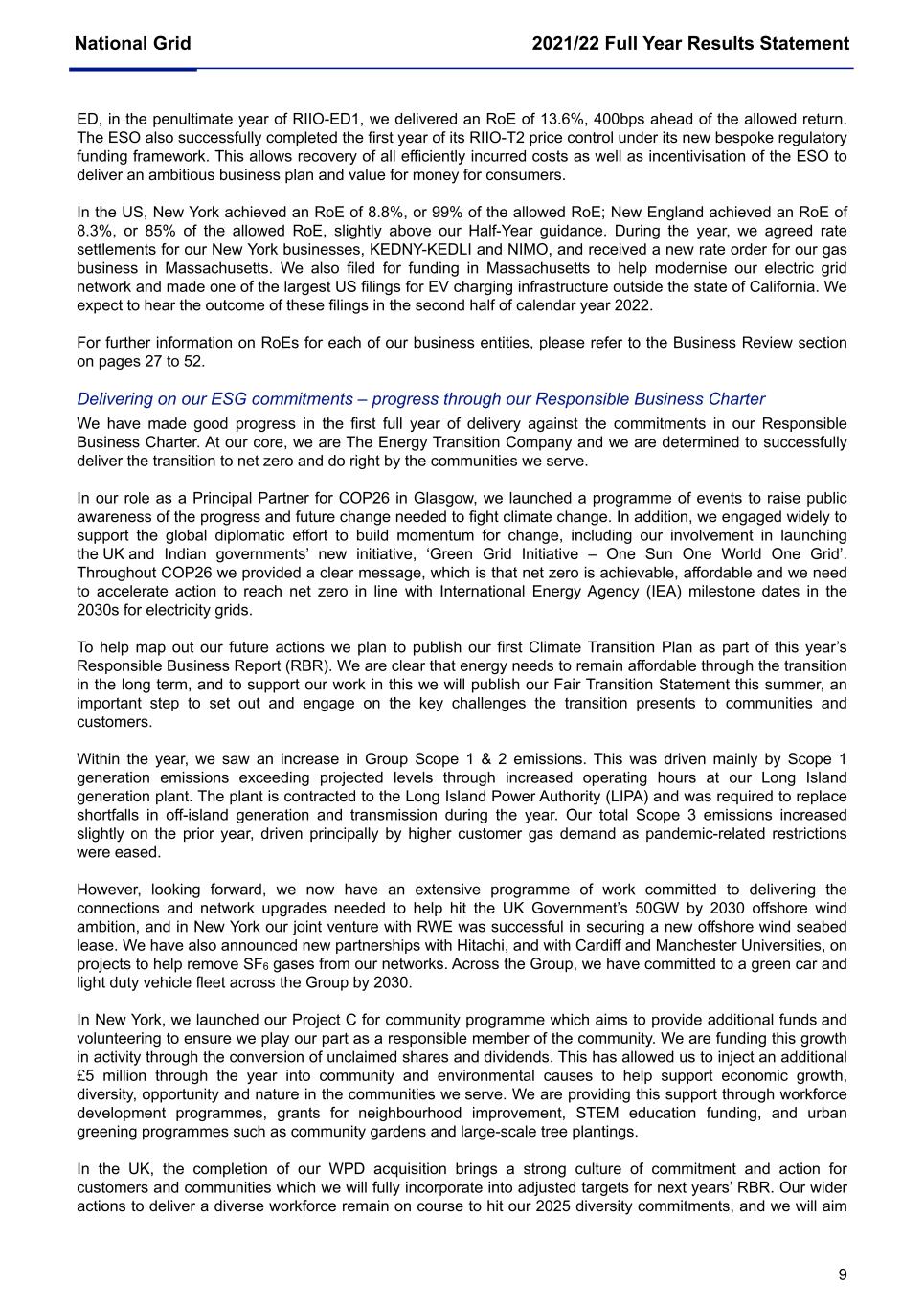
National Grid 2021/22 Full Year Results Statement 9 ED, in the penultimate year of RIIO-ED1, we delivered an RoE of 13.6%, 400bps ahead of the allowed return. The ESO also successfully completed the first year of its RIIO-T2 price control under its new bespoke regulatory funding framework. This allows recovery of all efficiently incurred costs as well as incentivisation of the ESO to deliver an ambitious business plan and value for money for consumers. In the US, New York achieved an RoE of 8.8%, or 99% of the allowed RoE; New England achieved an RoE of 8.3%, or 85% of the allowed RoE, slightly above our Half-Year guidance. During the year, we agreed rate settlements for our New York businesses, KEDNY-KEDLI and NIMO, and received a new rate order for our gas business in Massachusetts. We also filed for funding in Massachusetts to help modernise our electric grid network and made one of the largest US filings for EV charging infrastructure outside the state of California. We expect to hear the outcome of these filings in the second half of calendar year 2022. For further information on RoEs for each of our business entities, please refer to the Business Review section on pages 27 to 52. Delivering on our ESG commitments – progress through our Responsible Business Charter We have made good progress in the first full year of delivery against the commitments in our Responsible Business Charter. At our core, we are The Energy Transition Company and we are determined to successfully deliver the transition to net zero and do right by the communities we serve. In our role as a Principal Partner for COP26 in Glasgow, we launched a programme of events to raise public awareness of the progress and future change needed to fight climate change. In addition, we engaged widely to support the global diplomatic effort to build momentum for change, including our involvement in launching the UK and Indian governments’ new initiative, ‘Green Grid Initiative – One Sun One World One Grid’. Throughout COP26 we provided a clear message, which is that net zero is achievable, affordable and we need to accelerate action to reach net zero in line with International Energy Agency (IEA) milestone dates in the 2030s for electricity grids. To help map out our future actions we plan to publish our first Climate Transition Plan as part of this year’s Responsible Business Report (RBR). We are clear that energy needs to remain affordable through the transition in the long term, and to support our work in this we will publish our Fair Transition Statement this summer, an important step to set out and engage on the key challenges the transition presents to communities and customers. Within the year, we saw an increase in Group Scope 1 & 2 emissions. This was driven mainly by Scope 1 generation emissions exceeding projected levels through increased operating hours at our Long Island generation plant. The plant is contracted to the Long Island Power Authority (LIPA) and was required to replace shortfalls in off-island generation and transmission during the year. Our total Scope 3 emissions increased slightly on the prior year, driven principally by higher customer gas demand as pandemic-related restrictions were eased. However, looking forward, we now have an extensive programme of work committed to delivering the connections and network upgrades needed to help hit the UK Government’s 50GW by 2030 offshore wind ambition, and in New York our joint venture with RWE was successful in securing a new offshore wind seabed lease. We have also announced new partnerships with Hitachi, and with Cardiff and Manchester Universities, on projects to help remove SF6 gases from our networks. Across the Group, we have committed to a green car and light duty vehicle fleet across the Group by 2030. In New York, we launched our Project C for community programme which aims to provide additional funds and volunteering to ensure we play our part as a responsible member of the community. We are funding this growth in activity through the conversion of unclaimed shares and dividends. This has allowed us to inject an additional £5 million through the year into community and environmental causes to help support economic growth, diversity, opportunity and nature in the communities we serve. We are providing this support through workforce development programmes, grants for neighbourhood improvement, STEM education funding, and urban greening programmes such as community gardens and large-scale tree plantings. In the UK, the completion of our WPD acquisition brings a strong culture of commitment and action for customers and communities which we will fully incorporate into adjusted targets for next years’ RBR. Our wider actions to deliver a diverse workforce remain on course to hit our 2025 diversity commitments, and we will aim
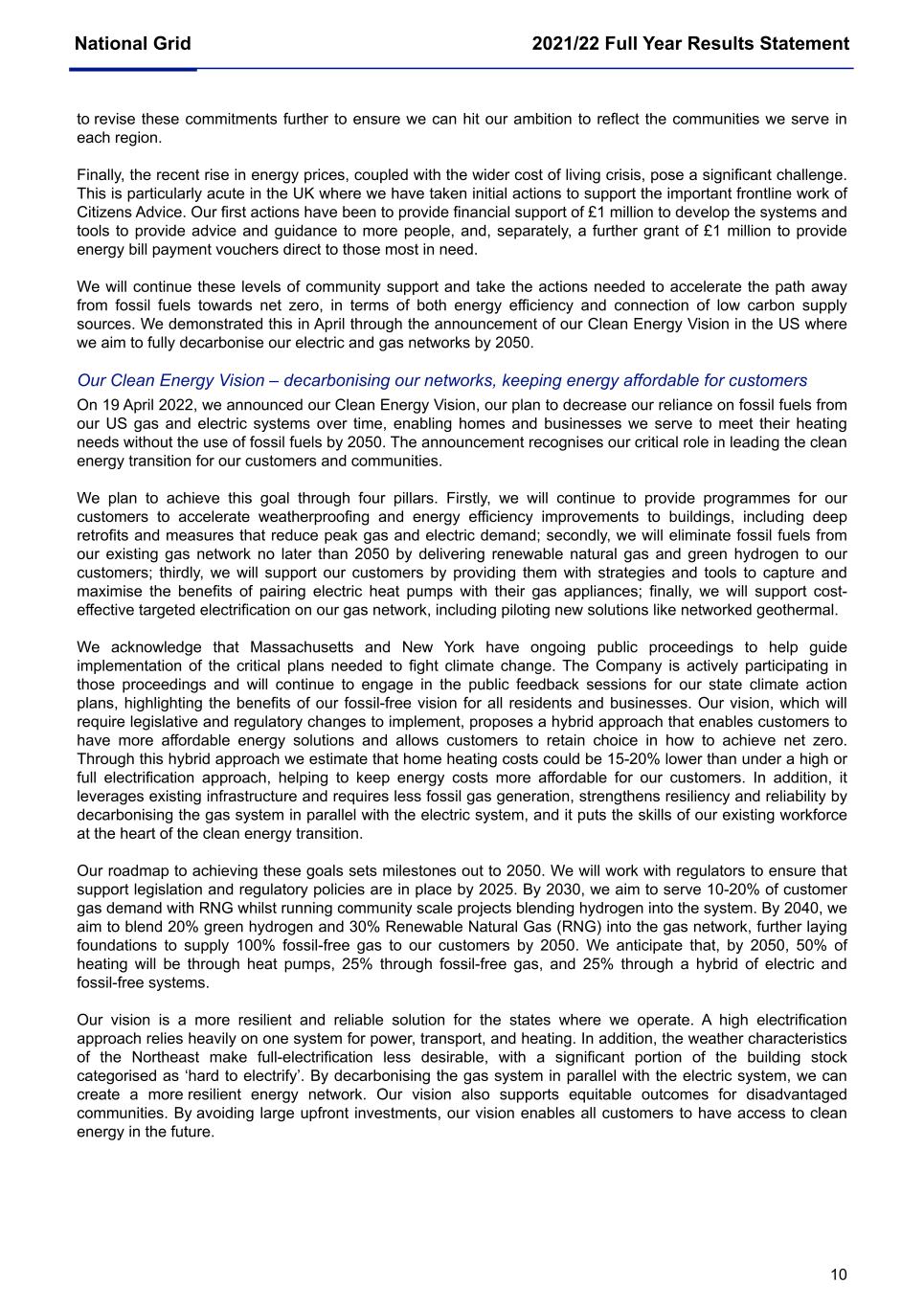
National Grid 2021/22 Full Year Results Statement 10 to revise these commitments further to ensure we can hit our ambition to reflect the communities we serve in each region. Finally, the recent rise in energy prices, coupled with the wider cost of living crisis, pose a significant challenge. This is particularly acute in the UK where we have taken initial actions to support the important frontline work of Citizens Advice. Our first actions have been to provide financial support of £1 million to develop the systems and tools to provide advice and guidance to more people, and, separately, a further grant of £1 million to provide energy bill payment vouchers direct to those most in need. We will continue these levels of community support and take the actions needed to accelerate the path away from fossil fuels towards net zero, in terms of both energy efficiency and connection of low carbon supply sources. We demonstrated this in April through the announcement of our Clean Energy Vision in the US where we aim to fully decarbonise our electric and gas networks by 2050. Our Clean Energy Vision – decarbonising our networks, keeping energy affordable for customers On 19 April 2022, we announced our Clean Energy Vision, our plan to decrease our reliance on fossil fuels from our US gas and electric systems over time, enabling homes and businesses we serve to meet their heating needs without the use of fossil fuels by 2050. The announcement recognises our critical role in leading the clean energy transition for our customers and communities. We plan to achieve this goal through four pillars. Firstly, we will continue to provide programmes for our customers to accelerate weatherproofing and energy efficiency improvements to buildings, including deep retrofits and measures that reduce peak gas and electric demand; secondly, we will eliminate fossil fuels from our existing gas network no later than 2050 by delivering renewable natural gas and green hydrogen to our customers; thirdly, we will support our customers by providing them with strategies and tools to capture and maximise the benefits of pairing electric heat pumps with their gas appliances; finally, we will support cost- effective targeted electrification on our gas network, including piloting new solutions like networked geothermal. We acknowledge that Massachusetts and New York have ongoing public proceedings to help guide implementation of the critical plans needed to fight climate change. The Company is actively participating in those proceedings and will continue to engage in the public feedback sessions for our state climate action plans, highlighting the benefits of our fossil-free vision for all residents and businesses. Our vision, which will require legislative and regulatory changes to implement, proposes a hybrid approach that enables customers to have more affordable energy solutions and allows customers to retain choice in how to achieve net zero. Through this hybrid approach we estimate that home heating costs could be 15-20% lower than under a high or full electrification approach, helping to keep energy costs more affordable for our customers. In addition, it leverages existing infrastructure and requires less fossil gas generation, strengthens resiliency and reliability by decarbonising the gas system in parallel with the electric system, and it puts the skills of our existing workforce at the heart of the clean energy transition. Our roadmap to achieving these goals sets milestones out to 2050. We will work with regulators to ensure that support legislation and regulatory policies are in place by 2025. By 2030, we aim to serve 10-20% of customer gas demand with RNG whilst running community scale projects blending hydrogen into the system. By 2040, we aim to blend 20% green hydrogen and 30% Renewable Natural Gas (RNG) into the gas network, further laying foundations to supply 100% fossil-free gas to our customers by 2050. We anticipate that, by 2050, 50% of heating will be through heat pumps, 25% through fossil-free gas, and 25% through a hybrid of electric and fossil-free systems. Our vision is a more resilient and reliable solution for the states where we operate. A high electrification approach relies heavily on one system for power, transport, and heating. In addition, the weather characteristics of the Northeast make full-electrification less desirable, with a significant portion of the building stock categorised as ‘hard to electrify’. By decarbonising the gas system in parallel with the electric system, we can create a more resilient energy network. Our vision also supports equitable outcomes for disadvantaged communities. By avoiding large upfront investments, our vision enables all customers to have access to clean energy in the future.
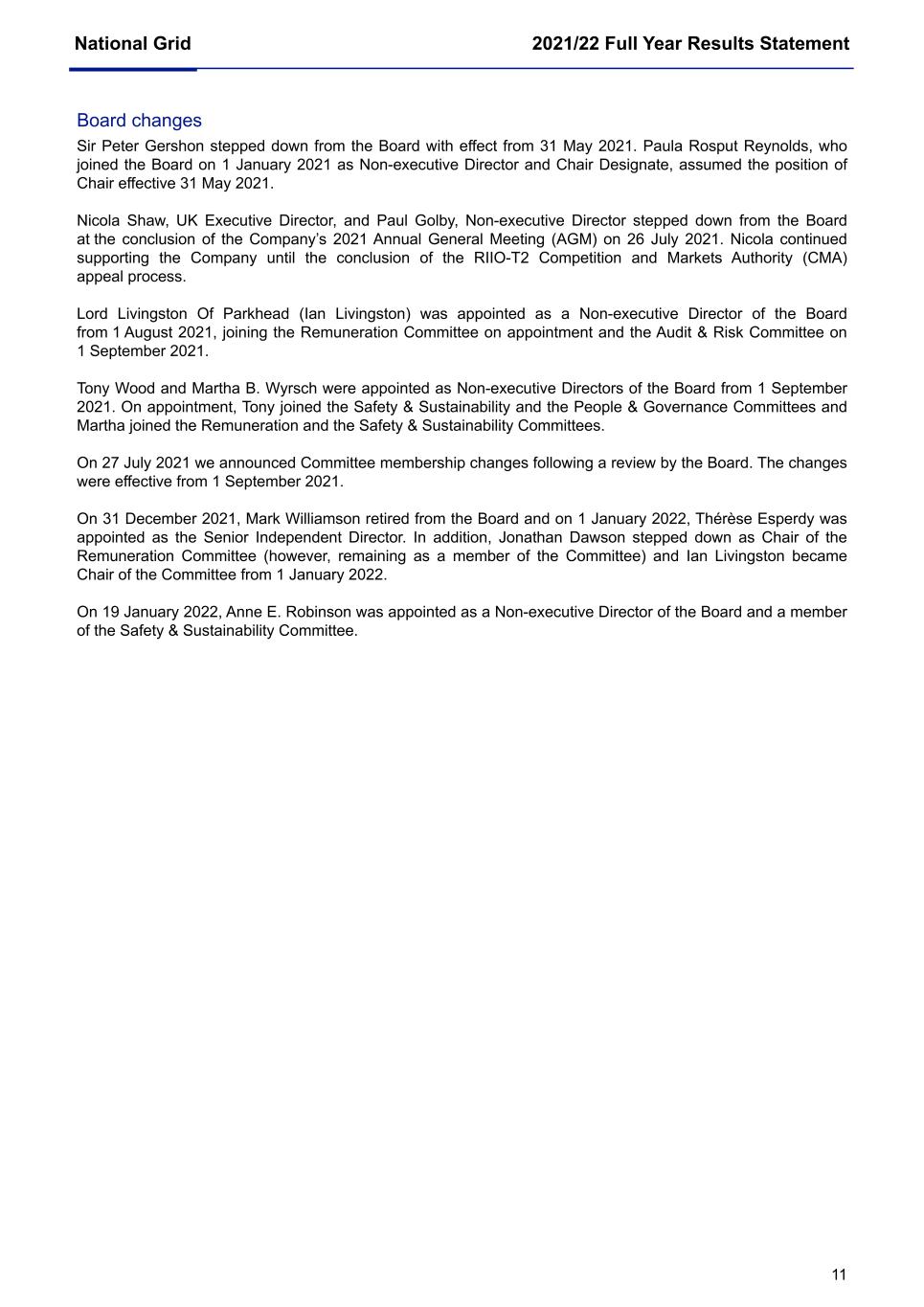
National Grid 2021/22 Full Year Results Statement 11 Board changes Sir Peter Gershon stepped down from the Board with effect from 31 May 2021. Paula Rosput Reynolds, who joined the Board on 1 January 2021 as Non-executive Director and Chair Designate, assumed the position of Chair effective 31 May 2021. Nicola Shaw, UK Executive Director, and Paul Golby, Non-executive Director stepped down from the Board at the conclusion of the Company’s 2021 Annual General Meeting (AGM) on 26 July 2021. Nicola continued supporting the Company until the conclusion of the RIIO-T2 Competition and Markets Authority (CMA) appeal process. Lord Livingston Of Parkhead (Ian Livingston) was appointed as a Non-executive Director of the Board from 1 August 2021, joining the Remuneration Committee on appointment and the Audit & Risk Committee on 1 September 2021. Tony Wood and Martha B. Wyrsch were appointed as Non-executive Directors of the Board from 1 September 2021. On appointment, Tony joined the Safety & Sustainability and the People & Governance Committees and Martha joined the Remuneration and the Safety & Sustainability Committees. On 27 July 2021 we announced Committee membership changes following a review by the Board. The changes were effective from 1 September 2021. On 31 December 2021, Mark Williamson retired from the Board and on 1 January 2022, Thérèse Esperdy was appointed as the Senior Independent Director. In addition, Jonathan Dawson stepped down as Chair of the Remuneration Committee (however, remaining as a member of the Committee) and Ian Livingston became Chair of the Committee from 1 January 2022. On 19 January 2022, Anne E. Robinson was appointed as a Non-executive Director of the Board and a member of the Safety & Sustainability Committee.
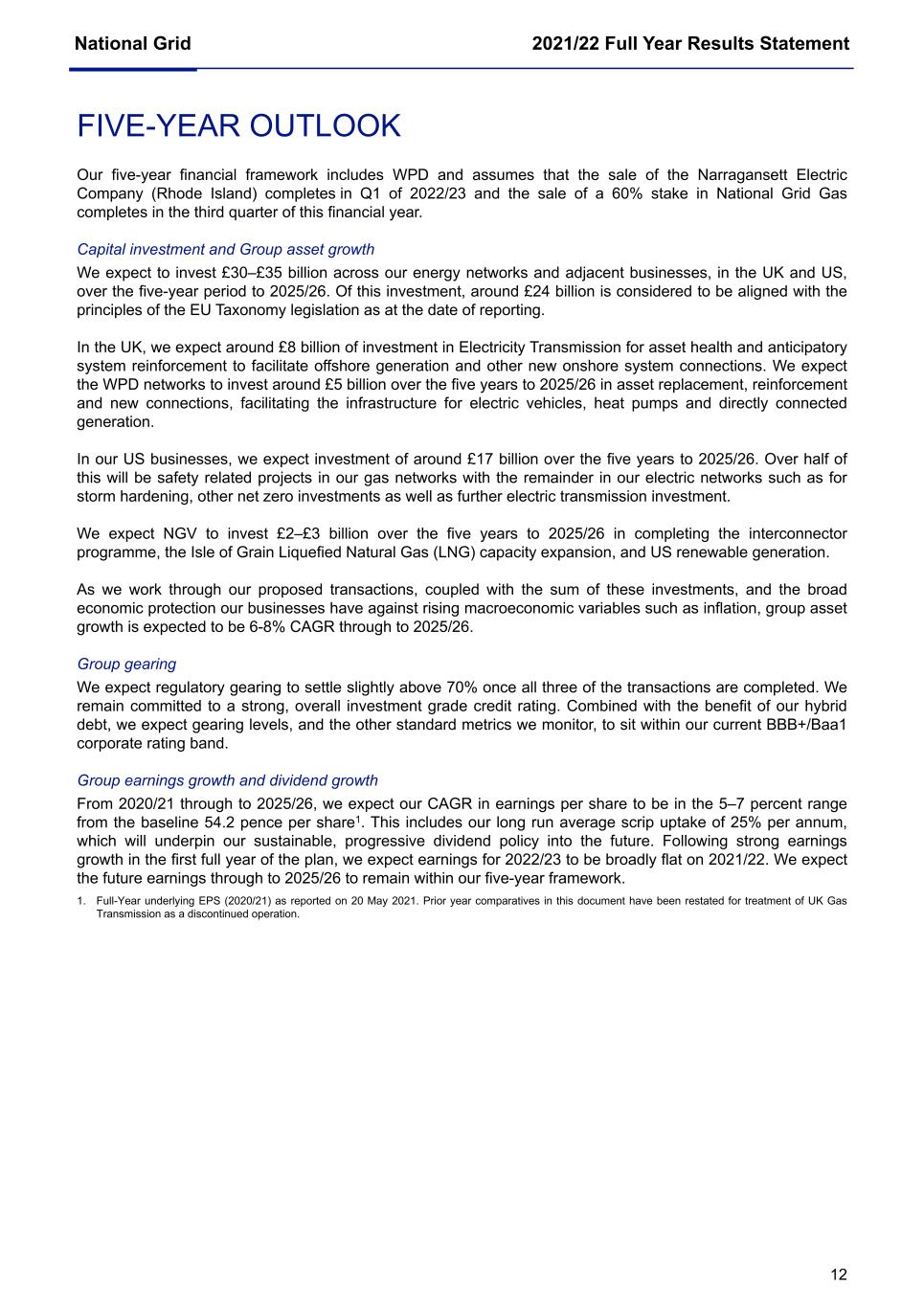
National Grid 2021/22 Full Year Results Statement 12 FIVE-YEAR OUTLOOK Our five-year financial framework includes WPD and assumes that the sale of the Narragansett Electric Company (Rhode Island) completes in Q1 of 2022/23 and the sale of a 60% stake in National Grid Gas completes in the third quarter of this financial year. Capital investment and Group asset growth We expect to invest £30–£35 billion across our energy networks and adjacent businesses, in the UK and US, over the five-year period to 2025/26. Of this investment, around £24 billion is considered to be aligned with the principles of the EU Taxonomy legislation as at the date of reporting. In the UK, we expect around £8 billion of investment in Electricity Transmission for asset health and anticipatory system reinforcement to facilitate offshore generation and other new onshore system connections. We expect the WPD networks to invest around £5 billion over the five years to 2025/26 in asset replacement, reinforcement and new connections, facilitating the infrastructure for electric vehicles, heat pumps and directly connected generation. In our US businesses, we expect investment of around £17 billion over the five years to 2025/26. Over half of this will be safety related projects in our gas networks with the remainder in our electric networks such as for storm hardening, other net zero investments as well as further electric transmission investment. We expect NGV to invest £2–£3 billion over the five years to 2025/26 in completing the interconnector programme, the Isle of Grain Liquefied Natural Gas (LNG) capacity expansion, and US renewable generation. As we work through our proposed transactions, coupled with the sum of these investments, and the broad economic protection our businesses have against rising macroeconomic variables such as inflation, group asset growth is expected to be 6-8% CAGR through to 2025/26. Group gearing We expect regulatory gearing to settle slightly above 70% once all three of the transactions are completed. We remain committed to a strong, overall investment grade credit rating. Combined with the benefit of our hybrid debt, we expect gearing levels, and the other standard metrics we monitor, to sit within our current BBB+/Baa1 corporate rating band. Group earnings growth and dividend growth From 2020/21 through to 2025/26, we expect our CAGR in earnings per share to be in the 5–7 percent range from the baseline 54.2 pence per share1. This includes our long run average scrip uptake of 25% per annum, which will underpin our sustainable, progressive dividend policy into the future. Following strong earnings growth in the first full year of the plan, we expect earnings for 2022/23 to be broadly flat on 2021/22. We expect the future earnings through to 2025/26 to remain within our five-year framework. 1. Full-Year underlying EPS (2020/21) as reported on 20 May 2021. Prior year comparatives in this document have been restated for treatment of UK Gas Transmission as a discontinued operation.
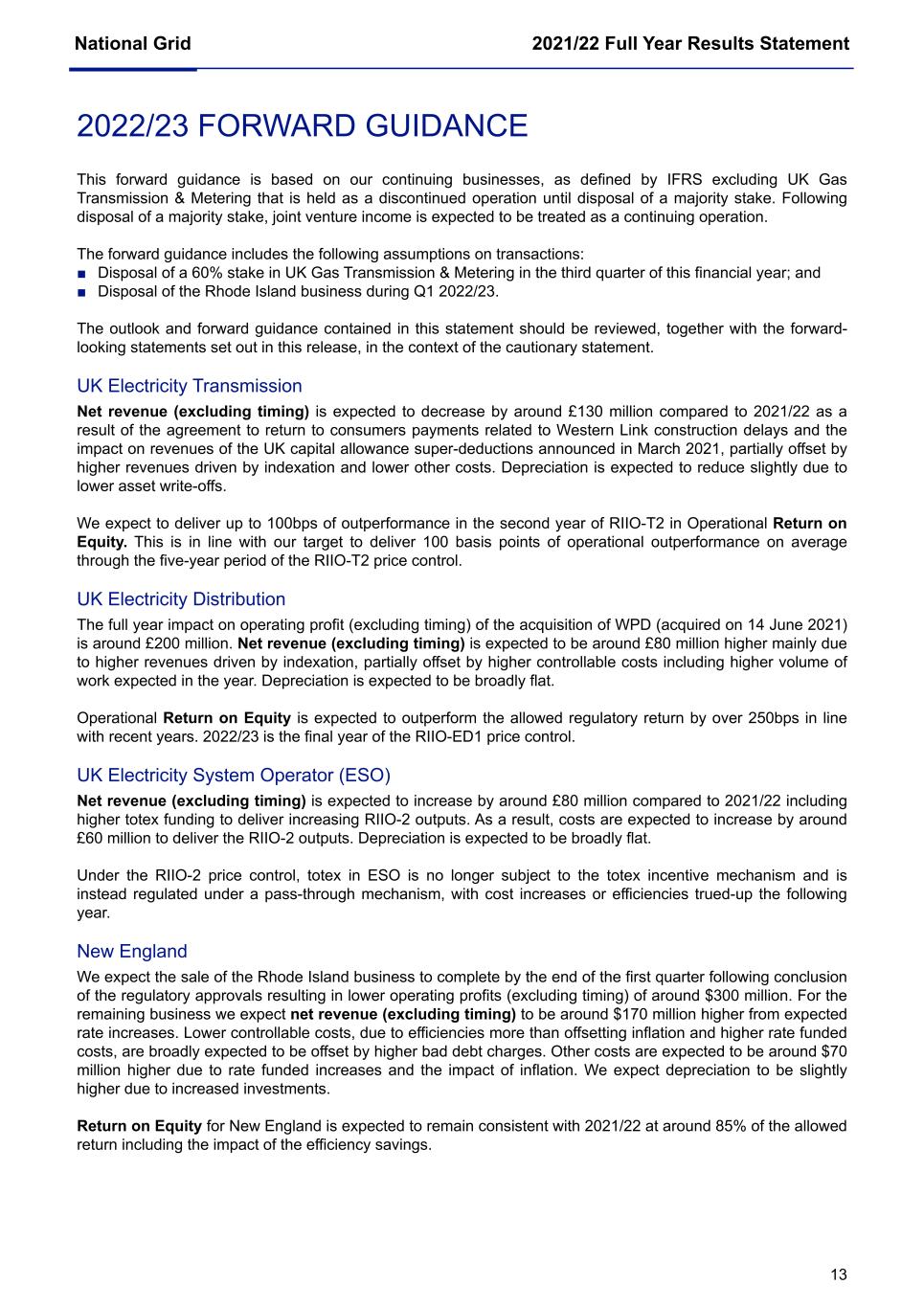
National Grid 2021/22 Full Year Results Statement 13 2022/23 FORWARD GUIDANCE This forward guidance is based on our continuing businesses, as defined by IFRS excluding UK Gas Transmission & Metering that is held as a discontinued operation until disposal of a majority stake. Following disposal of a majority stake, joint venture income is expected to be treated as a continuing operation. The forward guidance includes the following assumptions on transactions: ■ Disposal of a 60% stake in UK Gas Transmission & Metering in the third quarter of this financial year; and ■ Disposal of the Rhode Island business during Q1 2022/23. The outlook and forward guidance contained in this statement should be reviewed, together with the forward- looking statements set out in this release, in the context of the cautionary statement. UK Electricity Transmission Net revenue (excluding timing) is expected to decrease by around £130 million compared to 2021/22 as a result of the agreement to return to consumers payments related to Western Link construction delays and the impact on revenues of the UK capital allowance super-deductions announced in March 2021, partially offset by higher revenues driven by indexation and lower other costs. Depreciation is expected to reduce slightly due to lower asset write-offs. We expect to deliver up to 100bps of outperformance in the second year of RIIO-T2 in Operational Return on Equity. This is in line with our target to deliver 100 basis points of operational outperformance on average through the five-year period of the RIIO-T2 price control. UK Electricity Distribution The full year impact on operating profit (excluding timing) of the acquisition of WPD (acquired on 14 June 2021) is around £200 million. Net revenue (excluding timing) is expected to be around £80 million higher mainly due to higher revenues driven by indexation, partially offset by higher controllable costs including higher volume of work expected in the year. Depreciation is expected to be broadly flat. Operational Return on Equity is expected to outperform the allowed regulatory return by over 250bps in line with recent years. 2022/23 is the final year of the RIIO-ED1 price control. UK Electricity System Operator (ESO) Net revenue (excluding timing) is expected to increase by around £80 million compared to 2021/22 including higher totex funding to deliver increasing RIIO-2 outputs. As a result, costs are expected to increase by around £60 million to deliver the RIIO-2 outputs. Depreciation is expected to be broadly flat. Under the RIIO-2 price control, totex in ESO is no longer subject to the totex incentive mechanism and is instead regulated under a pass-through mechanism, with cost increases or efficiencies trued-up the following year. New England We expect the sale of the Rhode Island business to complete by the end of the first quarter following conclusion of the regulatory approvals resulting in lower operating profits (excluding timing) of around $300 million. For the remaining business we expect net revenue (excluding timing) to be around $170 million higher from expected rate increases. Lower controllable costs, due to efficiencies more than offsetting inflation and higher rate funded costs, are broadly expected to be offset by higher bad debt charges. Other costs are expected to be around $70 million higher due to rate funded increases and the impact of inflation. We expect depreciation to be slightly higher due to increased investments. Return on Equity for New England is expected to remain consistent with 2021/22 at around 85% of the allowed return including the impact of the efficiency savings.
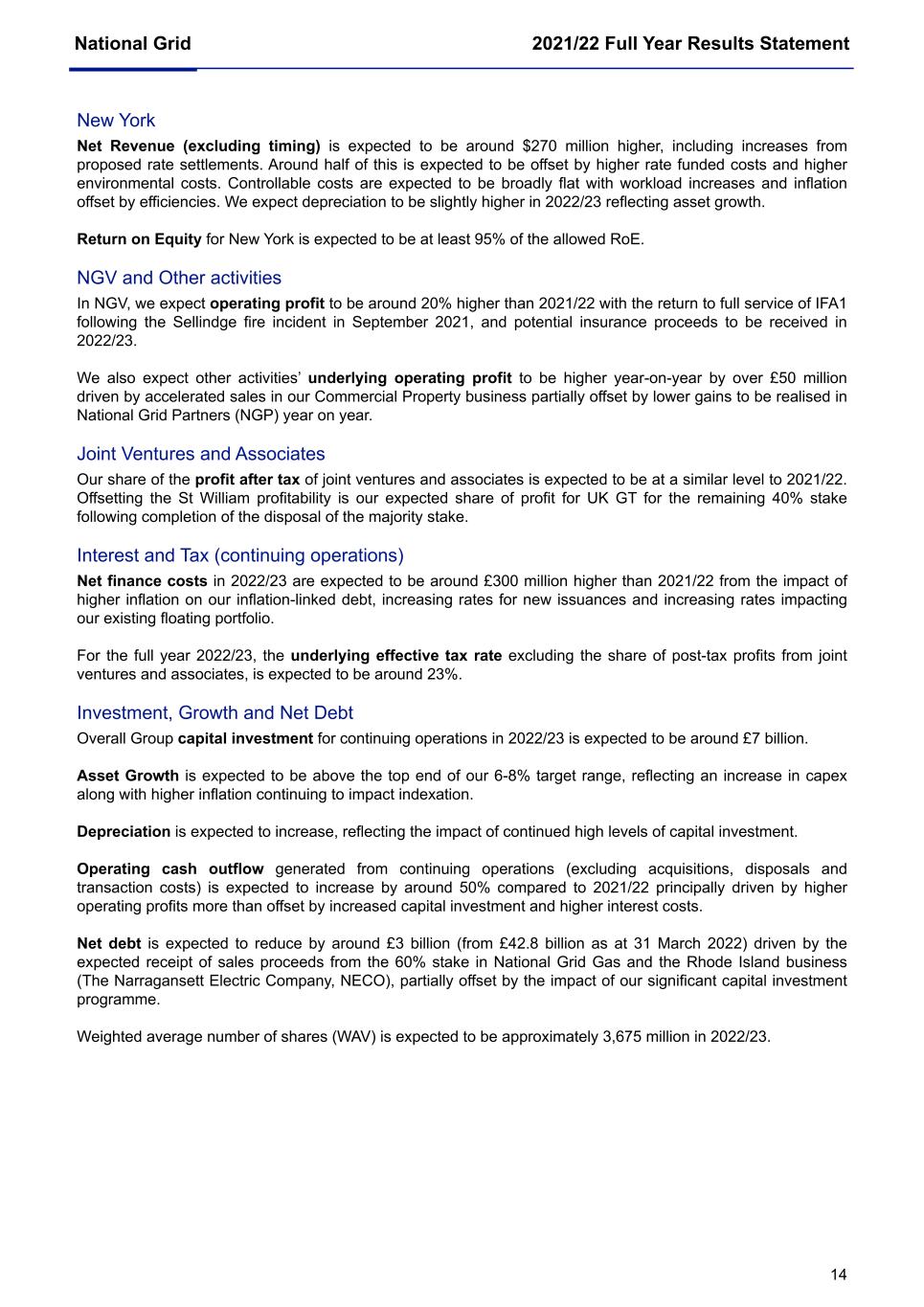
National Grid 2021/22 Full Year Results Statement 14 New York Net Revenue (excluding timing) is expected to be around $270 million higher, including increases from proposed rate settlements. Around half of this is expected to be offset by higher rate funded costs and higher environmental costs. Controllable costs are expected to be broadly flat with workload increases and inflation offset by efficiencies. We expect depreciation to be slightly higher in 2022/23 reflecting asset growth. Return on Equity for New York is expected to be at least 95% of the allowed RoE. NGV and Other activities In NGV, we expect operating profit to be around 20% higher than 2021/22 with the return to full service of IFA1 following the Sellindge fire incident in September 2021, and potential insurance proceeds to be received in 2022/23. We also expect other activities’ underlying operating profit to be higher year-on-year by over £50 million driven by accelerated sales in our Commercial Property business partially offset by lower gains to be realised in National Grid Partners (NGP) year on year. Joint Ventures and Associates Our share of the profit after tax of joint ventures and associates is expected to be at a similar level to 2021/22. Offsetting the St William profitability is our expected share of profit for UK GT for the remaining 40% stake following completion of the disposal of the majority stake. Interest and Tax (continuing operations) Net finance costs in 2022/23 are expected to be around £300 million higher than 2021/22 from the impact of higher inflation on our inflation-linked debt, increasing rates for new issuances and increasing rates impacting our existing floating portfolio. For the full year 2022/23, the underlying effective tax rate excluding the share of post-tax profits from joint ventures and associates, is expected to be around 23%. Investment, Growth and Net Debt Overall Group capital investment for continuing operations in 2022/23 is expected to be around £7 billion. Asset Growth is expected to be above the top end of our 6-8% target range, reflecting an increase in capex along with higher inflation continuing to impact indexation. Depreciation is expected to increase, reflecting the impact of continued high levels of capital investment. Operating cash outflow generated from continuing operations (excluding acquisitions, disposals and transaction costs) is expected to increase by around 50% compared to 2021/22 principally driven by higher operating profits more than offset by increased capital investment and higher interest costs. Net debt is expected to reduce by around £3 billion (from £42.8 billion as at 31 March 2022) driven by the expected receipt of sales proceeds from the 60% stake in National Grid Gas and the Rhode Island business (The Narragansett Electric Company, NECO), partially offset by the impact of our significant capital investment programme. Weighted average number of shares (WAV) is expected to be approximately 3,675 million in 2022/23.
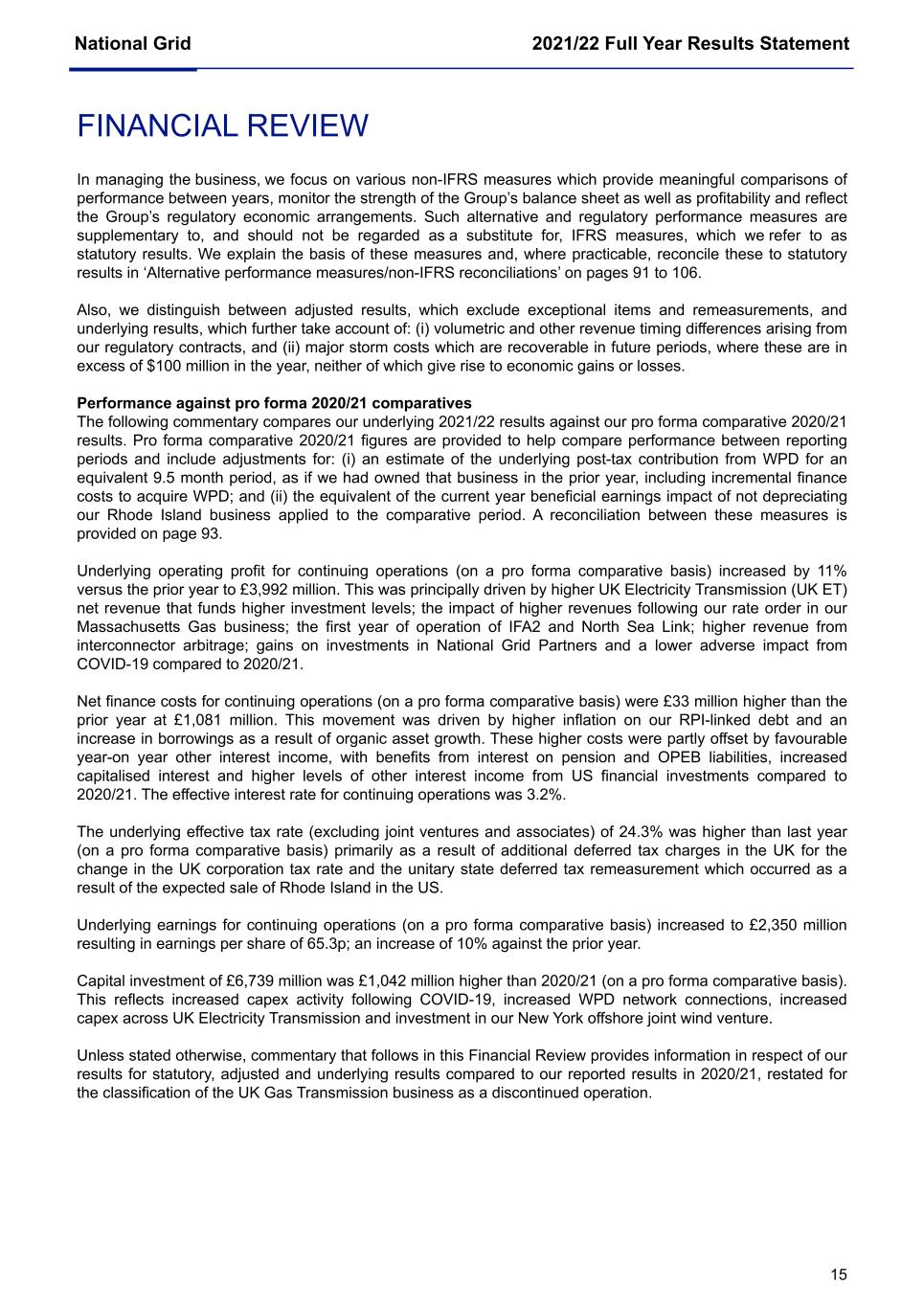
National Grid 2021/22 Full Year Results Statement 15 FINANCIAL REVIEW In managing the business, we focus on various non-IFRS measures which provide meaningful comparisons of performance between years, monitor the strength of the Group’s balance sheet as well as profitability and reflect the Group’s regulatory economic arrangements. Such alternative and regulatory performance measures are supplementary to, and should not be regarded as a substitute for, IFRS measures, which we refer to as statutory results. We explain the basis of these measures and, where practicable, reconcile these to statutory results in ‘Alternative performance measures/non-IFRS reconciliations’ on pages 91 to 106. Also, we distinguish between adjusted results, which exclude exceptional items and remeasurements, and underlying results, which further take account of: (i) volumetric and other revenue timing differences arising from our regulatory contracts, and (ii) major storm costs which are recoverable in future periods, where these are in excess of $100 million in the year, neither of which give rise to economic gains or losses. Performance against pro forma 2020/21 comparatives The following commentary compares our underlying 2021/22 results against our pro forma comparative 2020/21 results. Pro forma comparative 2020/21 figures are provided to help compare performance between reporting periods and include adjustments for: (i) an estimate of the underlying post-tax contribution from WPD for an equivalent 9.5 month period, as if we had owned that business in the prior year, including incremental finance costs to acquire WPD; and (ii) the equivalent of the current year beneficial earnings impact of not depreciating our Rhode Island business applied to the comparative period. A reconciliation between these measures is provided on page 93. Underlying operating profit for continuing operations (on a pro forma comparative basis) increased by 11% versus the prior year to £3,992 million. This was principally driven by higher UK Electricity Transmission (UK ET) net revenue that funds higher investment levels; the impact of higher revenues following our rate order in our Massachusetts Gas business; the first year of operation of IFA2 and North Sea Link; higher revenue from interconnector arbitrage; gains on investments in National Grid Partners and a lower adverse impact from COVID-19 compared to 2020/21. Net finance costs for continuing operations (on a pro forma comparative basis) were £33 million higher than the prior year at £1,081 million. This movement was driven by higher inflation on our RPI-linked debt and an increase in borrowings as a result of organic asset growth. These higher costs were partly offset by favourable year-on year other interest income, with benefits from interest on pension and OPEB liabilities, increased capitalised interest and higher levels of other interest income from US financial investments compared to 2020/21. The effective interest rate for continuing operations was 3.2%. The underlying effective tax rate (excluding joint ventures and associates) of 24.3% was higher than last year (on a pro forma comparative basis) primarily as a result of additional deferred tax charges in the UK for the change in the UK corporation tax rate and the unitary state deferred tax remeasurement which occurred as a result of the expected sale of Rhode Island in the US. Underlying earnings for continuing operations (on a pro forma comparative basis) increased to £2,350 million resulting in earnings per share of 65.3p; an increase of 10% against the prior year. Capital investment of £6,739 million was £1,042 million higher than 2020/21 (on a pro forma comparative basis). This reflects increased capex activity following COVID-19, increased WPD network connections, increased capex across UK Electricity Transmission and investment in our New York offshore joint wind venture. Unless stated otherwise, commentary that follows in this Financial Review provides information in respect of our results for statutory, adjusted and underlying results compared to our reported results in 2020/21, restated for the classification of the UK Gas Transmission business as a discontinued operation.
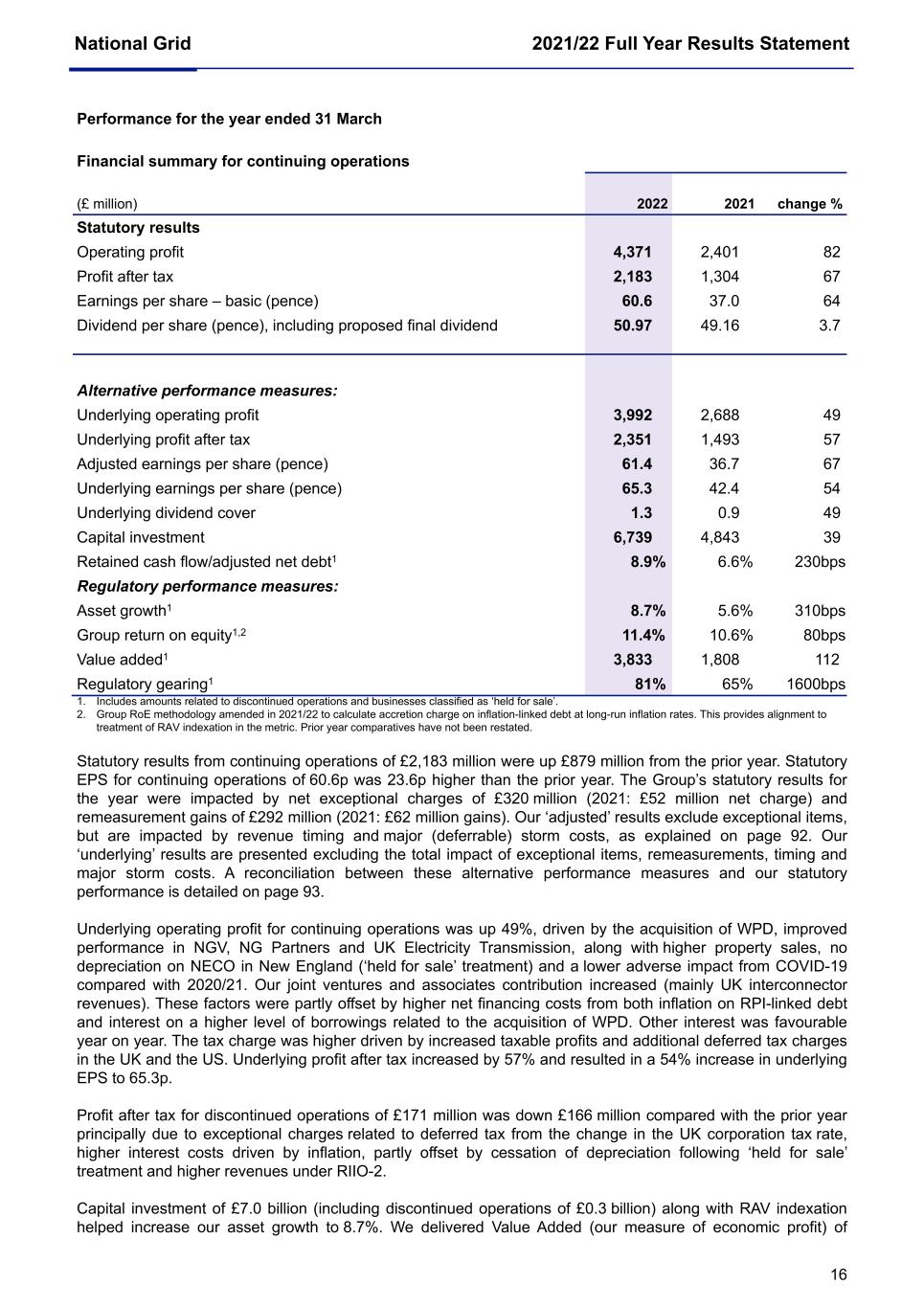
National Grid 2021/22 Full Year Results Statement 16 Performance for the year ended 31 March Financial summary for continuing operations (£ million) 2022 2021 change % Statutory results Operating profit 4,371 2,401 82 Profit after tax 2,183 1,304 67 Earnings per share – basic (pence) 60.6 37.0 64 Dividend per share (pence), including proposed final dividend 50.97 49.16 3.7 Alternative performance measures: Underlying operating profit 3,992 2,688 49 Underlying profit after tax 2,351 1,493 57 Adjusted earnings per share (pence) 61.4 36.7 67 Underlying earnings per share (pence) 65.3 42.4 54 Underlying dividend cover 1.3 0.9 49 Capital investment 6,739 4,843 39 Retained cash flow/adjusted net debt1 8.9% 6.6% 230bps Regulatory performance measures: Asset growth1 8.7% 5.6% 310bps Group return on equity1,2 11.4% 10.6% 80bps Value added1 3,833 1,808 112 Regulatory gearing1 81% 65% 1600bps 1. Includes amounts related to discontinued operations and businesses classified as ‘held for sale’. 2. Group RoE methodology amended in 2021/22 to calculate accretion charge on inflation-linked debt at long-run inflation rates. This provides alignment to treatment of RAV indexation in the metric. Prior year comparatives have not been restated. Statutory results from continuing operations of £2,183 million were up £879 million from the prior year. Statutory EPS for continuing operations of 60.6p was 23.6p higher than the prior year. The Group’s statutory results for the year were impacted by net exceptional charges of £320 million (2021: £52 million net charge) and remeasurement gains of £292 million (2021: £62 million gains). Our ‘adjusted’ results exclude exceptional items, but are impacted by revenue timing and major (deferrable) storm costs, as explained on page 92. Our ‘underlying’ results are presented excluding the total impact of exceptional items, remeasurements, timing and major storm costs. A reconciliation between these alternative performance measures and our statutory performance is detailed on page 93. Underlying operating profit for continuing operations was up 49%, driven by the acquisition of WPD, improved performance in NGV, NG Partners and UK Electricity Transmission, along with higher property sales, no depreciation on NECO in New England (‘held for sale’ treatment) and a lower adverse impact from COVID-19 compared with 2020/21. Our joint ventures and associates contribution increased (mainly UK interconnector revenues). These factors were partly offset by higher net financing costs from both inflation on RPI-linked debt and interest on a higher level of borrowings related to the acquisition of WPD. Other interest was favourable year on year. The tax charge was higher driven by increased taxable profits and additional deferred tax charges in the UK and the US. Underlying profit after tax increased by 57% and resulted in a 54% increase in underlying EPS to 65.3p. Profit after tax for discontinued operations of £171 million was down £166 million compared with the prior year principally due to exceptional charges related to deferred tax from the change in the UK corporation tax rate, higher interest costs driven by inflation, partly offset by cessation of depreciation following ‘held for sale’ treatment and higher revenues under RIIO-2. Capital investment of £7.0 billion (including discontinued operations of £0.3 billion) along with RAV indexation helped increase our asset growth to 8.7%. We delivered Value Added (our measure of economic profit) of
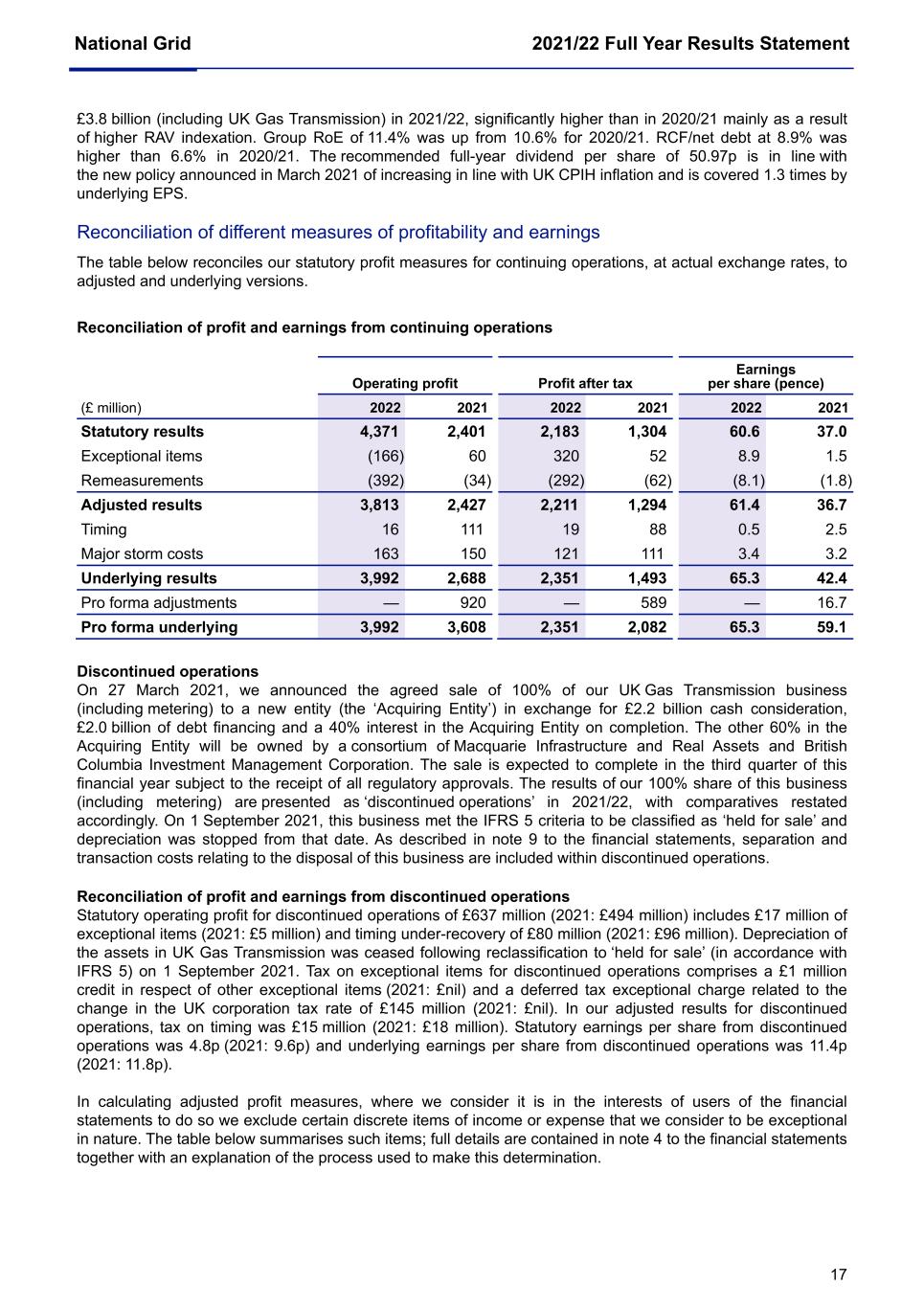
National Grid 2021/22 Full Year Results Statement 17 £3.8 billion (including UK Gas Transmission) in 2021/22, significantly higher than in 2020/21 mainly as a result of higher RAV indexation. Group RoE of 11.4% was up from 10.6% for 2020/21. RCF/net debt at 8.9% was higher than 6.6% in 2020/21. The recommended full-year dividend per share of 50.97p is in line with the new policy announced in March 2021 of increasing in line with UK CPIH inflation and is covered 1.3 times by underlying EPS. Reconciliation of different measures of profitability and earnings The table below reconciles our statutory profit measures for continuing operations, at actual exchange rates, to adjusted and underlying versions. Reconciliation of profit and earnings from continuing operations Operating profit Profit after tax Earnings per share (pence) (£ million) 2022 2021 2022 2021 2022 2021 Statutory results 4,371 2,401 2,183 1,304 60.6 37.0 Exceptional items (166) 60 320 52 8.9 1.5 Remeasurements (392) (34) (292) (62) (8.1) (1.8) Adjusted results 3,813 2,427 2,211 1,294 61.4 36.7 Timing 16 111 19 88 0.5 2.5 Major storm costs 163 150 121 111 3.4 3.2 Underlying results 3,992 2,688 2,351 1,493 65.3 42.4 Pro forma adjustments — 920 — 589 — 16.7 Pro forma underlying 3,992 3,608 2,351 2,082 65.3 59.1 Discontinued operations On 27 March 2021, we announced the agreed sale of 100% of our UK Gas Transmission business (including metering) to a new entity (the ‘Acquiring Entity’) in exchange for £2.2 billion cash consideration, £2.0 billion of debt financing and a 40% interest in the Acquiring Entity on completion. The other 60% in the Acquiring Entity will be owned by a consortium of Macquarie Infrastructure and Real Assets and British Columbia Investment Management Corporation. The sale is expected to complete in the third quarter of this financial year subject to the receipt of all regulatory approvals. The results of our 100% share of this business (including metering) are presented as ‘discontinued operations’ in 2021/22, with comparatives restated accordingly. On 1 September 2021, this business met the IFRS 5 criteria to be classified as ‘held for sale’ and depreciation was stopped from that date. As described in note 9 to the financial statements, separation and transaction costs relating to the disposal of this business are included within discontinued operations. Reconciliation of profit and earnings from discontinued operations Statutory operating profit for discontinued operations of £637 million (2021: £494 million) includes £17 million of exceptional items (2021: £5 million) and timing under-recovery of £80 million (2021: £96 million). Depreciation of the assets in UK Gas Transmission was ceased following reclassification to ‘held for sale’ (in accordance with IFRS 5) on 1 September 2021. Tax on exceptional items for discontinued operations comprises a £1 million credit in respect of other exceptional items (2021: £nil) and a deferred tax exceptional charge related to the change in the UK corporation tax rate of £145 million (2021: £nil). In our adjusted results for discontinued operations, tax on timing was £15 million (2021: £18 million). Statutory earnings per share from discontinued operations was 4.8p (2021: 9.6p) and underlying earnings per share from discontinued operations was 11.4p (2021: 11.8p). In calculating adjusted profit measures, where we consider it is in the interests of users of the financial statements to do so we exclude certain discrete items of income or expense that we consider to be exceptional in nature. The table below summarises such items; full details are contained in note 4 to the financial statements together with an explanation of the process used to make this determination.
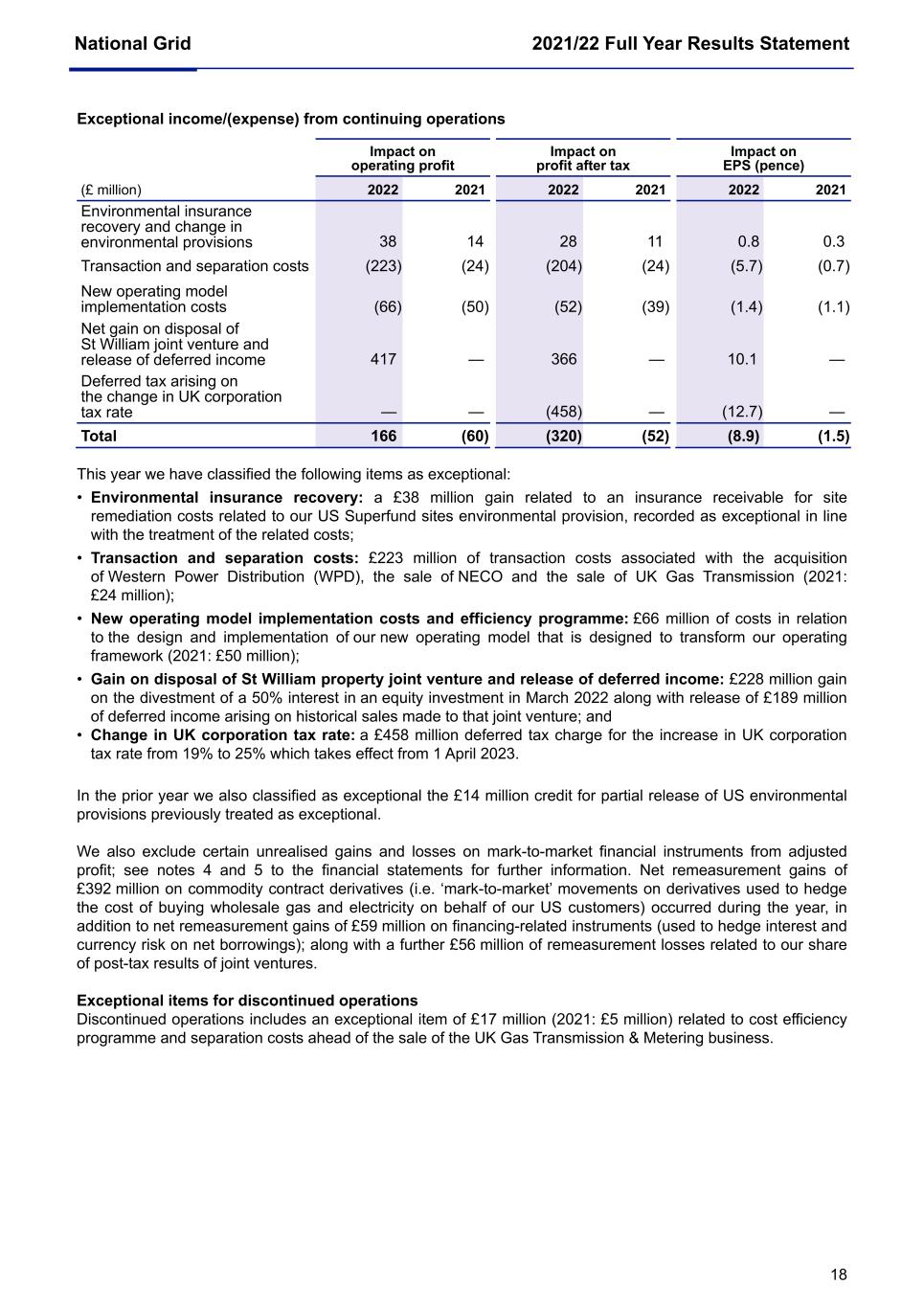
National Grid 2021/22 Full Year Results Statement 18 Exceptional income/(expense) from continuing operations Impact on operating profit Impact on profit after tax Impact on EPS (pence) (£ million) 2022 2021 2022 2021 2022 2021 Environmental insurance recovery and change in environmental provisions 38 14 28 11 0.8 0.3 Transaction and separation costs (223) (24) (204) (24) (5.7) (0.7) New operating model implementation costs (66) (50) (52) (39) (1.4) (1.1) Net gain on disposal of St William joint venture and release of deferred income 417 — 366 — 10.1 — Deferred tax arising on the change in UK corporation tax rate — — (458) — (12.7) — Total 166 (60) (320) (52) (8.9) (1.5) This year we have classified the following items as exceptional: • Environmental insurance recovery: a £38 million gain related to an insurance receivable for site remediation costs related to our US Superfund sites environmental provision, recorded as exceptional in line with the treatment of the related costs; • Transaction and separation costs: £223 million of transaction costs associated with the acquisition of Western Power Distribution (WPD), the sale of NECO and the sale of UK Gas Transmission (2021: £24 million); • New operating model implementation costs and efficiency programme: £66 million of costs in relation to the design and implementation of our new operating model that is designed to transform our operating framework (2021: £50 million); • Gain on disposal of St William property joint venture and release of deferred income: £228 million gain on the divestment of a 50% interest in an equity investment in March 2022 along with release of £189 million of deferred income arising on historical sales made to that joint venture; and • Change in UK corporation tax rate: a £458 million deferred tax charge for the increase in UK corporation tax rate from 19% to 25% which takes effect from 1 April 2023. In the prior year we also classified as exceptional the £14 million credit for partial release of US environmental provisions previously treated as exceptional. We also exclude certain unrealised gains and losses on mark-to-market financial instruments from adjusted profit; see notes 4 and 5 to the financial statements for further information. Net remeasurement gains of £392 million on commodity contract derivatives (i.e. ‘mark-to-market’ movements on derivatives used to hedge the cost of buying wholesale gas and electricity on behalf of our US customers) occurred during the year, in addition to net remeasurement gains of £59 million on financing-related instruments (used to hedge interest and currency risk on net borrowings); along with a further £56 million of remeasurement losses related to our share of post-tax results of joint ventures. Exceptional items for discontinued operations Discontinued operations includes an exceptional item of £17 million (2021: £5 million) related to cost efficiency programme and separation costs ahead of the sale of the UK Gas Transmission & Metering business.
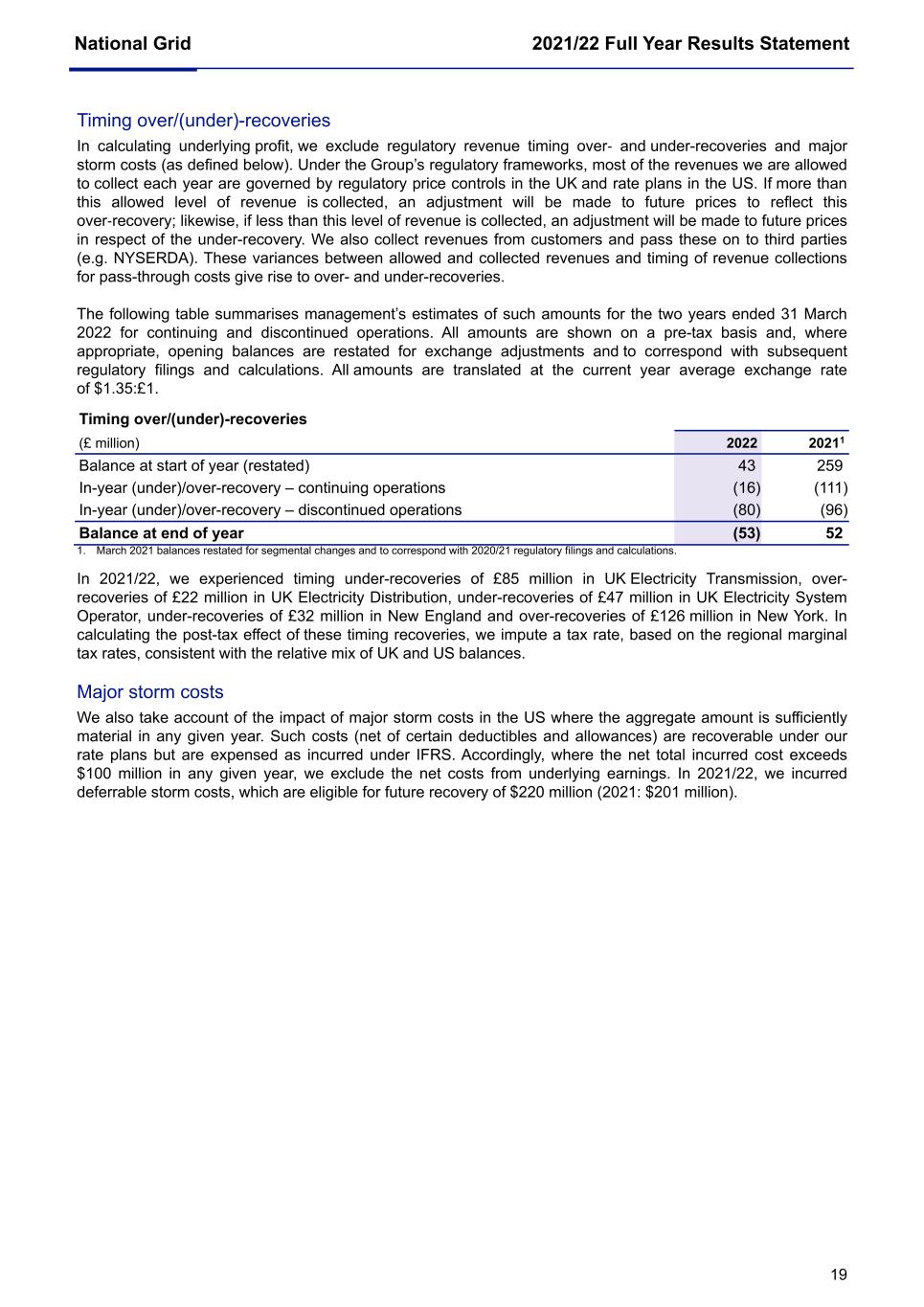
National Grid 2021/22 Full Year Results Statement 19 Timing over/(under)-recoveries In calculating underlying profit, we exclude regulatory revenue timing over‑ and under-recoveries and major storm costs (as defined below). Under the Group’s regulatory frameworks, most of the revenues we are allowed to collect each year are governed by regulatory price controls in the UK and rate plans in the US. If more than this allowed level of revenue is collected, an adjustment will be made to future prices to reflect this over‑recovery; likewise, if less than this level of revenue is collected, an adjustment will be made to future prices in respect of the under-recovery. We also collect revenues from customers and pass these on to third parties (e.g. NYSERDA). These variances between allowed and collected revenues and timing of revenue collections for pass-through costs give rise to over- and under-recoveries. The following table summarises management’s estimates of such amounts for the two years ended 31 March 2022 for continuing and discontinued operations. All amounts are shown on a pre-tax basis and, where appropriate, opening balances are restated for exchange adjustments and to correspond with subsequent regulatory filings and calculations. All amounts are translated at the current year average exchange rate of $1.35:£1. Timing over/(under)-recoveries (£ million) 2022 20211 Balance at start of year (restated) 43 259 In-year (under)/over-recovery – continuing operations (16) (111) In-year (under)/over-recovery – discontinued operations (80) (96) Balance at end of year (53) 52 1. March 2021 balances restated for segmental changes and to correspond with 2020/21 regulatory filings and calculations. In 2021/22, we experienced timing under-recoveries of £85 million in UK Electricity Transmission, over- recoveries of £22 million in UK Electricity Distribution, under-recoveries of £47 million in UK Electricity System Operator, under-recoveries of £32 million in New England and over-recoveries of £126 million in New York. In calculating the post-tax effect of these timing recoveries, we impute a tax rate, based on the regional marginal tax rates, consistent with the relative mix of UK and US balances. Major storm costs We also take account of the impact of major storm costs in the US where the aggregate amount is sufficiently material in any given year. Such costs (net of certain deductibles and allowances) are recoverable under our rate plans but are expensed as incurred under IFRS. Accordingly, where the net total incurred cost exceeds $100 million in any given year, we exclude the net costs from underlying earnings. In 2021/22, we incurred deferrable storm costs, which are eligible for future recovery of $220 million (2021: $201 million).
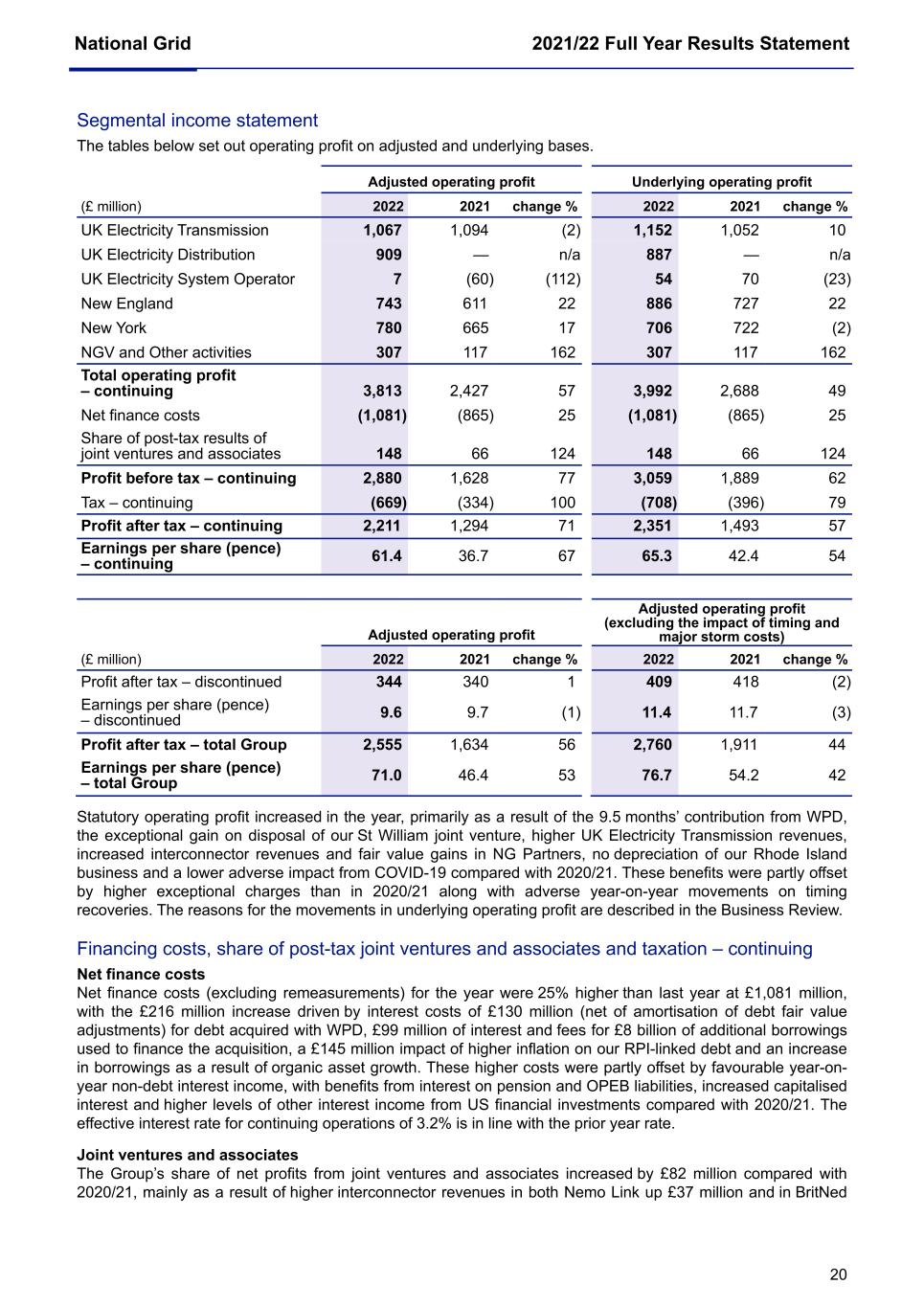
National Grid 2021/22 Full Year Results Statement 20 Segmental income statement The tables below set out operating profit on adjusted and underlying bases. Adjusted operating profit Underlying operating profit (£ million) 2022 2021 change % 2022 2021 change % UK Electricity Transmission 1,067 1,094 (2) 1,152 1,052 10 UK Electricity Distribution 909 — n/a 887 — n/a UK Electricity System Operator 7 (60) (112) 54 70 (23) New England 743 611 22 886 727 22 New York 780 665 17 706 722 (2) NGV and Other activities 307 117 162 307 117 162 Total operating profit – continuing 3,813 2,427 57 3,992 2,688 49 Net finance costs (1,081) (865) 25 (1,081) (865) 25 Share of post-tax results of joint ventures and associates 148 66 124 148 66 124 Profit before tax – continuing 2,880 1,628 77 3,059 1,889 62 Tax – continuing (669) (334) 100 (708) (396) 79 Profit after tax – continuing 2,211 1,294 71 2,351 1,493 57 Earnings per share (pence) – continuing 61.4 36.7 67 65.3 42.4 54 Adjusted operating profit Adjusted operating profit (excluding the impact of timing and major storm costs) (£ million) 2022 2021 change % 2022 2021 change % Profit after tax – discontinued 344 340 1 409 418 (2) Earnings per share (pence) – discontinued 9.6 9.7 (1) 11.4 11.7 (3) Profit after tax – total Group 2,555 1,634 56 2,760 1,911 44 Earnings per share (pence) – total Group 71.0 46.4 53 76.7 54.2 42 Statutory operating profit increased in the year, primarily as a result of the 9.5 months’ contribution from WPD, the exceptional gain on disposal of our St William joint venture, higher UK Electricity Transmission revenues, increased interconnector revenues and fair value gains in NG Partners, no depreciation of our Rhode Island business and a lower adverse impact from COVID-19 compared with 2020/21. These benefits were partly offset by higher exceptional charges than in 2020/21 along with adverse year-on-year movements on timing recoveries. The reasons for the movements in underlying operating profit are described in the Business Review. Financing costs, share of post-tax joint ventures and associates and taxation – continuing Net finance costs Net finance costs (excluding remeasurements) for the year were 25% higher than last year at £1,081 million, with the £216 million increase driven by interest costs of £130 million (net of amortisation of debt fair value adjustments) for debt acquired with WPD, £99 million of interest and fees for £8 billion of additional borrowings used to finance the acquisition, a £145 million impact of higher inflation on our RPI-linked debt and an increase in borrowings as a result of organic asset growth. These higher costs were partly offset by favourable year-on- year non-debt interest income, with benefits from interest on pension and OPEB liabilities, increased capitalised interest and higher levels of other interest income from US financial investments compared with 2020/21. The effective interest rate for continuing operations of 3.2% is in line with the prior year rate. Joint ventures and associates The Group’s share of net profits from joint ventures and associates increased by £82 million compared with 2020/21, mainly as a result of higher interconnector revenues in both Nemo Link up £37 million and in BritNed
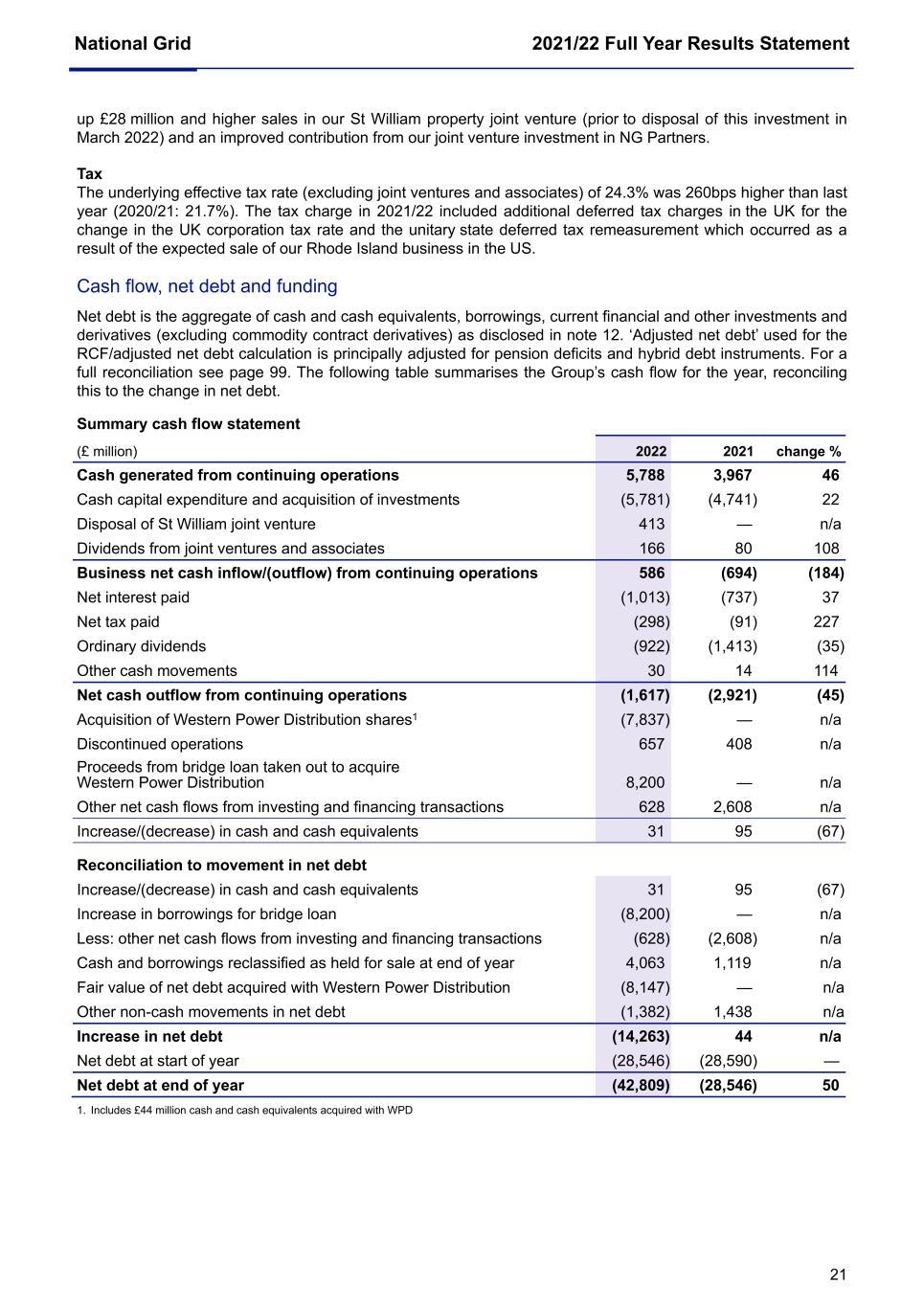
National Grid 2021/22 Full Year Results Statement 21 up £28 million and higher sales in our St William property joint venture (prior to disposal of this investment in March 2022) and an improved contribution from our joint venture investment in NG Partners. Tax The underlying effective tax rate (excluding joint ventures and associates) of 24.3% was 260bps higher than last year (2020/21: 21.7%). The tax charge in 2021/22 included additional deferred tax charges in the UK for the change in the UK corporation tax rate and the unitary state deferred tax remeasurement which occurred as a result of the expected sale of our Rhode Island business in the US. Cash flow, net debt and funding Net debt is the aggregate of cash and cash equivalents, borrowings, current financial and other investments and derivatives (excluding commodity contract derivatives) as disclosed in note 12. ‘Adjusted net debt’ used for the RCF/adjusted net debt calculation is principally adjusted for pension deficits and hybrid debt instruments. For a full reconciliation see page 99. The following table summarises the Group’s cash flow for the year, reconciling this to the change in net debt. Summary cash flow statement (£ million) 2022 2021 change % Cash generated from continuing operations 5,788 3,967 46 Cash capital expenditure and acquisition of investments (5,781) (4,741) 22 Disposal of St William joint venture 413 — n/a Dividends from joint ventures and associates 166 80 108 Business net cash inflow/(outflow) from continuing operations 586 (694) (184) Net interest paid (1,013) (737) 37 Net tax paid (298) (91) 227 Ordinary dividends (922) (1,413) (35) Other cash movements 30 14 114 Net cash outflow from continuing operations (1,617) (2,921) (45) Acquisition of Western Power Distribution shares1 (7,837) — n/a Discontinued operations 657 408 n/a Proceeds from bridge loan taken out to acquire Western Power Distribution 8,200 — n/a Other net cash flows from investing and financing transactions 628 2,608 n/a Increase/(decrease) in cash and cash equivalents 31 95 (67) Reconciliation to movement in net debt Increase/(decrease) in cash and cash equivalents 31 95 (67) Increase in borrowings for bridge loan (8,200) — n/a Less: other net cash flows from investing and financing transactions (628) (2,608) n/a Cash and borrowings reclassified as held for sale at end of year 4,063 1,119 n/a Fair value of net debt acquired with Western Power Distribution (8,147) — n/a Other non-cash movements in net debt (1,382) 1,438 n/a Increase in net debt (14,263) 44 n/a Net debt at start of year (28,546) (28,590) — Net debt at end of year (42,809) (28,546) 50 1. Includes £44 million cash and cash equivalents acquired with WPD
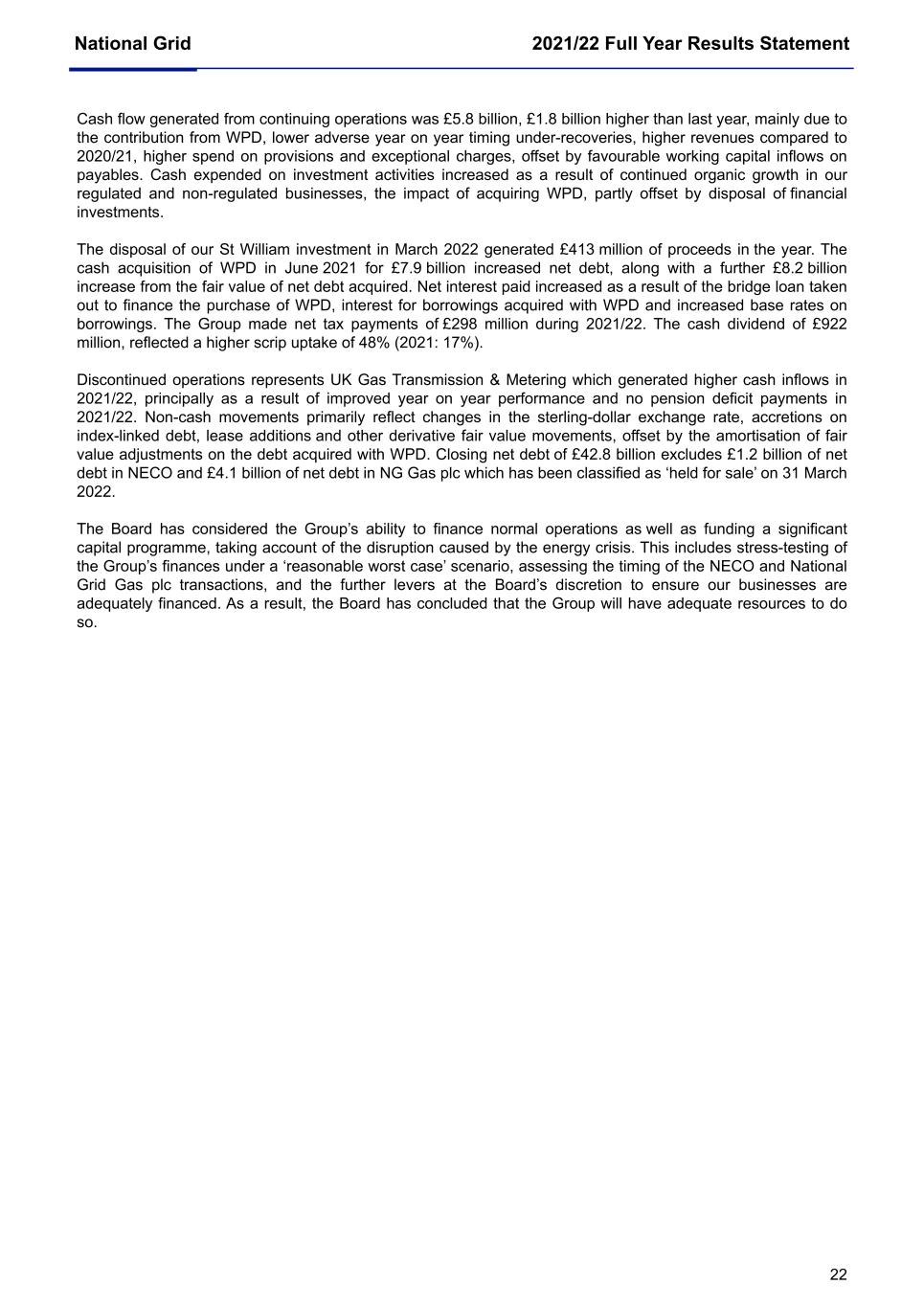
National Grid 2021/22 Full Year Results Statement 22 Cash flow generated from continuing operations was £5.8 billion, £1.8 billion higher than last year, mainly due to the contribution from WPD, lower adverse year on year timing under-recoveries, higher revenues compared to 2020/21, higher spend on provisions and exceptional charges, offset by favourable working capital inflows on payables. Cash expended on investment activities increased as a result of continued organic growth in our regulated and non-regulated businesses, the impact of acquiring WPD, partly offset by disposal of financial investments. The disposal of our St William investment in March 2022 generated £413 million of proceeds in the year. The cash acquisition of WPD in June 2021 for £7.9 billion increased net debt, along with a further £8.2 billion increase from the fair value of net debt acquired. Net interest paid increased as a result of the bridge loan taken out to finance the purchase of WPD, interest for borrowings acquired with WPD and increased base rates on borrowings. The Group made net tax payments of £298 million during 2021/22. The cash dividend of £922 million, reflected a higher scrip uptake of 48% (2021: 17%). Discontinued operations represents UK Gas Transmission & Metering which generated higher cash inflows in 2021/22, principally as a result of improved year on year performance and no pension deficit payments in 2021/22. Non-cash movements primarily reflect changes in the sterling-dollar exchange rate, accretions on index-linked debt, lease additions and other derivative fair value movements, offset by the amortisation of fair value adjustments on the debt acquired with WPD. Closing net debt of £42.8 billion excludes £1.2 billion of net debt in NECO and £4.1 billion of net debt in NG Gas plc which has been classified as ‘held for sale’ on 31 March 2022. The Board has considered the Group’s ability to finance normal operations as well as funding a significant capital programme, taking account of the disruption caused by the energy crisis. This includes stress-testing of the Group’s finances under a ‘reasonable worst case’ scenario, assessing the timing of the NECO and National Grid Gas plc transactions, and the further levers at the Board’s discretion to ensure our businesses are adequately financed. As a result, the Board has concluded that the Group will have adequate resources to do so.
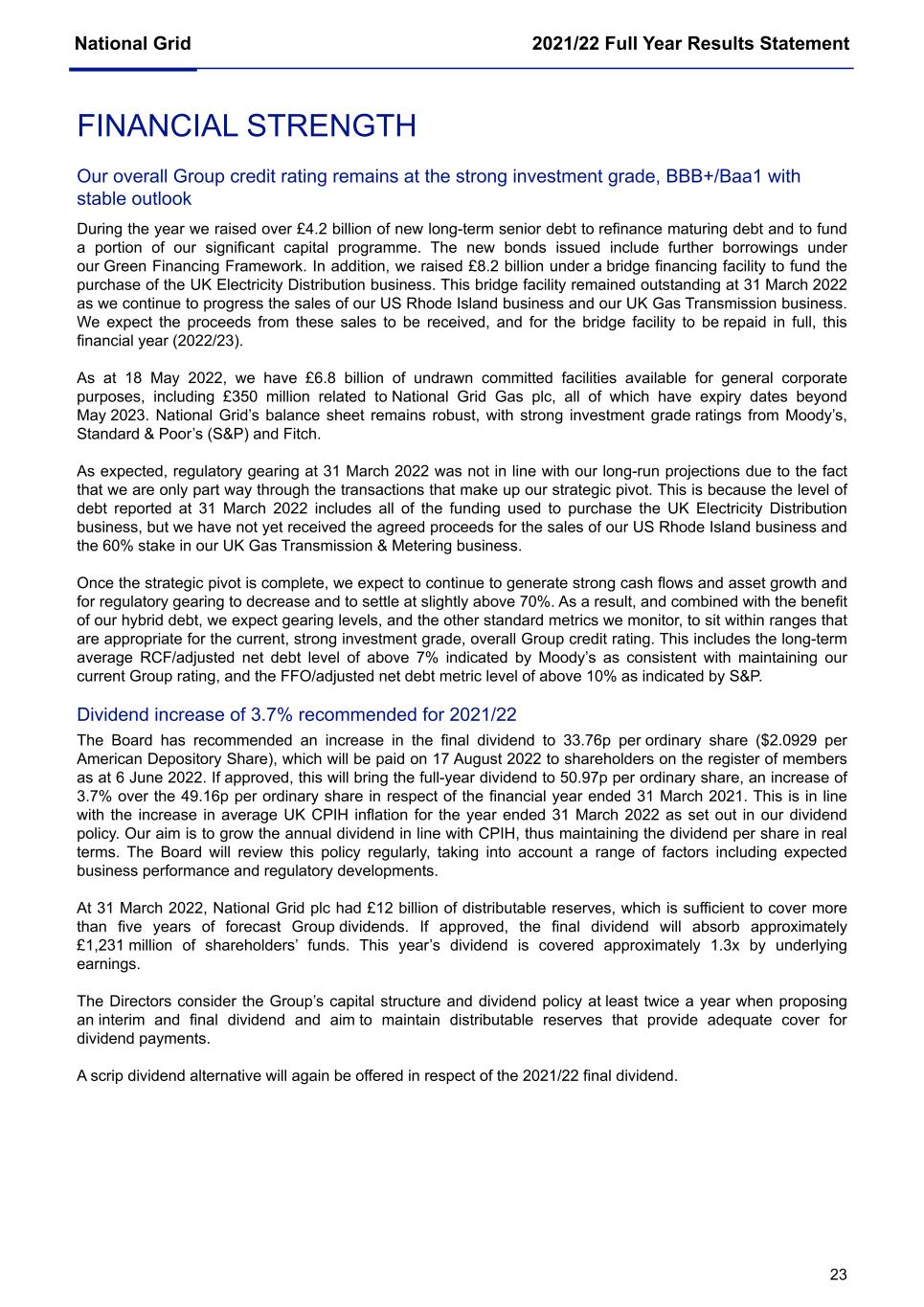
National Grid 2021/22 Full Year Results Statement 23 FINANCIAL STRENGTH Our overall Group credit rating remains at the strong investment grade, BBB+/Baa1 with stable outlook During the year we raised over £4.2 billion of new long-term senior debt to refinance maturing debt and to fund a portion of our significant capital programme. The new bonds issued include further borrowings under our Green Financing Framework. In addition, we raised £8.2 billion under a bridge financing facility to fund the purchase of the UK Electricity Distribution business. This bridge facility remained outstanding at 31 March 2022 as we continue to progress the sales of our US Rhode Island business and our UK Gas Transmission business. We expect the proceeds from these sales to be received, and for the bridge facility to be repaid in full, this financial year (2022/23). As at 18 May 2022, we have £6.8 billion of undrawn committed facilities available for general corporate purposes, including £350 million related to National Grid Gas plc, all of which have expiry dates beyond May 2023. National Grid’s balance sheet remains robust, with strong investment grade ratings from Moody’s, Standard & Poor’s (S&P) and Fitch. As expected, regulatory gearing at 31 March 2022 was not in line with our long-run projections due to the fact that we are only part way through the transactions that make up our strategic pivot. This is because the level of debt reported at 31 March 2022 includes all of the funding used to purchase the UK Electricity Distribution business, but we have not yet received the agreed proceeds for the sales of our US Rhode Island business and the 60% stake in our UK Gas Transmission & Metering business. Once the strategic pivot is complete, we expect to continue to generate strong cash flows and asset growth and for regulatory gearing to decrease and to settle at slightly above 70%. As a result, and combined with the benefit of our hybrid debt, we expect gearing levels, and the other standard metrics we monitor, to sit within ranges that are appropriate for the current, strong investment grade, overall Group credit rating. This includes the long-term average RCF/adjusted net debt level of above 7% indicated by Moody’s as consistent with maintaining our current Group rating, and the FFO/adjusted net debt metric level of above 10% as indicated by S&P. Dividend increase of 3.7% recommended for 2021/22 The Board has recommended an increase in the final dividend to 33.76p per ordinary share ($2.0929 per American Depository Share), which will be paid on 17 August 2022 to shareholders on the register of members as at 6 June 2022. If approved, this will bring the full-year dividend to 50.97p per ordinary share, an increase of 3.7% over the 49.16p per ordinary share in respect of the financial year ended 31 March 2021. This is in line with the increase in average UK CPIH inflation for the year ended 31 March 2022 as set out in our dividend policy. Our aim is to grow the annual dividend in line with CPIH, thus maintaining the dividend per share in real terms. The Board will review this policy regularly, taking into account a range of factors including expected business performance and regulatory developments. At 31 March 2022, National Grid plc had £12 billion of distributable reserves, which is sufficient to cover more than five years of forecast Group dividends. If approved, the final dividend will absorb approximately £1,231 million of shareholders’ funds. This year’s dividend is covered approximately 1.3x by underlying earnings. The Directors consider the Group’s capital structure and dividend policy at least twice a year when proposing an interim and final dividend and aim to maintain distributable reserves that provide adequate cover for dividend payments. A scrip dividend alternative will again be offered in respect of the 2021/22 final dividend.
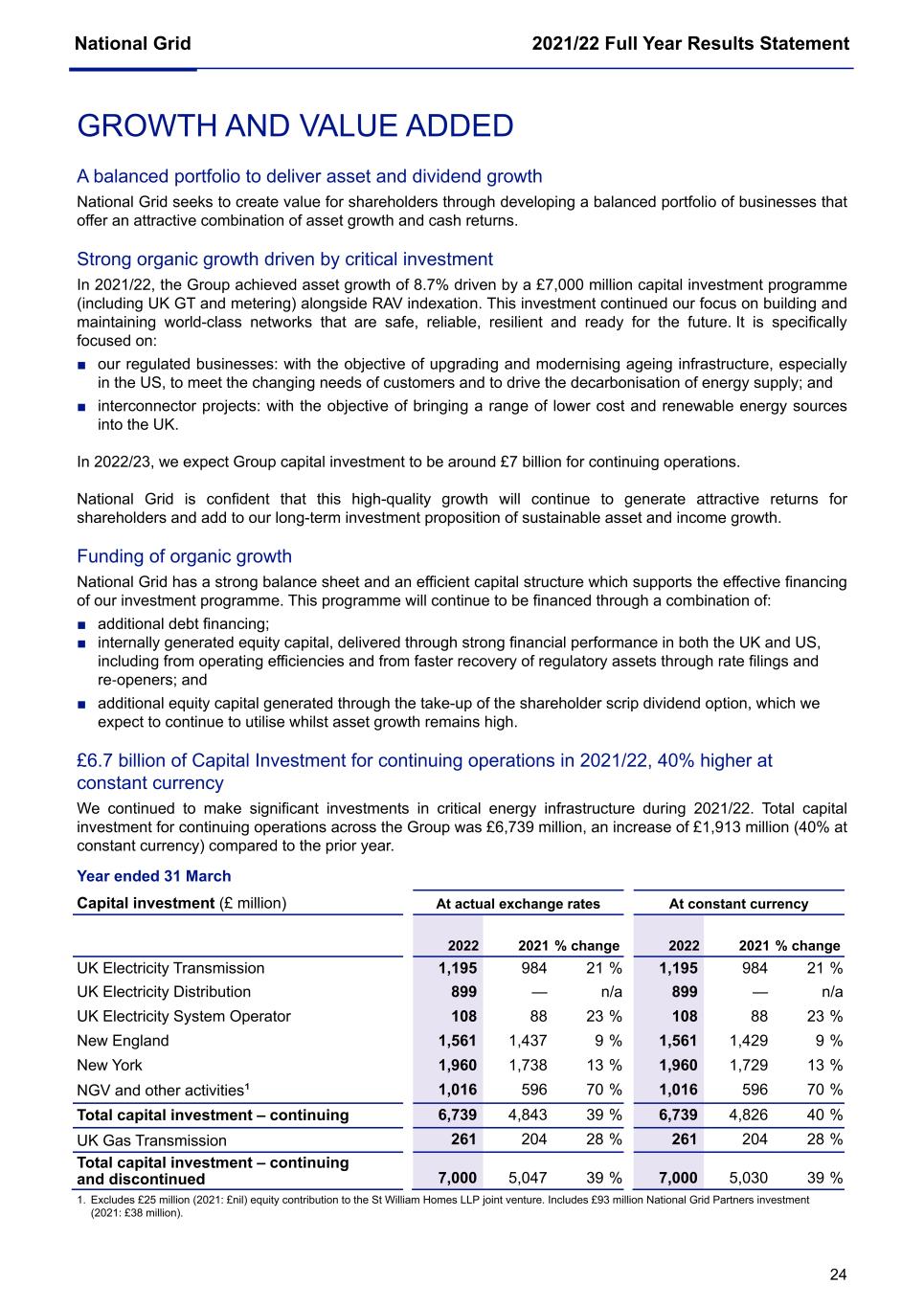
National Grid 2021/22 Full Year Results Statement 24 GROWTH AND VALUE ADDED A balanced portfolio to deliver asset and dividend growth National Grid seeks to create value for shareholders through developing a balanced portfolio of businesses that offer an attractive combination of asset growth and cash returns. Strong organic growth driven by critical investment In 2021/22, the Group achieved asset growth of 8.7% driven by a £7,000 million capital investment programme (including UK GT and metering) alongside RAV indexation. This investment continued our focus on building and maintaining world-class networks that are safe, reliable, resilient and ready for the future. It is specifically focused on: ■ our regulated businesses: with the objective of upgrading and modernising ageing infrastructure, especially in the US, to meet the changing needs of customers and to drive the decarbonisation of energy supply; and ■ interconnector projects: with the objective of bringing a range of lower cost and renewable energy sources into the UK. In 2022/23, we expect Group capital investment to be around £7 billion for continuing operations. National Grid is confident that this high-quality growth will continue to generate attractive returns for shareholders and add to our long-term investment proposition of sustainable asset and income growth. Funding of organic growth National Grid has a strong balance sheet and an efficient capital structure which supports the effective financing of our investment programme. This programme will continue to be financed through a combination of: ■ additional debt financing; ■ internally generated equity capital, delivered through strong financial performance in both the UK and US, including from operating efficiencies and from faster recovery of regulatory assets through rate filings and re‑openers; and ■ additional equity capital generated through the take-up of the shareholder scrip dividend option, which we expect to continue to utilise whilst asset growth remains high. £6.7 billion of Capital Investment for continuing operations in 2021/22, 40% higher at constant currency We continued to make significant investments in critical energy infrastructure during 2021/22. Total capital investment for continuing operations across the Group was £6,739 million, an increase of £1,913 million (40% at constant currency) compared to the prior year. Year ended 31 March Capital investment (£ million) At actual exchange rates At constant currency 2022 2021 % change 2022 2021 % change UK Electricity Transmission 1,195 984 21 % 1,195 984 21 % UK Electricity Distribution 899 — n/a 899 — n/a UK Electricity System Operator 108 88 23 % 108 88 23 % New England 1,561 1,437 9 % 1,561 1,429 9 % New York 1,960 1,738 13 % 1,960 1,729 13 % NGV and other activities¹ 1,016 596 70 % 1,016 596 70 % Total capital investment – continuing 6,739 4,843 39 % 6,739 4,826 40 % UK Gas Transmission 261 204 28 % 261 204 28 % Total capital investment – continuing and discontinued 7,000 5,047 39 % 7,000 5,030 39 % 1. Excludes £25 million (2021: £nil) equity contribution to the St William Homes LLP joint venture. Includes £93 million National Grid Partners investment (2021: £38 million).
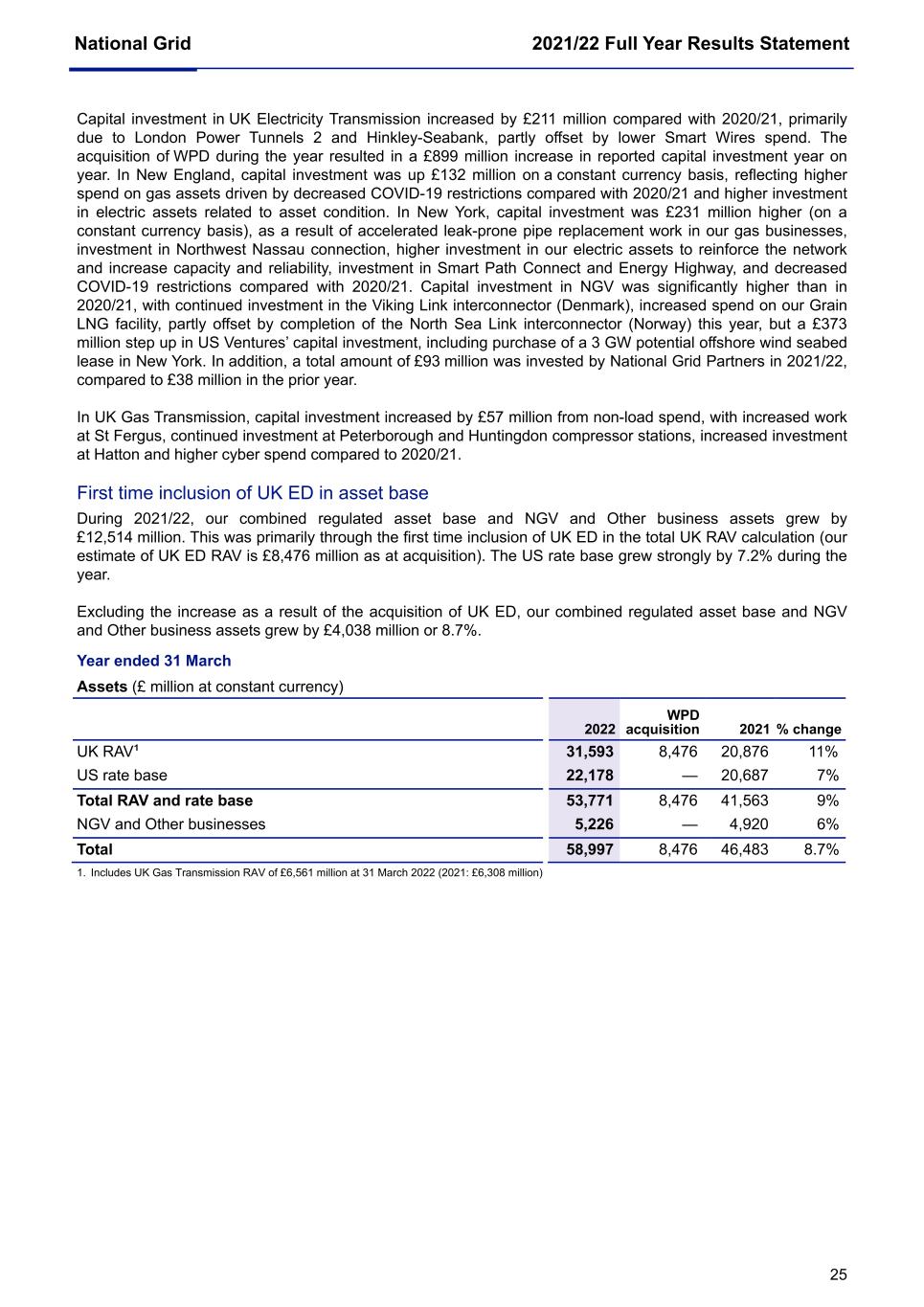
National Grid 2021/22 Full Year Results Statement 25 Capital investment in UK Electricity Transmission increased by £211 million compared with 2020/21, primarily due to London Power Tunnels 2 and Hinkley-Seabank, partly offset by lower Smart Wires spend. The acquisition of WPD during the year resulted in a £899 million increase in reported capital investment year on year. In New England, capital investment was up £132 million on a constant currency basis, reflecting higher spend on gas assets driven by decreased COVID-19 restrictions compared with 2020/21 and higher investment in electric assets related to asset condition. In New York, capital investment was £231 million higher (on a constant currency basis), as a result of accelerated leak-prone pipe replacement work in our gas businesses, investment in Northwest Nassau connection, higher investment in our electric assets to reinforce the network and increase capacity and reliability, investment in Smart Path Connect and Energy Highway, and decreased COVID-19 restrictions compared with 2020/21. Capital investment in NGV was significantly higher than in 2020/21, with continued investment in the Viking Link interconnector (Denmark), increased spend on our Grain LNG facility, partly offset by completion of the North Sea Link interconnector (Norway) this year, but a £373 million step up in US Ventures’ capital investment, including purchase of a 3 GW potential offshore wind seabed lease in New York. In addition, a total amount of £93 million was invested by National Grid Partners in 2021/22, compared to £38 million in the prior year. In UK Gas Transmission, capital investment increased by £57 million from non-load spend, with increased work at St Fergus, continued investment at Peterborough and Huntingdon compressor stations, increased investment at Hatton and higher cyber spend compared to 2020/21. First time inclusion of UK ED in asset base During 2021/22, our combined regulated asset base and NGV and Other business assets grew by £12,514 million. This was primarily through the first time inclusion of UK ED in the total UK RAV calculation (our estimate of UK ED RAV is £8,476 million as at acquisition). The US rate base grew strongly by 7.2% during the year. Excluding the increase as a result of the acquisition of UK ED, our combined regulated asset base and NGV and Other business assets grew by £4,038 million or 8.7%. Year ended 31 March Assets (£ million at constant currency) 2022 WPD acquisition 2021 % change UK RAV¹ 31,593 8,476 20,876 11% US rate base 22,178 — 20,687 7% Total RAV and rate base 53,771 8,476 41,563 9% NGV and Other businesses 5,226 — 4,920 6% Total 58,997 8,476 46,483 8.7% 1. Includes UK Gas Transmission RAV of £6,561 million at 31 March 2022 (2021: £6,308 million)
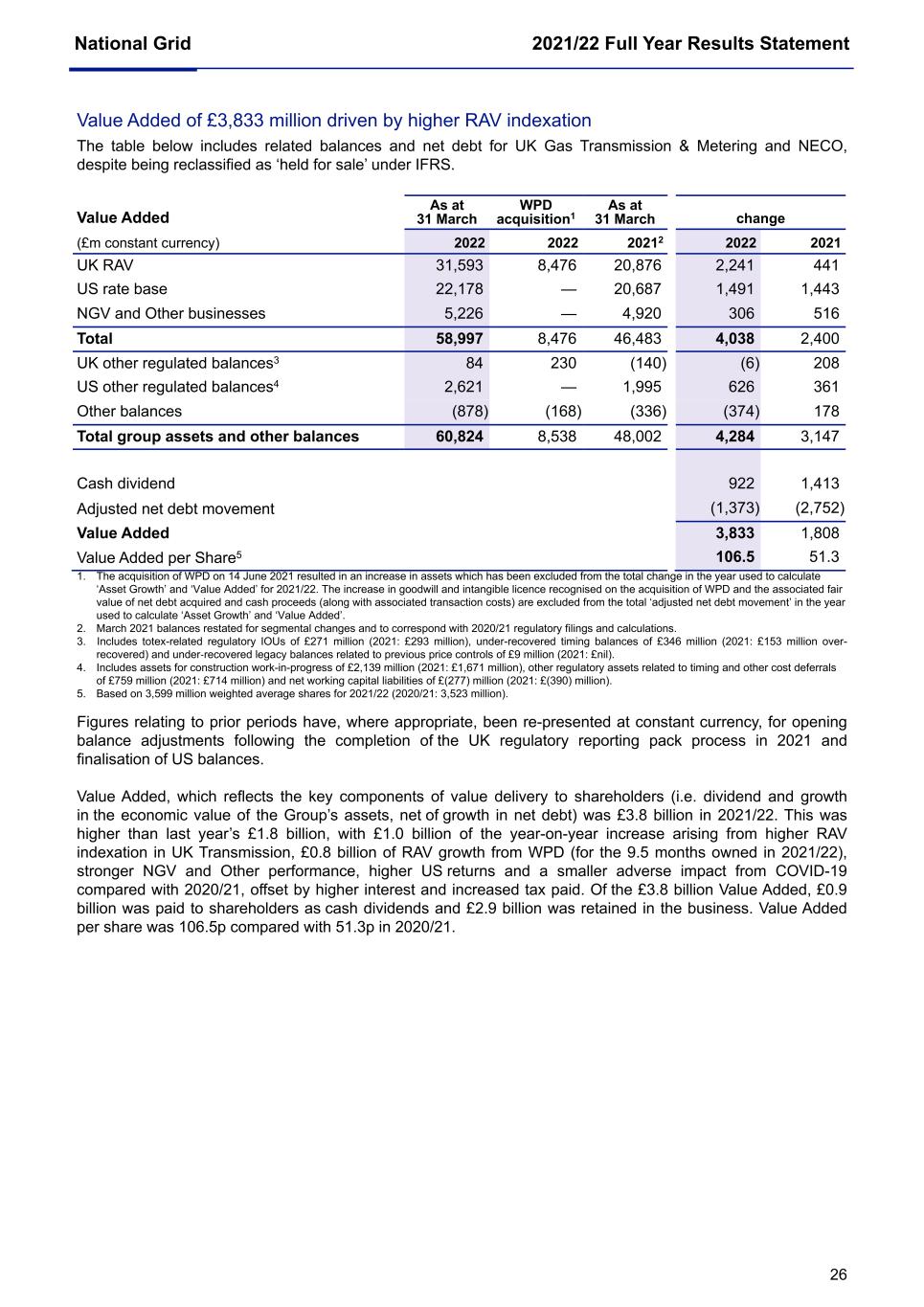
National Grid 2021/22 Full Year Results Statement 26 Value Added of £3,833 million driven by higher RAV indexation The table below includes related balances and net debt for UK Gas Transmission & Metering and NECO, despite being reclassified as ‘held for sale’ under IFRS. Value Added As at 31 March WPD acquisition1 As at 31 March change (£m constant currency) 2022 2022 20212 2022 2021 UK RAV 31,593 8,476 20,876 2,241 441 US rate base 22,178 — 20,687 1,491 1,443 NGV and Other businesses 5,226 — 4,920 306 516 Total 58,997 8,476 46,483 4,038 2,400 UK other regulated balances3 84 230 (140) (6) 208 US other regulated balances4 2,621 — 1,995 626 361 Other balances (878) (168) (336) (374) 178 Total group assets and other balances 60,824 8,538 48,002 4,284 3,147 Cash dividend 922 1,413 Adjusted net debt movement (1,373) (2,752) Value Added 3,833 1,808 Value Added per Share5 106.5 51.3 1. The acquisition of WPD on 14 June 2021 resulted in an increase in assets which has been excluded from the total change in the year used to calculate ‘Asset Growth’ and ‘Value Added’ for 2021/22. The increase in goodwill and intangible licence recognised on the acquisition of WPD and the associated fair value of net debt acquired and cash proceeds (along with associated transaction costs) are excluded from the total ‘adjusted net debt movement’ in the year used to calculate ‘Asset Growth’ and ‘Value Added’. 2. March 2021 balances restated for segmental changes and to correspond with 2020/21 regulatory filings and calculations. 3. Includes totex-related regulatory IOUs of £271 million (2021: £293 million), under-recovered timing balances of £346 million (2021: £153 million over- recovered) and under‑recovered legacy balances related to previous price controls of £9 million (2021: £nil). 4. Includes assets for construction work-in-progress of £2,139 million (2021: £1,671 million), other regulatory assets related to timing and other cost deferrals of £759 million (2021: £714 million) and net working capital liabilities of £(277) million (2021: £(390) million). 5. Based on 3,599 million weighted average shares for 2021/22 (2020/21: 3,523 million). Figures relating to prior periods have, where appropriate, been re-presented at constant currency, for opening balance adjustments following the completion of the UK regulatory reporting pack process in 2021 and finalisation of US balances. Value Added, which reflects the key components of value delivery to shareholders (i.e. dividend and growth in the economic value of the Group’s assets, net of growth in net debt) was £3.8 billion in 2021/22. This was higher than last year’s £1.8 billion, with £1.0 billion of the year-on-year increase arising from higher RAV indexation in UK Transmission, £0.8 billion of RAV growth from WPD (for the 9.5 months owned in 2021/22), stronger NGV and Other performance, higher US returns and a smaller adverse impact from COVID-19 compared with 2020/21, offset by higher interest and increased tax paid. Of the £3.8 billion Value Added, £0.9 billion was paid to shareholders as cash dividends and £2.9 billion was retained in the business. Value Added per share was 106.5p compared with 51.3p in 2020/21.
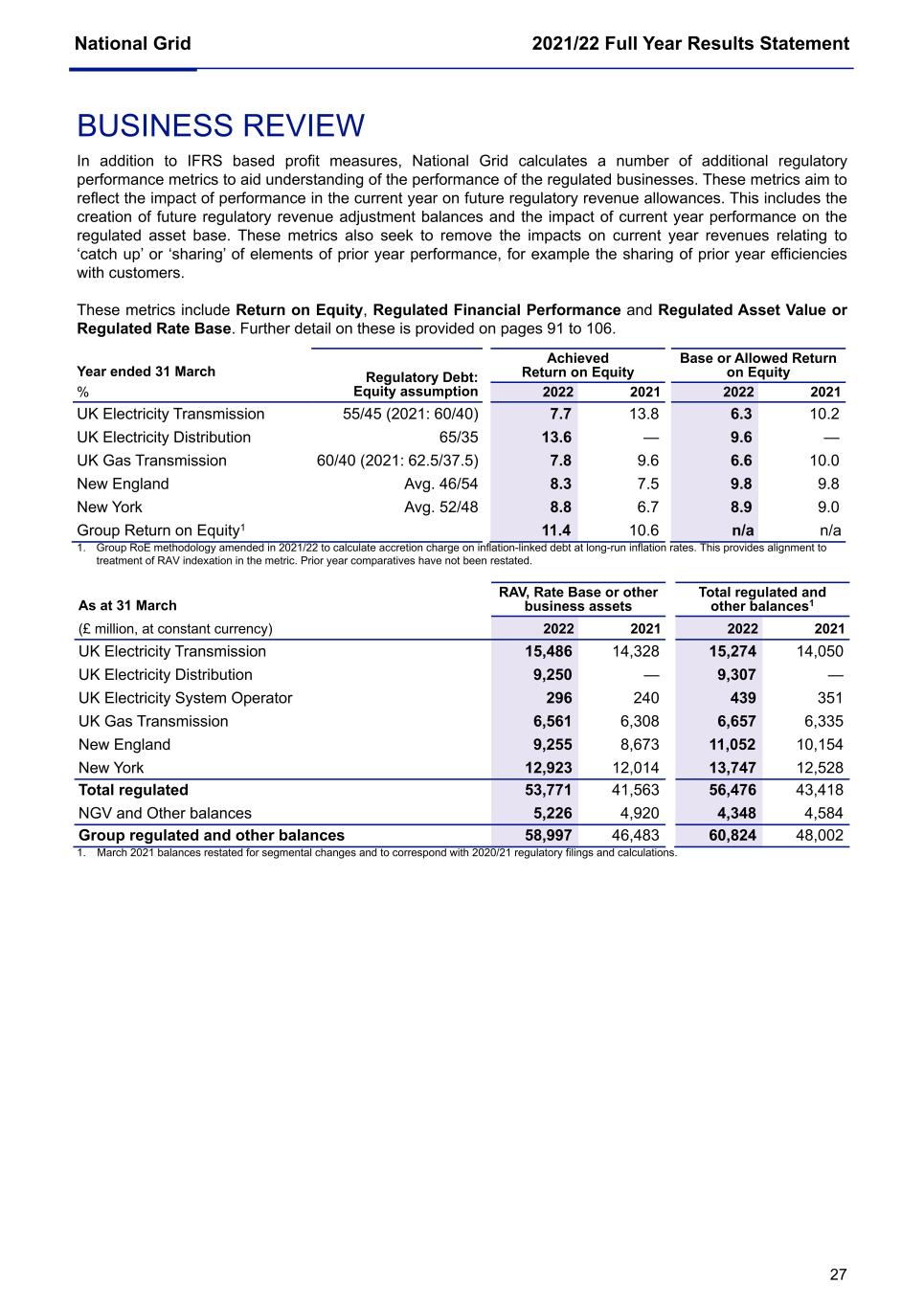
National Grid 2021/22 Full Year Results Statement 27 BUSINESS REVIEW In addition to IFRS based profit measures, National Grid calculates a number of additional regulatory performance metrics to aid understanding of the performance of the regulated businesses. These metrics aim to reflect the impact of performance in the current year on future regulatory revenue allowances. This includes the creation of future regulatory revenue adjustment balances and the impact of current year performance on the regulated asset base. These metrics also seek to remove the impacts on current year revenues relating to ‘catch up’ or ‘sharing’ of elements of prior year performance, for example the sharing of prior year efficiencies with customers. These metrics include Return on Equity, Regulated Financial Performance and Regulated Asset Value or Regulated Rate Base. Further detail on these is provided on pages 91 to 106. Year ended 31 March Regulatory Debt: Equity assumption Achieved Return on Equity Base or Allowed Return on Equity % 2022 2021 2022 2021 UK Electricity Transmission 55/45 (2021: 60/40) 7.7 13.8 6.3 10.2 UK Electricity Distribution 65/35 13.6 — 9.6 — UK Gas Transmission 60/40 (2021: 62.5/37.5) 7.8 9.6 6.6 10.0 New England Avg. 46/54 8.3 7.5 9.8 9.8 New York Avg. 52/48 8.8 6.7 8.9 9.0 Group Return on Equity1 11.4 10.6 n/a n/a 1. Group RoE methodology amended in 2021/22 to calculate accretion charge on inflation-linked debt at long-run inflation rates. This provides alignment to treatment of RAV indexation in the metric. Prior year comparatives have not been restated. As at 31 March RAV, Rate Base or other business assets Total regulated and other balances1 (£ million, at constant currency) 2022 2021 2022 2021 UK Electricity Transmission 15,486 14,328 15,274 14,050 UK Electricity Distribution 9,250 — 9,307 — UK Electricity System Operator 296 240 439 351 UK Gas Transmission 6,561 6,308 6,657 6,335 New England 9,255 8,673 11,052 10,154 New York 12,923 12,014 13,747 12,528 Total regulated 53,771 41,563 56,476 43,418 NGV and Other balances 5,226 4,920 4,348 4,584 Group regulated and other balances 58,997 46,483 60,824 48,002 1. March 2021 balances restated for segmental changes and to correspond with 2020/21 regulatory filings and calculations.
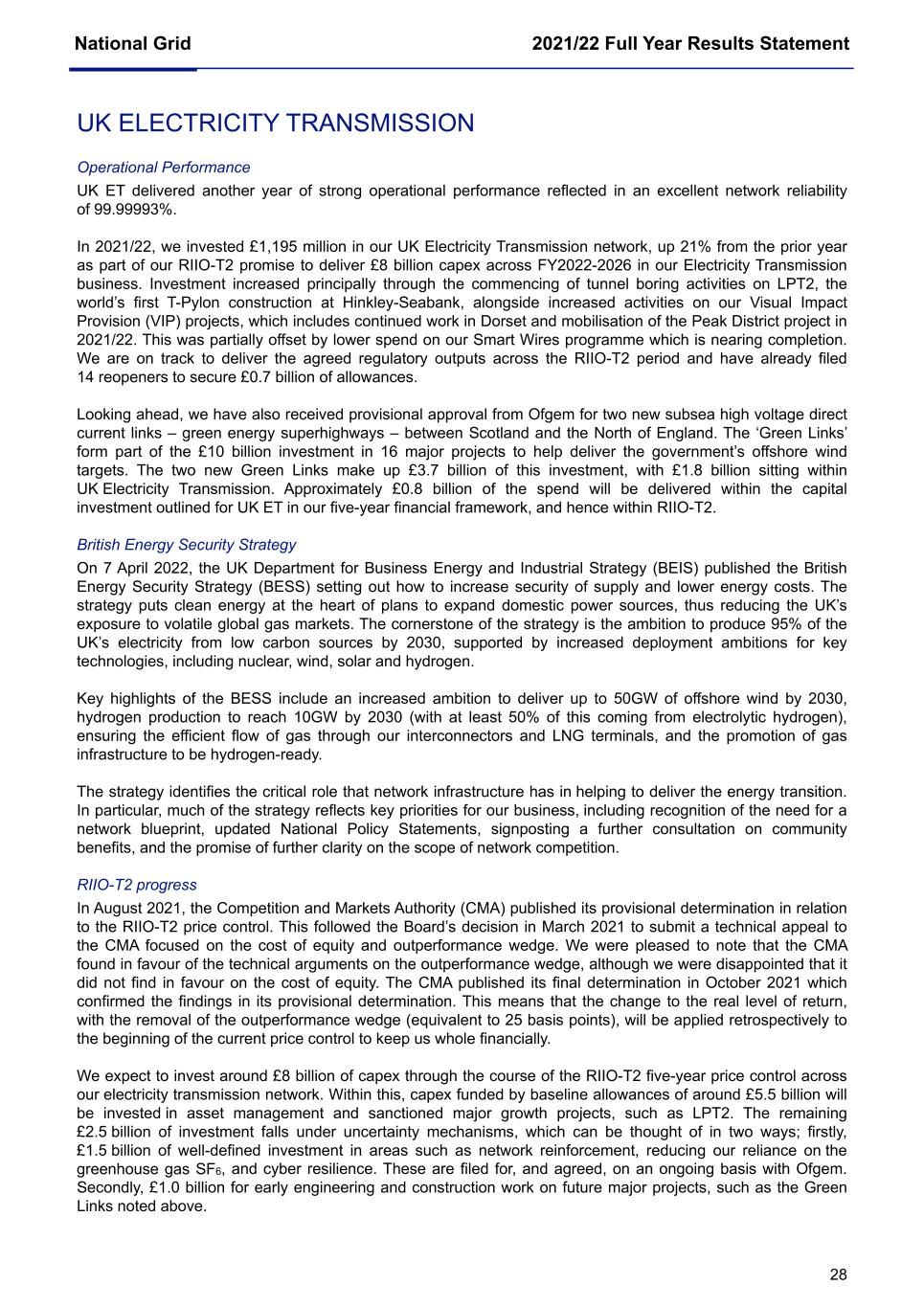
National Grid 2021/22 Full Year Results Statement 28 UK ELECTRICITY TRANSMISSION Operational Performance UK ET delivered another year of strong operational performance reflected in an excellent network reliability of 99.99993%. In 2021/22, we invested £1,195 million in our UK Electricity Transmission network, up 21% from the prior year as part of our RIIO-T2 promise to deliver £8 billion capex across FY2022-2026 in our Electricity Transmission business. Investment increased principally through the commencing of tunnel boring activities on LPT2, the world’s first T-Pylon construction at Hinkley-Seabank, alongside increased activities on our Visual Impact Provision (VIP) projects, which includes continued work in Dorset and mobilisation of the Peak District project in 2021/22. This was partially offset by lower spend on our Smart Wires programme which is nearing completion. We are on track to deliver the agreed regulatory outputs across the RIIO-T2 period and have already filed 14 reopeners to secure £0.7 billion of allowances. Looking ahead, we have also received provisional approval from Ofgem for two new subsea high voltage direct current links – green energy superhighways – between Scotland and the North of England. The ‘Green Links’ form part of the £10 billion investment in 16 major projects to help deliver the government’s offshore wind targets. The two new Green Links make up £3.7 billion of this investment, with £1.8 billion sitting within UK Electricity Transmission. Approximately £0.8 billion of the spend will be delivered within the capital investment outlined for UK ET in our five-year financial framework, and hence within RIIO-T2. British Energy Security Strategy On 7 April 2022, the UK Department for Business Energy and Industrial Strategy (BEIS) published the British Energy Security Strategy (BESS) setting out how to increase security of supply and lower energy costs. The strategy puts clean energy at the heart of plans to expand domestic power sources, thus reducing the UK’s exposure to volatile global gas markets. The cornerstone of the strategy is the ambition to produce 95% of the UK’s electricity from low carbon sources by 2030, supported by increased deployment ambitions for key technologies, including nuclear, wind, solar and hydrogen. Key highlights of the BESS include an increased ambition to deliver up to 50GW of offshore wind by 2030, hydrogen production to reach 10GW by 2030 (with at least 50% of this coming from electrolytic hydrogen), ensuring the efficient flow of gas through our interconnectors and LNG terminals, and the promotion of gas infrastructure to be hydrogen-ready. The strategy identifies the critical role that network infrastructure has in helping to deliver the energy transition. In particular, much of the strategy reflects key priorities for our business, including recognition of the need for a network blueprint, updated National Policy Statements, signposting a further consultation on community benefits, and the promise of further clarity on the scope of network competition. RIIO-T2 progress In August 2021, the Competition and Markets Authority (CMA) published its provisional determination in relation to the RIIO-T2 price control. This followed the Board’s decision in March 2021 to submit a technical appeal to the CMA focused on the cost of equity and outperformance wedge. We were pleased to note that the CMA found in favour of the technical arguments on the outperformance wedge, although we were disappointed that it did not find in favour on the cost of equity. The CMA published its final determination in October 2021 which confirmed the findings in its provisional determination. This means that the change to the real level of return, with the removal of the outperformance wedge (equivalent to 25 basis points), will be applied retrospectively to the beginning of the current price control to keep us whole financially. We expect to invest around £8 billion of capex through the course of the RIIO-T2 five-year price control across our electricity transmission network. Within this, capex funded by baseline allowances of around £5.5 billion will be invested in asset management and sanctioned major growth projects, such as LPT2. The remaining £2.5 billion of investment falls under uncertainty mechanisms, which can be thought of in two ways; firstly, £1.5 billion of well-defined investment in areas such as network reinforcement, reducing our reliance on the greenhouse gas SF6, and cyber resilience. These are filed for, and agreed, on an ongoing basis with Ofgem. Secondly, £1.0 billion for early engineering and construction work on future major projects, such as the Green Links noted above.
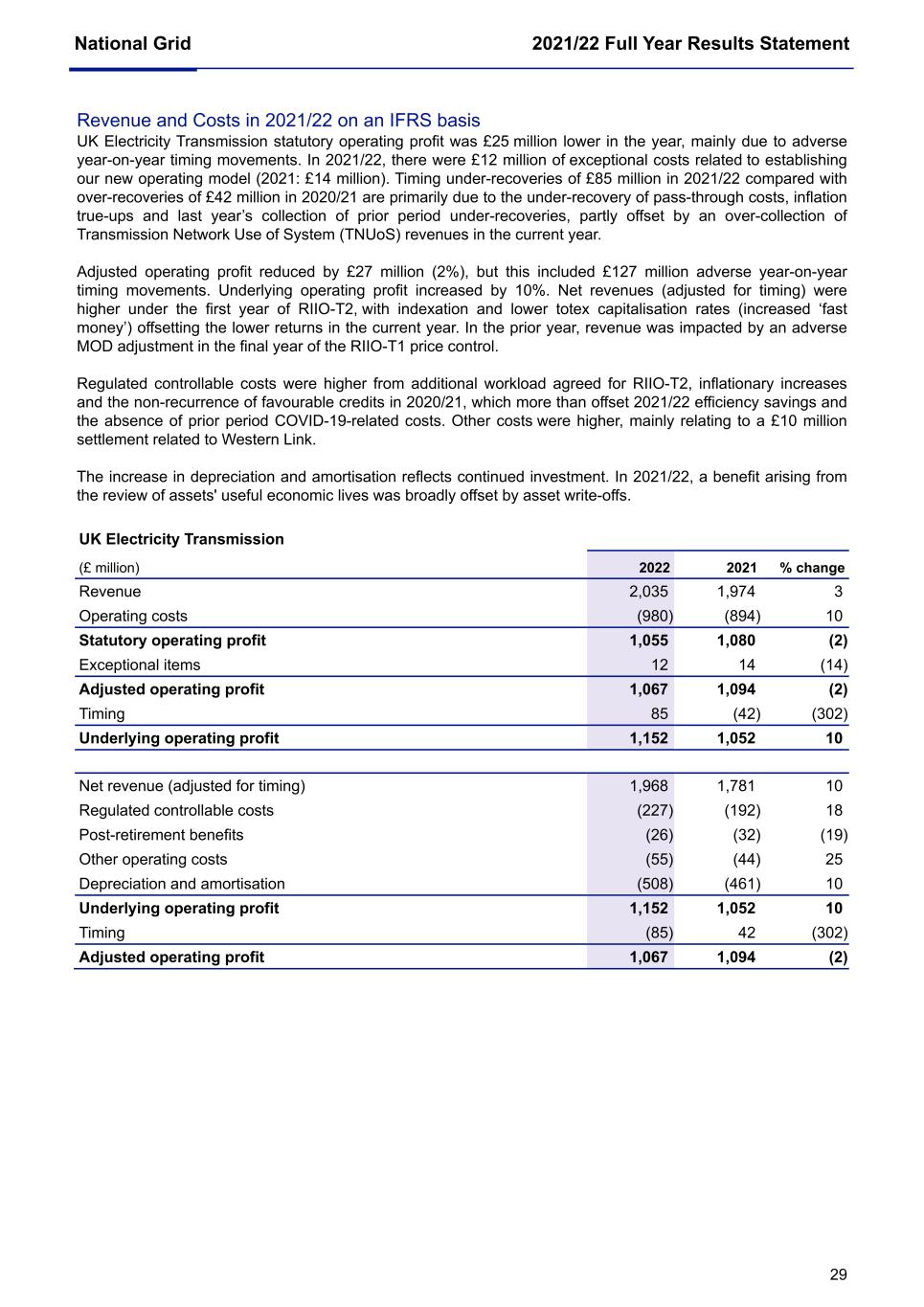
National Grid 2021/22 Full Year Results Statement 29 Revenue and Costs in 2021/22 on an IFRS basis UK Electricity Transmission statutory operating profit was £25 million lower in the year, mainly due to adverse year-on-year timing movements. In 2021/22, there were £12 million of exceptional costs related to establishing our new operating model (2021: £14 million). Timing under-recoveries of £85 million in 2021/22 compared with over-recoveries of £42 million in 2020/21 are primarily due to the under-recovery of pass-through costs, inflation true-ups and last year’s collection of prior period under-recoveries, partly offset by an over-collection of Transmission Network Use of System (TNUoS) revenues in the current year. Adjusted operating profit reduced by £27 million (2%), but this included £127 million adverse year-on-year timing movements. Underlying operating profit increased by 10%. Net revenues (adjusted for timing) were higher under the first year of RIIO-T2, with indexation and lower totex capitalisation rates (increased ‘fast money’) offsetting the lower returns in the current year. In the prior year, revenue was impacted by an adverse MOD adjustment in the final year of the RIIO-T1 price control. Regulated controllable costs were higher from additional workload agreed for RIIO-T2, inflationary increases and the non-recurrence of favourable credits in 2020/21, which more than offset 2021/22 efficiency savings and the absence of prior period COVID-19-related costs. Other costs were higher, mainly relating to a £10 million settlement related to Western Link. The increase in depreciation and amortisation reflects continued investment. In 2021/22, a benefit arising from the review of assets' useful economic lives was broadly offset by asset write-offs. UK Electricity Transmission (£ million) 2022 2021 % change Revenue 2,035 1,974 3 Operating costs (980) (894) 10 Statutory operating profit 1,055 1,080 (2) Exceptional items 12 14 (14) Adjusted operating profit 1,067 1,094 (2) Timing 85 (42) (302) Underlying operating profit 1,152 1,052 10 Net revenue (adjusted for timing) 1,968 1,781 10 Regulated controllable costs (227) (192) 18 Post-retirement benefits (26) (32) (19) Other operating costs (55) (44) 25 Depreciation and amortisation (508) (461) 10 Underlying operating profit 1,152 1,052 10 Timing (85) 42 (302) Adjusted operating profit 1,067 1,094 (2)
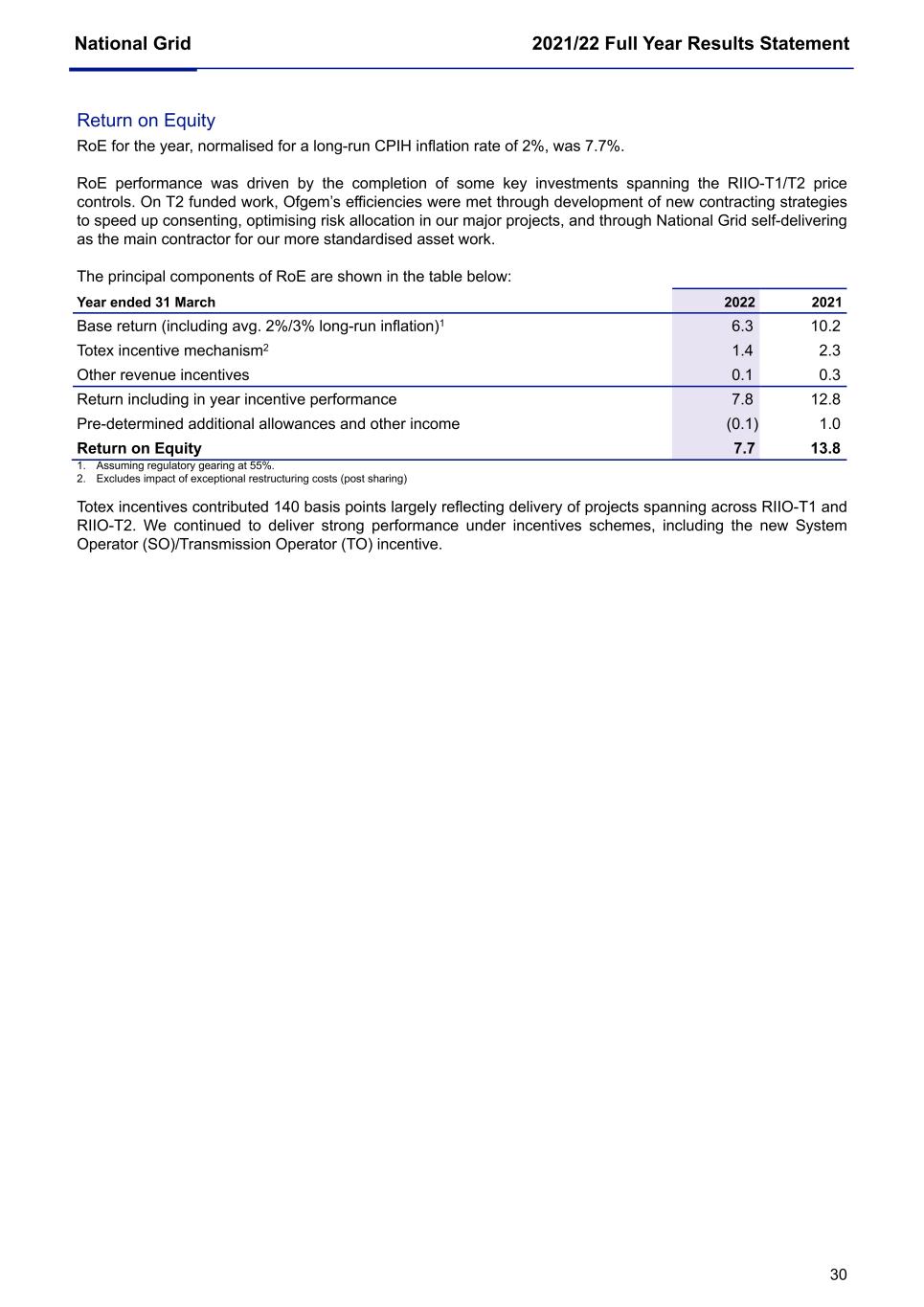
National Grid 2021/22 Full Year Results Statement 30 Return on Equity RoE for the year, normalised for a long-run CPIH inflation rate of 2%, was 7.7%. RoE performance was driven by the completion of some key investments spanning the RIIO-T1/T2 price controls. On T2 funded work, Ofgem’s efficiencies were met through development of new contracting strategies to speed up consenting, optimising risk allocation in our major projects, and through National Grid self-delivering as the main contractor for our more standardised asset work. The principal components of RoE are shown in the table below: Year ended 31 March 2022 2021 Base return (including avg. 2%/3% long-run inflation)1 6.3 10.2 Totex incentive mechanism2 1.4 2.3 Other revenue incentives 0.1 0.3 Return including in year incentive performance 7.8 12.8 Pre-determined additional allowances and other income (0.1) 1.0 Return on Equity 7.7 13.8 1. Assuming regulatory gearing at 55%. 2. Excludes impact of exceptional restructuring costs (post sharing) Totex incentives contributed 140 basis points largely reflecting delivery of projects spanning across RIIO-T1 and RIIO-T2. We continued to deliver strong performance under incentives schemes, including the new System Operator (SO)/Transmission Operator (TO) incentive.
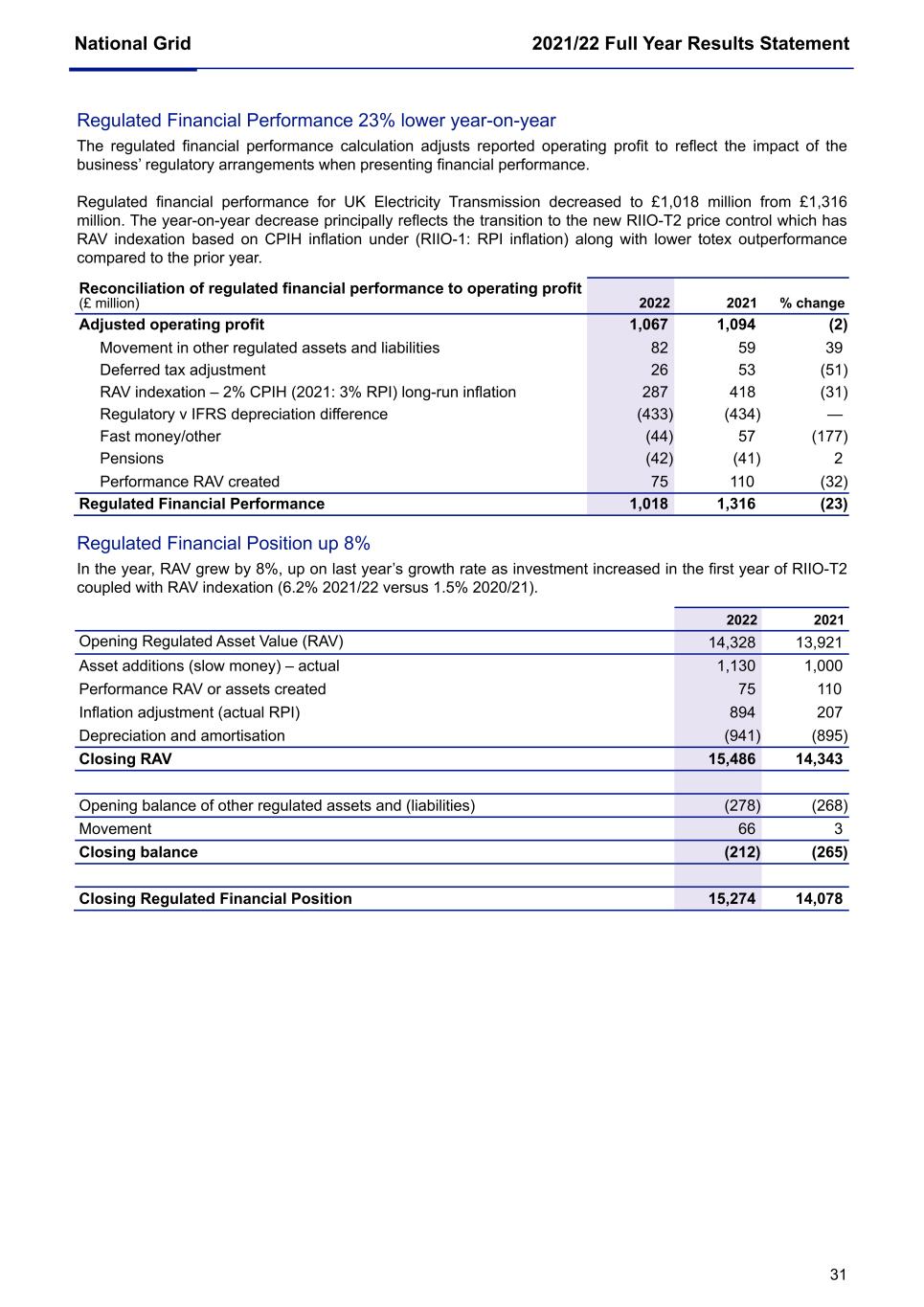
National Grid 2021/22 Full Year Results Statement 31 Regulated Financial Performance 23% lower year-on-year The regulated financial performance calculation adjusts reported operating profit to reflect the impact of the business’ regulatory arrangements when presenting financial performance. Regulated financial performance for UK Electricity Transmission decreased to £1,018 million from £1,316 million. The year-on-year decrease principally reflects the transition to the new RIIO-T2 price control which has RAV indexation based on CPIH inflation under (RIIO-1: RPI inflation) along with lower totex outperformance compared to the prior year. Reconciliation of regulated financial performance to operating profit (£ million) 2022 2021 % change Adjusted operating profit 1,067 1,094 (2) Movement in other regulated assets and liabilities 82 59 39 Deferred tax adjustment 26 53 (51) RAV indexation – 2% CPIH (2021: 3% RPI) long-run inflation 287 418 (31) Regulatory v IFRS depreciation difference (433) (434) — Fast money/other (44) 57 (177) Pensions (42) (41) 2 Performance RAV created 75 110 (32) Regulated Financial Performance 1,018 1,316 (23) Regulated Financial Position up 8% In the year, RAV grew by 8%, up on last year’s growth rate as investment increased in the first year of RIIO-T2 coupled with RAV indexation (6.2% 2021/22 versus 1.5% 2020/21). 2022 2021 Opening Regulated Asset Value (RAV) 14,328 13,921 Asset additions (slow money) – actual 1,130 1,000 Performance RAV or assets created 75 110 Inflation adjustment (actual RPI) 894 207 Depreciation and amortisation (941) (895) Closing RAV 15,486 14,343 Opening balance of other regulated assets and (liabilities) (278) (268) Movement 66 3 Closing balance (212) (265) Closing Regulated Financial Position 15,274 14,078
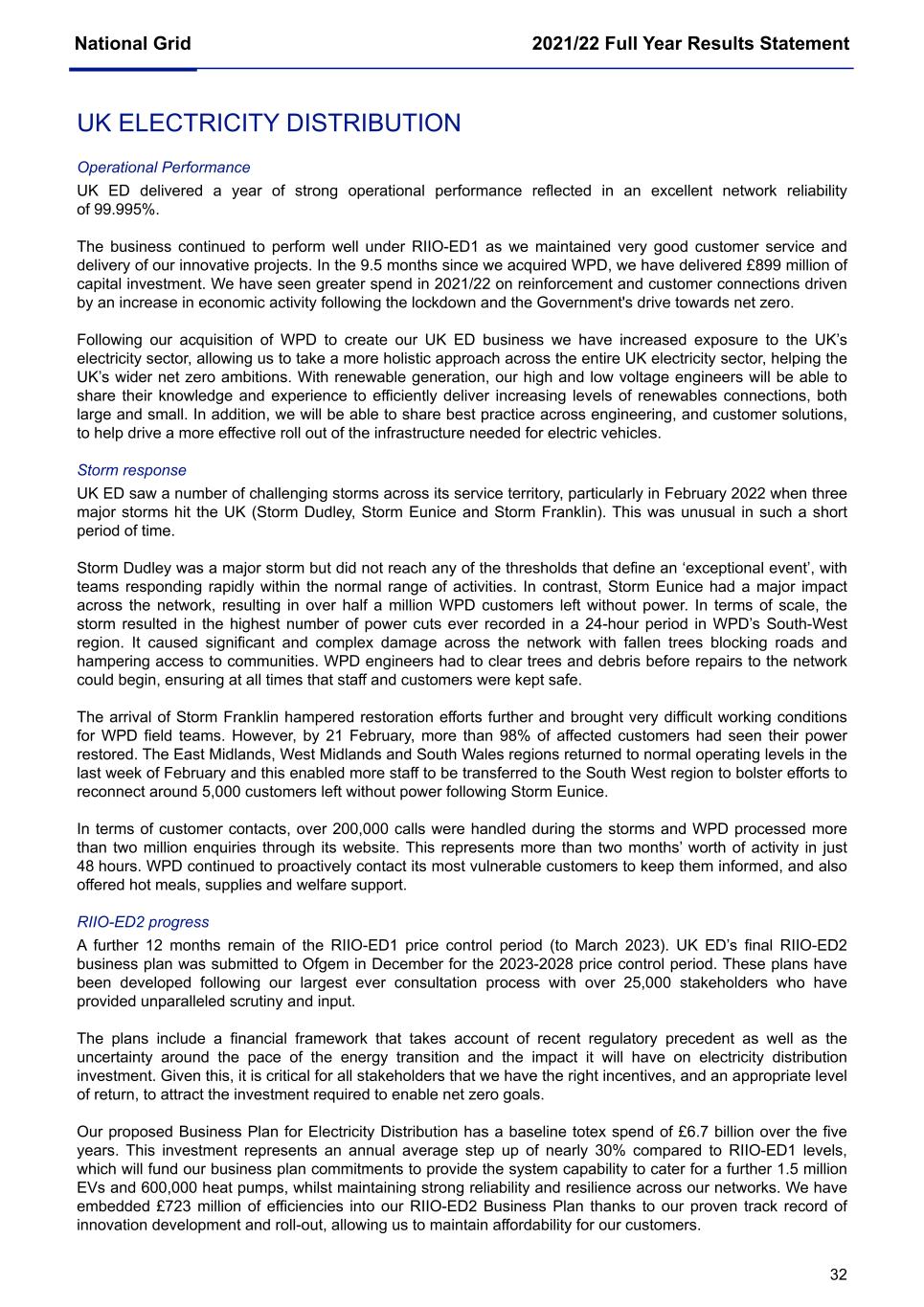
National Grid 2021/22 Full Year Results Statement 32 UK ELECTRICITY DISTRIBUTION Operational Performance UK ED delivered a year of strong operational performance reflected in an excellent network reliability of 99.995%. The business continued to perform well under RIIO-ED1 as we maintained very good customer service and delivery of our innovative projects. In the 9.5 months since we acquired WPD, we have delivered £899 million of capital investment. We have seen greater spend in 2021/22 on reinforcement and customer connections driven by an increase in economic activity following the lockdown and the Government's drive towards net zero. Following our acquisition of WPD to create our UK ED business we have increased exposure to the UK’s electricity sector, allowing us to take a more holistic approach across the entire UK electricity sector, helping the UK’s wider net zero ambitions. With renewable generation, our high and low voltage engineers will be able to share their knowledge and experience to efficiently deliver increasing levels of renewables connections, both large and small. In addition, we will be able to share best practice across engineering, and customer solutions, to help drive a more effective roll out of the infrastructure needed for electric vehicles. Storm response UK ED saw a number of challenging storms across its service territory, particularly in February 2022 when three major storms hit the UK (Storm Dudley, Storm Eunice and Storm Franklin). This was unusual in such a short period of time. Storm Dudley was a major storm but did not reach any of the thresholds that define an ‘exceptional event’, with teams responding rapidly within the normal range of activities. In contrast, Storm Eunice had a major impact across the network, resulting in over half a million WPD customers left without power. In terms of scale, the storm resulted in the highest number of power cuts ever recorded in a 24-hour period in WPD’s South-West region. It caused significant and complex damage across the network with fallen trees blocking roads and hampering access to communities. WPD engineers had to clear trees and debris before repairs to the network could begin, ensuring at all times that staff and customers were kept safe. The arrival of Storm Franklin hampered restoration efforts further and brought very difficult working conditions for WPD field teams. However, by 21 February, more than 98% of affected customers had seen their power restored. The East Midlands, West Midlands and South Wales regions returned to normal operating levels in the last week of February and this enabled more staff to be transferred to the South West region to bolster efforts to reconnect around 5,000 customers left without power following Storm Eunice. In terms of customer contacts, over 200,000 calls were handled during the storms and WPD processed more than two million enquiries through its website. This represents more than two months’ worth of activity in just 48 hours. WPD continued to proactively contact its most vulnerable customers to keep them informed, and also offered hot meals, supplies and welfare support. RIIO-ED2 progress A further 12 months remain of the RIIO-ED1 price control period (to March 2023). UK ED’s final RIIO-ED2 business plan was submitted to Ofgem in December for the 2023-2028 price control period. These plans have been developed following our largest ever consultation process with over 25,000 stakeholders who have provided unparalleled scrutiny and input. The plans include a financial framework that takes account of recent regulatory precedent as well as the uncertainty around the pace of the energy transition and the impact it will have on electricity distribution investment. Given this, it is critical for all stakeholders that we have the right incentives, and an appropriate level of return, to attract the investment required to enable net zero goals. Our proposed Business Plan for Electricity Distribution has a baseline totex spend of £6.7 billion over the five years. This investment represents an annual average step up of nearly 30% compared to RIIO-ED1 levels, which will fund our business plan commitments to provide the system capability to cater for a further 1.5 million EVs and 600,000 heat pumps, whilst maintaining strong reliability and resilience across our networks. We have embedded £723 million of efficiencies into our RIIO-ED2 Business Plan thanks to our proven track record of innovation development and roll-out, allowing us to maintain affordability for our customers.
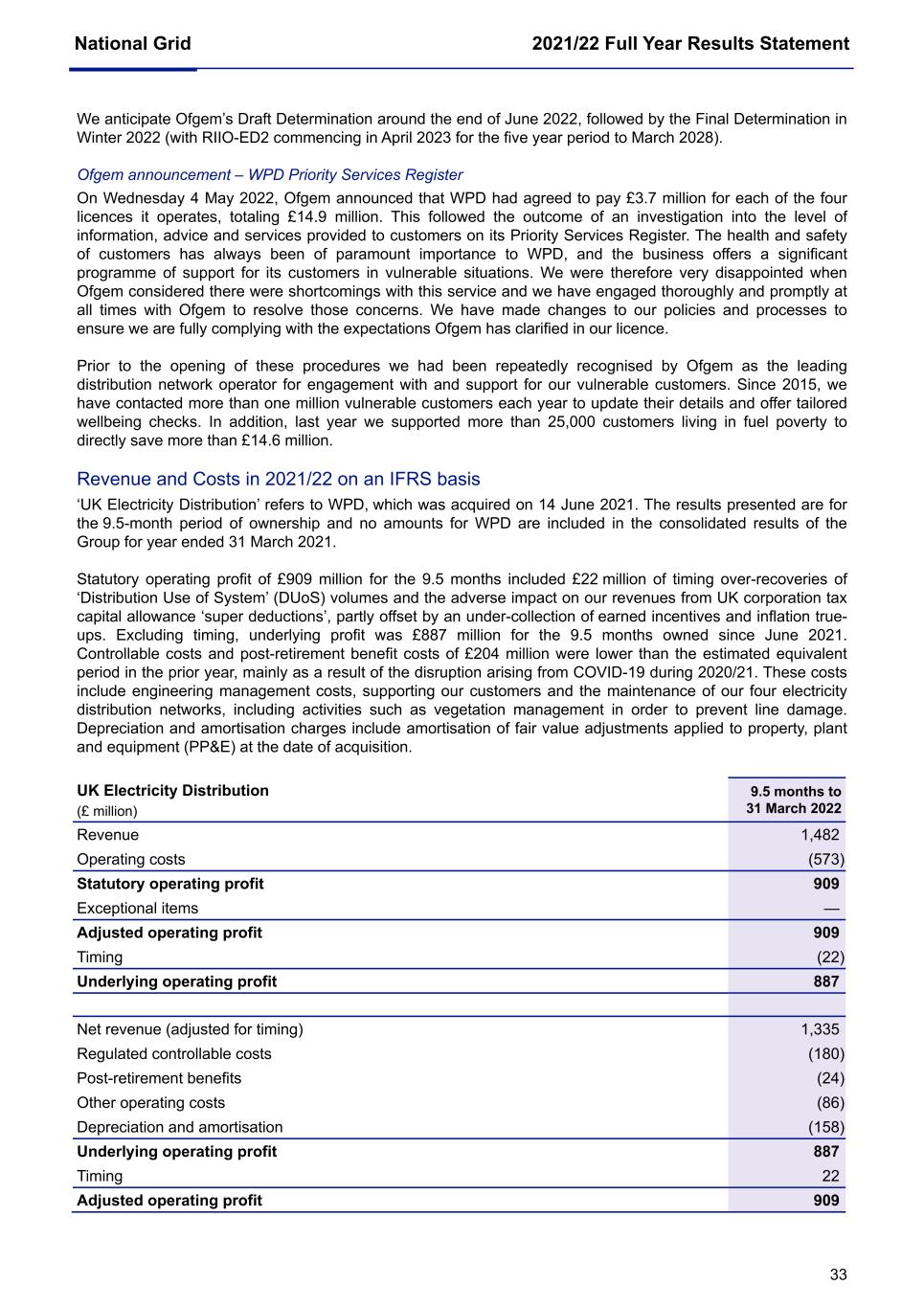
National Grid 2021/22 Full Year Results Statement 33 We anticipate Ofgem’s Draft Determination around the end of June 2022, followed by the Final Determination in Winter 2022 (with RIIO-ED2 commencing in April 2023 for the five year period to March 2028). Ofgem announcement – WPD Priority Services Register On Wednesday 4 May 2022, Ofgem announced that WPD had agreed to pay £3.7 million for each of the four licences it operates, totaling £14.9 million. This followed the outcome of an investigation into the level of information, advice and services provided to customers on its Priority Services Register. The health and safety of customers has always been of paramount importance to WPD, and the business offers a significant programme of support for its customers in vulnerable situations. We were therefore very disappointed when Ofgem considered there were shortcomings with this service and we have engaged thoroughly and promptly at all times with Ofgem to resolve those concerns. We have made changes to our policies and processes to ensure we are fully complying with the expectations Ofgem has clarified in our licence. Prior to the opening of these procedures we had been repeatedly recognised by Ofgem as the leading distribution network operator for engagement with and support for our vulnerable customers. Since 2015, we have contacted more than one million vulnerable customers each year to update their details and offer tailored wellbeing checks. In addition, last year we supported more than 25,000 customers living in fuel poverty to directly save more than £14.6 million. Revenue and Costs in 2021/22 on an IFRS basis ‘UK Electricity Distribution’ refers to WPD, which was acquired on 14 June 2021. The results presented are for the 9.5-month period of ownership and no amounts for WPD are included in the consolidated results of the Group for year ended 31 March 2021. Statutory operating profit of £909 million for the 9.5 months included £22 million of timing over-recoveries of ‘Distribution Use of System’ (DUoS) volumes and the adverse impact on our revenues from UK corporation tax capital allowance ‘super deductions’, partly offset by an under-collection of earned incentives and inflation true- ups. Excluding timing, underlying profit was £887 million for the 9.5 months owned since June 2021. Controllable costs and post-retirement benefit costs of £204 million were lower than the estimated equivalent period in the prior year, mainly as a result of the disruption arising from COVID-19 during 2020/21. These costs include engineering management costs, supporting our customers and the maintenance of our four electricity distribution networks, including activities such as vegetation management in order to prevent line damage. Depreciation and amortisation charges include amortisation of fair value adjustments applied to property, plant and equipment (PP&E) at the date of acquisition. UK Electricity Distribution 9.5 months to 31 March 2022 (£ million) Revenue 1,482 Operating costs (573) Statutory operating profit 909 Exceptional items — Adjusted operating profit 909 Timing (22) Underlying operating profit 887 Net revenue (adjusted for timing) 1,335 Regulated controllable costs (180) Post-retirement benefits (24) Other operating costs (86) Depreciation and amortisation (158) Underlying operating profit 887 Timing 22 Adjusted operating profit 909
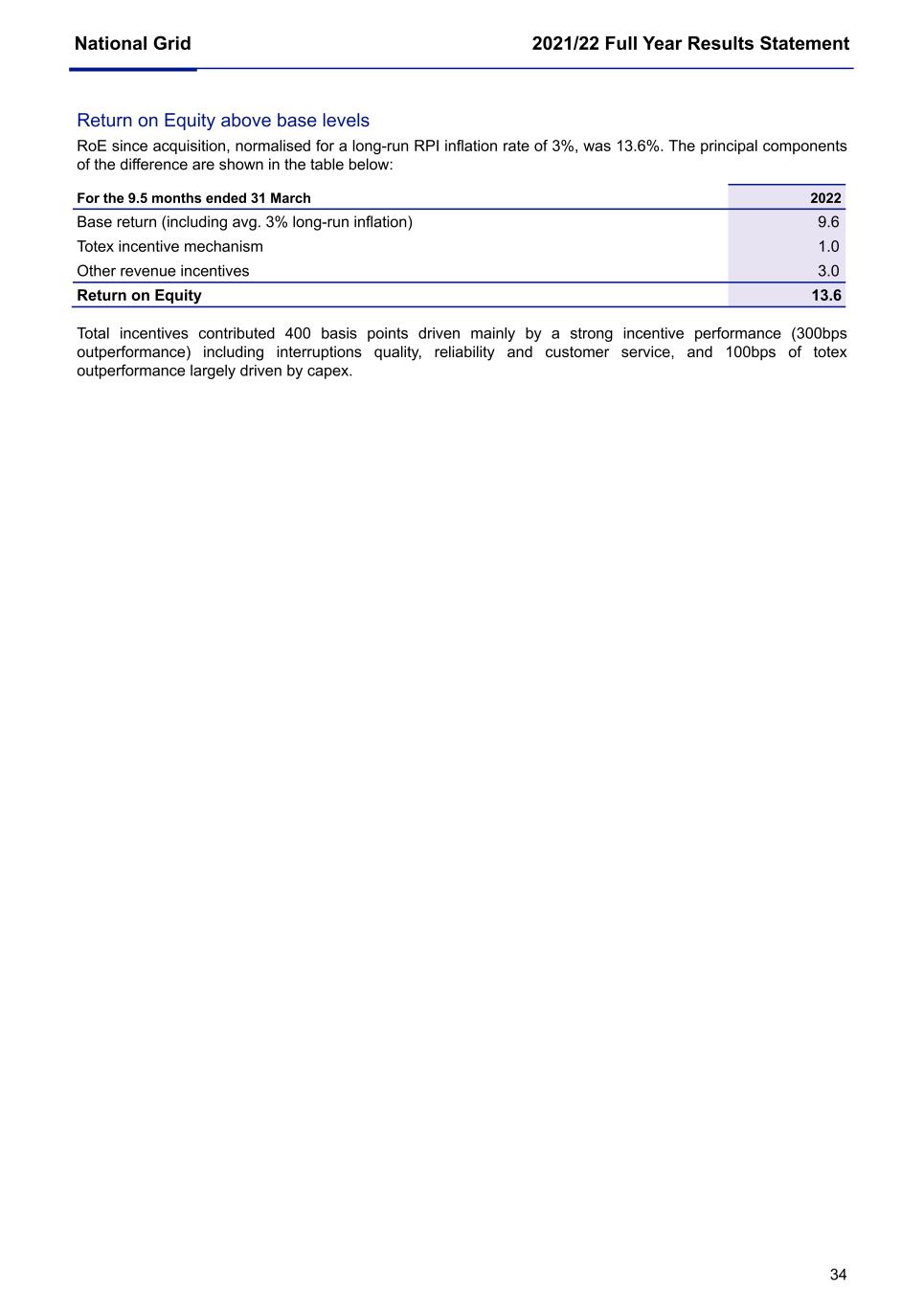
National Grid 2021/22 Full Year Results Statement 34 Return on Equity above base levels RoE since acquisition, normalised for a long-run RPI inflation rate of 3%, was 13.6%. The principal components of the difference are shown in the table below: For the 9.5 months ended 31 March 2022 Base return (including avg. 3% long-run inflation) 9.6 Totex incentive mechanism 1.0 Other revenue incentives 3.0 Return on Equity 13.6 Total incentives contributed 400 basis points driven mainly by a strong incentive performance (300bps outperformance) including interruptions quality, reliability and customer service, and 100bps of totex outperformance largely driven by capex.
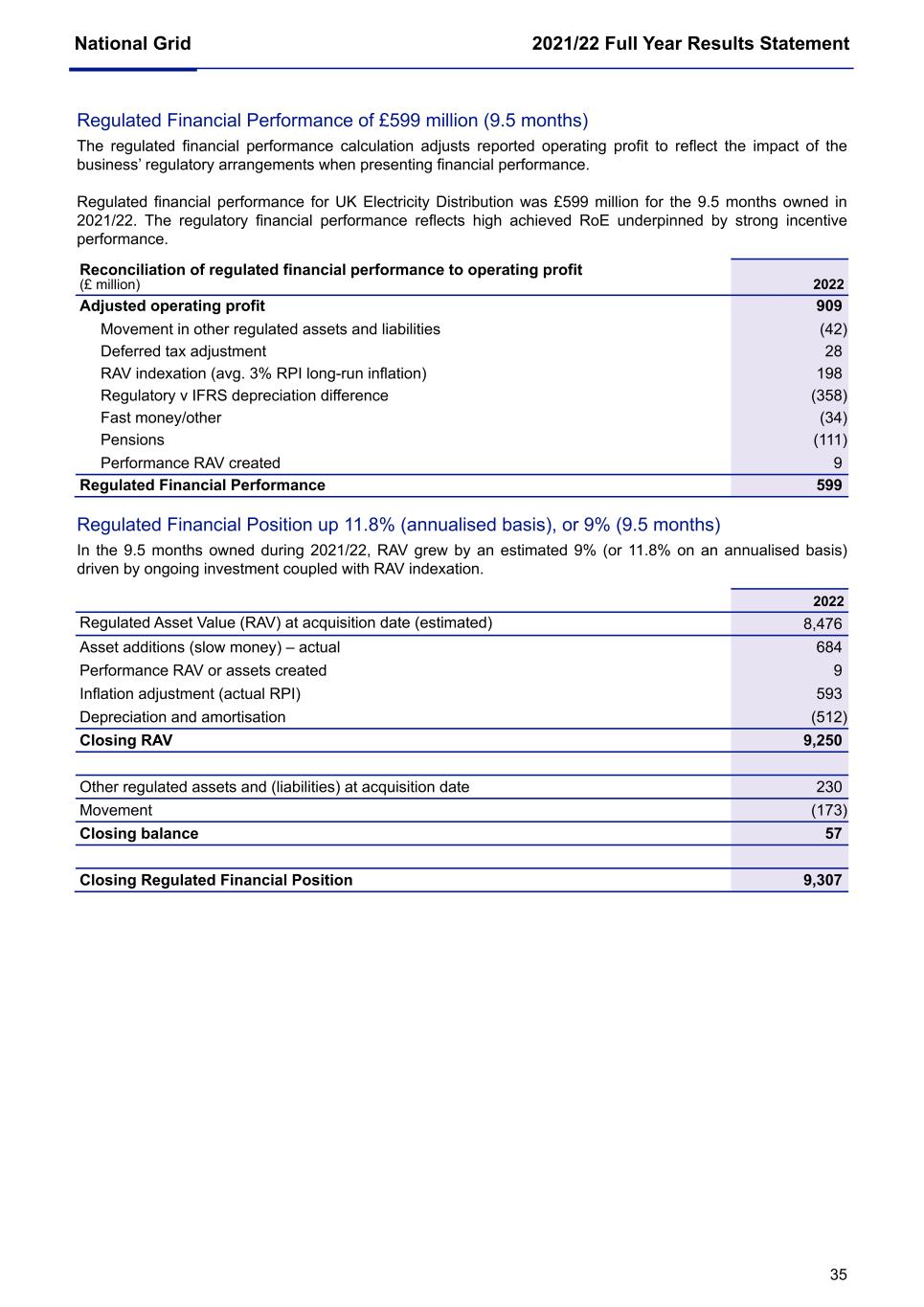
National Grid 2021/22 Full Year Results Statement 35 Regulated Financial Performance of £599 million (9.5 months) The regulated financial performance calculation adjusts reported operating profit to reflect the impact of the business’ regulatory arrangements when presenting financial performance. Regulated financial performance for UK Electricity Distribution was £599 million for the 9.5 months owned in 2021/22. The regulatory financial performance reflects high achieved RoE underpinned by strong incentive performance. Reconciliation of regulated financial performance to operating profit (£ million) 2022 Adjusted operating profit 909 Movement in other regulated assets and liabilities (42) Deferred tax adjustment 28 RAV indexation (avg. 3% RPI long-run inflation) 198 Regulatory v IFRS depreciation difference (358) Fast money/other (34) Pensions (111) Performance RAV created 9 Regulated Financial Performance 599 Regulated Financial Position up 11.8% (annualised basis), or 9% (9.5 months) In the 9.5 months owned during 2021/22, RAV grew by an estimated 9% (or 11.8% on an annualised basis) driven by ongoing investment coupled with RAV indexation. 2022 Regulated Asset Value (RAV) at acquisition date (estimated) 8,476 Asset additions (slow money) – actual 684 Performance RAV or assets created 9 Inflation adjustment (actual RPI) 593 Depreciation and amortisation (512) Closing RAV 9,250 Other regulated assets and (liabilities) at acquisition date 230 Movement (173) Closing balance 57 Closing Regulated Financial Position 9,307
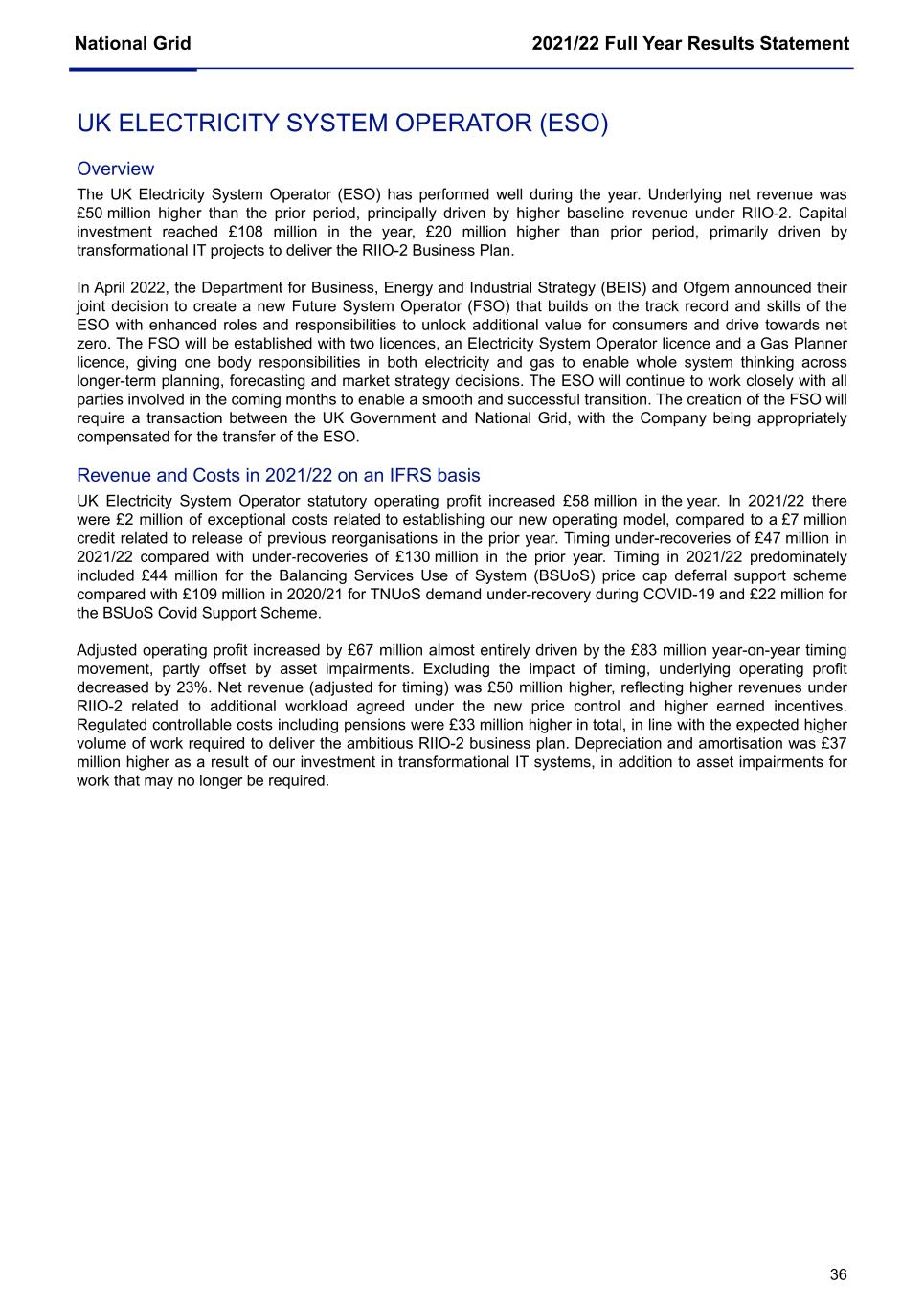
National Grid 2021/22 Full Year Results Statement 36 UK ELECTRICITY SYSTEM OPERATOR (ESO) Overview The UK Electricity System Operator (ESO) has performed well during the year. Underlying net revenue was £50 million higher than the prior period, principally driven by higher baseline revenue under RIIO-2. Capital investment reached £108 million in the year, £20 million higher than prior period, primarily driven by transformational IT projects to deliver the RIIO-2 Business Plan. In April 2022, the Department for Business, Energy and Industrial Strategy (BEIS) and Ofgem announced their joint decision to create a new Future System Operator (FSO) that builds on the track record and skills of the ESO with enhanced roles and responsibilities to unlock additional value for consumers and drive towards net zero. The FSO will be established with two licences, an Electricity System Operator licence and a Gas Planner licence, giving one body responsibilities in both electricity and gas to enable whole system thinking across longer-term planning, forecasting and market strategy decisions. The ESO will continue to work closely with all parties involved in the coming months to enable a smooth and successful transition. The creation of the FSO will require a transaction between the UK Government and National Grid, with the Company being appropriately compensated for the transfer of the ESO. Revenue and Costs in 2021/22 on an IFRS basis UK Electricity System Operator statutory operating profit increased £58 million in the year. In 2021/22 there were £2 million of exceptional costs related to establishing our new operating model, compared to a £7 million credit related to release of previous reorganisations in the prior year. Timing under-recoveries of £47 million in 2021/22 compared with under‑recoveries of £130 million in the prior year. Timing in 2021/22 predominately included £44 million for the Balancing Services Use of System (BSUoS) price cap deferral support scheme compared with £109 million in 2020/21 for TNUoS demand under-recovery during COVID-19 and £22 million for the BSUoS Covid Support Scheme. Adjusted operating profit increased by £67 million almost entirely driven by the £83 million year-on-year timing movement, partly offset by asset impairments. Excluding the impact of timing, underlying operating profit decreased by 23%. Net revenue (adjusted for timing) was £50 million higher, reflecting higher revenues under RIIO-2 related to additional workload agreed under the new price control and higher earned incentives. Regulated controllable costs including pensions were £33 million higher in total, in line with the expected higher volume of work required to deliver the ambitious RIIO-2 business plan. Depreciation and amortisation was £37 million higher as a result of our investment in transformational IT systems, in addition to asset impairments for work that may no longer be required.
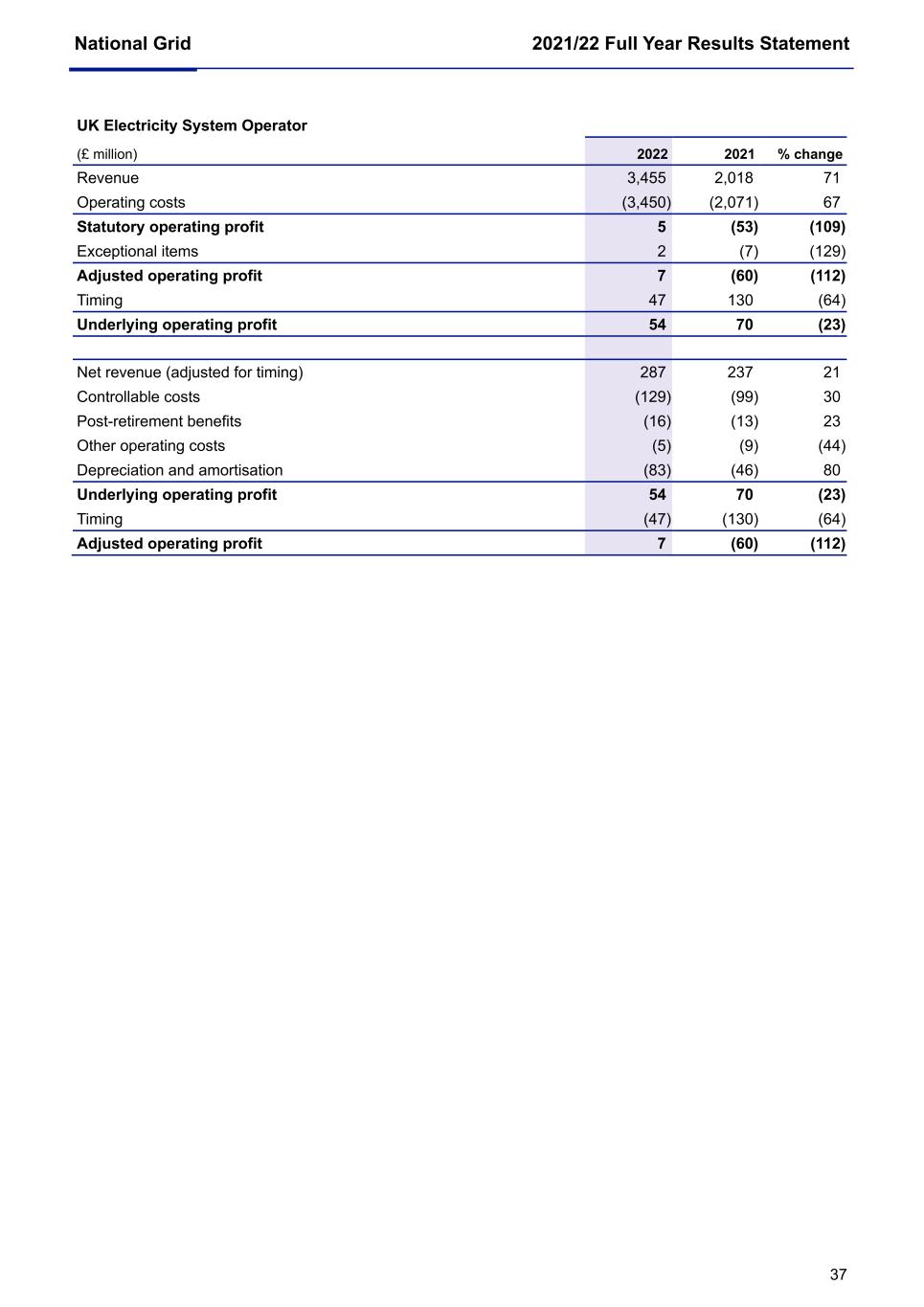
National Grid 2021/22 Full Year Results Statement 37 UK Electricity System Operator (£ million) 2022 2021 % change Revenue 3,455 2,018 71 Operating costs (3,450) (2,071) 67 Statutory operating profit 5 (53) (109) Exceptional items 2 (7) (129) Adjusted operating profit 7 (60) (112) Timing 47 130 (64) Underlying operating profit 54 70 (23) Net revenue (adjusted for timing) 287 237 21 Controllable costs (129) (99) 30 Post-retirement benefits (16) (13) 23 Other operating costs (5) (9) (44) Depreciation and amortisation (83) (46) 80 Underlying operating profit 54 70 (23) Timing (47) (130) (64) Adjusted operating profit 7 (60) (112)
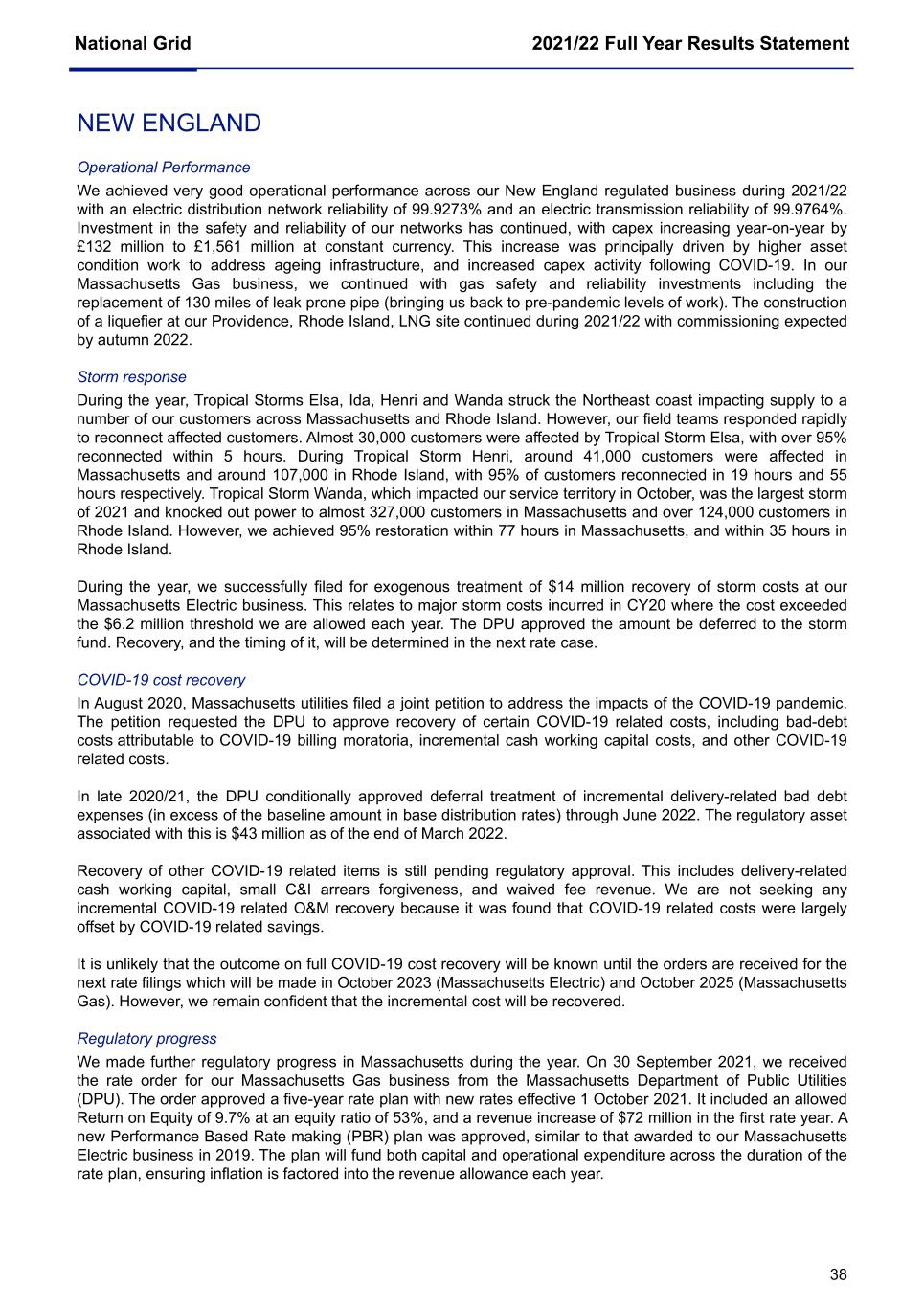
National Grid 2021/22 Full Year Results Statement 38 NEW ENGLAND Operational Performance We achieved very good operational performance across our New England regulated business during 2021/22 with an electric distribution network reliability of 99.9273% and an electric transmission reliability of 99.9764%. Investment in the safety and reliability of our networks has continued, with capex increasing year-on-year by £132 million to £1,561 million at constant currency. This increase was principally driven by higher asset condition work to address ageing infrastructure, and increased capex activity following COVID-19. In our Massachusetts Gas business, we continued with gas safety and reliability investments including the replacement of 130 miles of leak prone pipe (bringing us back to pre-pandemic levels of work). The construction of a liquefier at our Providence, Rhode Island, LNG site continued during 2021/22 with commissioning expected by autumn 2022. Storm response During the year, Tropical Storms Elsa, Ida, Henri and Wanda struck the Northeast coast impacting supply to a number of our customers across Massachusetts and Rhode Island. However, our field teams responded rapidly to reconnect affected customers. Almost 30,000 customers were affected by Tropical Storm Elsa, with over 95% reconnected within 5 hours. During Tropical Storm Henri, around 41,000 customers were affected in Massachusetts and around 107,000 in Rhode Island, with 95% of customers reconnected in 19 hours and 55 hours respectively. Tropical Storm Wanda, which impacted our service territory in October, was the largest storm of 2021 and knocked out power to almost 327,000 customers in Massachusetts and over 124,000 customers in Rhode Island. However, we achieved 95% restoration within 77 hours in Massachusetts, and within 35 hours in Rhode Island. During the year, we successfully filed for exogenous treatment of $14 million recovery of storm costs at our Massachusetts Electric business. This relates to major storm costs incurred in CY20 where the cost exceeded the $6.2 million threshold we are allowed each year. The DPU approved the amount be deferred to the storm fund. Recovery, and the timing of it, will be determined in the next rate case. COVID-19 cost recovery In August 2020, Massachusetts utilities filed a joint petition to address the impacts of the COVID-19 pandemic. The petition requested the DPU to approve recovery of certain COVID-19 related costs, including bad-debt costs attributable to COVID-19 billing moratoria, incremental cash working capital costs, and other COVID-19 related costs. In late 2020/21, the DPU conditionally approved deferral treatment of incremental delivery-related bad debt expenses (in excess of the baseline amount in base distribution rates) through June 2022. The regulatory asset associated with this is $43 million as of the end of March 2022. Recovery of other COVID-19 related items is still pending regulatory approval. This includes delivery-related cash working capital, small C&I arrears forgiveness, and waived fee revenue. We are not seeking any incremental COVID-19 related O&M recovery because it was found that COVID-19 related costs were largely offset by COVID-19 related savings. It is unlikely that the outcome on full COVID-19 cost recovery will be known until the orders are received for the next rate filings which will be made in October 2023 (Massachusetts Electric) and October 2025 (Massachusetts Gas). However, we remain confident that the incremental cost will be recovered. Regulatory progress We made further regulatory progress in Massachusetts during the year. On 30 September 2021, we received the rate order for our Massachusetts Gas business from the Massachusetts Department of Public Utilities (DPU). The order approved a five-year rate plan with new rates effective 1 October 2021. It included an allowed Return on Equity of 9.7% at an equity ratio of 53%, and a revenue increase of $72 million in the first rate year. A new Performance Based Rate making (PBR) plan was approved, similar to that awarded to our Massachusetts Electric business in 2019. The plan will fund both capital and operational expenditure across the duration of the rate plan, ensuring inflation is factored into the revenue allowance each year.
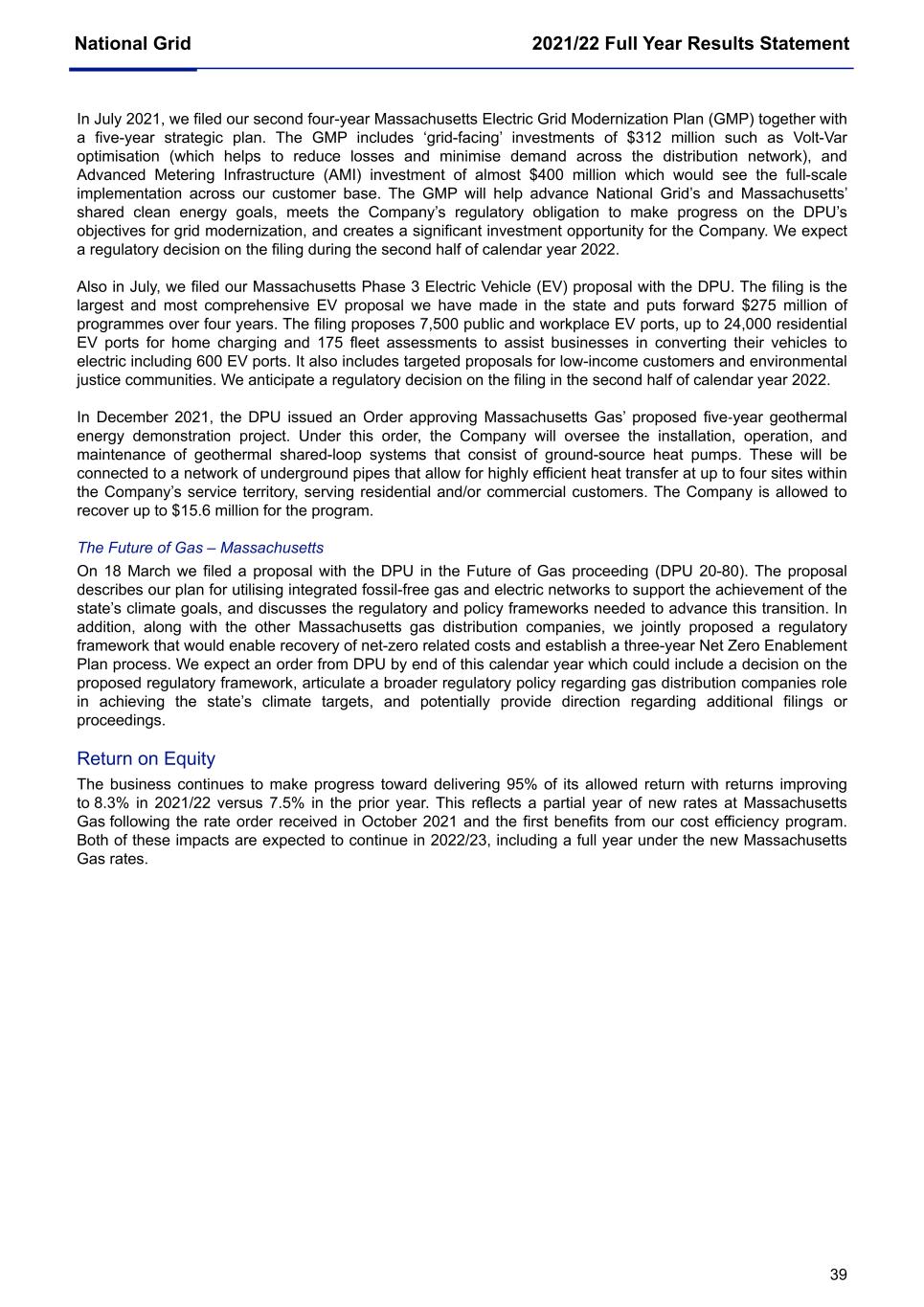
National Grid 2021/22 Full Year Results Statement 39 In July 2021, we filed our second four-year Massachusetts Electric Grid Modernization Plan (GMP) together with a five-year strategic plan. The GMP includes ‘grid-facing’ investments of $312 million such as Volt-Var optimisation (which helps to reduce losses and minimise demand across the distribution network), and Advanced Metering Infrastructure (AMI) investment of almost $400 million which would see the full-scale implementation across our customer base. The GMP will help advance National Grid’s and Massachusetts’ shared clean energy goals, meets the Company’s regulatory obligation to make progress on the DPU’s objectives for grid modernization, and creates a significant investment opportunity for the Company. We expect a regulatory decision on the filing during the second half of calendar year 2022. Also in July, we filed our Massachusetts Phase 3 Electric Vehicle (EV) proposal with the DPU. The filing is the largest and most comprehensive EV proposal we have made in the state and puts forward $275 million of programmes over four years. The filing proposes 7,500 public and workplace EV ports, up to 24,000 residential EV ports for home charging and 175 fleet assessments to assist businesses in converting their vehicles to electric including 600 EV ports. It also includes targeted proposals for low-income customers and environmental justice communities. We anticipate a regulatory decision on the filing in the second half of calendar year 2022. In December 2021, the DPU issued an Order approving Massachusetts Gas’ proposed five‑year geothermal energy demonstration project. Under this order, the Company will oversee the installation, operation, and maintenance of geothermal shared-loop systems that consist of ground-source heat pumps. These will be connected to a network of underground pipes that allow for highly efficient heat transfer at up to four sites within the Company’s service territory, serving residential and/or commercial customers. The Company is allowed to recover up to $15.6 million for the program. The Future of Gas – Massachusetts On 18 March we filed a proposal with the DPU in the Future of Gas proceeding (DPU 20-80). The proposal describes our plan for utilising integrated fossil-free gas and electric networks to support the achievement of the state’s climate goals, and discusses the regulatory and policy frameworks needed to advance this transition. In addition, along with the other Massachusetts gas distribution companies, we jointly proposed a regulatory framework that would enable recovery of net-zero related costs and establish a three-year Net Zero Enablement Plan process. We expect an order from DPU by end of this calendar year which could include a decision on the proposed regulatory framework, articulate a broader regulatory policy regarding gas distribution companies role in achieving the state’s climate targets, and potentially provide direction regarding additional filings or proceedings. Return on Equity The business continues to make progress toward delivering 95% of its allowed return with returns improving to 8.3% in 2021/22 versus 7.5% in the prior year. This reflects a partial year of new rates at Massachusetts Gas following the rate order received in October 2021 and the first benefits from our cost efficiency program. Both of these impacts are expected to continue in 2022/23, including a full year under the new Massachusetts Gas rates.
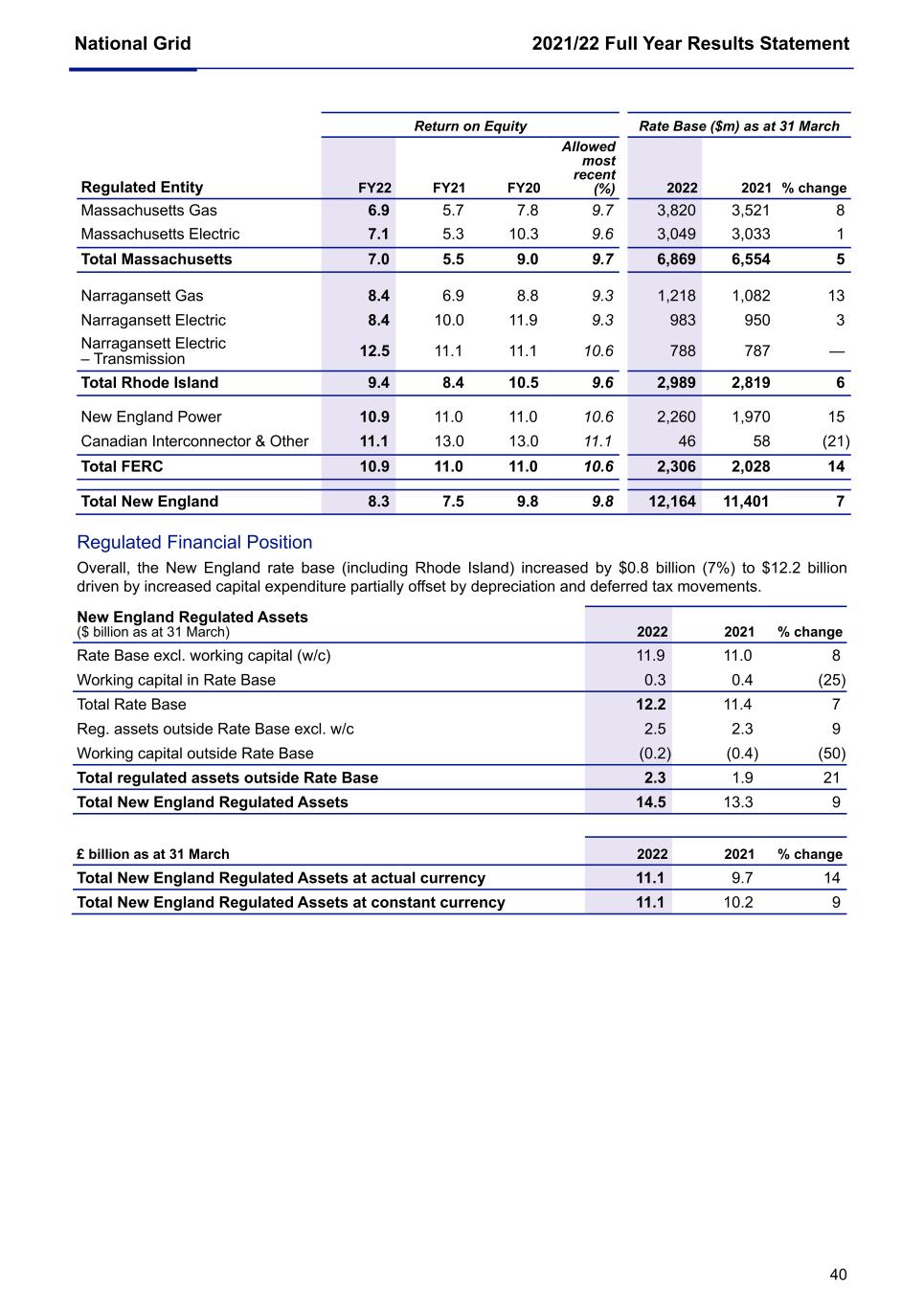
National Grid 2021/22 Full Year Results Statement 40 Return on Equity Rate Base ($m) as at 31 March Regulated Entity FY22 FY21 FY20 Allowed most recent (%) 2022 2021 % change Massachusetts Gas 6.9 5.7 7.8 9.7 3,820 3,521 8 Massachusetts Electric 7.1 5.3 10.3 9.6 3,049 3,033 1 Total Massachusetts 7.0 5.5 9.0 9.7 6,869 6,554 5 Narragansett Gas 8.4 6.9 8.8 9.3 1,218 1,082 13 Narragansett Electric 8.4 10.0 11.9 9.3 983 950 3 Narragansett Electric – Transmission 12.5 11.1 11.1 10.6 788 787 — Total Rhode Island 9.4 8.4 10.5 9.6 2,989 2,819 6 New England Power 10.9 11.0 11.0 10.6 2,260 1,970 15 Canadian Interconnector & Other 11.1 13.0 13.0 11.1 46 58 (21) Total FERC 10.9 11.0 11.0 10.6 2,306 2,028 14 Total New England 8.3 7.5 9.8 9.8 12,164 11,401 7 Regulated Financial Position Overall, the New England rate base (including Rhode Island) increased by $0.8 billion (7%) to $12.2 billion driven by increased capital expenditure partially offset by depreciation and deferred tax movements. New England Regulated Assets ($ billion as at 31 March) 2022 2021 % change Rate Base excl. working capital (w/c) 11.9 11.0 8 Working capital in Rate Base 0.3 0.4 (25) Total Rate Base 12.2 11.4 7 Reg. assets outside Rate Base excl. w/c 2.5 2.3 9 Working capital outside Rate Base (0.2) (0.4) (50) Total regulated assets outside Rate Base 2.3 1.9 21 Total New England Regulated Assets 14.5 13.3 9 £ billion as at 31 March 2022 2021 % change Total New England Regulated Assets at actual currency 11.1 9.7 14 Total New England Regulated Assets at constant currency 11.1 10.2 9
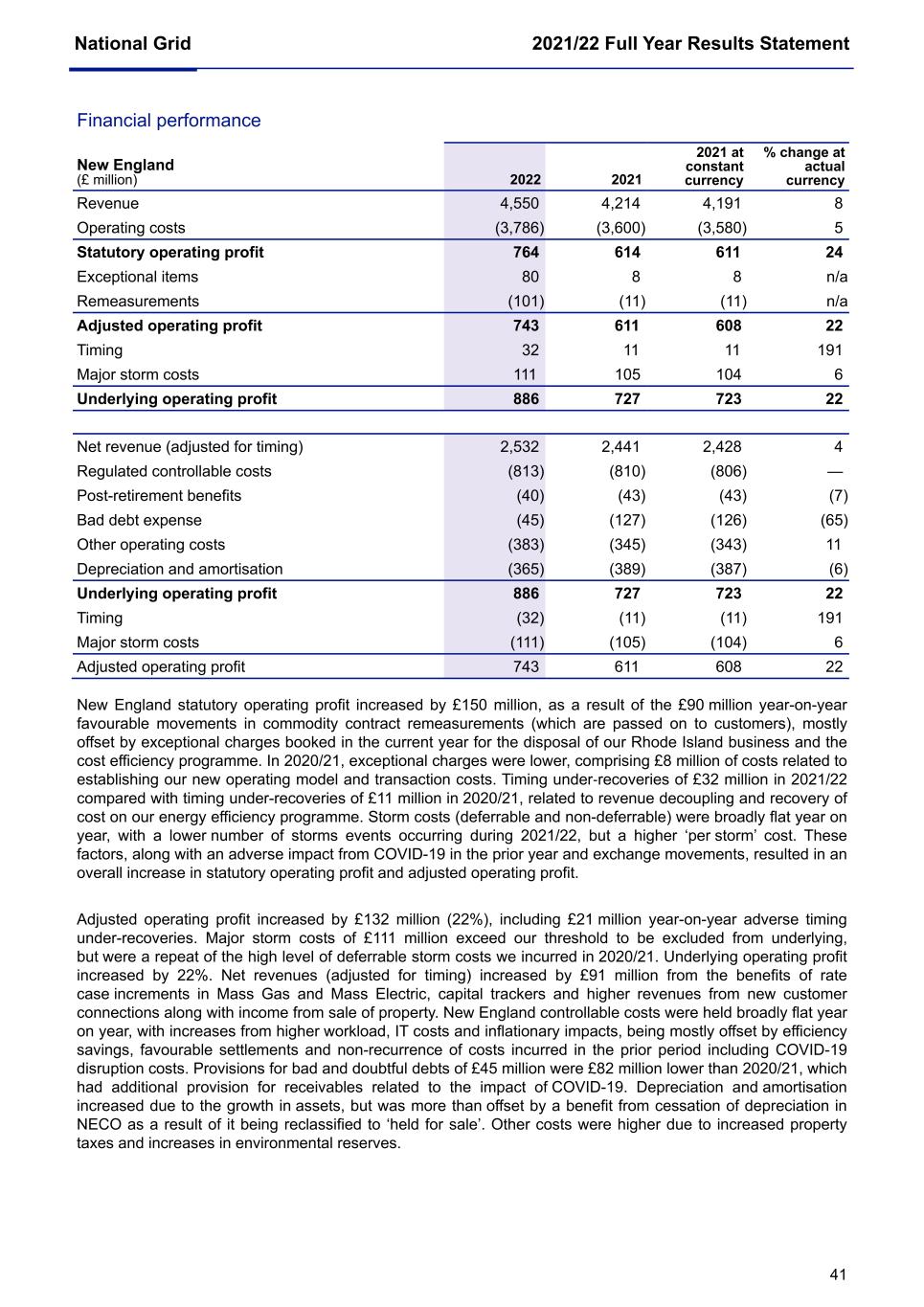
National Grid 2021/22 Full Year Results Statement 41 Financial performance New England (£ million) 2022 2021 2021 at constant currency % change at actual currency Revenue 4,550 4,214 4,191 8 Operating costs (3,786) (3,600) (3,580) 5 Statutory operating profit 764 614 611 24 Exceptional items 80 8 8 n/a Remeasurements (101) (11) (11) n/a Adjusted operating profit 743 611 608 22 Timing 32 11 11 191 Major storm costs 111 105 104 6 Underlying operating profit 886 727 723 22 Net revenue (adjusted for timing) 2,532 2,441 2,428 4 Regulated controllable costs (813) (810) (806) — Post-retirement benefits (40) (43) (43) (7) Bad debt expense (45) (127) (126) (65) Other operating costs (383) (345) (343) 11 Depreciation and amortisation (365) (389) (387) (6) Underlying operating profit 886 727 723 22 Timing (32) (11) (11) 191 Major storm costs (111) (105) (104) 6 Adjusted operating profit 743 611 608 22 New England statutory operating profit increased by £150 million, as a result of the £90 million year-on-year favourable movements in commodity contract remeasurements (which are passed on to customers), mostly offset by exceptional charges booked in the current year for the disposal of our Rhode Island business and the cost efficiency programme. In 2020/21, exceptional charges were lower, comprising £8 million of costs related to establishing our new operating model and transaction costs. Timing under‑recoveries of £32 million in 2021/22 compared with timing under-recoveries of £11 million in 2020/21, related to revenue decoupling and recovery of cost on our energy efficiency programme. Storm costs (deferrable and non-deferrable) were broadly flat year on year, with a lower number of storms events occurring during 2021/22, but a higher ‘per storm’ cost. These factors, along with an adverse impact from COVID-19 in the prior year and exchange movements, resulted in an overall increase in statutory operating profit and adjusted operating profit. Adjusted operating profit increased by £132 million (22%), including £21 million year-on-year adverse timing under-recoveries. Major storm costs of £111 million exceed our threshold to be excluded from underlying, but were a repeat of the high level of deferrable storm costs we incurred in 2020/21. Underlying operating profit increased by 22%. Net revenues (adjusted for timing) increased by £91 million from the benefits of rate case increments in Mass Gas and Mass Electric, capital trackers and higher revenues from new customer connections along with income from sale of property. New England controllable costs were held broadly flat year on year, with increases from higher workload, IT costs and inflationary impacts, being mostly offset by efficiency savings, favourable settlements and non-recurrence of costs incurred in the prior period including COVID-19 disruption costs. Provisions for bad and doubtful debts of £45 million were £82 million lower than 2020/21, which had additional provision for receivables related to the impact of COVID-19. Depreciation and amortisation increased due to the growth in assets, but was more than offset by a benefit from cessation of depreciation in NECO as a result of it being reclassified to ‘held for sale’. Other costs were higher due to increased property taxes and increases in environmental reserves.
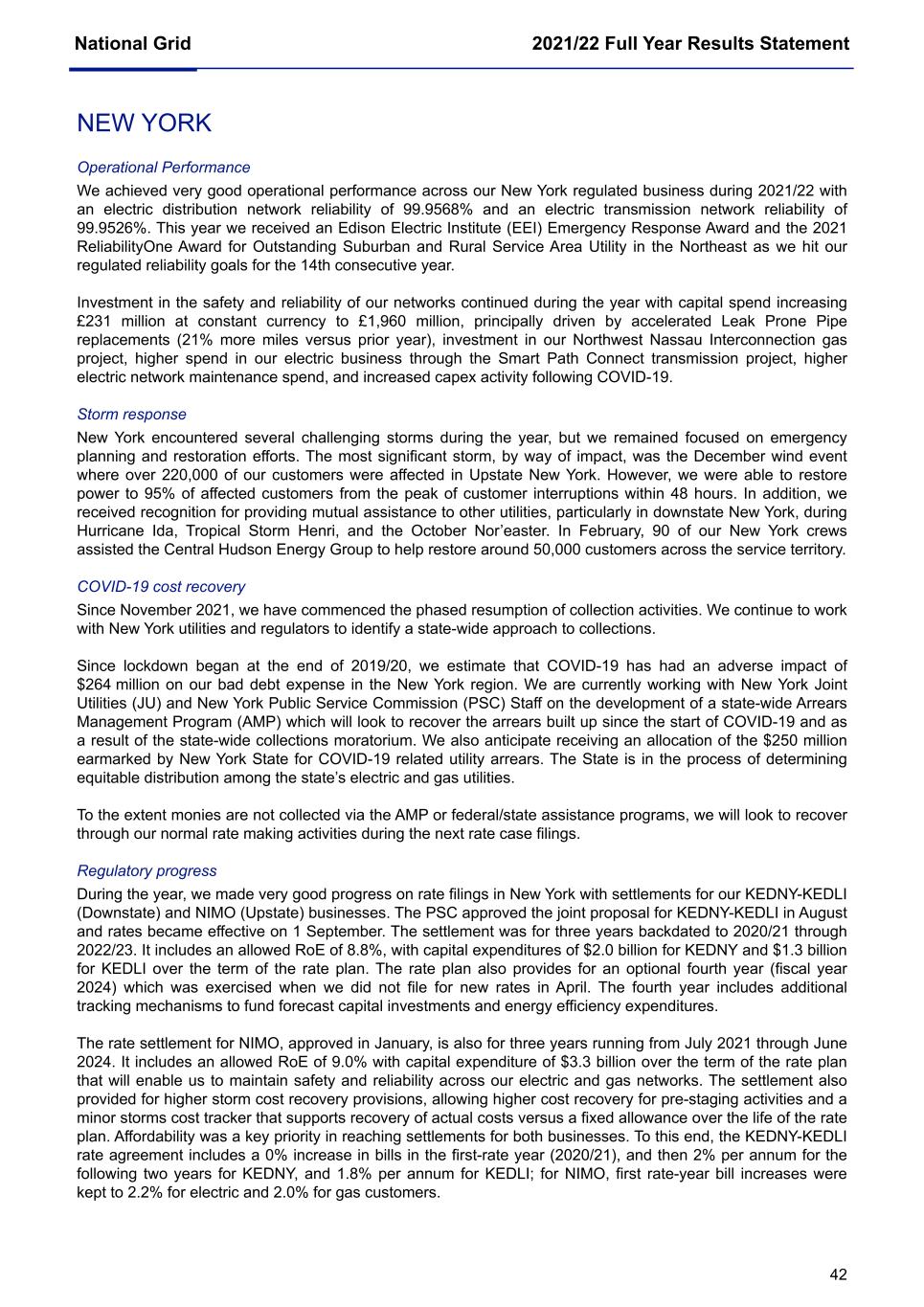
National Grid 2021/22 Full Year Results Statement 42 NEW YORK Operational Performance We achieved very good operational performance across our New York regulated business during 2021/22 with an electric distribution network reliability of 99.9568% and an electric transmission network reliability of 99.9526%. This year we received an Edison Electric Institute (EEI) Emergency Response Award and the 2021 ReliabilityOne Award for Outstanding Suburban and Rural Service Area Utility in the Northeast as we hit our regulated reliability goals for the 14th consecutive year. Investment in the safety and reliability of our networks continued during the year with capital spend increasing £231 million at constant currency to £1,960 million, principally driven by accelerated Leak Prone Pipe replacements (21% more miles versus prior year), investment in our Northwest Nassau Interconnection gas project, higher spend in our electric business through the Smart Path Connect transmission project, higher electric network maintenance spend, and increased capex activity following COVID-19. Storm response New York encountered several challenging storms during the year, but we remained focused on emergency planning and restoration efforts. The most significant storm, by way of impact, was the December wind event where over 220,000 of our customers were affected in Upstate New York. However, we were able to restore power to 95% of affected customers from the peak of customer interruptions within 48 hours. In addition, we received recognition for providing mutual assistance to other utilities, particularly in downstate New York, during Hurricane Ida, Tropical Storm Henri, and the October Nor’easter. In February, 90 of our New York crews assisted the Central Hudson Energy Group to help restore around 50,000 customers across the service territory. COVID-19 cost recovery Since November 2021, we have commenced the phased resumption of collection activities. We continue to work with New York utilities and regulators to identify a state-wide approach to collections. Since lockdown began at the end of 2019/20, we estimate that COVID-19 has had an adverse impact of $264 million on our bad debt expense in the New York region. We are currently working with New York Joint Utilities (JU) and New York Public Service Commission (PSC) Staff on the development of a state-wide Arrears Management Program (AMP) which will look to recover the arrears built up since the start of COVID-19 and as a result of the state-wide collections moratorium. We also anticipate receiving an allocation of the $250 million earmarked by New York State for COVID-19 related utility arrears. The State is in the process of determining equitable distribution among the state’s electric and gas utilities. To the extent monies are not collected via the AMP or federal/state assistance programs, we will look to recover through our normal rate making activities during the next rate case filings. Regulatory progress During the year, we made very good progress on rate filings in New York with settlements for our KEDNY-KEDLI (Downstate) and NIMO (Upstate) businesses. The PSC approved the joint proposal for KEDNY-KEDLI in August and rates became effective on 1 September. The settlement was for three years backdated to 2020/21 through 2022/23. It includes an allowed RoE of 8.8%, with capital expenditures of $2.0 billion for KEDNY and $1.3 billion for KEDLI over the term of the rate plan. The rate plan also provides for an optional fourth year (fiscal year 2024) which was exercised when we did not file for new rates in April. The fourth year includes additional tracking mechanisms to fund forecast capital investments and energy efficiency expenditures. The rate settlement for NIMO, approved in January, is also for three years running from July 2021 through June 2024. It includes an allowed RoE of 9.0% with capital expenditure of $3.3 billion over the term of the rate plan that will enable us to maintain safety and reliability across our electric and gas networks. The settlement also provided for higher storm cost recovery provisions, allowing higher cost recovery for pre-staging activities and a minor storms cost tracker that supports recovery of actual costs versus a fixed allowance over the life of the rate plan. Affordability was a key priority in reaching settlements for both businesses. To this end, the KEDNY-KEDLI rate agreement includes a 0% increase in bills in the first-rate year (2020/21), and then 2% per annum for the following two years for KEDNY, and 1.8% per annum for KEDLI; for NIMO, first rate-year bill increases were kept to 2.2% for electric and 2.0% for gas customers.
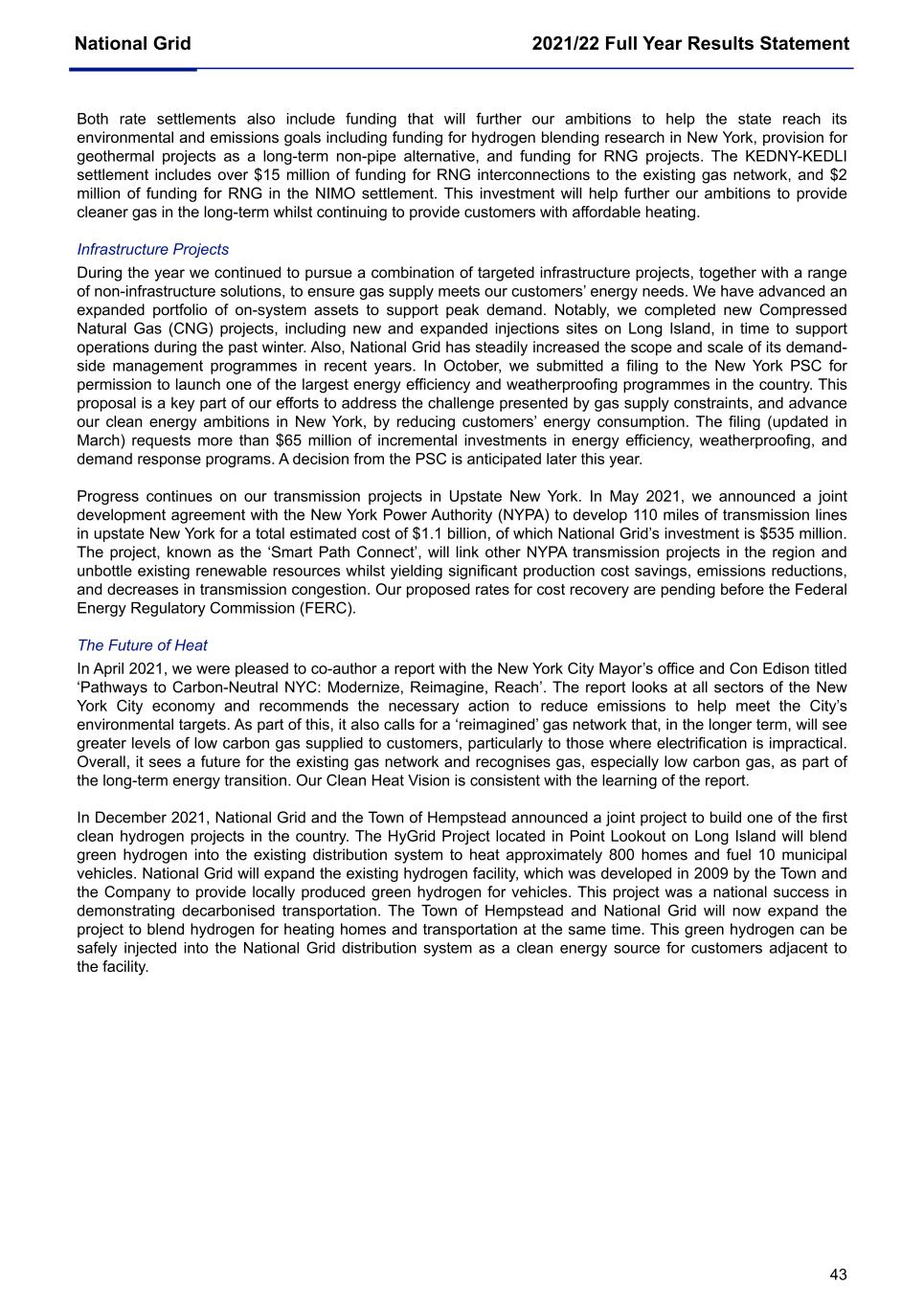
National Grid 2021/22 Full Year Results Statement 43 Both rate settlements also include funding that will further our ambitions to help the state reach its environmental and emissions goals including funding for hydrogen blending research in New York, provision for geothermal projects as a long-term non-pipe alternative, and funding for RNG projects. The KEDNY-KEDLI settlement includes over $15 million of funding for RNG interconnections to the existing gas network, and $2 million of funding for RNG in the NIMO settlement. This investment will help further our ambitions to provide cleaner gas in the long-term whilst continuing to provide customers with affordable heating. Infrastructure Projects During the year we continued to pursue a combination of targeted infrastructure projects, together with a range of non-infrastructure solutions, to ensure gas supply meets our customers’ energy needs. We have advanced an expanded portfolio of on-system assets to support peak demand. Notably, we completed new Compressed Natural Gas (CNG) projects, including new and expanded injections sites on Long Island, in time to support operations during the past winter. Also, National Grid has steadily increased the scope and scale of its demand- side management programmes in recent years. In October, we submitted a filing to the New York PSC for permission to launch one of the largest energy efficiency and weatherproofing programmes in the country. This proposal is a key part of our efforts to address the challenge presented by gas supply constraints, and advance our clean energy ambitions in New York, by reducing customers’ energy consumption. The filing (updated in March) requests more than $65 million of incremental investments in energy efficiency, weatherproofing, and demand response programs. A decision from the PSC is anticipated later this year. Progress continues on our transmission projects in Upstate New York. In May 2021, we announced a joint development agreement with the New York Power Authority (NYPA) to develop 110 miles of transmission lines in upstate New York for a total estimated cost of $1.1 billion, of which National Grid’s investment is $535 million. The project, known as the ‘Smart Path Connect’, will link other NYPA transmission projects in the region and unbottle existing renewable resources whilst yielding significant production cost savings, emissions reductions, and decreases in transmission congestion. Our proposed rates for cost recovery are pending before the Federal Energy Regulatory Commission (FERC). The Future of Heat In April 2021, we were pleased to co-author a report with the New York City Mayor’s office and Con Edison titled ‘Pathways to Carbon-Neutral NYC: Modernize, Reimagine, Reach’. The report looks at all sectors of the New York City economy and recommends the necessary action to reduce emissions to help meet the City’s environmental targets. As part of this, it also calls for a ‘reimagined’ gas network that, in the longer term, will see greater levels of low carbon gas supplied to customers, particularly to those where electrification is impractical. Overall, it sees a future for the existing gas network and recognises gas, especially low carbon gas, as part of the long-term energy transition. Our Clean Heat Vision is consistent with the learning of the report. In December 2021, National Grid and the Town of Hempstead announced a joint project to build one of the first clean hydrogen projects in the country. The HyGrid Project located in Point Lookout on Long Island will blend green hydrogen into the existing distribution system to heat approximately 800 homes and fuel 10 municipal vehicles. National Grid will expand the existing hydrogen facility, which was developed in 2009 by the Town and the Company to provide locally produced green hydrogen for vehicles. This project was a national success in demonstrating decarbonised transportation. The Town of Hempstead and National Grid will now expand the project to blend hydrogen for heating homes and transportation at the same time. This green hydrogen can be safely injected into the National Grid distribution system as a clean energy source for customers adjacent to the facility.
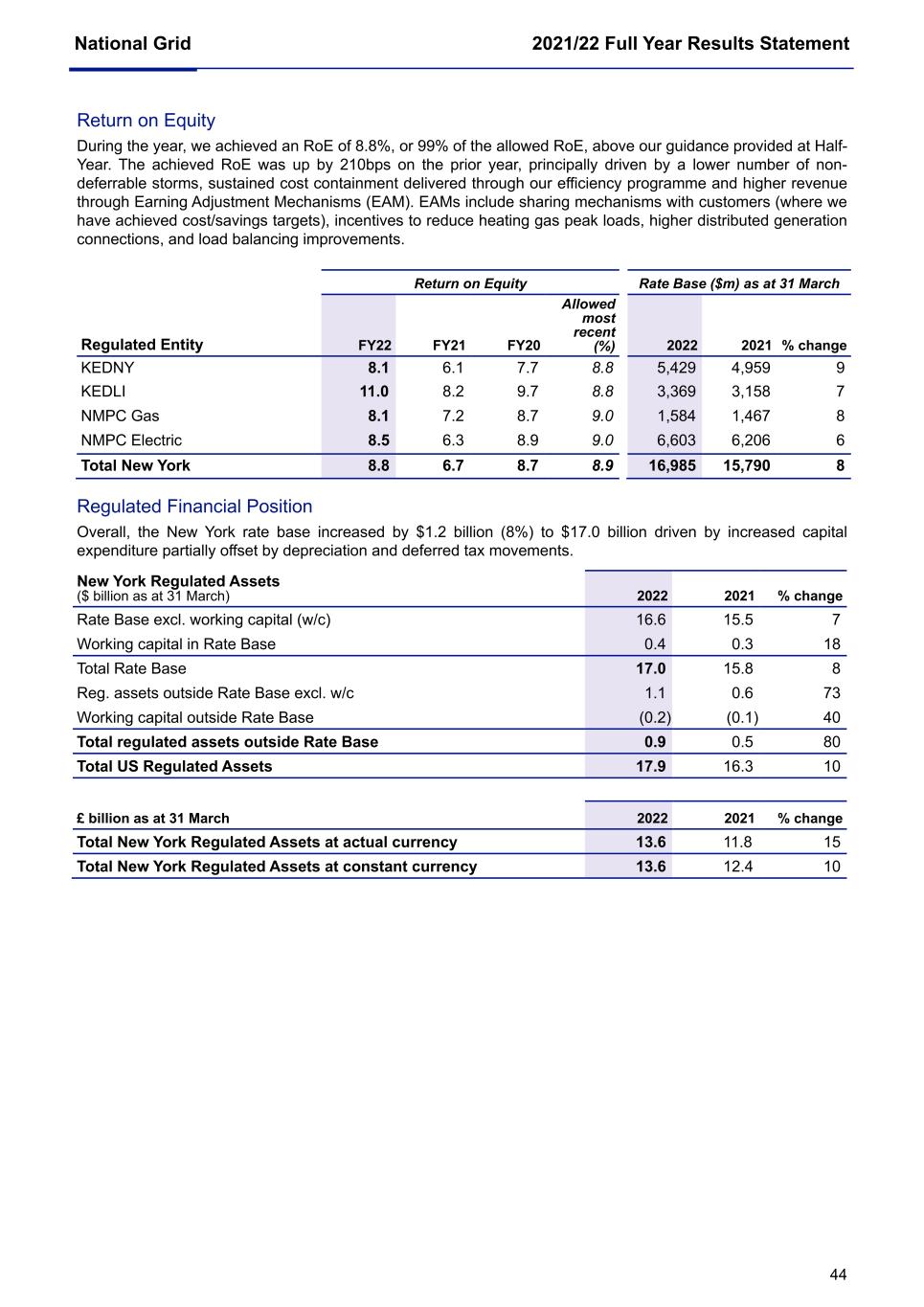
National Grid 2021/22 Full Year Results Statement 44 Return on Equity During the year, we achieved an RoE of 8.8%, or 99% of the allowed RoE, above our guidance provided at Half- Year. The achieved RoE was up by 210bps on the prior year, principally driven by a lower number of non- deferrable storms, sustained cost containment delivered through our efficiency programme and higher revenue through Earning Adjustment Mechanisms (EAM). EAMs include sharing mechanisms with customers (where we have achieved cost/savings targets), incentives to reduce heating gas peak loads, higher distributed generation connections, and load balancing improvements. Return on Equity Rate Base ($m) as at 31 March Regulated Entity FY22 FY21 FY20 Allowed most recent (%) 2022 2021 % change KEDNY 8.1 6.1 7.7 8.8 5,429 4,959 9 KEDLI 11.0 8.2 9.7 8.8 3,369 3,158 7 NMPC Gas 8.1 7.2 8.7 9.0 1,584 1,467 8 NMPC Electric 8.5 6.3 8.9 9.0 6,603 6,206 6 Total New York 8.8 6.7 8.7 8.9 16,985 15,790 8 Regulated Financial Position Overall, the New York rate base increased by $1.2 billion (8%) to $17.0 billion driven by increased capital expenditure partially offset by depreciation and deferred tax movements. New York Regulated Assets ($ billion as at 31 March) 2022 2021 % change Rate Base excl. working capital (w/c) 16.6 15.5 7 Working capital in Rate Base 0.4 0.3 18 Total Rate Base 17.0 15.8 8 Reg. assets outside Rate Base excl. w/c 1.1 0.6 73 Working capital outside Rate Base (0.2) (0.1) 40 Total regulated assets outside Rate Base 0.9 0.5 80 Total US Regulated Assets 17.9 16.3 10 £ billion as at 31 March 2022 2021 % change Total New York Regulated Assets at actual currency 13.6 11.8 15 Total New York Regulated Assets at constant currency 13.6 12.4 10
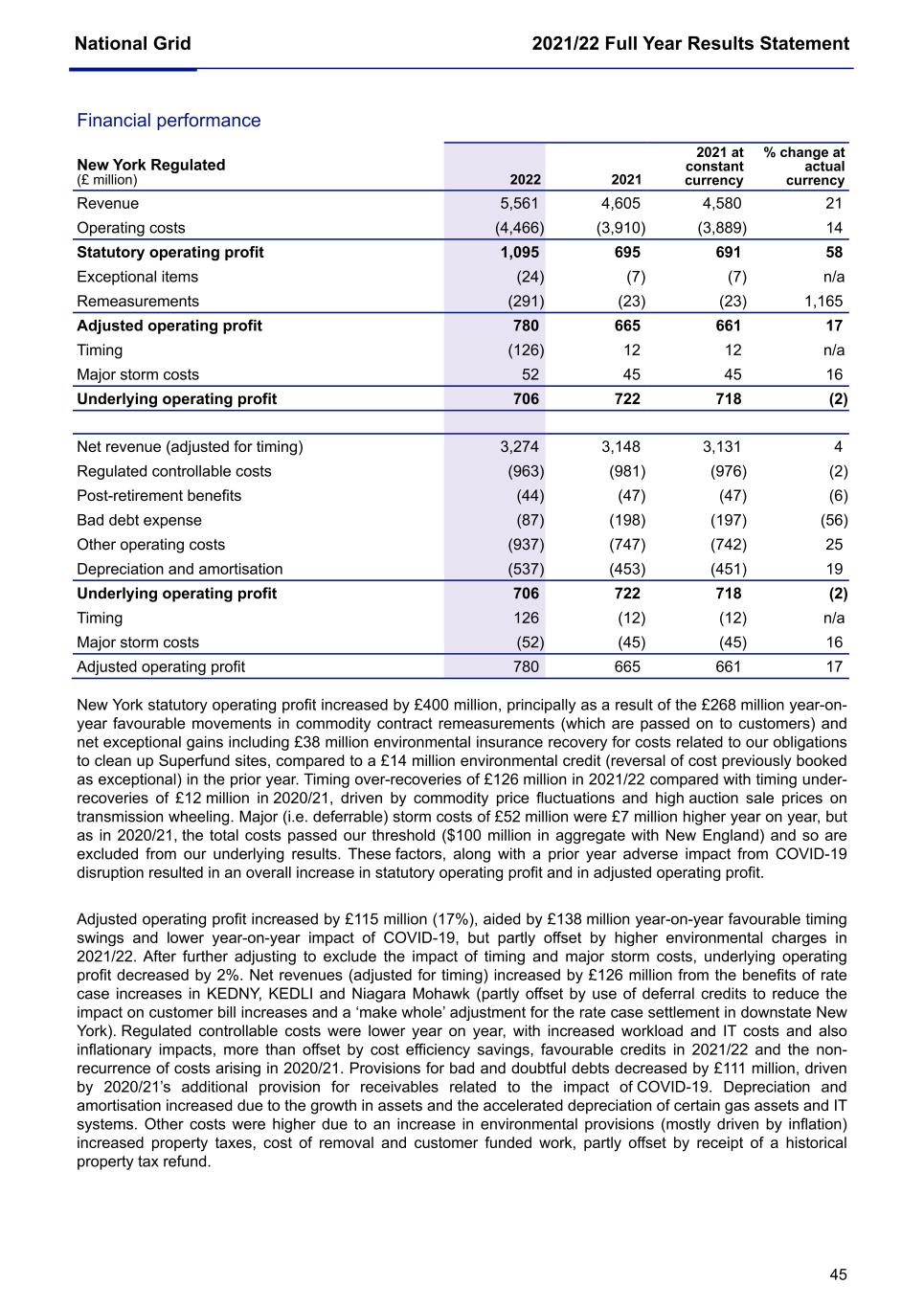
National Grid 2021/22 Full Year Results Statement 45 Financial performance New York Regulated (£ million) 2022 2021 2021 at constant currency % change at actual currency Revenue 5,561 4,605 4,580 21 Operating costs (4,466) (3,910) (3,889) 14 Statutory operating profit 1,095 695 691 58 Exceptional items (24) (7) (7) n/a Remeasurements (291) (23) (23) 1,165 Adjusted operating profit 780 665 661 17 Timing (126) 12 12 n/a Major storm costs 52 45 45 16 Underlying operating profit 706 722 718 (2) Net revenue (adjusted for timing) 3,274 3,148 3,131 4 Regulated controllable costs (963) (981) (976) (2) Post-retirement benefits (44) (47) (47) (6) Bad debt expense (87) (198) (197) (56) Other operating costs (937) (747) (742) 25 Depreciation and amortisation (537) (453) (451) 19 Underlying operating profit 706 722 718 (2) Timing 126 (12) (12) n/a Major storm costs (52) (45) (45) 16 Adjusted operating profit 780 665 661 17 New York statutory operating profit increased by £400 million, principally as a result of the £268 million year-on- year favourable movements in commodity contract remeasurements (which are passed on to customers) and net exceptional gains including £38 million environmental insurance recovery for costs related to our obligations to clean up Superfund sites, compared to a £14 million environmental credit (reversal of cost previously booked as exceptional) in the prior year. Timing over-recoveries of £126 million in 2021/22 compared with timing under- recoveries of £12 million in 2020/21, driven by commodity price fluctuations and high auction sale prices on transmission wheeling. Major (i.e. deferrable) storm costs of £52 million were £7 million higher year on year, but as in 2020/21, the total costs passed our threshold ($100 million in aggregate with New England) and so are excluded from our underlying results. These factors, along with a prior year adverse impact from COVID-19 disruption resulted in an overall increase in statutory operating profit and in adjusted operating profit. Adjusted operating profit increased by £115 million (17%), aided by £138 million year-on-year favourable timing swings and lower year-on-year impact of COVID-19, but partly offset by higher environmental charges in 2021/22. After further adjusting to exclude the impact of timing and major storm costs, underlying operating profit decreased by 2%. Net revenues (adjusted for timing) increased by £126 million from the benefits of rate case increases in KEDNY, KEDLI and Niagara Mohawk (partly offset by use of deferral credits to reduce the impact on customer bill increases and a ‘make whole’ adjustment for the rate case settlement in downstate New York). Regulated controllable costs were lower year on year, with increased workload and IT costs and also inflationary impacts, more than offset by cost efficiency savings, favourable credits in 2021/22 and the non- recurrence of costs arising in 2020/21. Provisions for bad and doubtful debts decreased by £111 million, driven by 2020/21’s additional provision for receivables related to the impact of COVID-19. Depreciation and amortisation increased due to the growth in assets and the accelerated depreciation of certain gas assets and IT systems. Other costs were higher due to an increase in environmental provisions (mostly driven by inflation) increased property taxes, cost of removal and customer funded work, partly offset by receipt of a historical property tax refund.
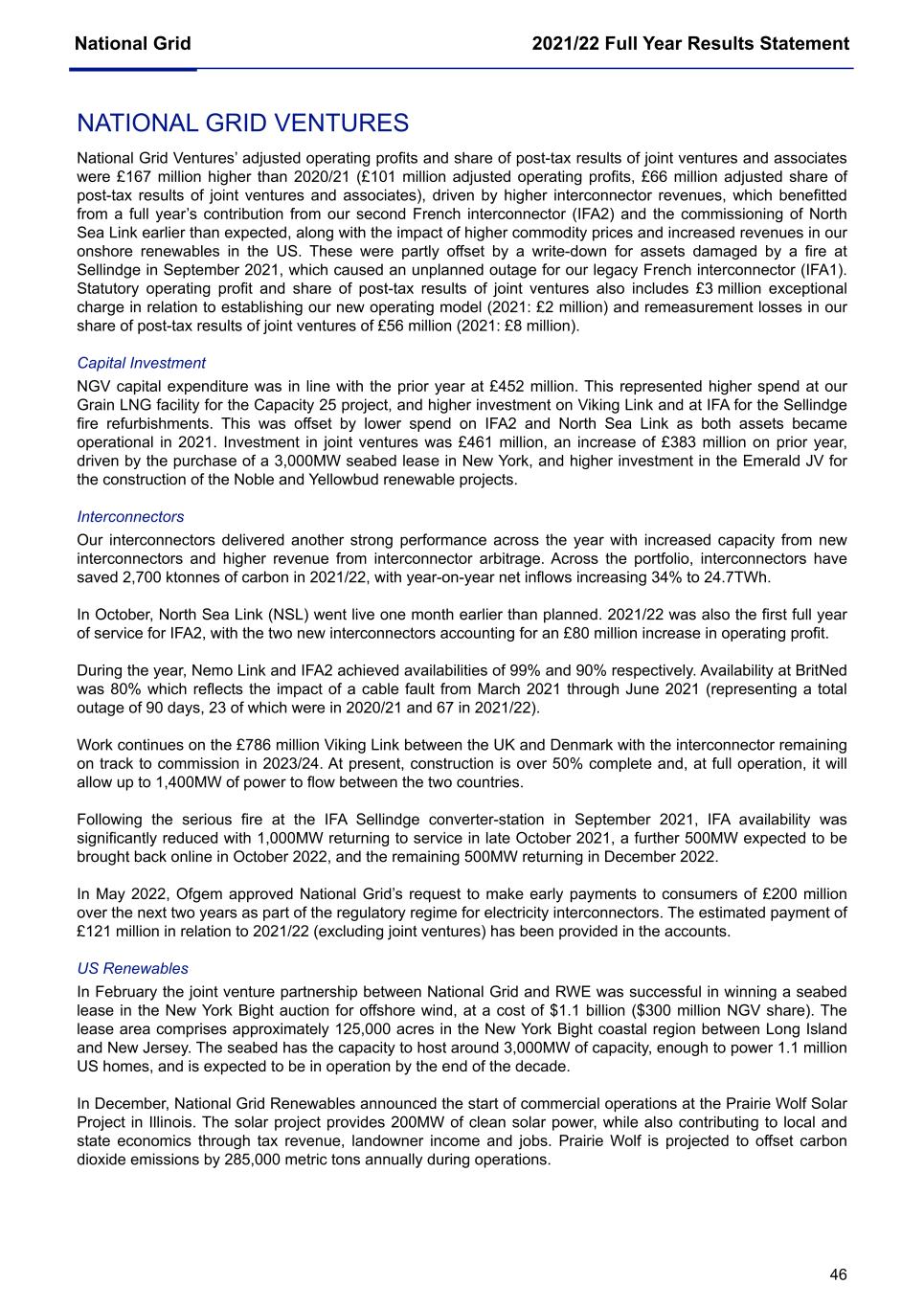
National Grid 2021/22 Full Year Results Statement 46 NATIONAL GRID VENTURES National Grid Ventures’ adjusted operating profits and share of post-tax results of joint ventures and associates were £167 million higher than 2020/21 (£101 million adjusted operating profits, £66 million adjusted share of post-tax results of joint ventures and associates), driven by higher interconnector revenues, which benefitted from a full year’s contribution from our second French interconnector (IFA2) and the commissioning of North Sea Link earlier than expected, along with the impact of higher commodity prices and increased revenues in our onshore renewables in the US. These were partly offset by a write-down for assets damaged by a fire at Sellindge in September 2021, which caused an unplanned outage for our legacy French interconnector (IFA1). Statutory operating profit and share of post-tax results of joint ventures also includes £3 million exceptional charge in relation to establishing our new operating model (2021: £2 million) and remeasurement losses in our share of post-tax results of joint ventures of £56 million (2021: £8 million). Capital Investment NGV capital expenditure was in line with the prior year at £452 million. This represented higher spend at our Grain LNG facility for the Capacity 25 project, and higher investment on Viking Link and at IFA for the Sellindge fire refurbishments. This was offset by lower spend on IFA2 and North Sea Link as both assets became operational in 2021. Investment in joint ventures was £461 million, an increase of £383 million on prior year, driven by the purchase of a 3,000MW seabed lease in New York, and higher investment in the Emerald JV for the construction of the Noble and Yellowbud renewable projects. Interconnectors Our interconnectors delivered another strong performance across the year with increased capacity from new interconnectors and higher revenue from interconnector arbitrage. Across the portfolio, interconnectors have saved 2,700 ktonnes of carbon in 2021/22, with year-on-year net inflows increasing 34% to 24.7TWh. In October, North Sea Link (NSL) went live one month earlier than planned. 2021/22 was also the first full year of service for IFA2, with the two new interconnectors accounting for an £80 million increase in operating profit. During the year, Nemo Link and IFA2 achieved availabilities of 99% and 90% respectively. Availability at BritNed was 80% which reflects the impact of a cable fault from March 2021 through June 2021 (representing a total outage of 90 days, 23 of which were in 2020/21 and 67 in 2021/22). Work continues on the £786 million Viking Link between the UK and Denmark with the interconnector remaining on track to commission in 2023/24. At present, construction is over 50% complete and, at full operation, it will allow up to 1,400MW of power to flow between the two countries. Following the serious fire at the IFA Sellindge converter-station in September 2021, IFA availability was significantly reduced with 1,000MW returning to service in late October 2021, a further 500MW expected to be brought back online in October 2022, and the remaining 500MW returning in December 2022. In May 2022, Ofgem approved National Grid’s request to make early payments to consumers of £200 million over the next two years as part of the regulatory regime for electricity interconnectors. The estimated payment of £121 million in relation to 2021/22 (excluding joint ventures) has been provided in the accounts. US Renewables In February the joint venture partnership between National Grid and RWE was successful in winning a seabed lease in the New York Bight auction for offshore wind, at a cost of $1.1 billion ($300 million NGV share). The lease area comprises approximately 125,000 acres in the New York Bight coastal region between Long Island and New Jersey. The seabed has the capacity to host around 3,000MW of capacity, enough to power 1.1 million US homes, and is expected to be in operation by the end of the decade. In December, National Grid Renewables announced the start of commercial operations at the Prairie Wolf Solar Project in Illinois. The solar project provides 200MW of clean solar power, while also contributing to local and state economics through tax revenue, landowner income and jobs. Prairie Wolf is projected to offset carbon dioxide emissions by 285,000 metric tons annually during operations.
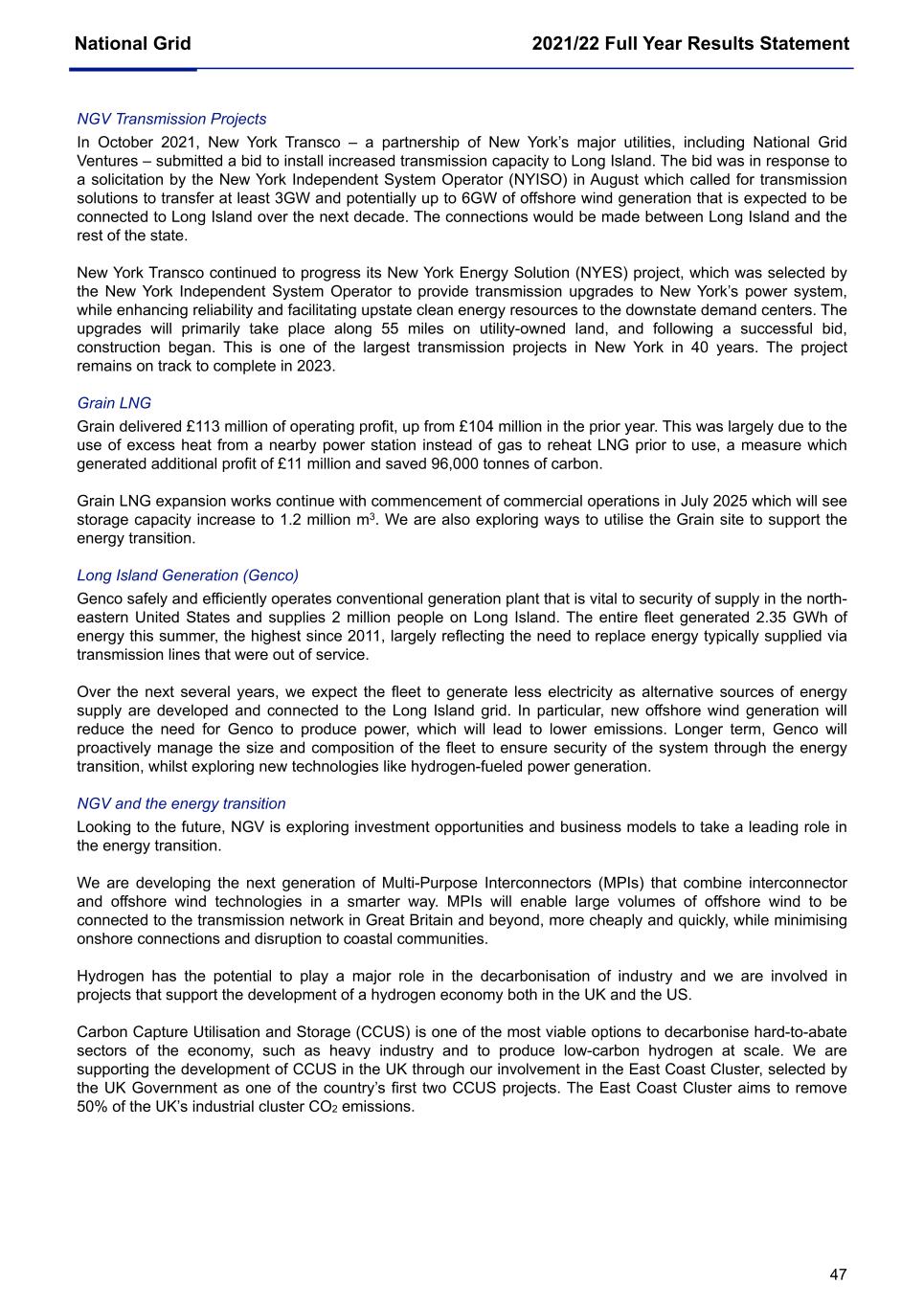
National Grid 2021/22 Full Year Results Statement 47 NGV Transmission Projects In October 2021, New York Transco – a partnership of New York’s major utilities, including National Grid Ventures – submitted a bid to install increased transmission capacity to Long Island. The bid was in response to a solicitation by the New York Independent System Operator (NYISO) in August which called for transmission solutions to transfer at least 3GW and potentially up to 6GW of offshore wind generation that is expected to be connected to Long Island over the next decade. The connections would be made between Long Island and the rest of the state. New York Transco continued to progress its New York Energy Solution (NYES) project, which was selected by the New York Independent System Operator to provide transmission upgrades to New York’s power system, while enhancing reliability and facilitating upstate clean energy resources to the downstate demand centers. The upgrades will primarily take place along 55 miles on utility-owned land, and following a successful bid, construction began. This is one of the largest transmission projects in New York in 40 years. The project remains on track to complete in 2023. Grain LNG Grain delivered £113 million of operating profit, up from £104 million in the prior year. This was largely due to the use of excess heat from a nearby power station instead of gas to reheat LNG prior to use, a measure which generated additional profit of £11 million and saved 96,000 tonnes of carbon. Grain LNG expansion works continue with commencement of commercial operations in July 2025 which will see storage capacity increase to 1.2 million m3. We are also exploring ways to utilise the Grain site to support the energy transition. Long Island Generation (Genco) Genco safely and efficiently operates conventional generation plant that is vital to security of supply in the north- eastern United States and supplies 2 million people on Long Island. The entire fleet generated 2.35 GWh of energy this summer, the highest since 2011, largely reflecting the need to replace energy typically supplied via transmission lines that were out of service. Over the next several years, we expect the fleet to generate less electricity as alternative sources of energy supply are developed and connected to the Long Island grid. In particular, new offshore wind generation will reduce the need for Genco to produce power, which will lead to lower emissions. Longer term, Genco will proactively manage the size and composition of the fleet to ensure security of the system through the energy transition, whilst exploring new technologies like hydrogen-fueled power generation. NGV and the energy transition Looking to the future, NGV is exploring investment opportunities and business models to take a leading role in the energy transition. We are developing the next generation of Multi-Purpose Interconnectors (MPIs) that combine interconnector and offshore wind technologies in a smarter way. MPIs will enable large volumes of offshore wind to be connected to the transmission network in Great Britain and beyond, more cheaply and quickly, while minimising onshore connections and disruption to coastal communities. Hydrogen has the potential to play a major role in the decarbonisation of industry and we are involved in projects that support the development of a hydrogen economy both in the UK and the US. Carbon Capture Utilisation and Storage (CCUS) is one of the most viable options to decarbonise hard-to-abate sectors of the economy, such as heavy industry and to produce low-carbon hydrogen at scale. We are supporting the development of CCUS in the UK through our involvement in the East Coast Cluster, selected by the UK Government as one of the country’s first two CCUS projects. The East Coast Cluster aims to remove 50% of the UK’s industrial cluster CO2 emissions.
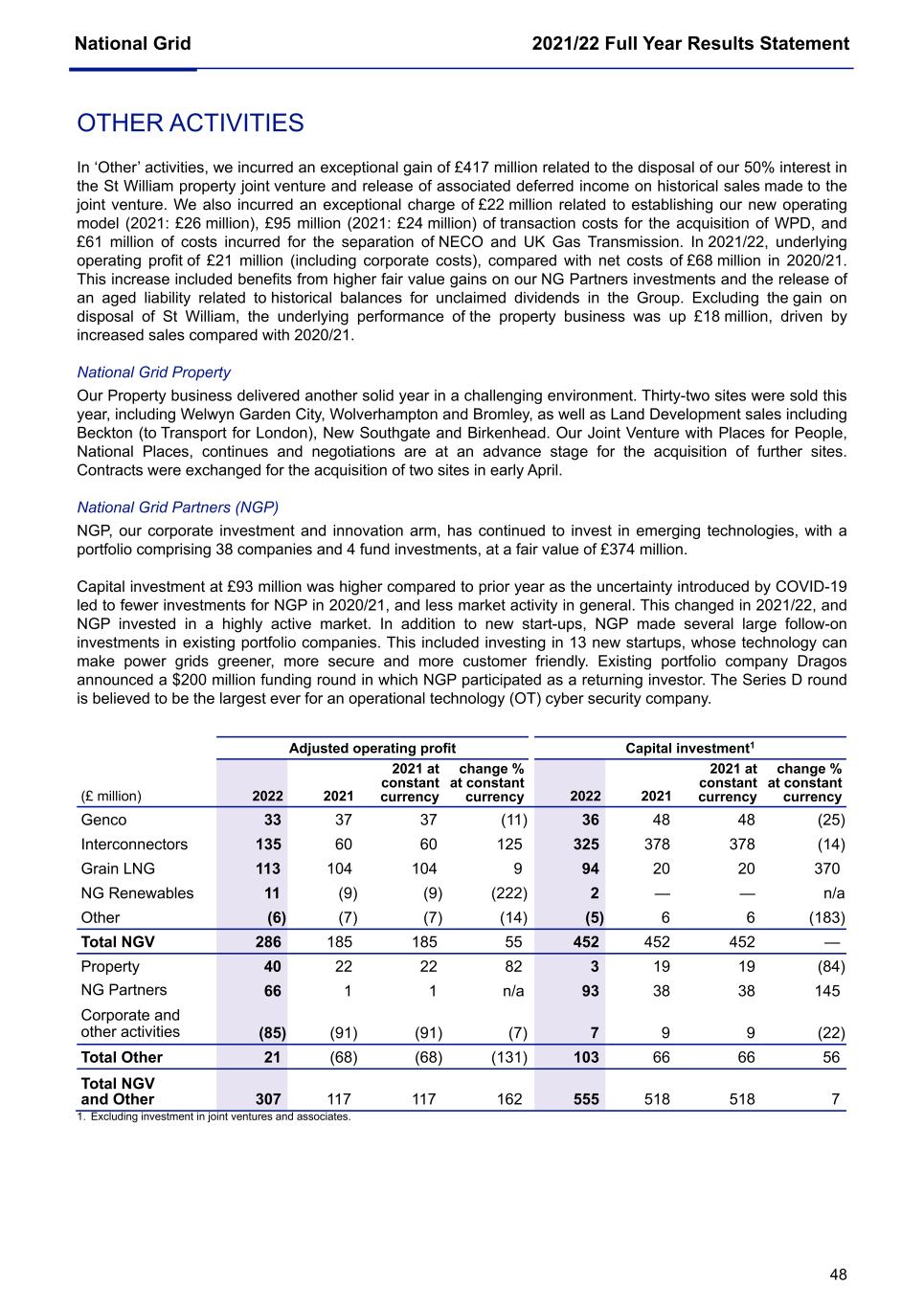
National Grid 2021/22 Full Year Results Statement 48 OTHER ACTIVITIES In ‘Other’ activities, we incurred an exceptional gain of £417 million related to the disposal of our 50% interest in the St William property joint venture and release of associated deferred income on historical sales made to the joint venture. We also incurred an exceptional charge of £22 million related to establishing our new operating model (2021: £26 million), £95 million (2021: £24 million) of transaction costs for the acquisition of WPD, and £61 million of costs incurred for the separation of NECO and UK Gas Transmission. In 2021/22, underlying operating profit of £21 million (including corporate costs), compared with net costs of £68 million in 2020/21. This increase included benefits from higher fair value gains on our NG Partners investments and the release of an aged liability related to historical balances for unclaimed dividends in the Group. Excluding the gain on disposal of St William, the underlying performance of the property business was up £18 million, driven by increased sales compared with 2020/21. National Grid Property Our Property business delivered another solid year in a challenging environment. Thirty-two sites were sold this year, including Welwyn Garden City, Wolverhampton and Bromley, as well as Land Development sales including Beckton (to Transport for London), New Southgate and Birkenhead. Our Joint Venture with Places for People, National Places, continues and negotiations are at an advance stage for the acquisition of further sites. Contracts were exchanged for the acquisition of two sites in early April. National Grid Partners (NGP) NGP, our corporate investment and innovation arm, has continued to invest in emerging technologies, with a portfolio comprising 38 companies and 4 fund investments, at a fair value of £374 million. Capital investment at £93 million was higher compared to prior year as the uncertainty introduced by COVID-19 led to fewer investments for NGP in 2020/21, and less market activity in general. This changed in 2021/22, and NGP invested in a highly active market. In addition to new start-ups, NGP made several large follow-on investments in existing portfolio companies. This included investing in 13 new startups, whose technology can make power grids greener, more secure and more customer friendly. Existing portfolio company Dragos announced a $200 million funding round in which NGP participated as a returning investor. The Series D round is believed to be the largest ever for an operational technology (OT) cyber security company. Adjusted operating profit Capital investment1 (£ million) 2022 2021 2021 at constant currency change % at constant currency 2022 2021 2021 at constant currency change % at constant currency Genco 33 37 37 (11) 36 48 48 (25) Interconnectors 135 60 60 125 325 378 378 (14) Grain LNG 113 104 104 9 94 20 20 370 NG Renewables 11 (9) (9) (222) 2 — — n/a Other (6) (7) (7) (14) (5) 6 6 (183) Total NGV 286 185 185 55 452 452 452 — Property 40 22 22 82 3 19 19 (84) NG Partners 66 1 1 n/a 93 38 38 145 Corporate and other activities (85) (91) (91) (7) 7 9 9 (22) Total Other 21 (68) (68) (131) 103 66 66 56 Total NGV and Other 307 117 117 162 555 518 518 7 1. Excluding investment in joint ventures and associates.
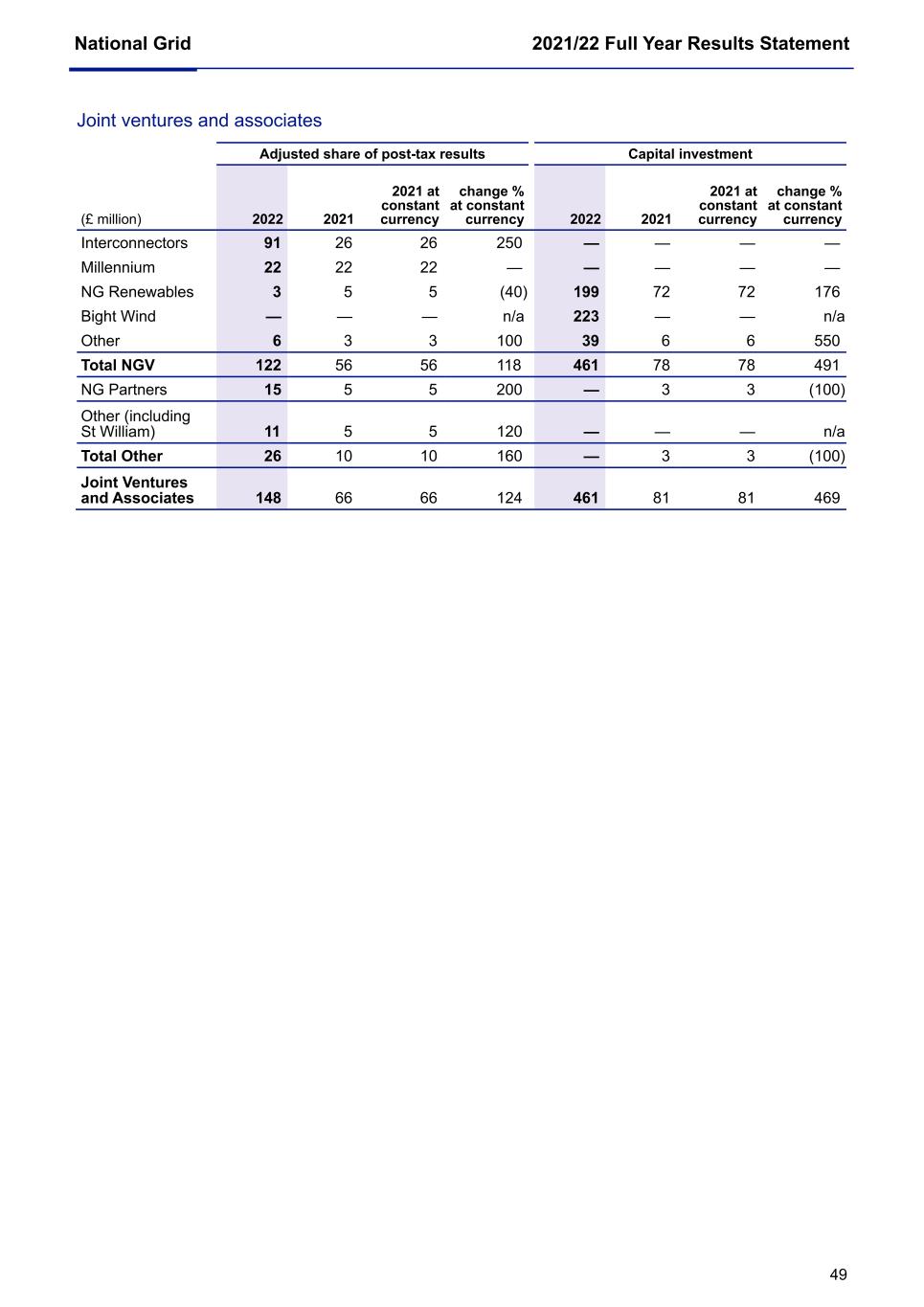
National Grid 2021/22 Full Year Results Statement 49 Joint ventures and associates Adjusted share of post-tax results Capital investment (£ million) 2022 2021 2021 at constant currency change % at constant currency 2022 2021 2021 at constant currency change % at constant currency Interconnectors 91 26 26 250 — — — — Millennium 22 22 22 — — — — — NG Renewables 3 5 5 (40) 199 72 72 176 Bight Wind — — — n/a 223 — — n/a Other 6 3 3 100 39 6 6 550 Total NGV 122 56 56 118 461 78 78 491 NG Partners 15 5 5 200 — 3 3 (100) Other (including St William) 11 5 5 120 — — — n/a Total Other 26 10 10 160 — 3 3 (100) Joint Ventures and Associates 148 66 66 124 461 81 81 469
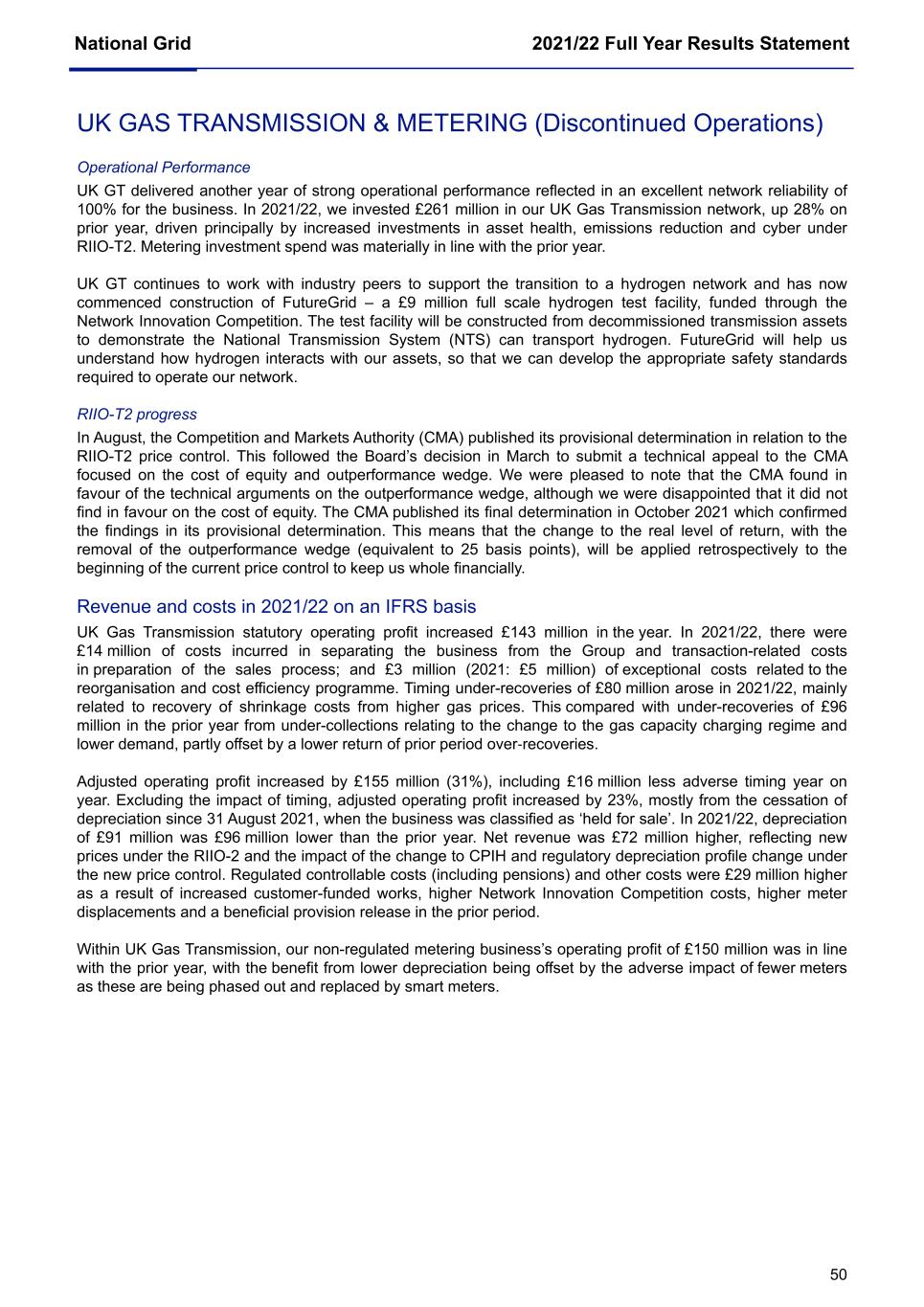
National Grid 2021/22 Full Year Results Statement 50 UK GAS TRANSMISSION & METERING (Discontinued Operations) Operational Performance UK GT delivered another year of strong operational performance reflected in an excellent network reliability of 100% for the business. In 2021/22, we invested £261 million in our UK Gas Transmission network, up 28% on prior year, driven principally by increased investments in asset health, emissions reduction and cyber under RIIO-T2. Metering investment spend was materially in line with the prior year. UK GT continues to work with industry peers to support the transition to a hydrogen network and has now commenced construction of FutureGrid – a £9 million full scale hydrogen test facility, funded through the Network Innovation Competition. The test facility will be constructed from decommissioned transmission assets to demonstrate the National Transmission System (NTS) can transport hydrogen. FutureGrid will help us understand how hydrogen interacts with our assets, so that we can develop the appropriate safety standards required to operate our network. RIIO-T2 progress In August, the Competition and Markets Authority (CMA) published its provisional determination in relation to the RIIO-T2 price control. This followed the Board’s decision in March to submit a technical appeal to the CMA focused on the cost of equity and outperformance wedge. We were pleased to note that the CMA found in favour of the technical arguments on the outperformance wedge, although we were disappointed that it did not find in favour on the cost of equity. The CMA published its final determination in October 2021 which confirmed the findings in its provisional determination. This means that the change to the real level of return, with the removal of the outperformance wedge (equivalent to 25 basis points), will be applied retrospectively to the beginning of the current price control to keep us whole financially. Revenue and costs in 2021/22 on an IFRS basis UK Gas Transmission statutory operating profit increased £143 million in the year. In 2021/22, there were £14 million of costs incurred in separating the business from the Group and transaction-related costs in preparation of the sales process; and £3 million (2021: £5 million) of exceptional costs related to the reorganisation and cost efficiency programme. Timing under-recoveries of £80 million arose in 2021/22, mainly related to recovery of shrinkage costs from higher gas prices. This compared with under-recoveries of £96 million in the prior year from under-collections relating to the change to the gas capacity charging regime and lower demand, partly offset by a lower return of prior period over‑recoveries. Adjusted operating profit increased by £155 million (31%), including £16 million less adverse timing year on year. Excluding the impact of timing, adjusted operating profit increased by 23%, mostly from the cessation of depreciation since 31 August 2021, when the business was classified as ‘held for sale’. In 2021/22, depreciation of £91 million was £96 million lower than the prior year. Net revenue was £72 million higher, reflecting new prices under the RIIO-2 and the impact of the change to CPIH and regulatory depreciation profile change under the new price control. Regulated controllable costs (including pensions) and other costs were £29 million higher as a result of increased customer-funded works, higher Network Innovation Competition costs, higher meter displacements and a beneficial provision release in the prior period. Within UK Gas Transmission, our non-regulated metering business’s operating profit of £150 million was in line with the prior year, with the benefit from lower depreciation being offset by the adverse impact of fewer meters as these are being phased out and replaced by smart meters.
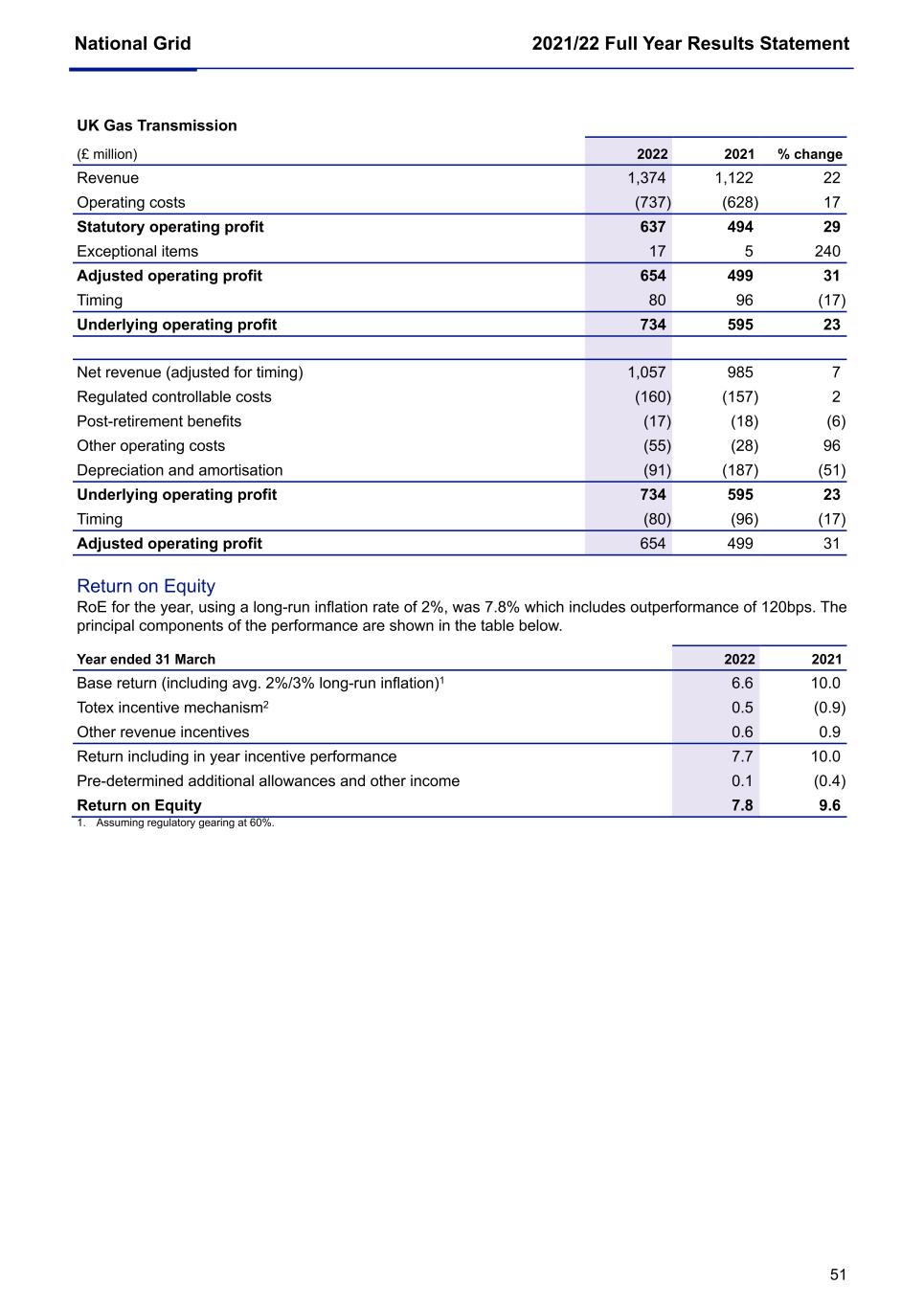
National Grid 2021/22 Full Year Results Statement 51 UK Gas Transmission (£ million) 2022 2021 % change Revenue 1,374 1,122 22 Operating costs (737) (628) 17 Statutory operating profit 637 494 29 Exceptional items 17 5 240 Adjusted operating profit 654 499 31 Timing 80 96 (17) Underlying operating profit 734 595 23 Net revenue (adjusted for timing) 1,057 985 7 Regulated controllable costs (160) (157) 2 Post-retirement benefits (17) (18) (6) Other operating costs (55) (28) 96 Depreciation and amortisation (91) (187) (51) Underlying operating profit 734 595 23 Timing (80) (96) (17) Adjusted operating profit 654 499 31 Return on Equity RoE for the year, using a long-run inflation rate of 2%, was 7.8% which includes outperformance of 120bps. The principal components of the performance are shown in the table below. Year ended 31 March 2022 2021 Base return (including avg. 2%/3% long-run inflation)1 6.6 10.0 Totex incentive mechanism2 0.5 (0.9) Other revenue incentives 0.6 0.9 Return including in year incentive performance 7.7 10.0 Pre-determined additional allowances and other income 0.1 (0.4) Return on Equity 7.8 9.6 1. Assuming regulatory gearing at 60%.
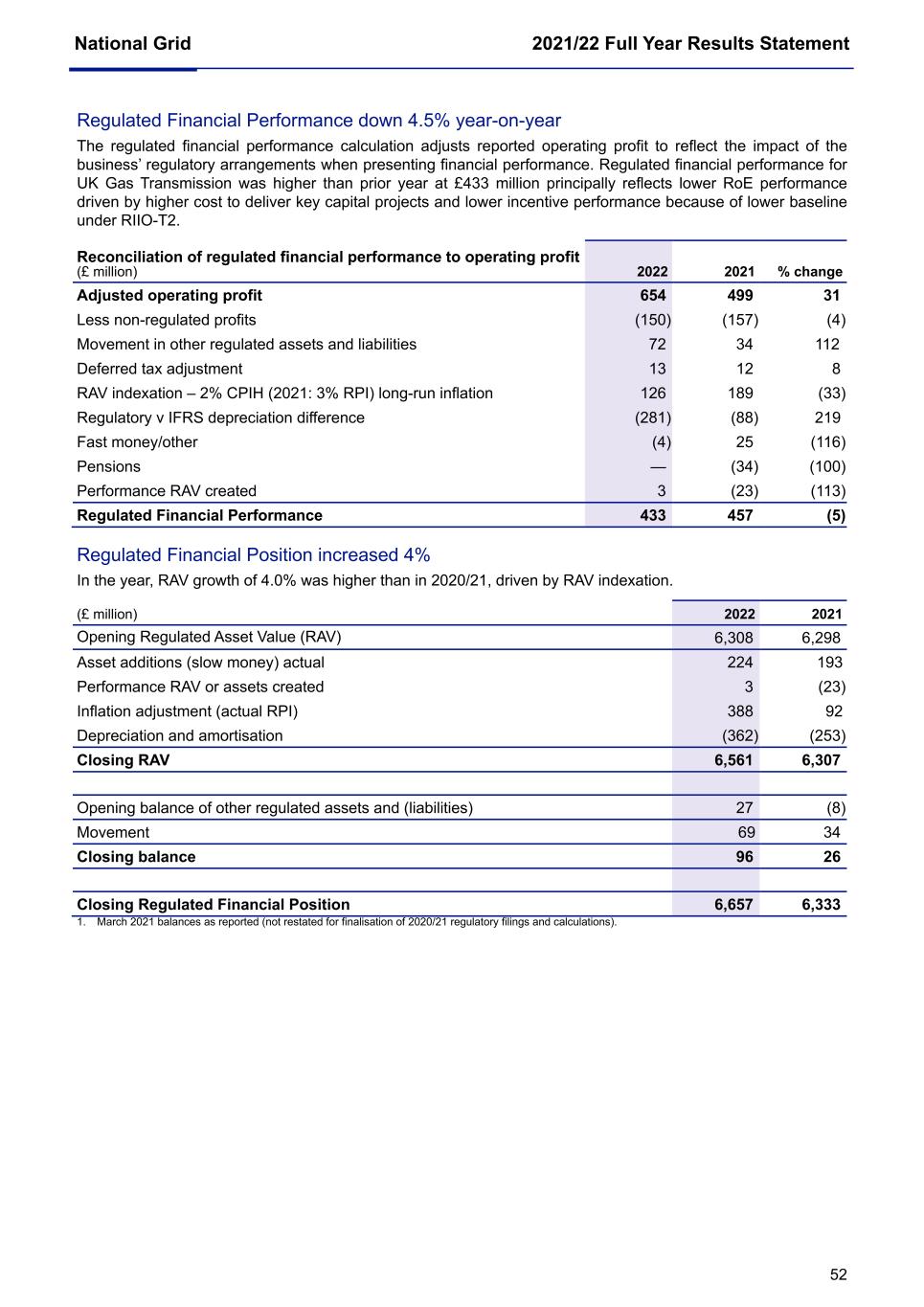
National Grid 2021/22 Full Year Results Statement 52 Regulated Financial Performance down 4.5% year-on-year The regulated financial performance calculation adjusts reported operating profit to reflect the impact of the business’ regulatory arrangements when presenting financial performance. Regulated financial performance for UK Gas Transmission was higher than prior year at £433 million principally reflects lower RoE performance driven by higher cost to deliver key capital projects and lower incentive performance because of lower baseline under RIIO-T2. Reconciliation of regulated financial performance to operating profit (£ million) 2022 2021 % change Adjusted operating profit 654 499 31 Less non-regulated profits (150) (157) (4) Movement in other regulated assets and liabilities 72 34 112 Deferred tax adjustment 13 12 8 RAV indexation – 2% CPIH (2021: 3% RPI) long-run inflation 126 189 (33) Regulatory v IFRS depreciation difference (281) (88) 219 Fast money/other (4) 25 (116) Pensions — (34) (100) Performance RAV created 3 (23) (113) Regulated Financial Performance 433 457 (5) Regulated Financial Position increased 4% In the year, RAV growth of 4.0% was higher than in 2020/21, driven by RAV indexation. (£ million) 2022 2021 Opening Regulated Asset Value (RAV) 6,308 6,298 Asset additions (slow money) actual 224 193 Performance RAV or assets created 3 (23) Inflation adjustment (actual RPI) 388 92 Depreciation and amortisation (362) (253) Closing RAV 6,561 6,307 Opening balance of other regulated assets and (liabilities) 27 (8) Movement 69 34 Closing balance 96 26 Closing Regulated Financial Position 6,657 6,333 1. March 2021 balances as reported (not restated for finalisation of 2020/21 regulatory filings and calculations).
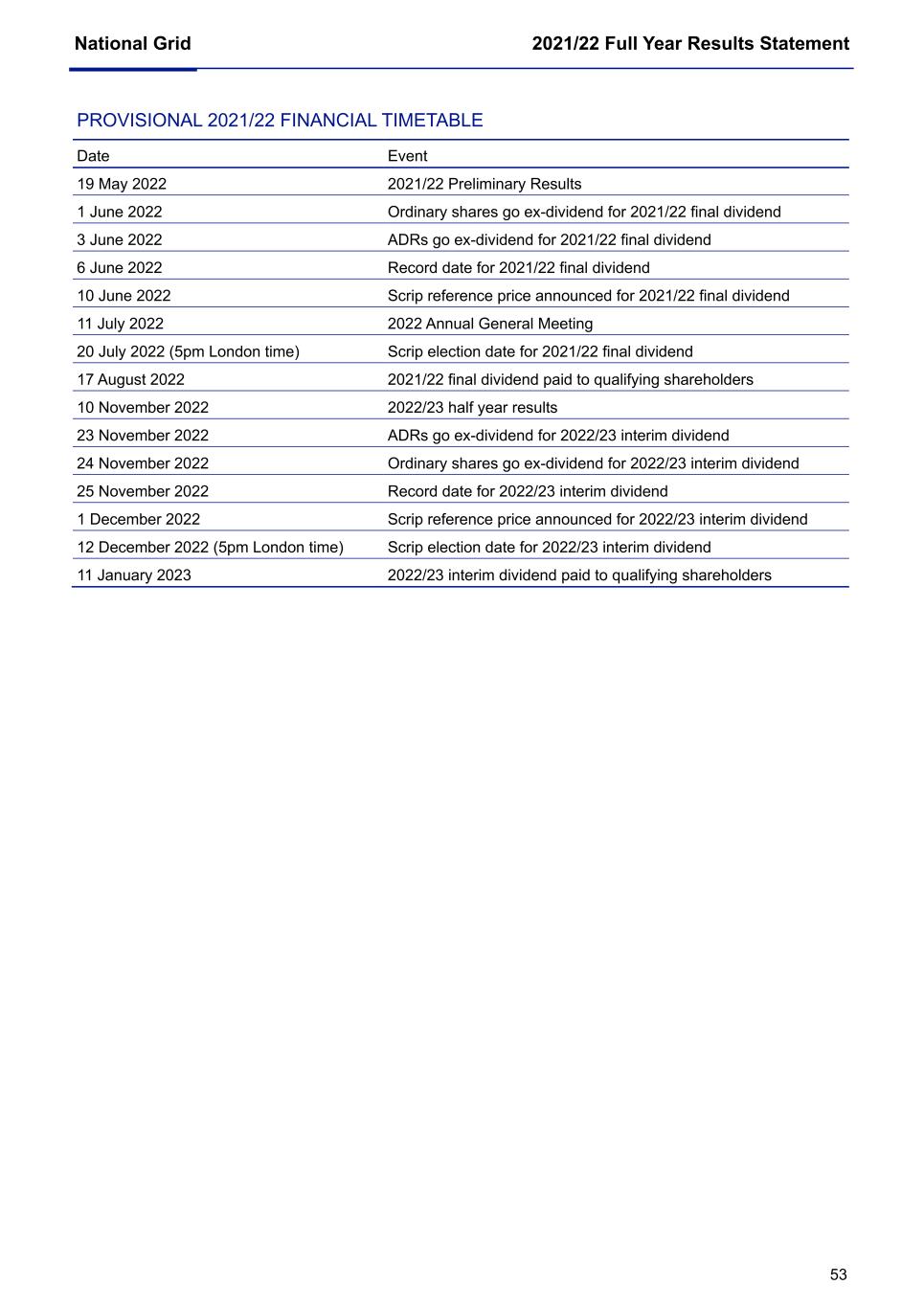
National Grid 2021/22 Full Year Results Statement 53 PROVISIONAL 2021/22 FINANCIAL TIMETABLE Date Event 19 May 2022 2021/22 Preliminary Results 1 June 2022 Ordinary shares go ex-dividend for 2021/22 final dividend 3 June 2022 ADRs go ex-dividend for 2021/22 final dividend 6 June 2022 Record date for 2021/22 final dividend 10 June 2022 Scrip reference price announced for 2021/22 final dividend 11 July 2022 2022 Annual General Meeting 20 July 2022 (5pm London time) Scrip election date for 2021/22 final dividend 17 August 2022 2021/22 final dividend paid to qualifying shareholders 10 November 2022 2022/23 half year results 23 November 2022 ADRs go ex-dividend for 2022/23 interim dividend 24 November 2022 Ordinary shares go ex-dividend for 2022/23 interim dividend 25 November 2022 Record date for 2022/23 interim dividend 1 December 2022 Scrip reference price announced for 2022/23 interim dividend 12 December 2022 (5pm London time) Scrip election date for 2022/23 interim dividend 11 January 2023 2022/23 interim dividend paid to qualifying shareholders
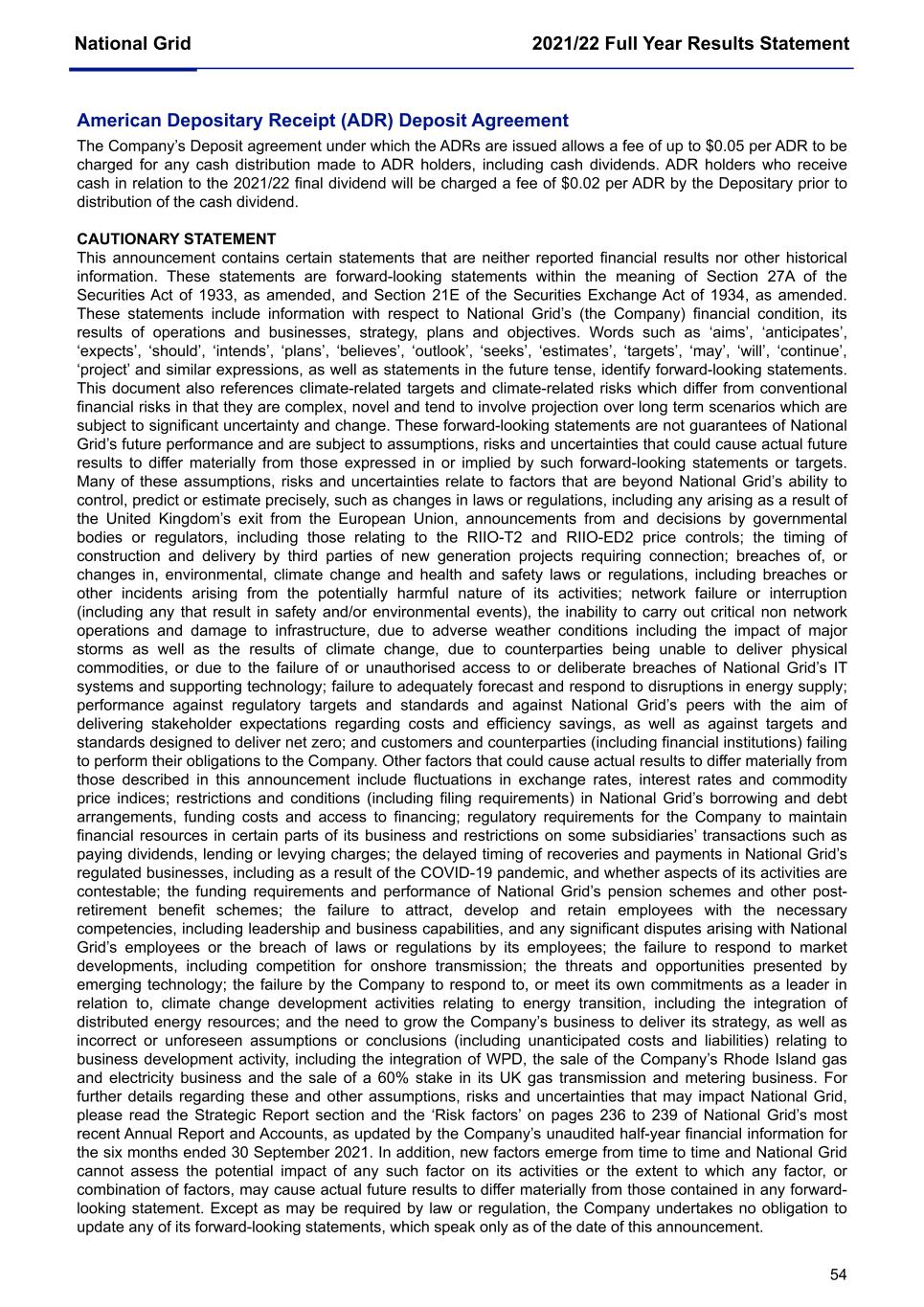
National Grid 2021/22 Full Year Results Statement 54 American Depositary Receipt (ADR) Deposit Agreement The Company’s Deposit agreement under which the ADRs are issued allows a fee of up to $0.05 per ADR to be charged for any cash distribution made to ADR holders, including cash dividends. ADR holders who receive cash in relation to the 2021/22 final dividend will be charged a fee of $0.02 per ADR by the Depositary prior to distribution of the cash dividend. CAUTIONARY STATEMENT This announcement contains certain statements that are neither reported financial results nor other historical information. These statements are forward-looking statements within the meaning of Section 27A of the Securities Act of 1933, as amended, and Section 21E of the Securities Exchange Act of 1934, as amended. These statements include information with respect to National Grid’s (the Company) financial condition, its results of operations and businesses, strategy, plans and objectives. Words such as ‘aims’, ‘anticipates’, ‘expects’, ‘should’, ‘intends’, ‘plans’, ‘believes’, ‘outlook’, ‘seeks’, ‘estimates’, ‘targets’, ‘may’, ‘will’, ‘continue’, ‘project’ and similar expressions, as well as statements in the future tense, identify forward-looking statements. This document also references climate-related targets and climate-related risks which differ from conventional financial risks in that they are complex, novel and tend to involve projection over long term scenarios which are subject to significant uncertainty and change. These forward-looking statements are not guarantees of National Grid’s future performance and are subject to assumptions, risks and uncertainties that could cause actual future results to differ materially from those expressed in or implied by such forward-looking statements or targets. Many of these assumptions, risks and uncertainties relate to factors that are beyond National Grid’s ability to control, predict or estimate precisely, such as changes in laws or regulations, including any arising as a result of the United Kingdom’s exit from the European Union, announcements from and decisions by governmental bodies or regulators, including those relating to the RIIO-T2 and RIIO-ED2 price controls; the timing of construction and delivery by third parties of new generation projects requiring connection; breaches of, or changes in, environmental, climate change and health and safety laws or regulations, including breaches or other incidents arising from the potentially harmful nature of its activities; network failure or interruption (including any that result in safety and/or environmental events), the inability to carry out critical non network operations and damage to infrastructure, due to adverse weather conditions including the impact of major storms as well as the results of climate change, due to counterparties being unable to deliver physical commodities, or due to the failure of or unauthorised access to or deliberate breaches of National Grid’s IT systems and supporting technology; failure to adequately forecast and respond to disruptions in energy supply; performance against regulatory targets and standards and against National Grid’s peers with the aim of delivering stakeholder expectations regarding costs and efficiency savings, as well as against targets and standards designed to deliver net zero; and customers and counterparties (including financial institutions) failing to perform their obligations to the Company. Other factors that could cause actual results to differ materially from those described in this announcement include fluctuations in exchange rates, interest rates and commodity price indices; restrictions and conditions (including filing requirements) in National Grid’s borrowing and debt arrangements, funding costs and access to financing; regulatory requirements for the Company to maintain financial resources in certain parts of its business and restrictions on some subsidiaries’ transactions such as paying dividends, lending or levying charges; the delayed timing of recoveries and payments in National Grid’s regulated businesses, including as a result of the COVID-19 pandemic, and whether aspects of its activities are contestable; the funding requirements and performance of National Grid’s pension schemes and other post- retirement benefit schemes; the failure to attract, develop and retain employees with the necessary competencies, including leadership and business capabilities, and any significant disputes arising with National Grid’s employees or the breach of laws or regulations by its employees; the failure to respond to market developments, including competition for onshore transmission; the threats and opportunities presented by emerging technology; the failure by the Company to respond to, or meet its own commitments as a leader in relation to, climate change development activities relating to energy transition, including the integration of distributed energy resources; and the need to grow the Company’s business to deliver its strategy, as well as incorrect or unforeseen assumptions or conclusions (including unanticipated costs and liabilities) relating to business development activity, including the integration of WPD, the sale of the Company’s Rhode Island gas and electricity business and the sale of a 60% stake in its UK gas transmission and metering business. For further details regarding these and other assumptions, risks and uncertainties that may impact National Grid, please read the Strategic Report section and the ‘Risk factors’ on pages 236 to 239 of National Grid’s most recent Annual Report and Accounts, as updated by the Company’s unaudited half-year financial information for the six months ended 30 September 2021. In addition, new factors emerge from time to time and National Grid cannot assess the potential impact of any such factor on its activities or the extent to which any factor, or combination of factors, may cause actual future results to differ materially from those contained in any forward- looking statement. Except as may be required by law or regulation, the Company undertakes no obligation to update any of its forward-looking statements, which speak only as of the date of this announcement.
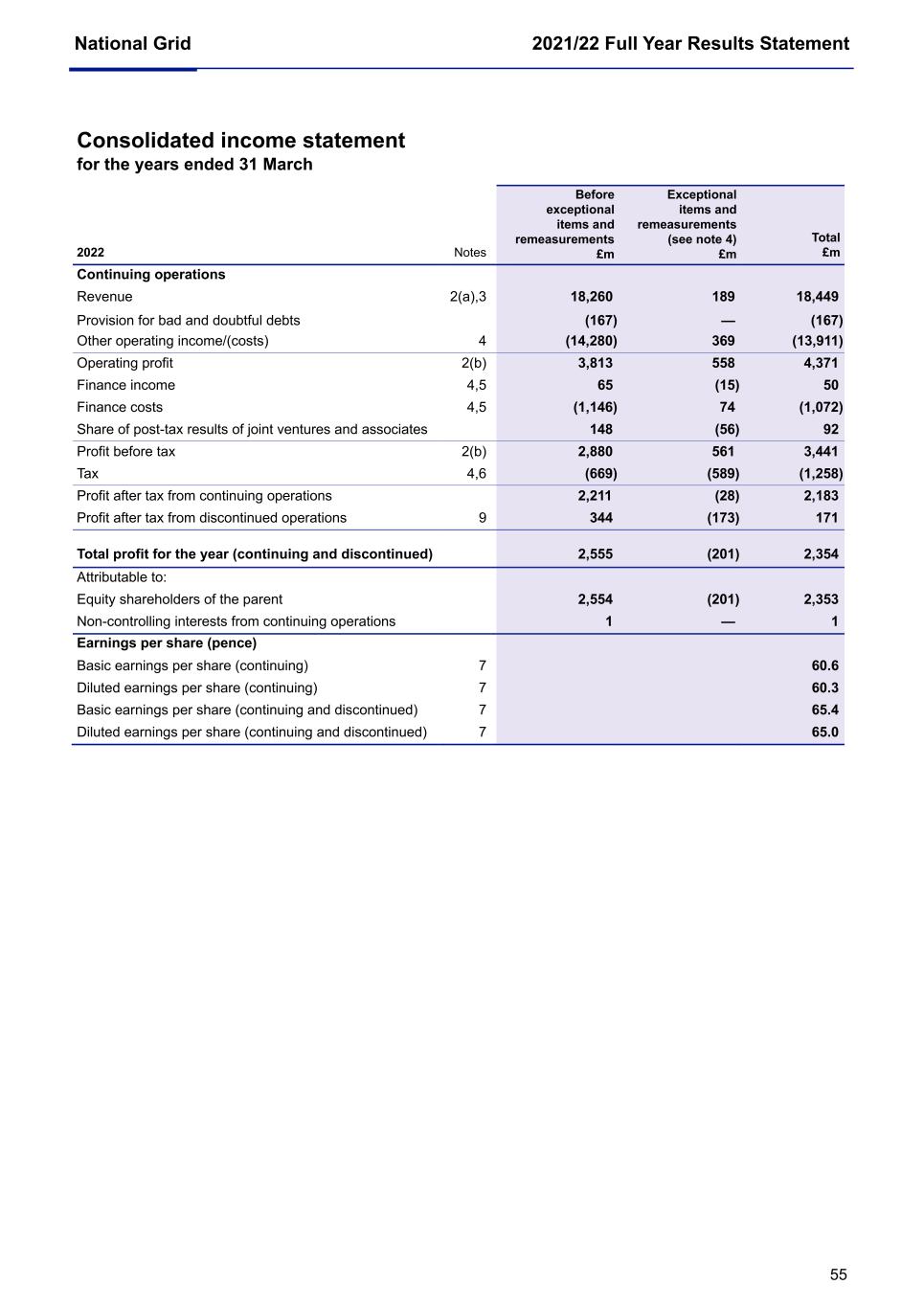
National Grid 2021/22 Full Year Results Statement 55 Consolidated income statement for the years ended 31 March 2022 Notes Before exceptional items and remeasurements £m Exceptional items and remeasurements (see note 4) £m Total £m Continuing operations Revenue 2(a),3 18,260 189 18,449 Provision for bad and doubtful debts (167) — (167) Other operating income/(costs) 4 (14,280) 369 (13,911) Operating profit 2(b) 3,813 558 4,371 Finance income 4,5 65 (15) 50 Finance costs 4,5 (1,146) 74 (1,072) Share of post-tax results of joint ventures and associates 148 (56) 92 Profit before tax 2(b) 2,880 561 3,441 Tax 4,6 (669) (589) (1,258) Profit after tax from continuing operations 2,211 (28) 2,183 Profit after tax from discontinued operations 9 344 (173) 171 Total profit for the year (continuing and discontinued) 2,555 (201) 2,354 Attributable to: Equity shareholders of the parent 2,554 (201) 2,353 Non-controlling interests from continuing operations 1 — 1 Earnings per share (pence) Basic earnings per share (continuing) 7 60.6 Diluted earnings per share (continuing) 7 60.3 Basic earnings per share (continuing and discontinued) 7 65.4 Diluted earnings per share (continuing and discontinued) 7 65.0
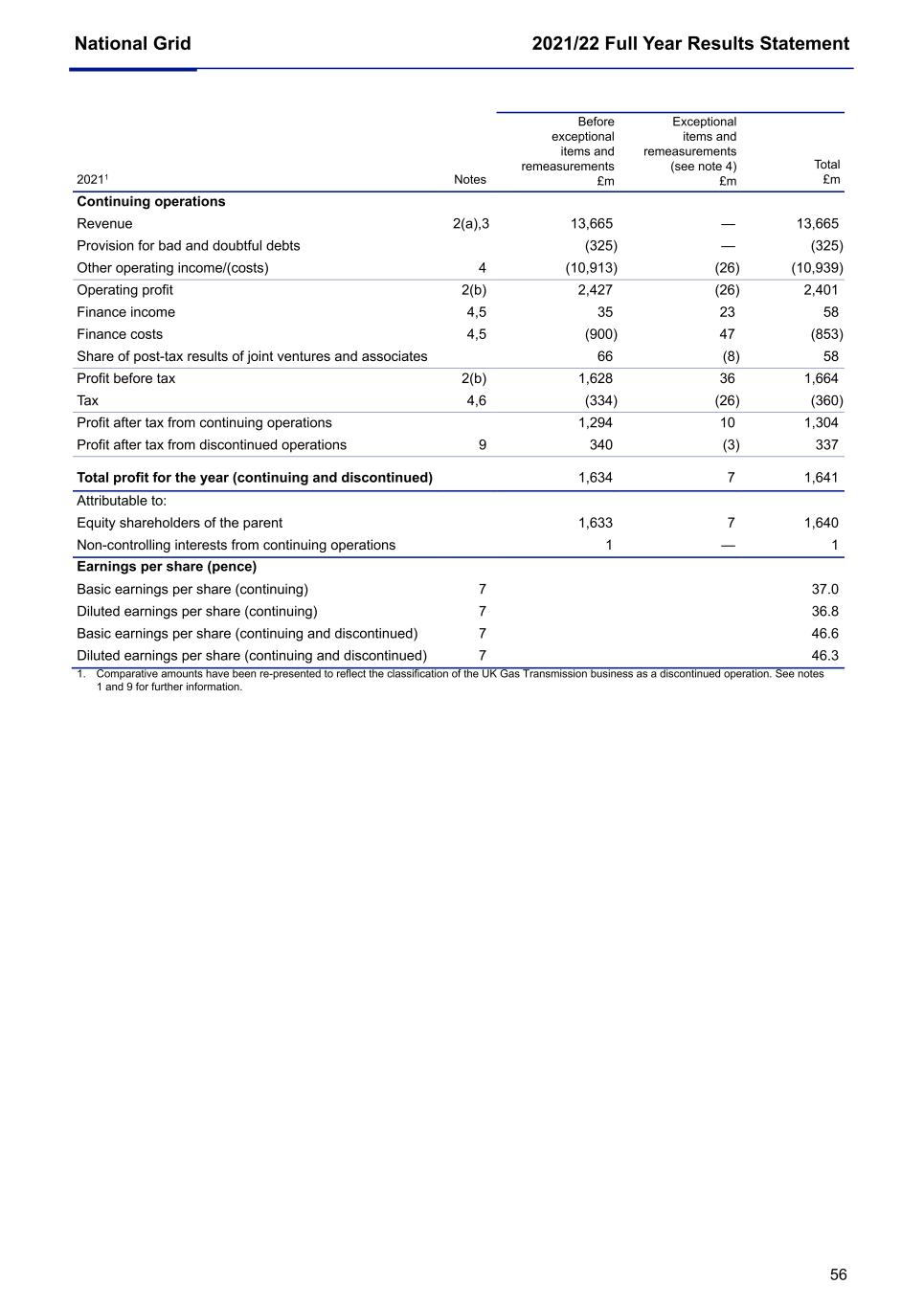
National Grid 2021/22 Full Year Results Statement 56 20211 Notes Before exceptional items and remeasurements £m Exceptional items and remeasurements (see note 4) £m Total £m Continuing operations Revenue 2(a),3 13,665 — 13,665 Provision for bad and doubtful debts (325) — (325) Other operating income/(costs) 4 (10,913) (26) (10,939) Operating profit 2(b) 2,427 (26) 2,401 Finance income 4,5 35 23 58 Finance costs 4,5 (900) 47 (853) Share of post-tax results of joint ventures and associates 66 (8) 58 Profit before tax 2(b) 1,628 36 1,664 Tax 4,6 (334) (26) (360) Profit after tax from continuing operations 1,294 10 1,304 Profit after tax from discontinued operations 9 340 (3) 337 Total profit for the year (continuing and discontinued) 1,634 7 1,641 Attributable to: Equity shareholders of the parent 1,633 7 1,640 Non-controlling interests from continuing operations 1 — 1 Earnings per share (pence) Basic earnings per share (continuing) 7 37.0 Diluted earnings per share (continuing) 7 36.8 Basic earnings per share (continuing and discontinued) 7 46.6 Diluted earnings per share (continuing and discontinued) 7 46.3 1. Comparative amounts have been re-presented to reflect the classification of the UK Gas Transmission business as a discontinued operation. See notes 1 and 9 for further information.
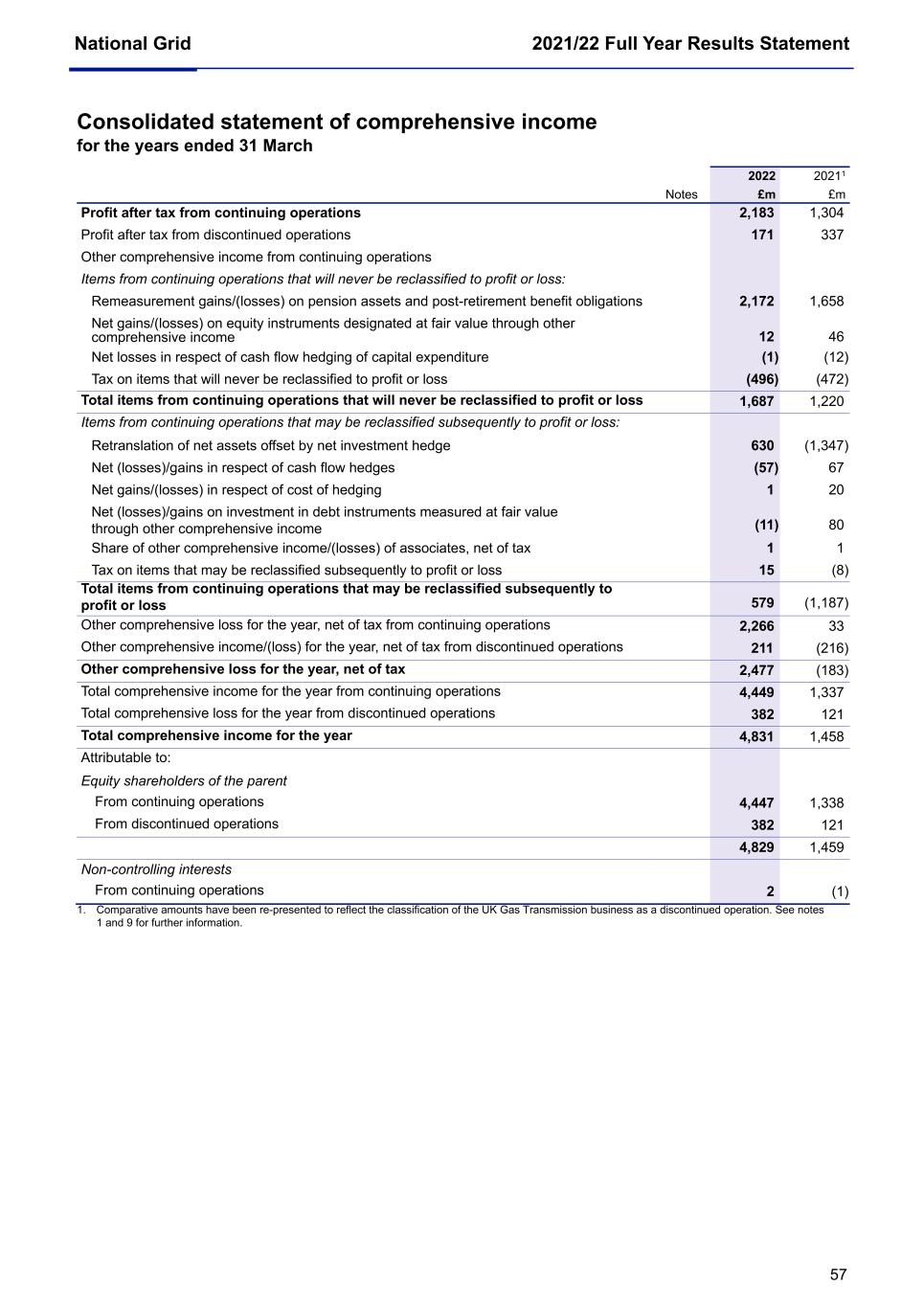
National Grid 2021/22 Full Year Results Statement 57 Consolidated statement of comprehensive income for the years ended 31 March 2022 20211 Notes £m £m Profit after tax from continuing operations 2,183 1,304 Profit after tax from discontinued operations 171 337 Other comprehensive income from continuing operations Items from continuing operations that will never be reclassified to profit or loss: Remeasurement gains/(losses) on pension assets and post-retirement benefit obligations 2,172 1,658 Net gains/(losses) on equity instruments designated at fair value through other comprehensive income 12 46 Net losses in respect of cash flow hedging of capital expenditure (1) (12) Tax on items that will never be reclassified to profit or loss (496) (472) Total items from continuing operations that will never be reclassified to profit or loss 1,687 1,220 Items from continuing operations that may be reclassified subsequently to profit or loss: Retranslation of net assets offset by net investment hedge 630 (1,347) Net (losses)/gains in respect of cash flow hedges (57) 67 Net gains/(losses) in respect of cost of hedging 1 20 Net (losses)/gains on investment in debt instruments measured at fair value through other comprehensive income (11) 80 Share of other comprehensive income/(losses) of associates, net of tax 1 1 Tax on items that may be reclassified subsequently to profit or loss 15 (8) Total items from continuing operations that may be reclassified subsequently to profit or loss 579 (1,187) Other comprehensive loss for the year, net of tax from continuing operations 2,266 33 Other comprehensive income/(loss) for the year, net of tax from discontinued operations 211 (216) Other comprehensive loss for the year, net of tax 2,477 (183) Total comprehensive income for the year from continuing operations 4,449 1,337 Total comprehensive loss for the year from discontinued operations 382 121 Total comprehensive income for the year 4,831 1,458 Attributable to: Equity shareholders of the parent From continuing operations 4,447 1,338 From discontinued operations 382 121 4,829 1,459 Non-controlling interests From continuing operations 2 (1) 1. Comparative amounts have been re-presented to reflect the classification of the UK Gas Transmission business as a discontinued operation. See notes 1 and 9 for further information.
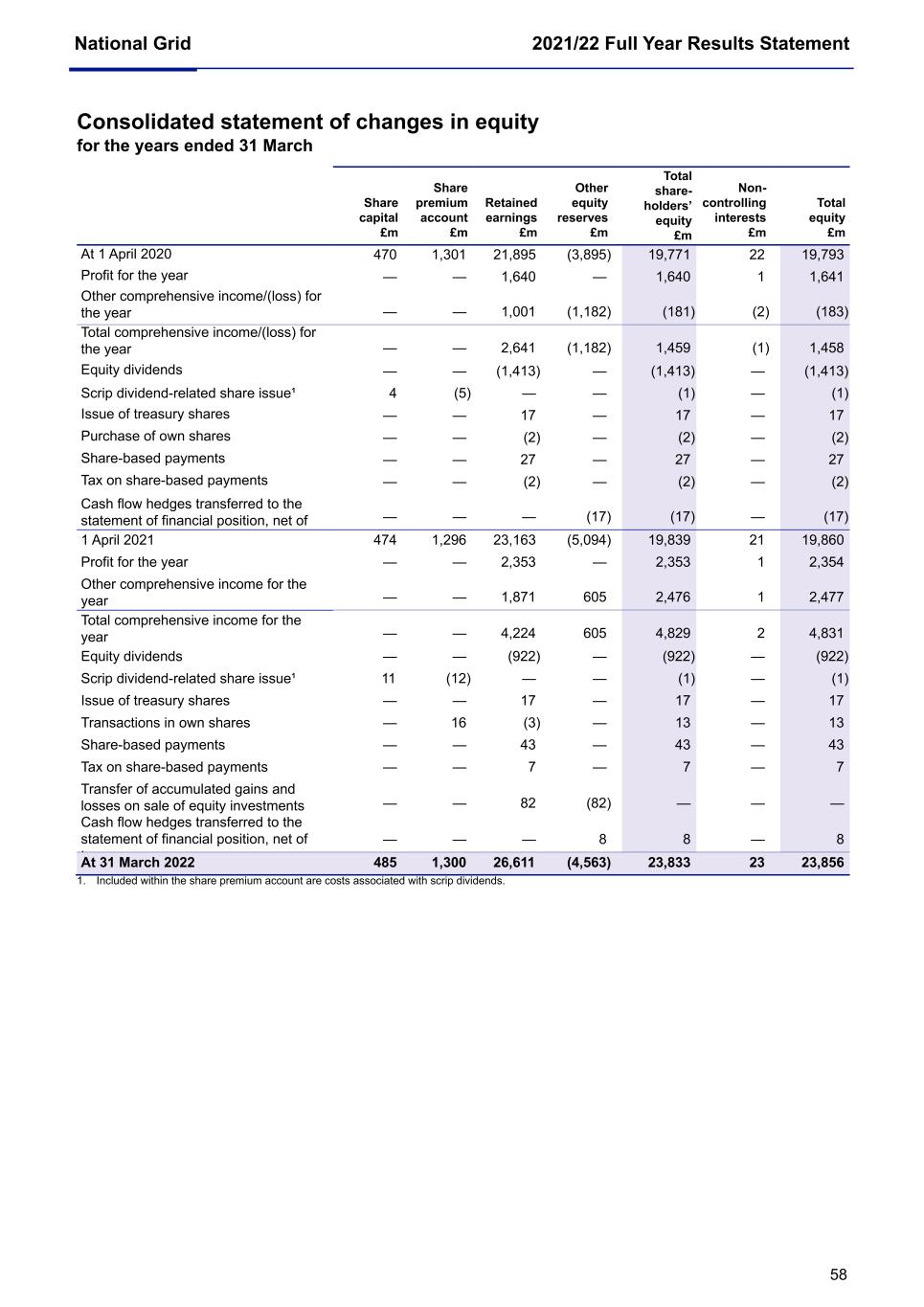
National Grid 2021/22 Full Year Results Statement 58 Consolidated statement of changes in equity for the years ended 31 March Share capital £m Share premium account £m Retained earnings £m Other equity reserves £m Total share- holders’ equity £m Non- controlling interests £m Total equity £m At 1 April 2020 470 1,301 21,895 (3,895) 19,771 22 19,793 Profit for the year — — 1,640 — 1,640 1 1,641 Other comprehensive income/(loss) for the year — — 1,001 (1,182) (181) (2) (183) Total comprehensive income/(loss) for the year — — 2,641 (1,182) 1,459 (1) 1,458 Equity dividends — — (1,413) — (1,413) — (1,413) Scrip dividend-related share issue¹ 4 (5) — — (1) — (1) Issue of treasury shares — — 17 — 17 — 17 Purchase of own shares — — (2) — (2) — (2) Share-based payments — — 27 — 27 — 27 Tax on share-based payments — — (2) — (2) — (2) Cash flow hedges transferred to the statement of financial position, net of — — — (17) (17) — (17) 1 April 2021 474 1,296 23,163 (5,094) 19,839 21 19,860 Profit for the year — — 2,353 — 2,353 1 2,354 Other comprehensive income for the year — — 1,871 605 2,476 1 2,477 Total comprehensive income for the year — — 4,224 605 4,829 2 4,831 Equity dividends — — (922) — (922) — (922) Scrip dividend-related share issue¹ 11 (12) — — (1) — (1) Issue of treasury shares — — 17 — 17 — 17 Transactions in own shares — 16 (3) — 13 — 13 Share-based payments — — 43 — 43 — 43 Tax on share-based payments — — 7 — 7 — 7 Transfer of accumulated gains and losses on sale of equity investments — — 82 (82) — — — Cash flow hedges transferred to the statement of financial position, net of t — — — 8 8 — 8 At 31 March 2022 485 1,300 26,611 (4,563) 23,833 23 23,856 1. Included within the share premium account are costs associated with scrip dividends.
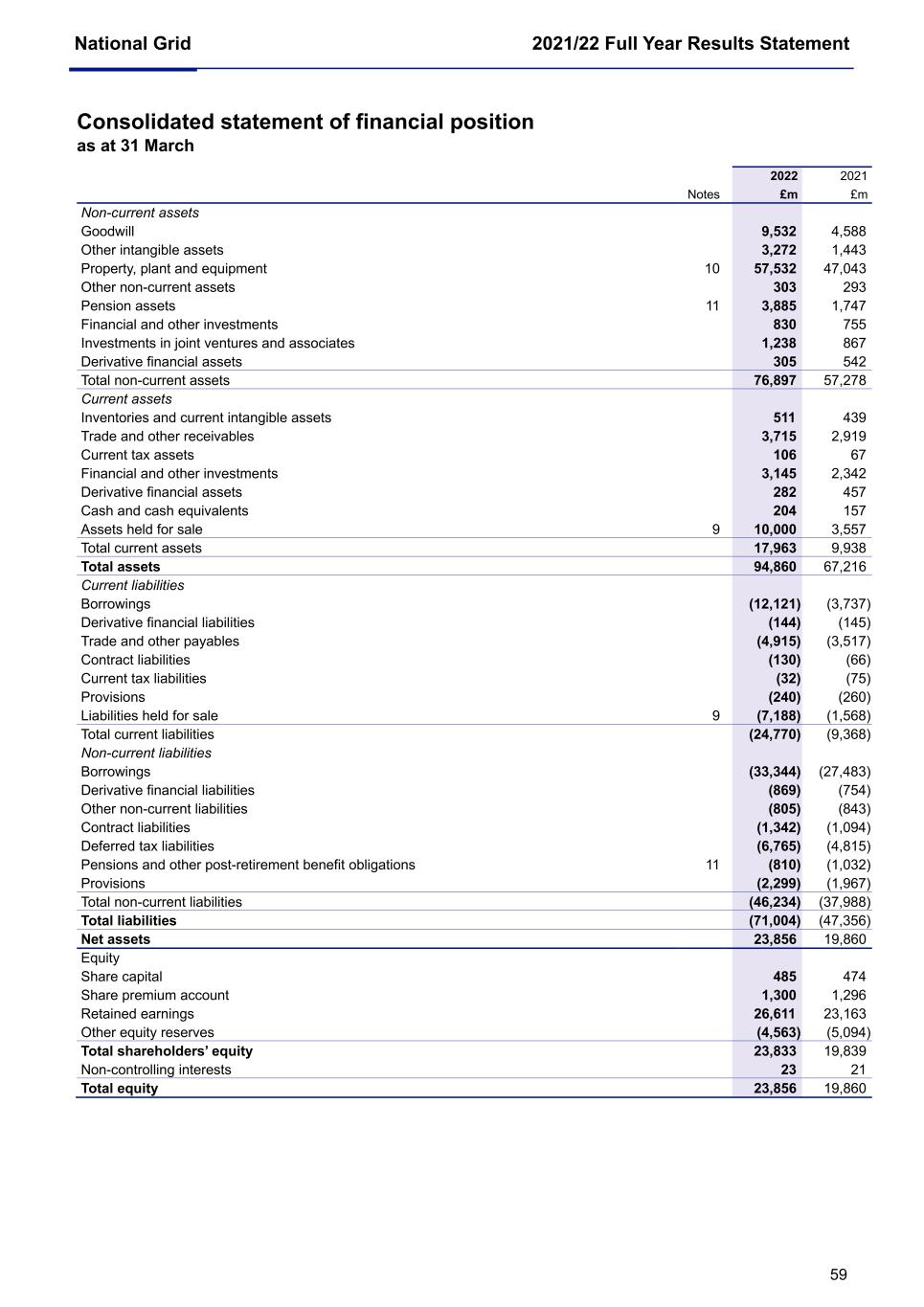
National Grid 2021/22 Full Year Results Statement 59 Consolidated statement of financial position as at 31 March 2022 2021 Notes £m £m Non-current assets Goodwill 9,532 4,588 Other intangible assets 3,272 1,443 Property, plant and equipment 10 57,532 47,043 Other non-current assets 303 293 Pension assets 11 3,885 1,747 Financial and other investments 830 755 Investments in joint ventures and associates 1,238 867 Derivative financial assets 305 542 Total non-current assets 76,897 57,278 Current assets Inventories and current intangible assets 511 439 Trade and other receivables 3,715 2,919 Current tax assets 106 67 Financial and other investments 3,145 2,342 Derivative financial assets 282 457 Cash and cash equivalents 204 157 Assets held for sale 9 10,000 3,557 Total current assets 17,963 9,938 Total assets 94,860 67,216 Current liabilities Borrowings (12,121) (3,737) Derivative financial liabilities (144) (145) Trade and other payables (4,915) (3,517) Contract liabilities (130) (66) Current tax liabilities (32) (75) Provisions (240) (260) Liabilities held for sale 9 (7,188) (1,568) Total current liabilities (24,770) (9,368) Non-current liabilities Borrowings (33,344) (27,483) Derivative financial liabilities (869) (754) Other non-current liabilities (805) (843) Contract liabilities (1,342) (1,094) Deferred tax liabilities (6,765) (4,815) Pensions and other post-retirement benefit obligations 11 (810) (1,032) Provisions (2,299) (1,967) Total non-current liabilities (46,234) (37,988) Total liabilities (71,004) (47,356) Net assets 23,856 19,860 Equity Share capital 485 474 Share premium account 1,300 1,296 Retained earnings 26,611 23,163 Other equity reserves (4,563) (5,094) Total shareholders’ equity 23,833 19,839 Non-controlling interests 23 21 Total equity 23,856 19,860
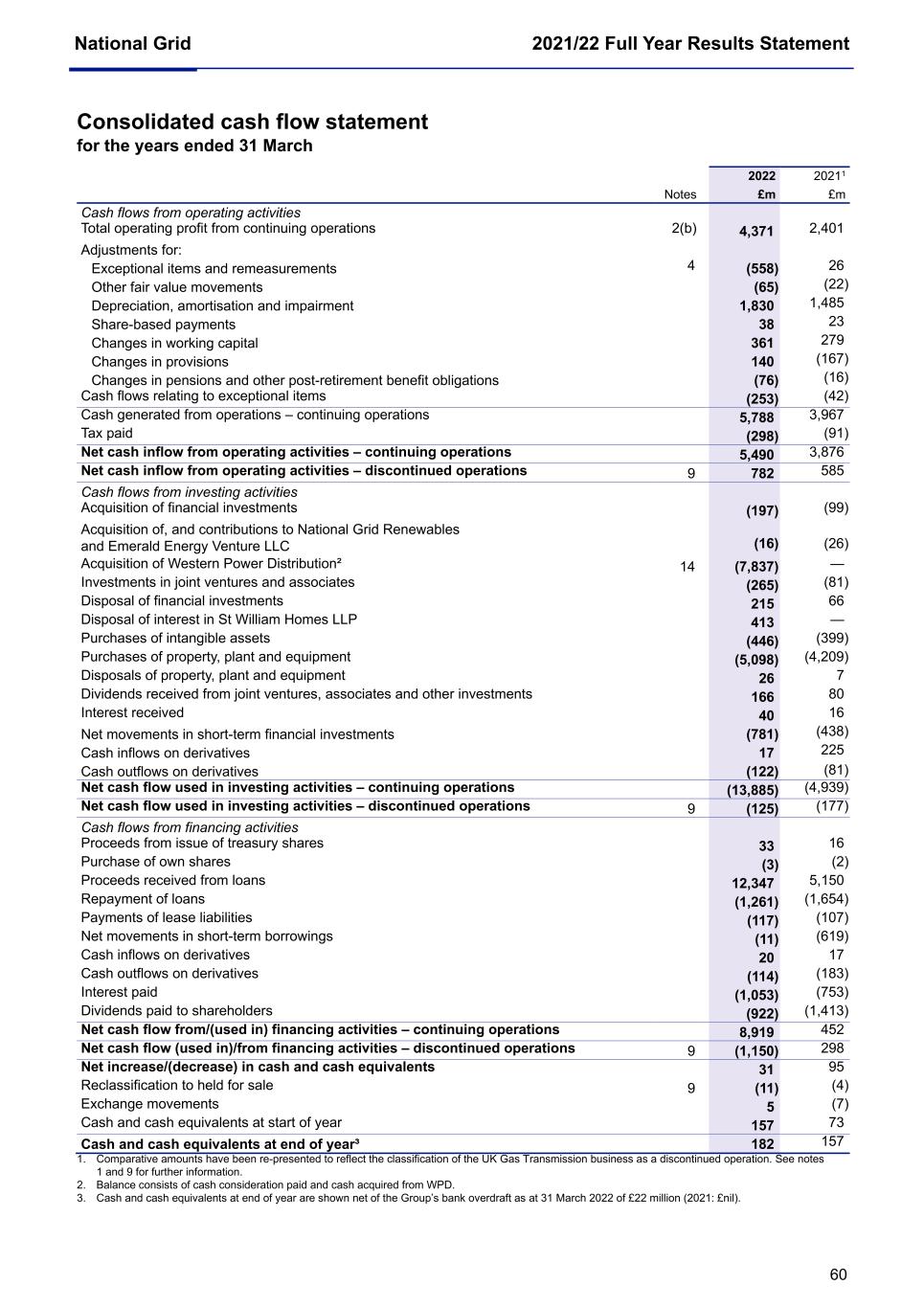
National Grid 2021/22 Full Year Results Statement 60 Consolidated cash flow statement for the years ended 31 March 2022 20211 Notes £m £m Cash flows from operating activities Total operating profit from continuing operations 2(b) 4,371 2,401 Adjustments for: Exceptional items and remeasurements 4 (558) 26 Other fair value movements (65) (22) Depreciation, amortisation and impairment 1,830 1,485 Share-based payments 38 23 Changes in working capital 361 279 Changes in provisions 140 (167) Changes in pensions and other post-retirement benefit obligations (76) (16) Cash flows relating to exceptional items (253) (42) Cash generated from operations – continuing operations 5,788 3,967 Tax paid (298) (91) Net cash inflow from operating activities – continuing operations 5,490 3,876 Net cash inflow from operating activities – discontinued operations 9 782 585 Cash flows from investing activities Acquisition of financial investments (197) (99) Acquisition of, and contributions to National Grid Renewables and Emerald Energy Venture LLC (16) (26) Acquisition of Western Power Distribution² 14 (7,837) — Investments in joint ventures and associates (265) (81) Disposal of financial investments 215 66 Disposal of interest in St William Homes LLP 413 — Purchases of intangible assets (446) (399) Purchases of property, plant and equipment (5,098) (4,209) Disposals of property, plant and equipment 26 7 Dividends received from joint ventures, associates and other investments 166 80 Interest received 40 16 Net movements in short-term financial investments (781) (438) Cash inflows on derivatives 17 225 Cash outflows on derivatives (122) (81) Net cash flow used in investing activities – continuing operations (13,885) (4,939) Net cash flow used in investing activities – discontinued operations 9 (125) (177) Cash flows from financing activities Proceeds from issue of treasury shares 33 16 Purchase of own shares (3) (2) Proceeds received from loans 12,347 5,150 Repayment of loans (1,261) (1,654) Payments of lease liabilities (117) (107) Net movements in short-term borrowings (11) (619) Cash inflows on derivatives 20 17 Cash outflows on derivatives (114) (183) Interest paid (1,053) (753) Dividends paid to shareholders (922) (1,413) Net cash flow from/(used in) financing activities – continuing operations 8,919 452 Net cash flow (used in)/from financing activities – discontinued operations 9 (1,150) 298 Net increase/(decrease) in cash and cash equivalents 31 95 Reclassification to held for sale 9 (11) (4) Exchange movements 5 (7) Cash and cash equivalents at start of year 157 73 Cash and cash equivalents at end of year³ 182 157 1. Comparative amounts have been re-presented to reflect the classification of the UK Gas Transmission business as a discontinued operation. See notes 1 and 9 for further information. 2. Balance consists of cash consideration paid and cash acquired from WPD. 3. Cash and cash equivalents at end of year are shown net of the Group’s bank overdraft as at 31 March 2022 of £22 million (2021: £nil).
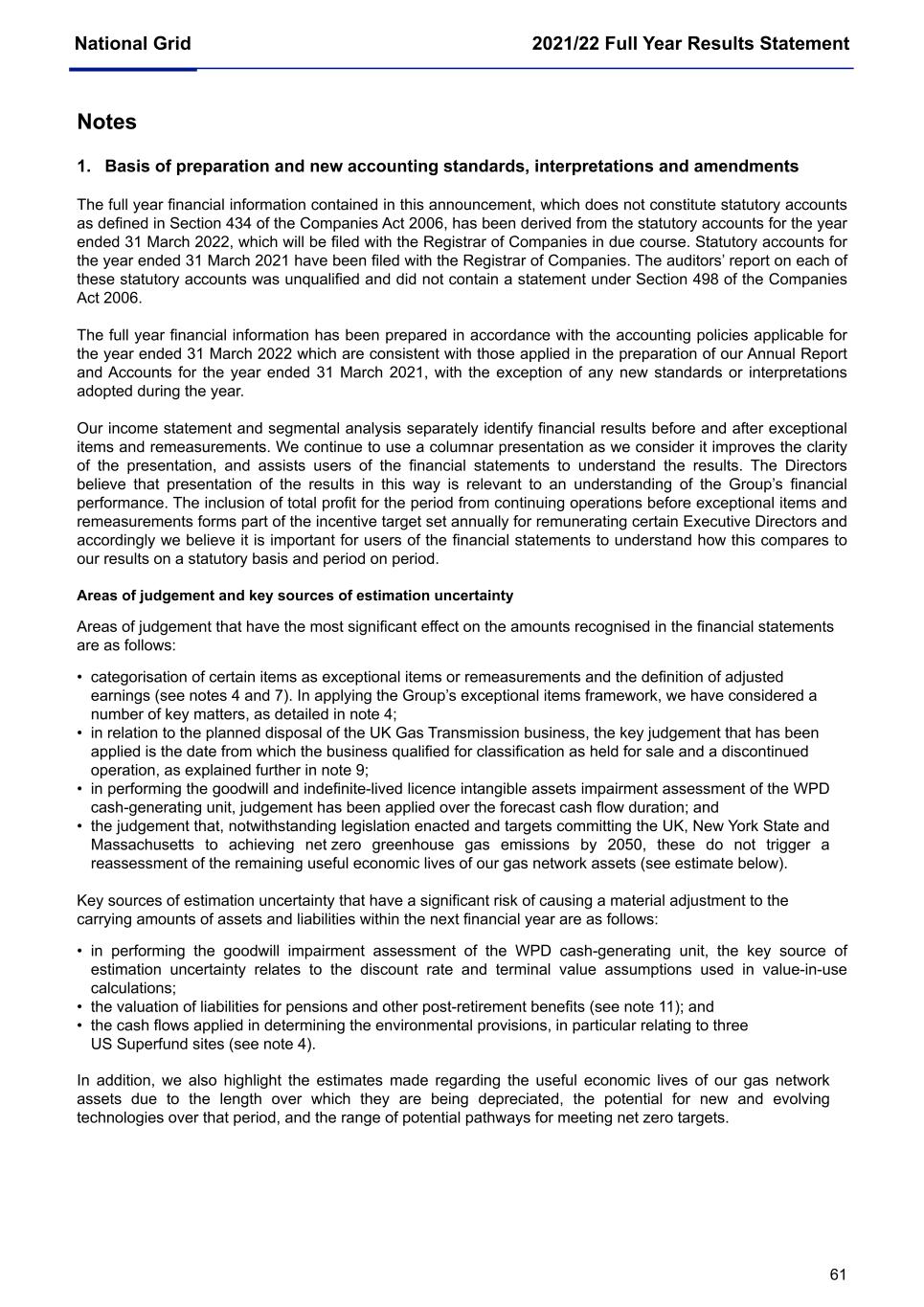
National Grid 2021/22 Full Year Results Statement 61 Notes 1. Basis of preparation and new accounting standards, interpretations and amendments The full year financial information contained in this announcement, which does not constitute statutory accounts as defined in Section 434 of the Companies Act 2006, has been derived from the statutory accounts for the year ended 31 March 2022, which will be filed with the Registrar of Companies in due course. Statutory accounts for the year ended 31 March 2021 have been filed with the Registrar of Companies. The auditors’ report on each of these statutory accounts was unqualified and did not contain a statement under Section 498 of the Companies Act 2006. The full year financial information has been prepared in accordance with the accounting policies applicable for the year ended 31 March 2022 which are consistent with those applied in the preparation of our Annual Report and Accounts for the year ended 31 March 2021, with the exception of any new standards or interpretations adopted during the year. Our income statement and segmental analysis separately identify financial results before and after exceptional items and remeasurements. We continue to use a columnar presentation as we consider it improves the clarity of the presentation, and assists users of the financial statements to understand the results. The Directors believe that presentation of the results in this way is relevant to an understanding of the Group’s financial performance. The inclusion of total profit for the period from continuing operations before exceptional items and remeasurements forms part of the incentive target set annually for remunerating certain Executive Directors and accordingly we believe it is important for users of the financial statements to understand how this compares to our results on a statutory basis and period on period. Areas of judgement and key sources of estimation uncertainty Areas of judgement that have the most significant effect on the amounts recognised in the financial statements are as follows: • categorisation of certain items as exceptional items or remeasurements and the definition of adjusted earnings (see notes 4 and 7). In applying the Group’s exceptional items framework, we have considered a number of key matters, as detailed in note 4; • in relation to the planned disposal of the UK Gas Transmission business, the key judgement that has been applied is the date from which the business qualified for classification as held for sale and a discontinued operation, as explained further in note 9; • in performing the goodwill and indefinite-lived licence intangible assets impairment assessment of the WPD cash-generating unit, judgement has been applied over the forecast cash flow duration; and • the judgement that, notwithstanding legislation enacted and targets committing the UK, New York State and Massachusetts to achieving net zero greenhouse gas emissions by 2050, these do not trigger a reassessment of the remaining useful economic lives of our gas network assets (see estimate below). Key sources of estimation uncertainty that have a significant risk of causing a material adjustment to the carrying amounts of assets and liabilities within the next financial year are as follows: • in performing the goodwill impairment assessment of the WPD cash-generating unit, the key source of estimation uncertainty relates to the discount rate and terminal value assumptions used in value-in-use calculations; • the valuation of liabilities for pensions and other post-retirement benefits (see note 11); and • the cash flows applied in determining the environmental provisions, in particular relating to three US Superfund sites (see note 4). In addition, we also highlight the estimates made regarding the useful economic lives of our gas network assets due to the length over which they are being depreciated, the potential for new and evolving technologies over that period, and the range of potential pathways for meeting net zero targets.
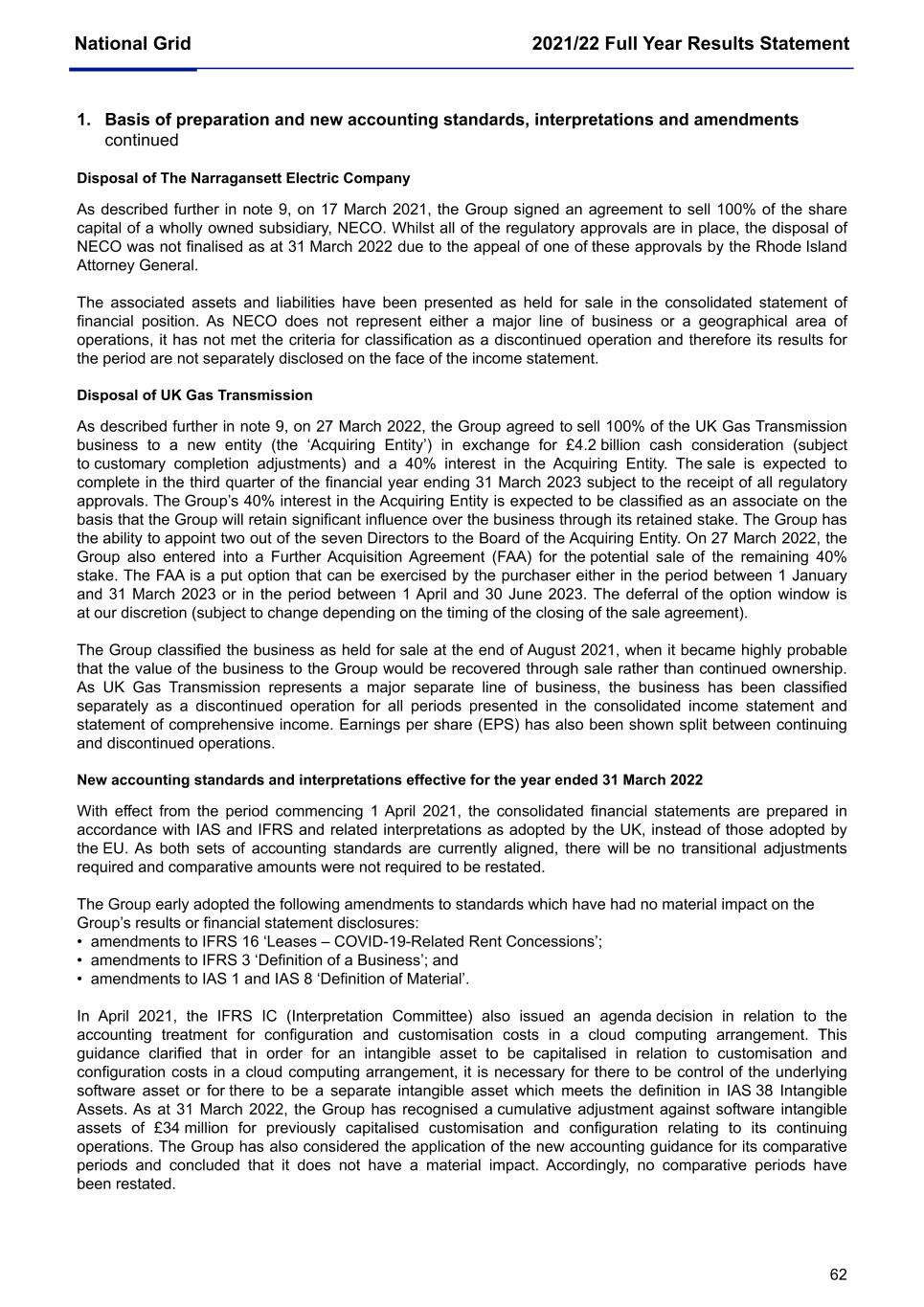
National Grid 2021/22 Full Year Results Statement 62 1. Basis of preparation and new accounting standards, interpretations and amendments continued Disposal of The Narragansett Electric Company As described further in note 9, on 17 March 2021, the Group signed an agreement to sell 100% of the share capital of a wholly owned subsidiary, NECO. Whilst all of the regulatory approvals are in place, the disposal of NECO was not finalised as at 31 March 2022 due to the appeal of one of these approvals by the Rhode Island Attorney General. The associated assets and liabilities have been presented as held for sale in the consolidated statement of financial position. As NECO does not represent either a major line of business or a geographical area of operations, it has not met the criteria for classification as a discontinued operation and therefore its results for the period are not separately disclosed on the face of the income statement. Disposal of UK Gas Transmission As described further in note 9, on 27 March 2022, the Group agreed to sell 100% of the UK Gas Transmission business to a new entity (the ‘Acquiring Entity’) in exchange for £4.2 billion cash consideration (subject to customary completion adjustments) and a 40% interest in the Acquiring Entity. The sale is expected to complete in the third quarter of the financial year ending 31 March 2023 subject to the receipt of all regulatory approvals. The Group’s 40% interest in the Acquiring Entity is expected to be classified as an associate on the basis that the Group will retain significant influence over the business through its retained stake. The Group has the ability to appoint two out of the seven Directors to the Board of the Acquiring Entity. On 27 March 2022, the Group also entered into a Further Acquisition Agreement (FAA) for the potential sale of the remaining 40% stake. The FAA is a put option that can be exercised by the purchaser either in the period between 1 January and 31 March 2023 or in the period between 1 April and 30 June 2023. The deferral of the option window is at our discretion (subject to change depending on the timing of the closing of the sale agreement). The Group classified the business as held for sale at the end of August 2021, when it became highly probable that the value of the business to the Group would be recovered through sale rather than continued ownership. As UK Gas Transmission represents a major separate line of business, the business has been classified separately as a discontinued operation for all periods presented in the consolidated income statement and statement of comprehensive income. Earnings per share (EPS) has also been shown split between continuing and discontinued operations. New accounting standards and interpretations effective for the year ended 31 March 2022 With effect from the period commencing 1 April 2021, the consolidated financial statements are prepared in accordance with IAS and IFRS and related interpretations as adopted by the UK, instead of those adopted by the EU. As both sets of accounting standards are currently aligned, there will be no transitional adjustments required and comparative amounts were not required to be restated. The Group early adopted the following amendments to standards which have had no material impact on the Group’s results or financial statement disclosures: • amendments to IFRS 16 ‘Leases – COVID-19-Related Rent Concessions’; • amendments to IFRS 3 ‘Definition of a Business’; and • amendments to IAS 1 and IAS 8 ‘Definition of Material’. In April 2021, the IFRS IC (Interpretation Committee) also issued an agenda decision in relation to the accounting treatment for configuration and customisation costs in a cloud computing arrangement. This guidance clarified that in order for an intangible asset to be capitalised in relation to customisation and configuration costs in a cloud computing arrangement, it is necessary for there to be control of the underlying software asset or for there to be a separate intangible asset which meets the definition in IAS 38 Intangible Assets. As at 31 March 2022, the Group has recognised a cumulative adjustment against software intangible assets of £34 million for previously capitalised customisation and configuration relating to its continuing operations. The Group has also considered the application of the new accounting guidance for its comparative periods and concluded that it does not have a material impact. Accordingly, no comparative periods have been restated.
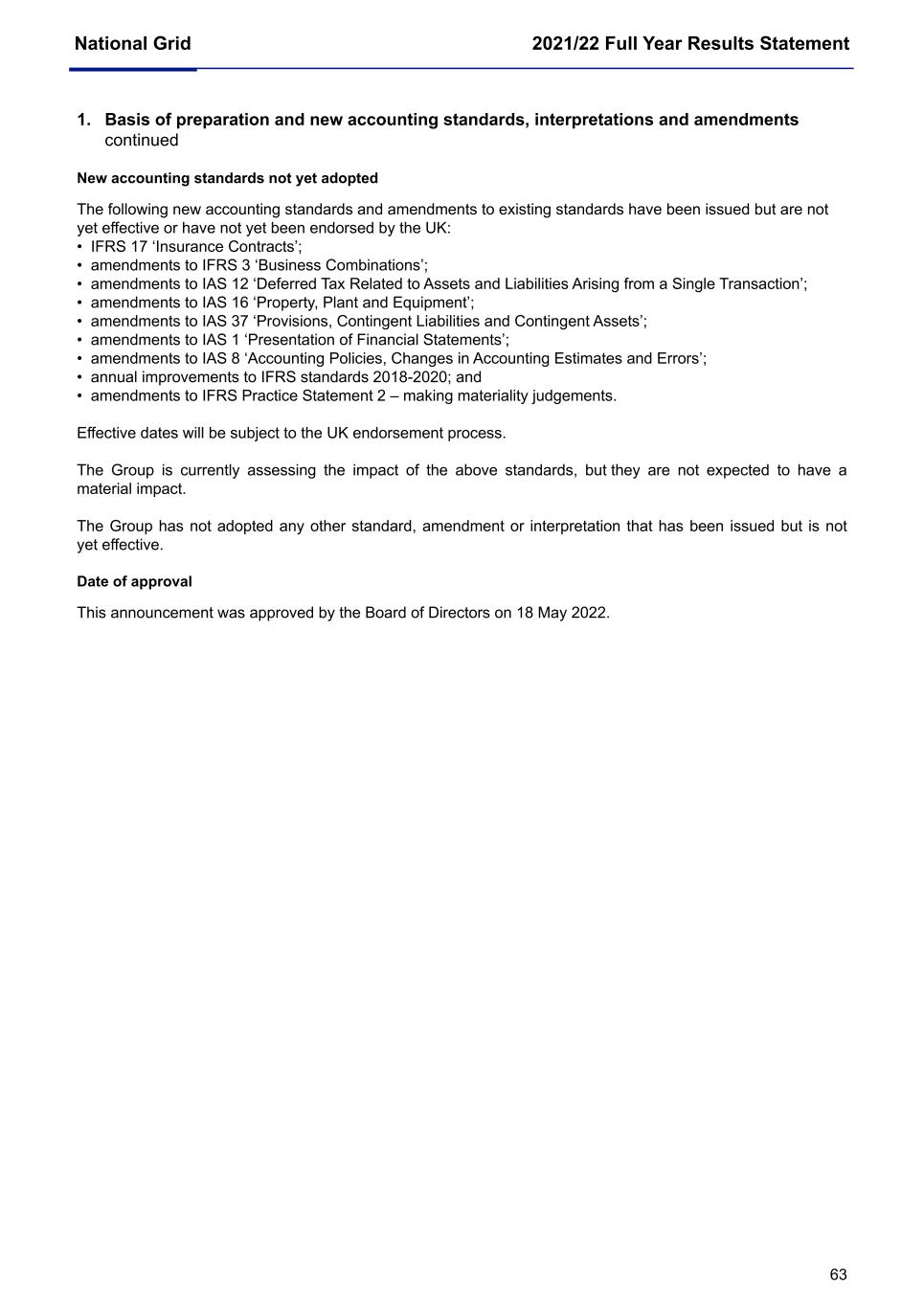
National Grid 2021/22 Full Year Results Statement 63 1. Basis of preparation and new accounting standards, interpretations and amendments continued New accounting standards not yet adopted The following new accounting standards and amendments to existing standards have been issued but are not yet effective or have not yet been endorsed by the UK: • IFRS 17 ‘Insurance Contracts’; • amendments to IFRS 3 ‘Business Combinations’; • amendments to IAS 12 ‘Deferred Tax Related to Assets and Liabilities Arising from a Single Transaction’; • amendments to IAS 16 ‘Property, Plant and Equipment’; • amendments to IAS 37 ‘Provisions, Contingent Liabilities and Contingent Assets’; • amendments to IAS 1 ‘Presentation of Financial Statements’; • amendments to IAS 8 ‘Accounting Policies, Changes in Accounting Estimates and Errors’; • annual improvements to IFRS standards 2018-2020; and • amendments to IFRS Practice Statement 2 – making materiality judgements. Effective dates will be subject to the UK endorsement process. The Group is currently assessing the impact of the above standards, but they are not expected to have a material impact. The Group has not adopted any other standard, amendment or interpretation that has been issued but is not yet effective. Date of approval This announcement was approved by the Board of Directors on 18 May 2022.
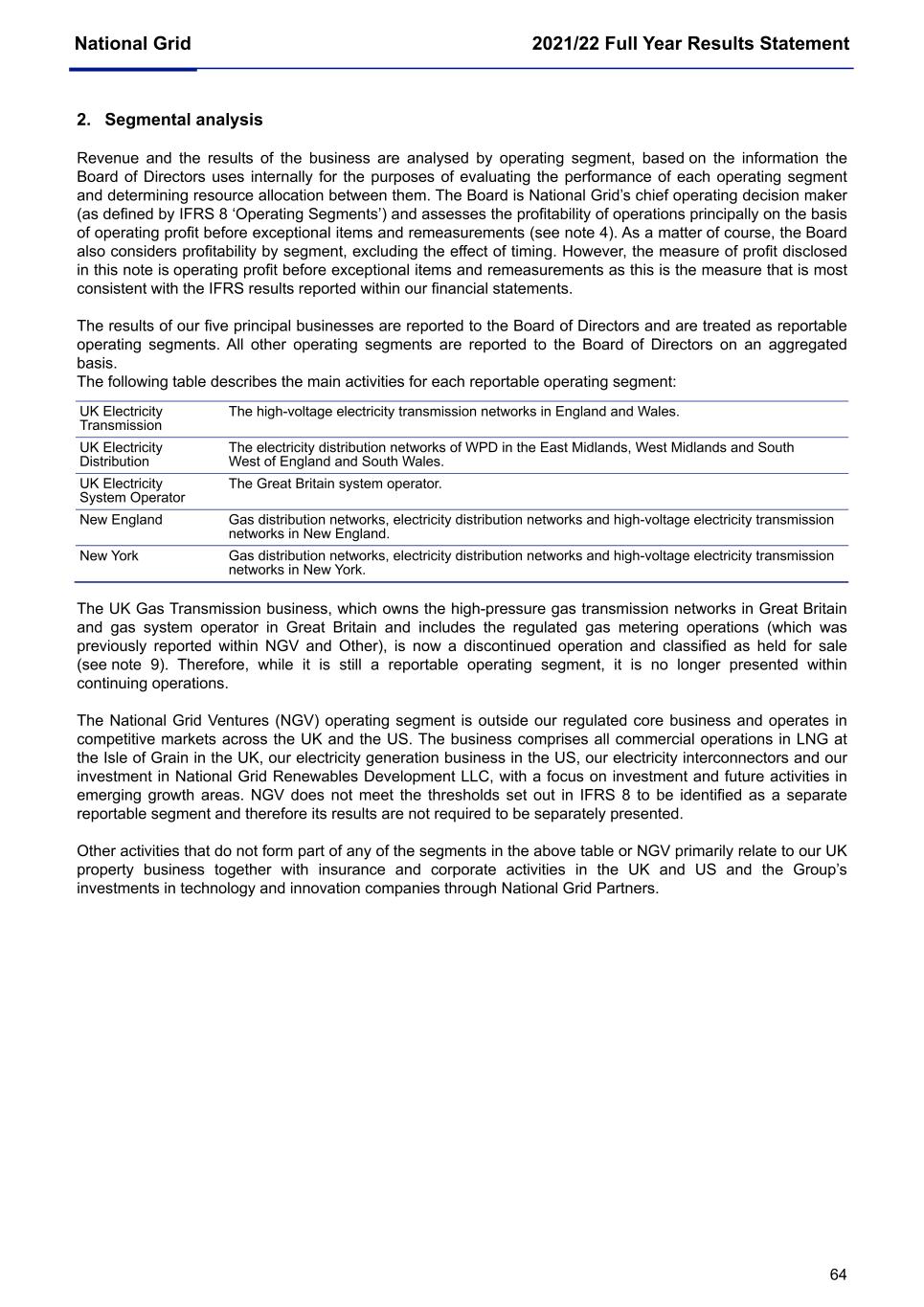
National Grid 2021/22 Full Year Results Statement 64 2. Segmental analysis Revenue and the results of the business are analysed by operating segment, based on the information the Board of Directors uses internally for the purposes of evaluating the performance of each operating segment and determining resource allocation between them. The Board is National Grid’s chief operating decision maker (as defined by IFRS 8 ‘Operating Segments’) and assesses the profitability of operations principally on the basis of operating profit before exceptional items and remeasurements (see note 4). As a matter of course, the Board also considers profitability by segment, excluding the effect of timing. However, the measure of profit disclosed in this note is operating profit before exceptional items and remeasurements as this is the measure that is most consistent with the IFRS results reported within our financial statements. The results of our five principal businesses are reported to the Board of Directors and are treated as reportable operating segments. All other operating segments are reported to the Board of Directors on an aggregated basis. The following table describes the main activities for each reportable operating segment: UK Electricity Transmission The high-voltage electricity transmission networks in England and Wales. UK Electricity Distribution The electricity distribution networks of WPD in the East Midlands, West Midlands and South West of England and South Wales. UK Electricity System Operator The Great Britain system operator. New England Gas distribution networks, electricity distribution networks and high-voltage electricity transmission networks in New England. New York Gas distribution networks, electricity distribution networks and high-voltage electricity transmission networks in New York. The UK Gas Transmission business, which owns the high-pressure gas transmission networks in Great Britain and gas system operator in Great Britain and includes the regulated gas metering operations (which was previously reported within NGV and Other), is now a discontinued operation and classified as held for sale (see note 9). Therefore, while it is still a reportable operating segment, it is no longer presented within continuing operations. The National Grid Ventures (NGV) operating segment is outside our regulated core business and operates in competitive markets across the UK and the US. The business comprises all commercial operations in LNG at the Isle of Grain in the UK, our electricity generation business in the US, our electricity interconnectors and our investment in National Grid Renewables Development LLC, with a focus on investment and future activities in emerging growth areas. NGV does not meet the thresholds set out in IFRS 8 to be identified as a separate reportable segment and therefore its results are not required to be separately presented. Other activities that do not form part of any of the segments in the above table or NGV primarily relate to our UK property business together with insurance and corporate activities in the UK and US and the Group’s investments in technology and innovation companies through National Grid Partners.
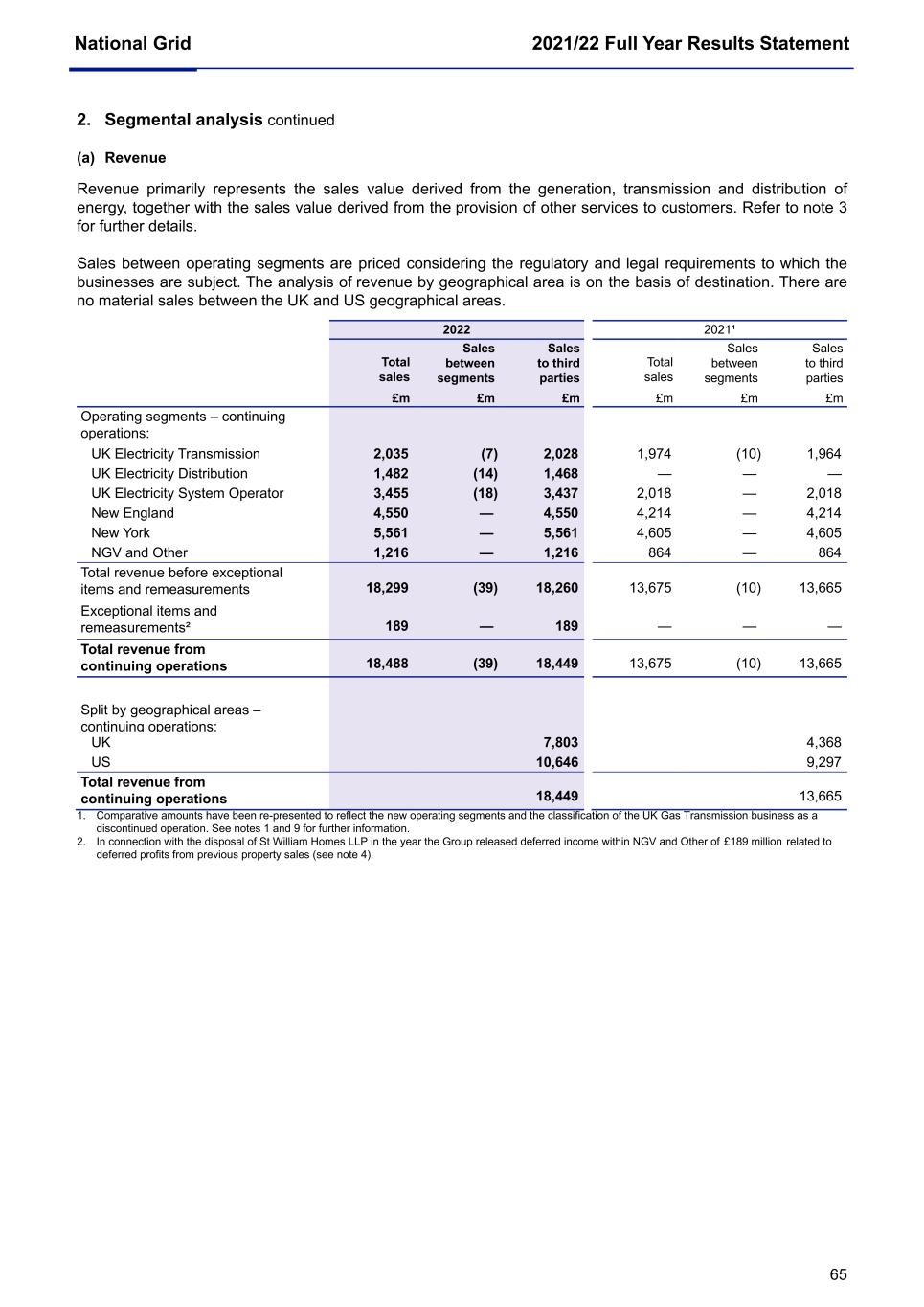
National Grid 2021/22 Full Year Results Statement 65 2. Segmental analysis continued (a) Revenue Revenue primarily represents the sales value derived from the generation, transmission and distribution of energy, together with the sales value derived from the provision of other services to customers. Refer to note 3 for further details. Sales between operating segments are priced considering the regulatory and legal requirements to which the businesses are subject. The analysis of revenue by geographical area is on the basis of destination. There are no material sales between the UK and US geographical areas. 2022 2021¹ Total sales Sales between segments Sales to third parties Total sales Sales between segments Sales to third parties £m £m £m £m £m £m Operating segments – continuing operations: UK Electricity Transmission 2,035 (7) 2,028 1,974 (10) 1,964 UK Electricity Distribution 1,482 (14) 1,468 — — — UK Electricity System Operator 3,455 (18) 3,437 2,018 — 2,018 New England 4,550 — 4,550 4,214 — 4,214 New York 5,561 — 5,561 4,605 — 4,605 NGV and Other 1,216 — 1,216 864 — 864 Total revenue before exceptional items and remeasurements 18,299 (39) 18,260 13,675 (10) 13,665 Exceptional items and remeasurements² 189 — 189 — — — Total revenue from continuing operations 18,488 (39) 18,449 13,675 (10) 13,665 Split by geographical areas – continuing operations: UK 7,803 4,368 US 10,646 9,297 Total revenue from continuing operations 18,449 13,665 1. Comparative amounts have been re-presented to reflect the new operating segments and the classification of the UK Gas Transmission business as a discontinued operation. See notes 1 and 9 for further information. 2. In connection with the disposal of St William Homes LLP in the year the Group released deferred income within NGV and Other of £189 million related to deferred profits from previous property sales (see note 4).
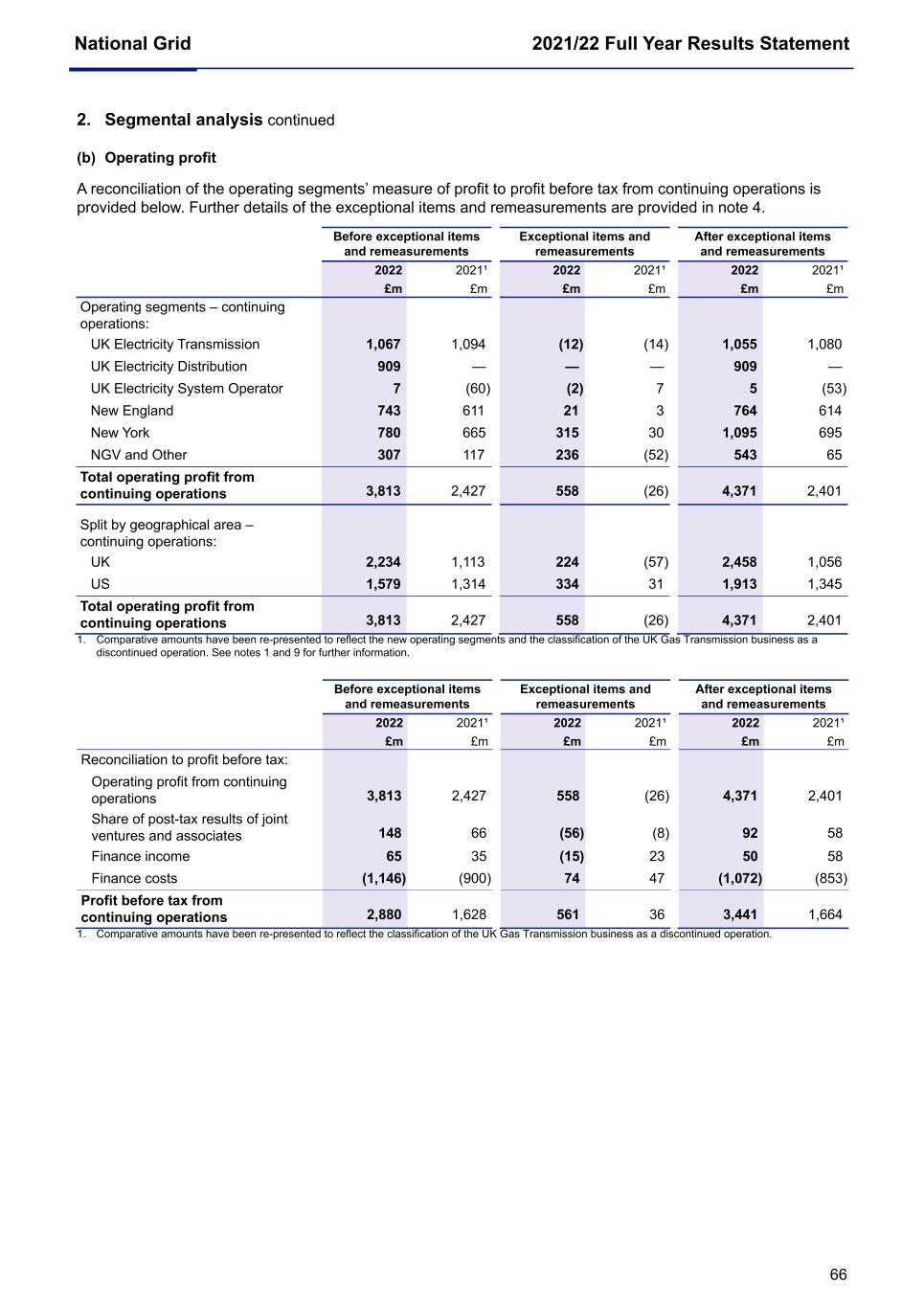
National Grid 2021/22 Full Year Results Statement 66 2. Segmental analysis continued (b) Operating profit A reconciliation of the operating segments’ measure of profit to profit before tax from continuing operations is provided below. Further details of the exceptional items and remeasurements are provided in note 4. Before exceptional items and remeasurements Exceptional items and remeasurements After exceptional items and remeasurements 2022 2021¹ 2022 2021¹ 2022 2021¹ £m £m £m £m £m £m Operating segments – continuing operations: UK Electricity Transmission 1,067 1,094 (12) (14) 1,055 1,080 UK Electricity Distribution 909 — — — 909 — UK Electricity System Operator 7 (60) (2) 7 5 (53) New England 743 611 21 3 764 614 New York 780 665 315 30 1,095 695 NGV and Other 307 117 236 (52) 543 65 Total operating profit from continuing operations 3,813 2,427 558 (26) 4,371 2,401 Split by geographical area – continuing operations: UK 2,234 1,113 224 (57) 2,458 1,056 US 1,579 1,314 334 31 1,913 1,345 Total operating profit from continuing operations 3,813 2,427 558 (26) 4,371 2,401 1. Comparative amounts have been re-presented to reflect the new operating segments and the classification of the UK Gas Transmission business as a discontinued operation. See notes 1 and 9 for further information. Before exceptional items and remeasurements Exceptional items and remeasurements After exceptional items and remeasurements 2022 2021¹ 2022 2021¹ 2022 2021¹ £m £m £m £m £m £m Reconciliation to profit before tax: Operating profit from continuing operations 3,813 2,427 558 (26) 4,371 2,401 Share of post-tax results of joint ventures and associates 148 66 (56) (8) 92 58 Finance income 65 35 (15) 23 50 58 Finance costs (1,146) (900) 74 47 (1,072) (853) Profit before tax from continuing operations 2,880 1,628 561 36 3,441 1,664 1. Comparative amounts have been re-presented to reflect the classification of the UK Gas Transmission business as a discontinued operation.
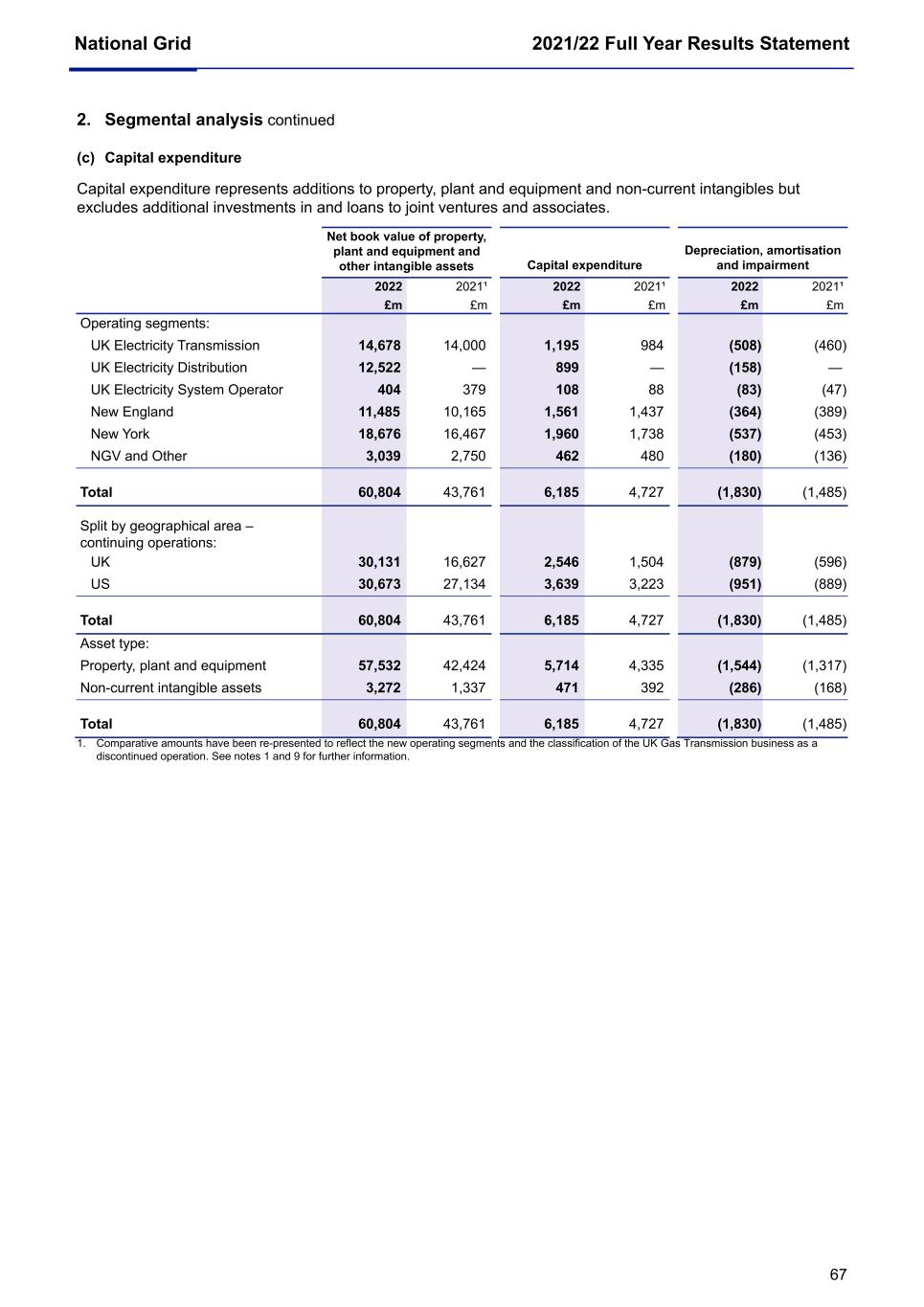
National Grid 2021/22 Full Year Results Statement 67 2. Segmental analysis continued (c) Capital expenditure Capital expenditure represents additions to property, plant and equipment and non-current intangibles but excludes additional investments in and loans to joint ventures and associates. Net book value of property, plant and equipment and other intangible assets Capital expenditure Depreciation, amortisation and impairment 2022 2021¹ 2022 2021¹ 2022 2021¹ £m £m £m £m £m £m Operating segments: UK Electricity Transmission 14,678 14,000 1,195 984 (508) (460) UK Electricity Distribution 12,522 — 899 — (158) — UK Electricity System Operator 404 379 108 88 (83) (47) New England 11,485 10,165 1,561 1,437 (364) (389) New York 18,676 16,467 1,960 1,738 (537) (453) NGV and Other 3,039 2,750 462 480 (180) (136) Total 60,804 43,761 6,185 4,727 (1,830) (1,485) Split by geographical area – continuing operations: UK 30,131 16,627 2,546 1,504 (879) (596) US 30,673 27,134 3,639 3,223 (951) (889) Total 60,804 43,761 6,185 4,727 (1,830) (1,485) Asset type: Property, plant and equipment 57,532 42,424 5,714 4,335 (1,544) (1,317) Non-current intangible assets 3,272 1,337 471 392 (286) (168) Total 60,804 43,761 6,185 4,727 (1,830) (1,485) 1. Comparative amounts have been re-presented to reflect the new operating segments and the classification of the UK Gas Transmission business as a discontinued operation. See notes 1 and 9 for further information.
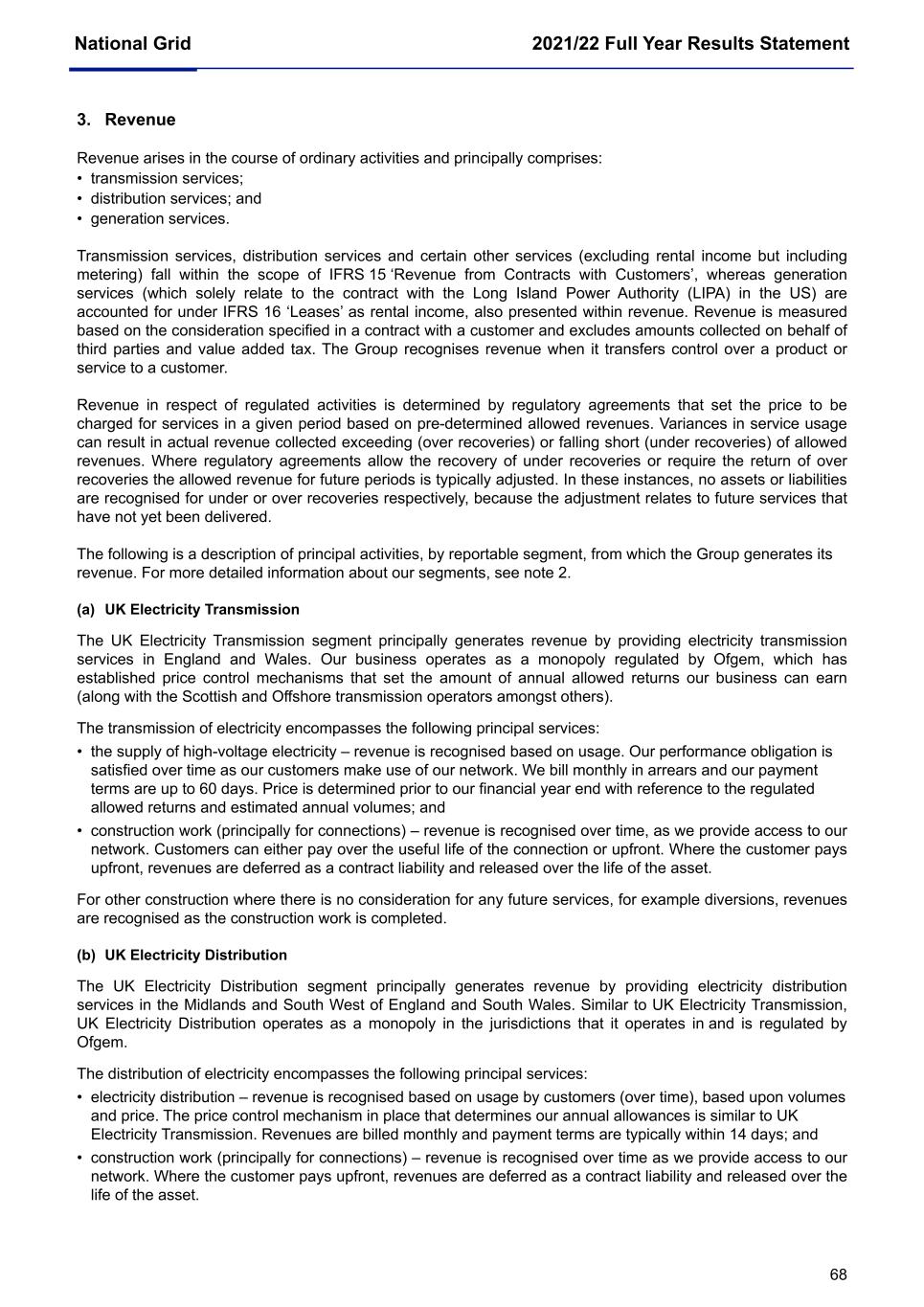
National Grid 2021/22 Full Year Results Statement 68 3. Revenue Revenue arises in the course of ordinary activities and principally comprises: • transmission services; • distribution services; and • generation services. Transmission services, distribution services and certain other services (excluding rental income but including metering) fall within the scope of IFRS 15 ‘Revenue from Contracts with Customers’, whereas generation services (which solely relate to the contract with the Long Island Power Authority (LIPA) in the US) are accounted for under IFRS 16 ‘Leases’ as rental income, also presented within revenue. Revenue is measured based on the consideration specified in a contract with a customer and excludes amounts collected on behalf of third parties and value added tax. The Group recognises revenue when it transfers control over a product or service to a customer. Revenue in respect of regulated activities is determined by regulatory agreements that set the price to be charged for services in a given period based on pre-determined allowed revenues. Variances in service usage can result in actual revenue collected exceeding (over recoveries) or falling short (under recoveries) of allowed revenues. Where regulatory agreements allow the recovery of under recoveries or require the return of over recoveries the allowed revenue for future periods is typically adjusted. In these instances, no assets or liabilities are recognised for under or over recoveries respectively, because the adjustment relates to future services that have not yet been delivered. The following is a description of principal activities, by reportable segment, from which the Group generates its revenue. For more detailed information about our segments, see note 2. (a) UK Electricity Transmission The UK Electricity Transmission segment principally generates revenue by providing electricity transmission services in England and Wales. Our business operates as a monopoly regulated by Ofgem, which has established price control mechanisms that set the amount of annual allowed returns our business can earn (along with the Scottish and Offshore transmission operators amongst others). The transmission of electricity encompasses the following principal services: • the supply of high-voltage electricity – revenue is recognised based on usage. Our performance obligation is satisfied over time as our customers make use of our network. We bill monthly in arrears and our payment terms are up to 60 days. Price is determined prior to our financial year end with reference to the regulated allowed returns and estimated annual volumes; and • construction work (principally for connections) – revenue is recognised over time, as we provide access to our network. Customers can either pay over the useful life of the connection or upfront. Where the customer pays upfront, revenues are deferred as a contract liability and released over the life of the asset. For other construction where there is no consideration for any future services, for example diversions, revenues are recognised as the construction work is completed. (b) UK Electricity Distribution The UK Electricity Distribution segment principally generates revenue by providing electricity distribution services in the Midlands and South West of England and South Wales. Similar to UK Electricity Transmission, UK Electricity Distribution operates as a monopoly in the jurisdictions that it operates in and is regulated by Ofgem. The distribution of electricity encompasses the following principal services: • electricity distribution – revenue is recognised based on usage by customers (over time), based upon volumes and price. The price control mechanism in place that determines our annual allowances is similar to UK Electricity Transmission. Revenues are billed monthly and payment terms are typically within 14 days; and • construction work (principally for connections) – revenue is recognised over time as we provide access to our network. Where the customer pays upfront, revenues are deferred as a contract liability and released over the life of the asset.

National Grid 2021/22 Full Year Results Statement 69 For other construction where there is no consideration for any future services, revenues are recognised as the construction is completed.
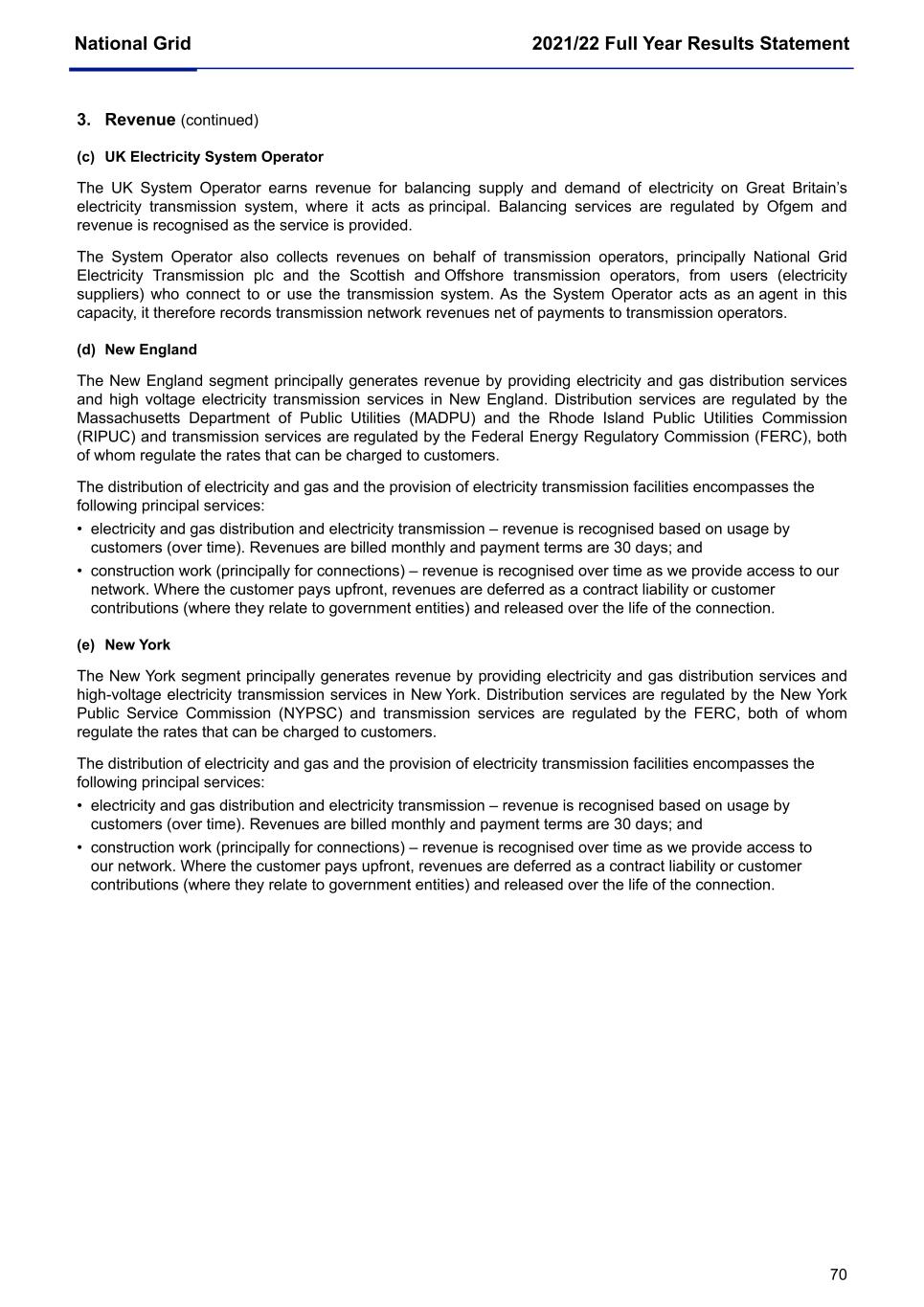
National Grid 2021/22 Full Year Results Statement 70 3. Revenue (continued) (c) UK Electricity System Operator The UK System Operator earns revenue for balancing supply and demand of electricity on Great Britain’s electricity transmission system, where it acts as principal. Balancing services are regulated by Ofgem and revenue is recognised as the service is provided. The System Operator also collects revenues on behalf of transmission operators, principally National Grid Electricity Transmission plc and the Scottish and Offshore transmission operators, from users (electricity suppliers) who connect to or use the transmission system. As the System Operator acts as an agent in this capacity, it therefore records transmission network revenues net of payments to transmission operators. (d) New England The New England segment principally generates revenue by providing electricity and gas distribution services and high voltage electricity transmission services in New England. Distribution services are regulated by the Massachusetts Department of Public Utilities (MADPU) and the Rhode Island Public Utilities Commission (RIPUC) and transmission services are regulated by the Federal Energy Regulatory Commission (FERC), both of whom regulate the rates that can be charged to customers. The distribution of electricity and gas and the provision of electricity transmission facilities encompasses the following principal services: • electricity and gas distribution and electricity transmission – revenue is recognised based on usage by customers (over time). Revenues are billed monthly and payment terms are 30 days; and • construction work (principally for connections) – revenue is recognised over time as we provide access to our network. Where the customer pays upfront, revenues are deferred as a contract liability or customer contributions (where they relate to government entities) and released over the life of the connection. (e) New York The New York segment principally generates revenue by providing electricity and gas distribution services and high-voltage electricity transmission services in New York. Distribution services are regulated by the New York Public Service Commission (NYPSC) and transmission services are regulated by the FERC, both of whom regulate the rates that can be charged to customers. The distribution of electricity and gas and the provision of electricity transmission facilities encompasses the following principal services: • electricity and gas distribution and electricity transmission – revenue is recognised based on usage by customers (over time). Revenues are billed monthly and payment terms are 30 days; and • construction work (principally for connections) – revenue is recognised over time as we provide access to our network. Where the customer pays upfront, revenues are deferred as a contract liability or customer contributions (where they relate to government entities) and released over the life of the connection.
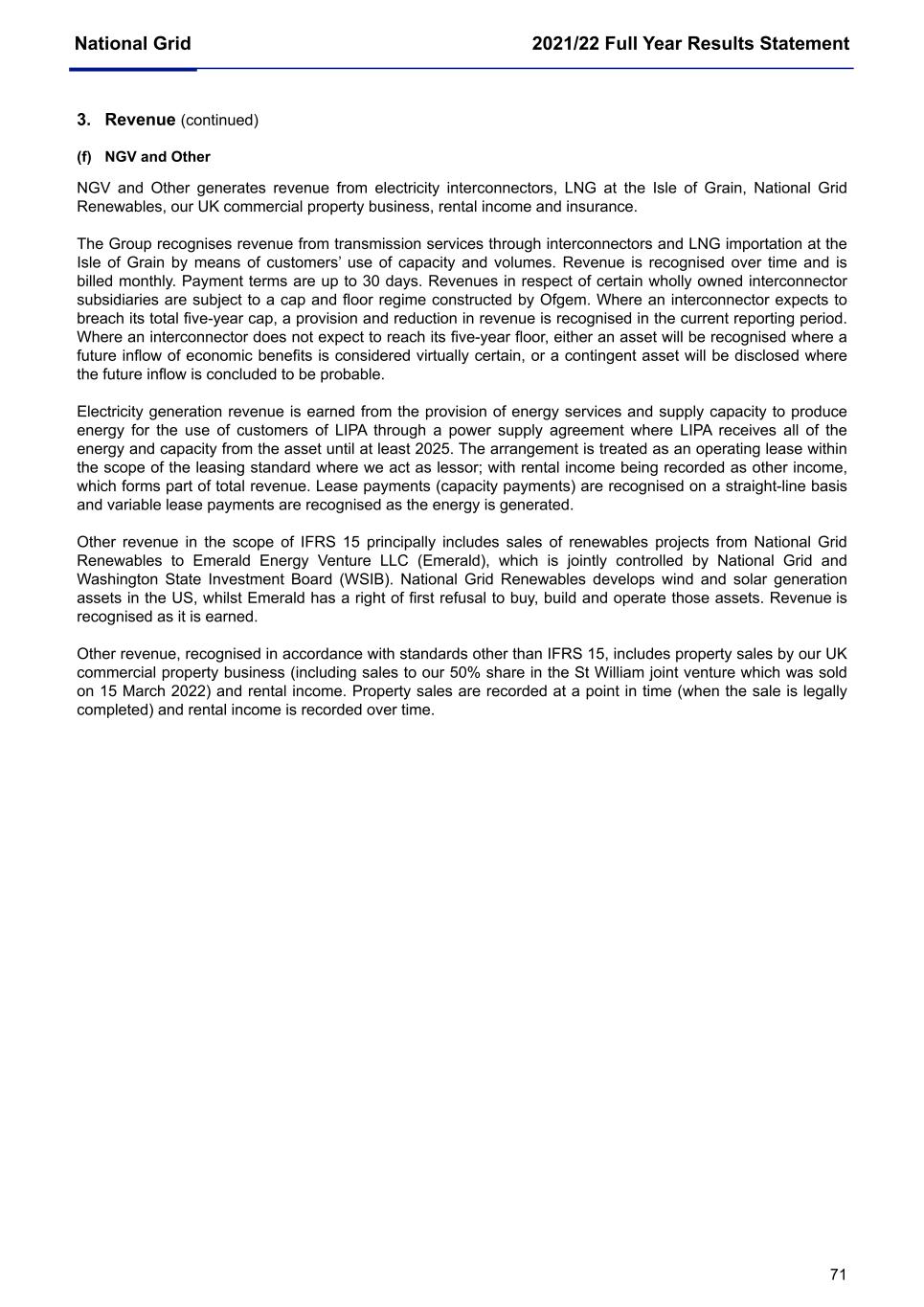
National Grid 2021/22 Full Year Results Statement 71 3. Revenue (continued) (f) NGV and Other NGV and Other generates revenue from electricity interconnectors, LNG at the Isle of Grain, National Grid Renewables, our UK commercial property business, rental income and insurance. The Group recognises revenue from transmission services through interconnectors and LNG importation at the Isle of Grain by means of customers’ use of capacity and volumes. Revenue is recognised over time and is billed monthly. Payment terms are up to 30 days. Revenues in respect of certain wholly owned interconnector subsidiaries are subject to a cap and floor regime constructed by Ofgem. Where an interconnector expects to breach its total five-year cap, a provision and reduction in revenue is recognised in the current reporting period. Where an interconnector does not expect to reach its five-year floor, either an asset will be recognised where a future inflow of economic benefits is considered virtually certain, or a contingent asset will be disclosed where the future inflow is concluded to be probable. Electricity generation revenue is earned from the provision of energy services and supply capacity to produce energy for the use of customers of LIPA through a power supply agreement where LIPA receives all of the energy and capacity from the asset until at least 2025. The arrangement is treated as an operating lease within the scope of the leasing standard where we act as lessor; with rental income being recorded as other income, which forms part of total revenue. Lease payments (capacity payments) are recognised on a straight-line basis and variable lease payments are recognised as the energy is generated. Other revenue in the scope of IFRS 15 principally includes sales of renewables projects from National Grid Renewables to Emerald Energy Venture LLC (Emerald), which is jointly controlled by National Grid and Washington State Investment Board (WSIB). National Grid Renewables develops wind and solar generation assets in the US, whilst Emerald has a right of first refusal to buy, build and operate those assets. Revenue is recognised as it is earned. Other revenue, recognised in accordance with standards other than IFRS 15, includes property sales by our UK commercial property business (including sales to our 50% share in the St William joint venture which was sold on 15 March 2022) and rental income. Property sales are recorded at a point in time (when the sale is legally completed) and rental income is recorded over time.
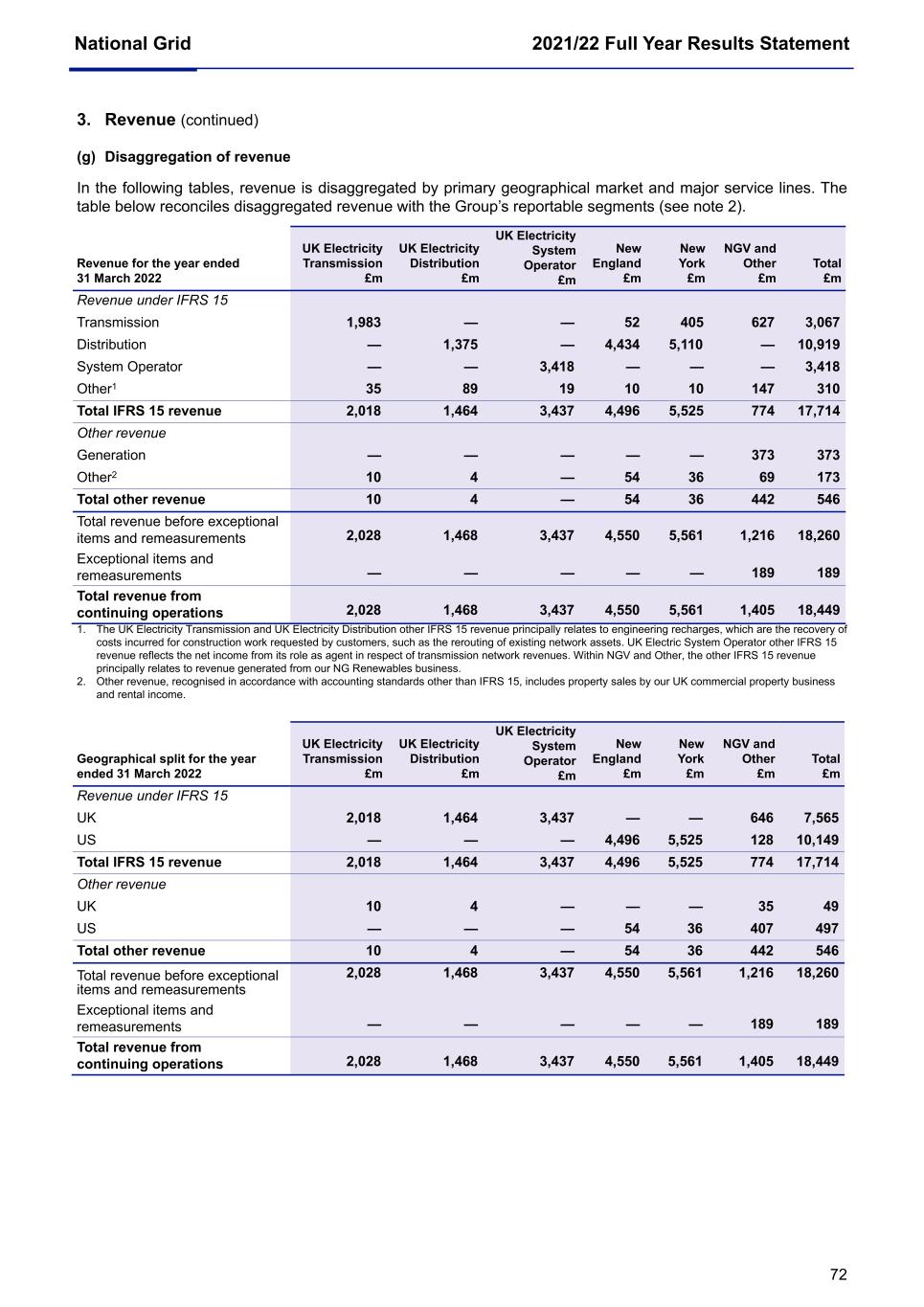
National Grid 2021/22 Full Year Results Statement 72 3. Revenue (continued) (g) Disaggregation of revenue In the following tables, revenue is disaggregated by primary geographical market and major service lines. The table below reconciles disaggregated revenue with the Group’s reportable segments (see note 2). Revenue for the year ended 31 March 2022 UK Electricity Transmission £m UK Electricity Distribution £m UK Electricity System Operator £m New England £m New York £m NGV and Other £m Total £m Revenue under IFRS 15 Transmission 1,983 — — 52 405 627 3,067 Distribution — 1,375 — 4,434 5,110 — 10,919 System Operator — — 3,418 — — — 3,418 Other1 35 89 19 10 10 147 310 Total IFRS 15 revenue 2,018 1,464 3,437 4,496 5,525 774 17,714 Other revenue Generation — — — — — 373 373 Other2 10 4 — 54 36 69 173 Total other revenue 10 4 — 54 36 442 546 Total revenue before exceptional items and remeasurements 2,028 1,468 3,437 4,550 5,561 1,216 18,260 Exceptional items and remeasurements — — — — — 189 189 Total revenue from continuing operations 2,028 1,468 3,437 4,550 5,561 1,405 18,449 1. The UK Electricity Transmission and UK Electricity Distribution other IFRS 15 revenue principally relates to engineering recharges, which are the recovery of costs incurred for construction work requested by customers, such as the rerouting of existing network assets. UK Electric System Operator other IFRS 15 revenue reflects the net income from its role as agent in respect of transmission network revenues. Within NGV and Other, the other IFRS 15 revenue principally relates to revenue generated from our NG Renewables business. 2. Other revenue, recognised in accordance with accounting standards other than IFRS 15, includes property sales by our UK commercial property business and rental income. Geographical split for the year ended 31 March 2022 UK Electricity Transmission £m UK Electricity Distribution £m UK Electricity System Operator £m New England £m New York £m NGV and Other £m Total £m Revenue under IFRS 15 UK 2,018 1,464 3,437 — — 646 7,565 US — — — 4,496 5,525 128 10,149 Total IFRS 15 revenue 2,018 1,464 3,437 4,496 5,525 774 17,714 Other revenue UK 10 4 — — — 35 49 US — — — 54 36 407 497 Total other revenue 10 4 — 54 36 442 546 Total revenue before exceptional items and remeasurements 2,028 1,468 3,437 4,550 5,561 1,216 18,260 Exceptional items and remeasurements — — — — — 189 189 Total revenue from continuing operations 2,028 1,468 3,437 4,550 5,561 1,405 18,449
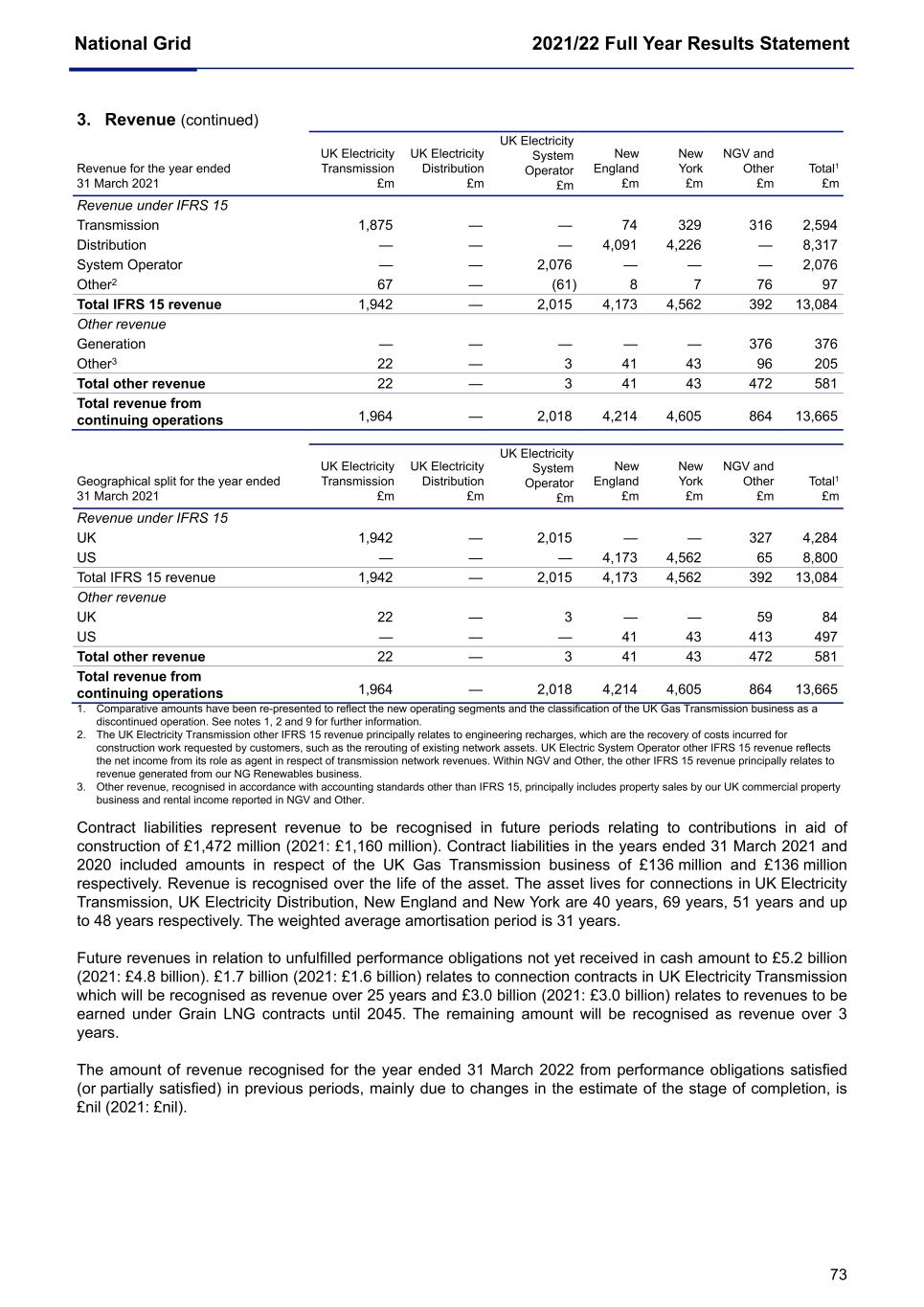
National Grid 2021/22 Full Year Results Statement 73 3. Revenue (continued) Revenue for the year ended 31 March 2021 UK Electricity Transmission £m UK Electricity Distribution £m UK Electricity System Operator £m New England £m New York £m NGV and Other £m Total1 £m Revenue under IFRS 15 Transmission 1,875 — — 74 329 316 2,594 Distribution — — — 4,091 4,226 — 8,317 System Operator — — 2,076 — — — 2,076 Other2 67 — (61) 8 7 76 97 Total IFRS 15 revenue 1,942 — 2,015 4,173 4,562 392 13,084 Other revenue Generation — — — — — 376 376 Other3 22 — 3 41 43 96 205 Total other revenue 22 — 3 41 43 472 581 Total revenue from continuing operations 1,964 — 2,018 4,214 4,605 864 13,665 Geographical split for the year ended 31 March 2021 UK Electricity Transmission £m UK Electricity Distribution £m UK Electricity System Operator £m New England £m New York £m NGV and Other £m Total1 £m Revenue under IFRS 15 UK 1,942 — 2,015 — — 327 4,284 US — — — 4,173 4,562 65 8,800 Total IFRS 15 revenue 1,942 — 2,015 4,173 4,562 392 13,084 Other revenue UK 22 — 3 — — 59 84 US — — — 41 43 413 497 Total other revenue 22 — 3 41 43 472 581 Total revenue from continuing operations 1,964 — 2,018 4,214 4,605 864 13,665 1. Comparative amounts have been re-presented to reflect the new operating segments and the classification of the UK Gas Transmission business as a discontinued operation. See notes 1, 2 and 9 for further information. 2. The UK Electricity Transmission other IFRS 15 revenue principally relates to engineering recharges, which are the recovery of costs incurred for construction work requested by customers, such as the rerouting of existing network assets. UK Electric System Operator other IFRS 15 revenue reflects the net income from its role as agent in respect of transmission network revenues. Within NGV and Other, the other IFRS 15 revenue principally relates to revenue generated from our NG Renewables business. 3. Other revenue, recognised in accordance with accounting standards other than IFRS 15, principally includes property sales by our UK commercial property business and rental income reported in NGV and Other. Contract liabilities represent revenue to be recognised in future periods relating to contributions in aid of construction of £1,472 million (2021: £1,160 million). Contract liabilities in the years ended 31 March 2021 and 2020 included amounts in respect of the UK Gas Transmission business of £136 million and £136 million respectively. Revenue is recognised over the life of the asset. The asset lives for connections in UK Electricity Transmission, UK Electricity Distribution, New England and New York are 40 years, 69 years, 51 years and up to 48 years respectively. The weighted average amortisation period is 31 years. Future revenues in relation to unfulfilled performance obligations not yet received in cash amount to £5.2 billion (2021: £4.8 billion). £1.7 billion (2021: £1.6 billion) relates to connection contracts in UK Electricity Transmission which will be recognised as revenue over 25 years and £3.0 billion (2021: £3.0 billion) relates to revenues to be earned under Grain LNG contracts until 2045. The remaining amount will be recognised as revenue over 3 years. The amount of revenue recognised for the year ended 31 March 2022 from performance obligations satisfied (or partially satisfied) in previous periods, mainly due to changes in the estimate of the stage of completion, is £nil (2021: £nil).
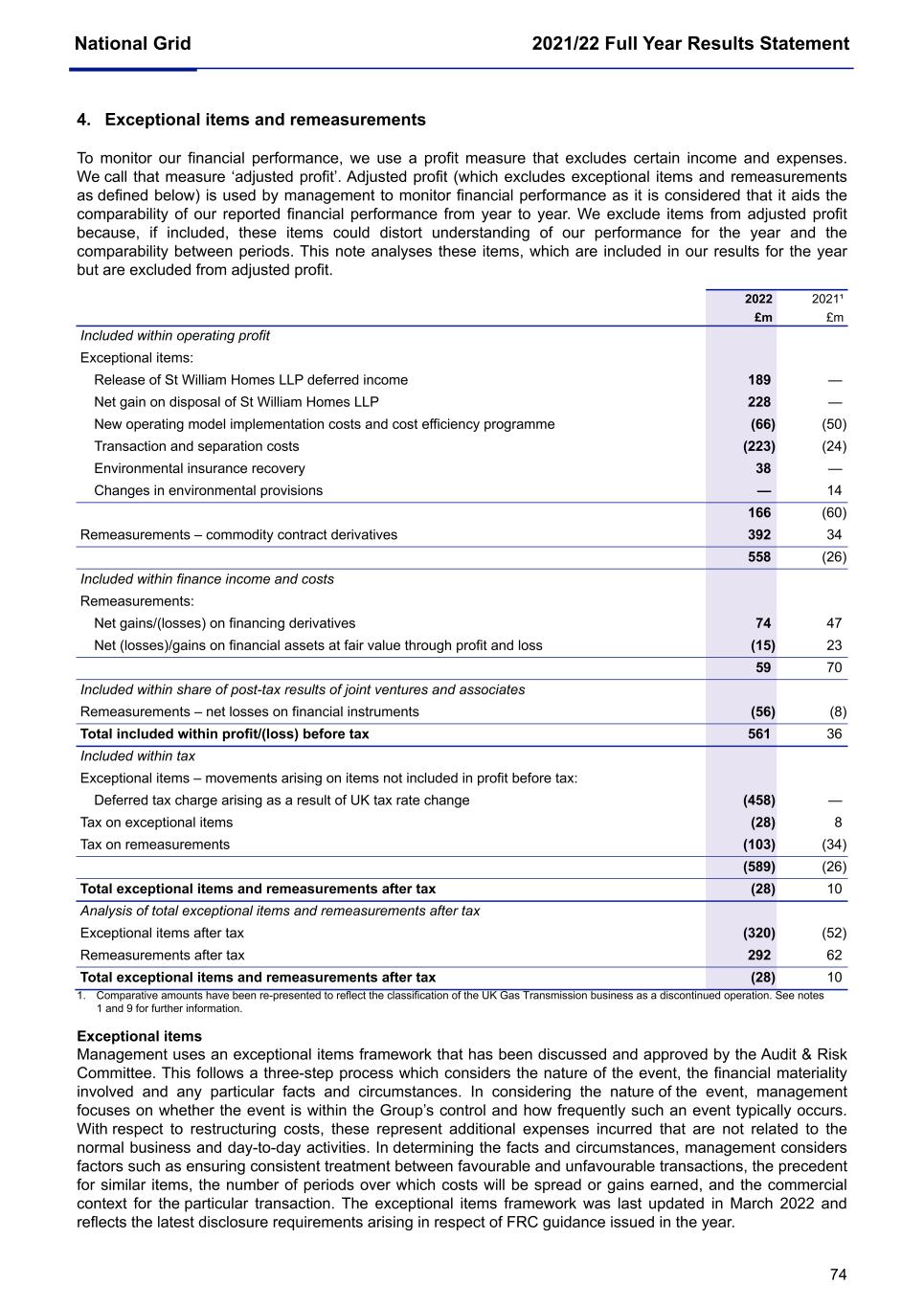
National Grid 2021/22 Full Year Results Statement 74 4. Exceptional items and remeasurements To monitor our financial performance, we use a profit measure that excludes certain income and expenses. We call that measure ‘adjusted profit’. Adjusted profit (which excludes exceptional items and remeasurements as defined below) is used by management to monitor financial performance as it is considered that it aids the comparability of our reported financial performance from year to year. We exclude items from adjusted profit because, if included, these items could distort understanding of our performance for the year and the comparability between periods. This note analyses these items, which are included in our results for the year but are excluded from adjusted profit. 2022 2021¹ £m £m Included within operating profit Exceptional items: Release of St William Homes LLP deferred income 189 — Net gain on disposal of St William Homes LLP 228 — New operating model implementation costs and cost efficiency programme (66) (50) Transaction and separation costs (223) (24) Environmental insurance recovery 38 — Changes in environmental provisions — 14 166 (60) Remeasurements – commodity contract derivatives 392 34 558 (26) Included within finance income and costs Remeasurements: Net gains/(losses) on financing derivatives 74 47 Net (losses)/gains on financial assets at fair value through profit and loss (15) 23 59 70 Included within share of post-tax results of joint ventures and associates Remeasurements – net losses on financial instruments (56) (8) Total included within profit/(loss) before tax 561 36 Included within tax Exceptional items – movements arising on items not included in profit before tax: Deferred tax charge arising as a result of UK tax rate change (458) — Tax on exceptional items (28) 8 Tax on remeasurements (103) (34) (589) (26) Total exceptional items and remeasurements after tax (28) 10 Analysis of total exceptional items and remeasurements after tax Exceptional items after tax (320) (52) Remeasurements after tax 292 62 Total exceptional items and remeasurements after tax (28) 10 1. Comparative amounts have been re-presented to reflect the classification of the UK Gas Transmission business as a discontinued operation. See notes 1 and 9 for further information. Exceptional items Management uses an exceptional items framework that has been discussed and approved by the Audit & Risk Committee. This follows a three-step process which considers the nature of the event, the financial materiality involved and any particular facts and circumstances. In considering the nature of the event, management focuses on whether the event is within the Group’s control and how frequently such an event typically occurs. With respect to restructuring costs, these represent additional expenses incurred that are not related to the normal business and day-to-day activities. In determining the facts and circumstances, management considers factors such as ensuring consistent treatment between favourable and unfavourable transactions, the precedent for similar items, the number of periods over which costs will be spread or gains earned, and the commercial context for the particular transaction. The exceptional items framework was last updated in March 2022 and reflects the latest disclosure requirements arising in respect of FRC guidance issued in the year.
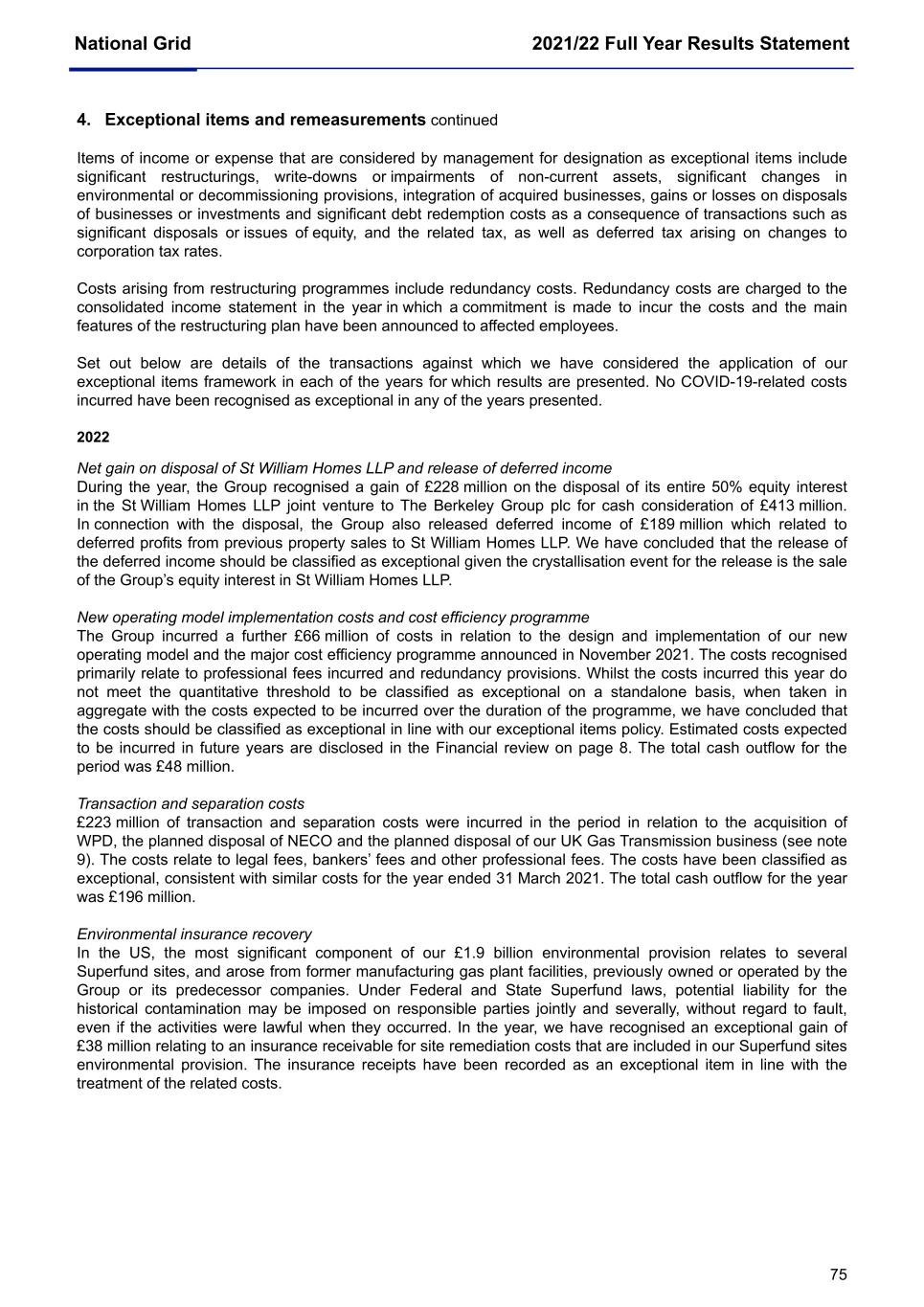
National Grid 2021/22 Full Year Results Statement 75 4. Exceptional items and remeasurements continued Items of income or expense that are considered by management for designation as exceptional items include significant restructurings, write-downs or impairments of non-current assets, significant changes in environmental or decommissioning provisions, integration of acquired businesses, gains or losses on disposals of businesses or investments and significant debt redemption costs as a consequence of transactions such as significant disposals or issues of equity, and the related tax, as well as deferred tax arising on changes to corporation tax rates. Costs arising from restructuring programmes include redundancy costs. Redundancy costs are charged to the consolidated income statement in the year in which a commitment is made to incur the costs and the main features of the restructuring plan have been announced to affected employees. Set out below are details of the transactions against which we have considered the application of our exceptional items framework in each of the years for which results are presented. No COVID-19-related costs incurred have been recognised as exceptional in any of the years presented. 2022 Net gain on disposal of St William Homes LLP and release of deferred income During the year, the Group recognised a gain of £228 million on the disposal of its entire 50% equity interest in the St William Homes LLP joint venture to The Berkeley Group plc for cash consideration of £413 million. In connection with the disposal, the Group also released deferred income of £189 million which related to deferred profits from previous property sales to St William Homes LLP. We have concluded that the release of the deferred income should be classified as exceptional given the crystallisation event for the release is the sale of the Group’s equity interest in St William Homes LLP. New operating model implementation costs and cost efficiency programme The Group incurred a further £66 million of costs in relation to the design and implementation of our new operating model and the major cost efficiency programme announced in November 2021. The costs recognised primarily relate to professional fees incurred and redundancy provisions. Whilst the costs incurred this year do not meet the quantitative threshold to be classified as exceptional on a standalone basis, when taken in aggregate with the costs expected to be incurred over the duration of the programme, we have concluded that the costs should be classified as exceptional in line with our exceptional items policy. Estimated costs expected to be incurred in future years are disclosed in the Financial review on page 8. The total cash outflow for the period was £48 million. Transaction and separation costs £223 million of transaction and separation costs were incurred in the period in relation to the acquisition of WPD, the planned disposal of NECO and the planned disposal of our UK Gas Transmission business (see note 9). The costs relate to legal fees, bankers’ fees and other professional fees. The costs have been classified as exceptional, consistent with similar costs for the year ended 31 March 2021. The total cash outflow for the year was £196 million. Environmental insurance recovery In the US, the most significant component of our £1.9 billion environmental provision relates to several Superfund sites, and arose from former manufacturing gas plant facilities, previously owned or operated by the Group or its predecessor companies. Under Federal and State Superfund laws, potential liability for the historical contamination may be imposed on responsible parties jointly and severally, without regard to fault, even if the activities were lawful when they occurred. In the year, we have recognised an exceptional gain of £38 million relating to an insurance receivable for site remediation costs that are included in our Superfund sites environmental provision. The insurance receipts have been recorded as an exceptional item in line with the treatment of the related costs.
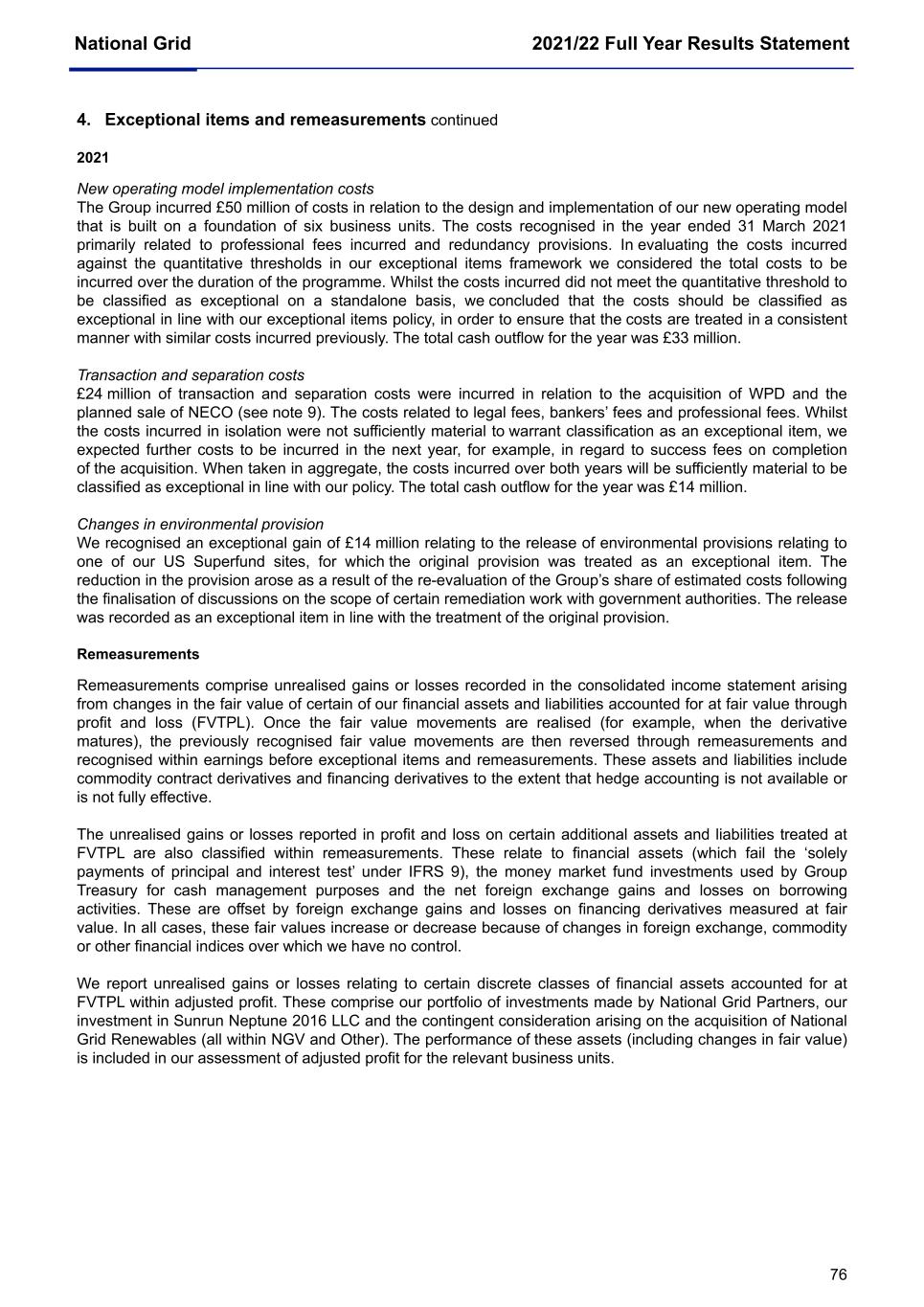
National Grid 2021/22 Full Year Results Statement 76 4. Exceptional items and remeasurements continued 2021 New operating model implementation costs The Group incurred £50 million of costs in relation to the design and implementation of our new operating model that is built on a foundation of six business units. The costs recognised in the year ended 31 March 2021 primarily related to professional fees incurred and redundancy provisions. In evaluating the costs incurred against the quantitative thresholds in our exceptional items framework we considered the total costs to be incurred over the duration of the programme. Whilst the costs incurred did not meet the quantitative threshold to be classified as exceptional on a standalone basis, we concluded that the costs should be classified as exceptional in line with our exceptional items policy, in order to ensure that the costs are treated in a consistent manner with similar costs incurred previously. The total cash outflow for the year was £33 million. Transaction and separation costs £24 million of transaction and separation costs were incurred in relation to the acquisition of WPD and the planned sale of NECO (see note 9). The costs related to legal fees, bankers’ fees and professional fees. Whilst the costs incurred in isolation were not sufficiently material to warrant classification as an exceptional item, we expected further costs to be incurred in the next year, for example, in regard to success fees on completion of the acquisition. When taken in aggregate, the costs incurred over both years will be sufficiently material to be classified as exceptional in line with our policy. The total cash outflow for the year was £14 million. Changes in environmental provision We recognised an exceptional gain of £14 million relating to the release of environmental provisions relating to one of our US Superfund sites, for which the original provision was treated as an exceptional item. The reduction in the provision arose as a result of the re-evaluation of the Group’s share of estimated costs following the finalisation of discussions on the scope of certain remediation work with government authorities. The release was recorded as an exceptional item in line with the treatment of the original provision. Remeasurements Remeasurements comprise unrealised gains or losses recorded in the consolidated income statement arising from changes in the fair value of certain of our financial assets and liabilities accounted for at fair value through profit and loss (FVTPL). Once the fair value movements are realised (for example, when the derivative matures), the previously recognised fair value movements are then reversed through remeasurements and recognised within earnings before exceptional items and remeasurements. These assets and liabilities include commodity contract derivatives and financing derivatives to the extent that hedge accounting is not available or is not fully effective. The unrealised gains or losses reported in profit and loss on certain additional assets and liabilities treated at FVTPL are also classified within remeasurements. These relate to financial assets (which fail the ‘solely payments of principal and interest test’ under IFRS 9), the money market fund investments used by Group Treasury for cash management purposes and the net foreign exchange gains and losses on borrowing activities. These are offset by foreign exchange gains and losses on financing derivatives measured at fair value. In all cases, these fair values increase or decrease because of changes in foreign exchange, commodity or other financial indices over which we have no control. We report unrealised gains or losses relating to certain discrete classes of financial assets accounted for at FVTPL within adjusted profit. These comprise our portfolio of investments made by National Grid Partners, our investment in Sunrun Neptune 2016 LLC and the contingent consideration arising on the acquisition of National Grid Renewables (all within NGV and Other). The performance of these assets (including changes in fair value) is included in our assessment of adjusted profit for the relevant business units.
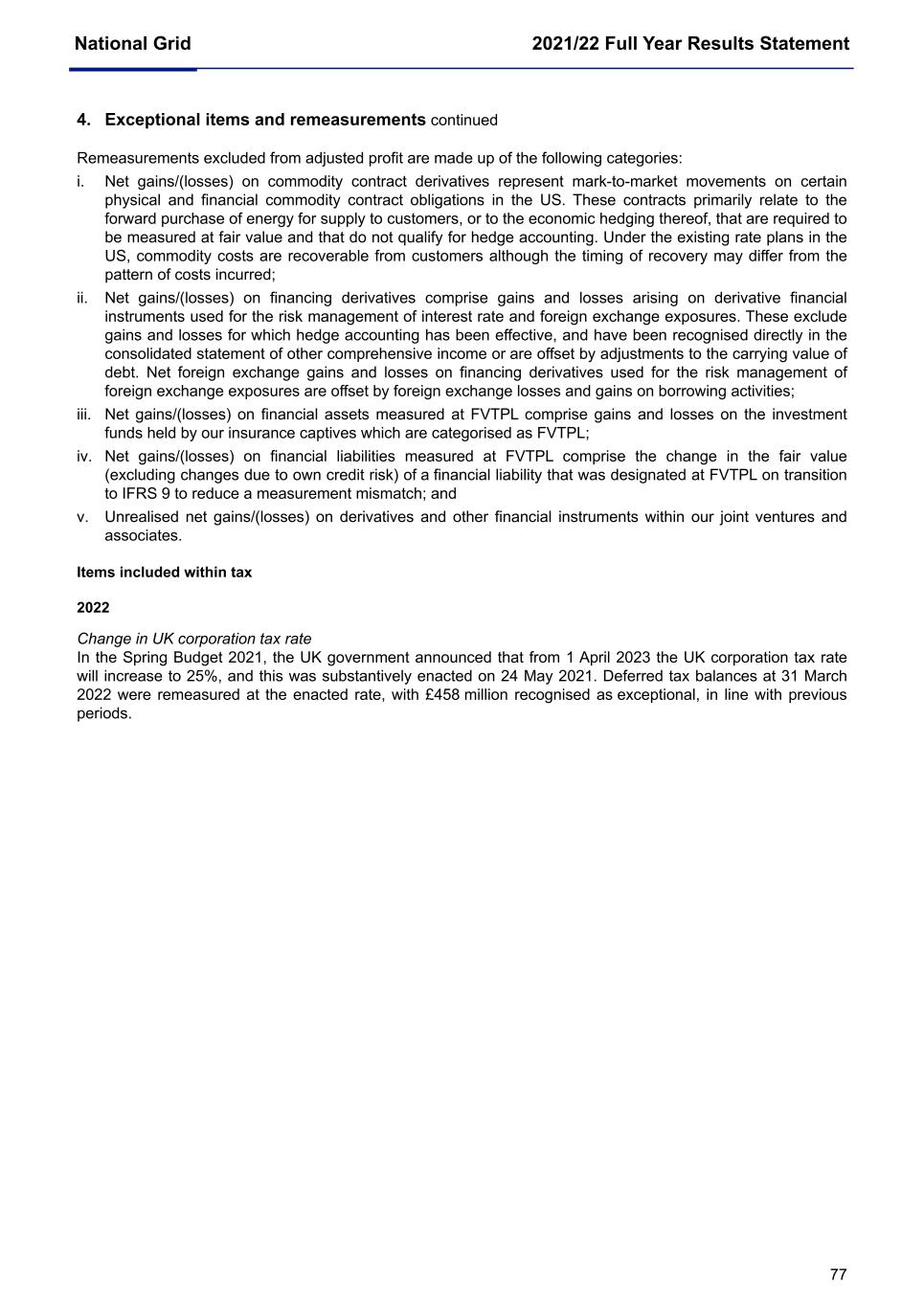
National Grid 2021/22 Full Year Results Statement 77 4. Exceptional items and remeasurements continued Remeasurements excluded from adjusted profit are made up of the following categories: i. Net gains/(losses) on commodity contract derivatives represent mark-to-market movements on certain physical and financial commodity contract obligations in the US. These contracts primarily relate to the forward purchase of energy for supply to customers, or to the economic hedging thereof, that are required to be measured at fair value and that do not qualify for hedge accounting. Under the existing rate plans in the US, commodity costs are recoverable from customers although the timing of recovery may differ from the pattern of costs incurred; ii. Net gains/(losses) on financing derivatives comprise gains and losses arising on derivative financial instruments used for the risk management of interest rate and foreign exchange exposures. These exclude gains and losses for which hedge accounting has been effective, and have been recognised directly in the consolidated statement of other comprehensive income or are offset by adjustments to the carrying value of debt. Net foreign exchange gains and losses on financing derivatives used for the risk management of foreign exchange exposures are offset by foreign exchange losses and gains on borrowing activities; iii. Net gains/(losses) on financial assets measured at FVTPL comprise gains and losses on the investment funds held by our insurance captives which are categorised as FVTPL; iv. Net gains/(losses) on financial liabilities measured at FVTPL comprise the change in the fair value (excluding changes due to own credit risk) of a financial liability that was designated at FVTPL on transition to IFRS 9 to reduce a measurement mismatch; and v. Unrealised net gains/(losses) on derivatives and other financial instruments within our joint ventures and associates. Items included within tax 2022 Change in UK corporation tax rate In the Spring Budget 2021, the UK government announced that from 1 April 2023 the UK corporation tax rate will increase to 25%, and this was substantively enacted on 24 May 2021. Deferred tax balances at 31 March 2022 were remeasured at the enacted rate, with £458 million recognised as exceptional, in line with previous periods.
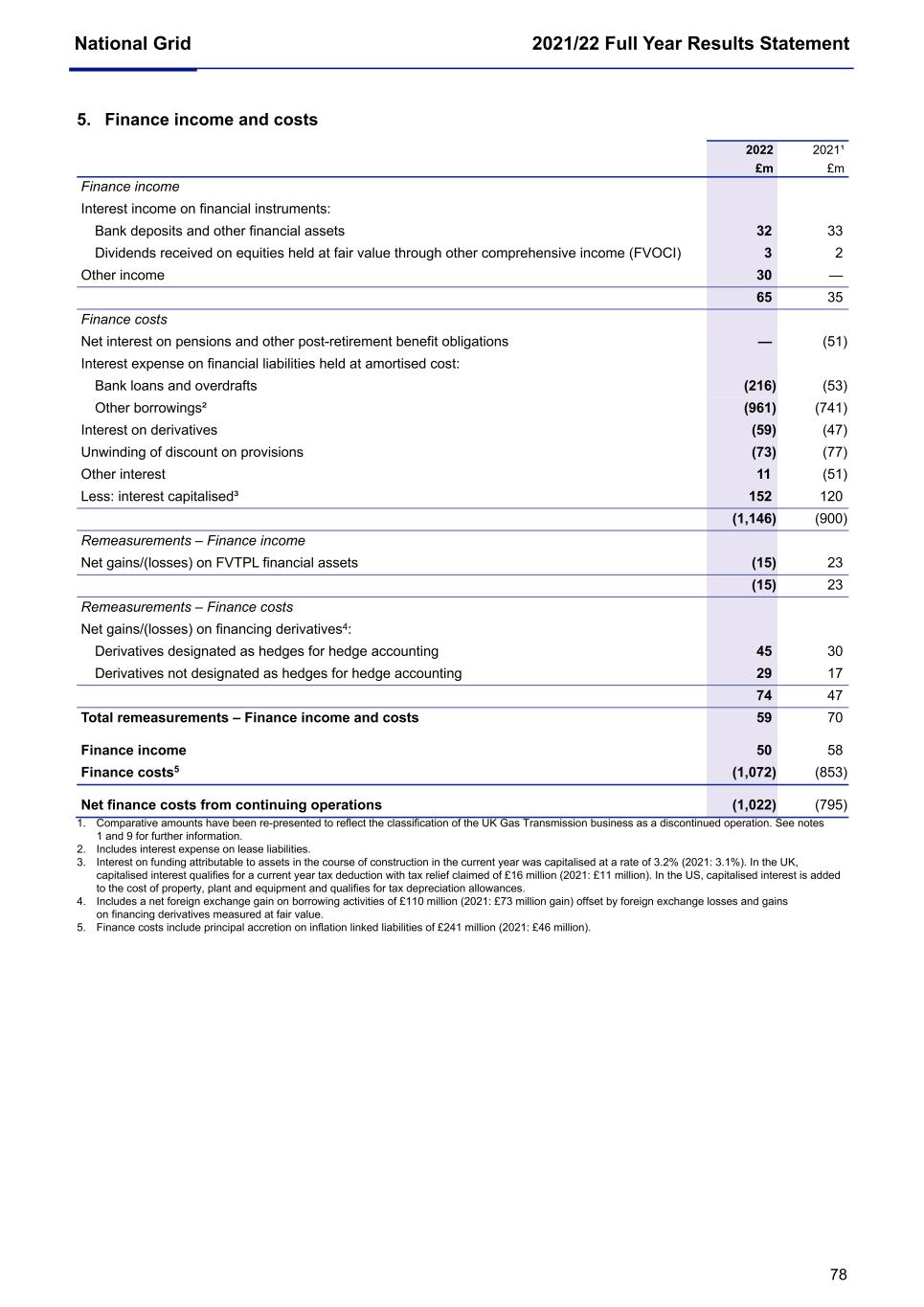
National Grid 2021/22 Full Year Results Statement 78 5. Finance income and costs 2022 2021¹ £m £m Finance income Interest income on financial instruments: Bank deposits and other financial assets 32 33 Dividends received on equities held at fair value through other comprehensive income (FVOCI) 3 2 Other income 30 — 65 35 Finance costs Net interest on pensions and other post-retirement benefit obligations — (51) Interest expense on financial liabilities held at amortised cost: Bank loans and overdrafts (216) (53) Other borrowings² (961) (741) Interest on derivatives (59) (47) Unwinding of discount on provisions (73) (77) Other interest 11 (51) Less: interest capitalised³ 152 120 (1,146) (900) Remeasurements – Finance income Net gains/(losses) on FVTPL financial assets (15) 23 (15) 23 Remeasurements – Finance costs Net gains/(losses) on financing derivatives4: Derivatives designated as hedges for hedge accounting 45 30 Derivatives not designated as hedges for hedge accounting 29 17 74 47 Total remeasurements – Finance income and costs 59 70 Finance income 50 58 Finance costs5 (1,072) (853) Net finance costs from continuing operations (1,022) (795) 1. Comparative amounts have been re-presented to reflect the classification of the UK Gas Transmission business as a discontinued operation. See notes 1 and 9 for further information. 2. Includes interest expense on lease liabilities. 3. Interest on funding attributable to assets in the course of construction in the current year was capitalised at a rate of 3.2% (2021: 3.1%). In the UK, capitalised interest qualifies for a current year tax deduction with tax relief claimed of £16 million (2021: £11 million). In the US, capitalised interest is added to the cost of property, plant and equipment and qualifies for tax depreciation allowances. 4. Includes a net foreign exchange gain on borrowing activities of £110 million (2021: £73 million gain) offset by foreign exchange losses and gains on financing derivatives measured at fair value. 5. Finance costs include principal accretion on inflation linked liabilities of £241 million (2021: £46 million).
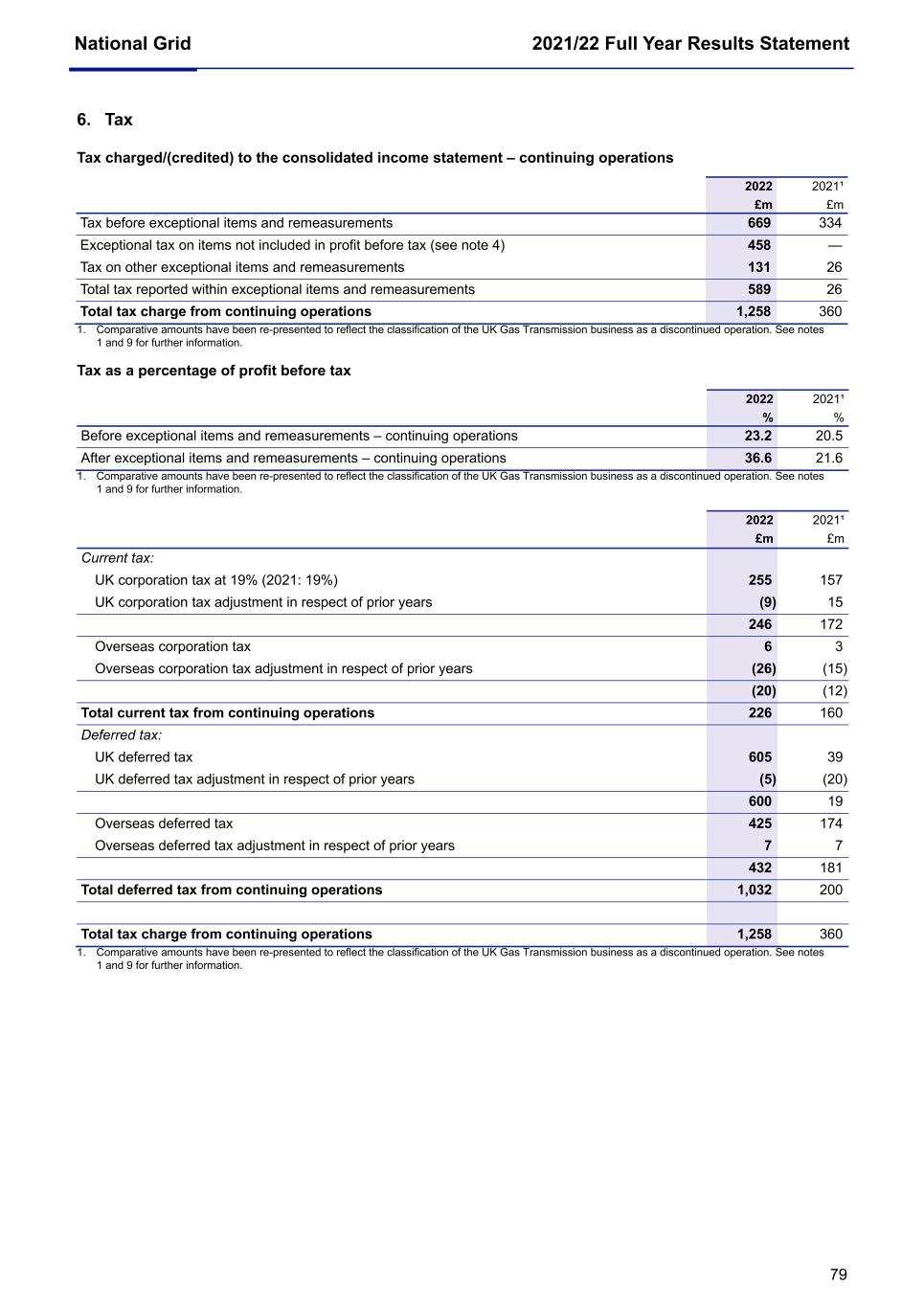
National Grid 2021/22 Full Year Results Statement 79 6. Tax Tax charged/(credited) to the consolidated income statement – continuing operations 2022 2021¹ £m £m Tax before exceptional items and remeasurements 669 334 Exceptional tax on items not included in profit before tax (see note 4) 458 — Tax on other exceptional items and remeasurements 131 26 Total tax reported within exceptional items and remeasurements 589 26 Total tax charge from continuing operations 1,258 360 1. Comparative amounts have been re-presented to reflect the classification of the UK Gas Transmission business as a discontinued operation. See notes 1 and 9 for further information. Tax as a percentage of profit before tax 2022 2021¹ % % Before exceptional items and remeasurements – continuing operations 23.2 20.5 After exceptional items and remeasurements – continuing operations 36.6 21.6 1. Comparative amounts have been re-presented to reflect the classification of the UK Gas Transmission business as a discontinued operation. See notes 1 and 9 for further information. 2022 2021¹ £m £m Current tax: UK corporation tax at 19% (2021: 19%) 255 157 UK corporation tax adjustment in respect of prior years (9) 15 246 172 Overseas corporation tax 6 3 Overseas corporation tax adjustment in respect of prior years (26) (15) (20) (12) Total current tax from continuing operations 226 160 Deferred tax: UK deferred tax 605 39 UK deferred tax adjustment in respect of prior years (5) (20) 600 19 Overseas deferred tax 425 174 Overseas deferred tax adjustment in respect of prior years 7 7 432 181 Total deferred tax from continuing operations 1,032 200 Total tax charge from continuing operations 1,258 360 1. Comparative amounts have been re-presented to reflect the classification of the UK Gas Transmission business as a discontinued operation. See notes 1 and 9 for further information.
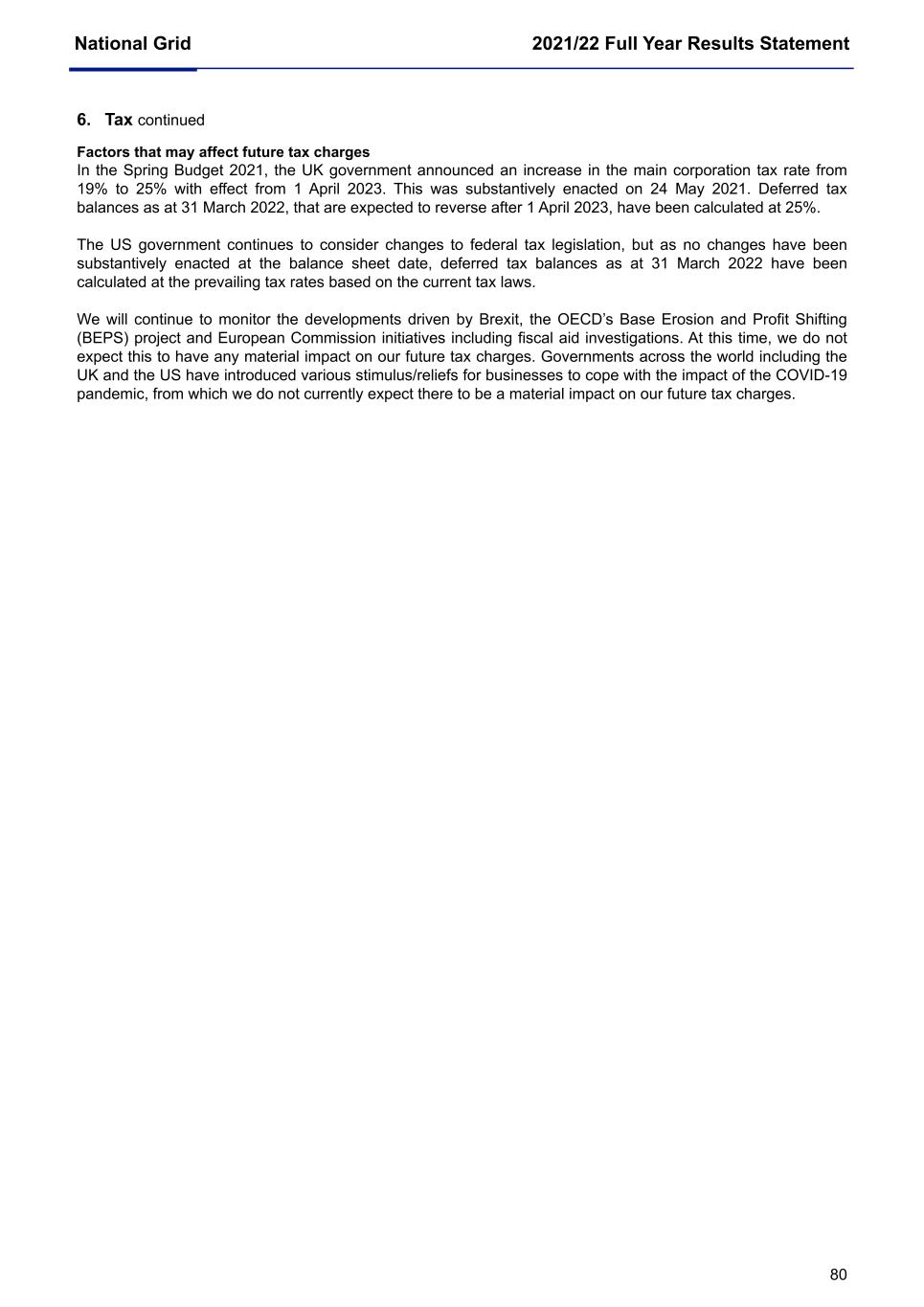
National Grid 2021/22 Full Year Results Statement 80 6. Tax continued Factors that may affect future tax charges In the Spring Budget 2021, the UK government announced an increase in the main corporation tax rate from 19% to 25% with effect from 1 April 2023. This was substantively enacted on 24 May 2021. Deferred tax balances as at 31 March 2022, that are expected to reverse after 1 April 2023, have been calculated at 25%. The US government continues to consider changes to federal tax legislation, but as no changes have been substantively enacted at the balance sheet date, deferred tax balances as at 31 March 2022 have been calculated at the prevailing tax rates based on the current tax laws. We will continue to monitor the developments driven by Brexit, the OECD’s Base Erosion and Profit Shifting (BEPS) project and European Commission initiatives including fiscal aid investigations. At this time, we do not expect this to have any material impact on our future tax charges. Governments across the world including the UK and the US have introduced various stimulus/reliefs for businesses to cope with the impact of the COVID-19 pandemic, from which we do not currently expect there to be a material impact on our future tax charges.
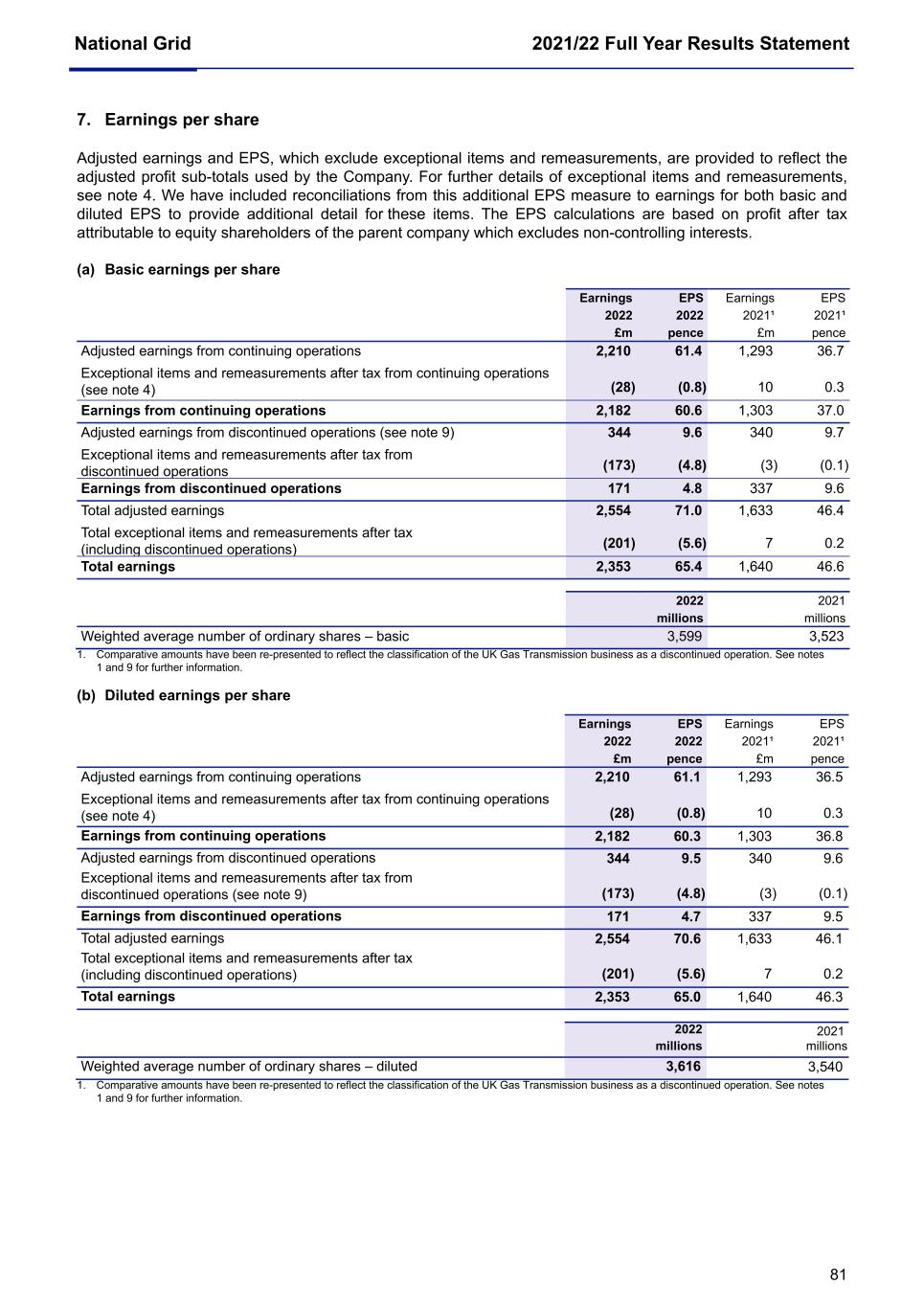
National Grid 2021/22 Full Year Results Statement 81 7. Earnings per share Adjusted earnings and EPS, which exclude exceptional items and remeasurements, are provided to reflect the adjusted profit sub-totals used by the Company. For further details of exceptional items and remeasurements, see note 4. We have included reconciliations from this additional EPS measure to earnings for both basic and diluted EPS to provide additional detail for these items. The EPS calculations are based on profit after tax attributable to equity shareholders of the parent company which excludes non-controlling interests. (a) Basic earnings per share Earnings EPS Earnings EPS 2022 2022 2021¹ 2021¹ £m pence £m pence Adjusted earnings from continuing operations 2,210 61.4 1,293 36.7 Exceptional items and remeasurements after tax from continuing operations (see note 4) (28) (0.8) 10 0.3 Earnings from continuing operations 2,182 60.6 1,303 37.0 Adjusted earnings from discontinued operations (see note 9) 344 9.6 340 9.7 Exceptional items and remeasurements after tax from discontinued operations (173) (4.8) (3) (0.1) Earnings from discontinued operations 171 4.8 337 9.6 Total adjusted earnings 2,554 71.0 1,633 46.4 Total exceptional items and remeasurements after tax (including discontinued operations) (201) (5.6) 7 0.2 Total earnings 2,353 65.4 1,640 46.6 2022 2021 millions millions Weighted average number of ordinary shares – basic 3,599 3,523 1. Comparative amounts have been re-presented to reflect the classification of the UK Gas Transmission business as a discontinued operation. See notes 1 and 9 for further information. (b) Diluted earnings per share Earnings EPS Earnings EPS 2022 2022 2021¹ 2021¹ £m pence £m pence Adjusted earnings from continuing operations 2,210 61.1 1,293 36.5 Exceptional items and remeasurements after tax from continuing operations (see note 4) (28) (0.8) 10 0.3 Earnings from continuing operations 2,182 60.3 1,303 36.8 Adjusted earnings from discontinued operations 344 9.5 340 9.6 Exceptional items and remeasurements after tax from discontinued operations (see note 9) (173) (4.8) (3) (0.1) Earnings from discontinued operations 171 4.7 337 9.5 Total adjusted earnings 2,554 70.6 1,633 46.1 Total exceptional items and remeasurements after tax (including discontinued operations) (201) (5.6) 7 0.2 Total earnings 2,353 65.0 1,640 46.3 2022 2021 millions millions Weighted average number of ordinary shares – diluted 3,616 3,540 1. Comparative amounts have been re-presented to reflect the classification of the UK Gas Transmission business as a discontinued operation. See notes 1 and 9 for further information.
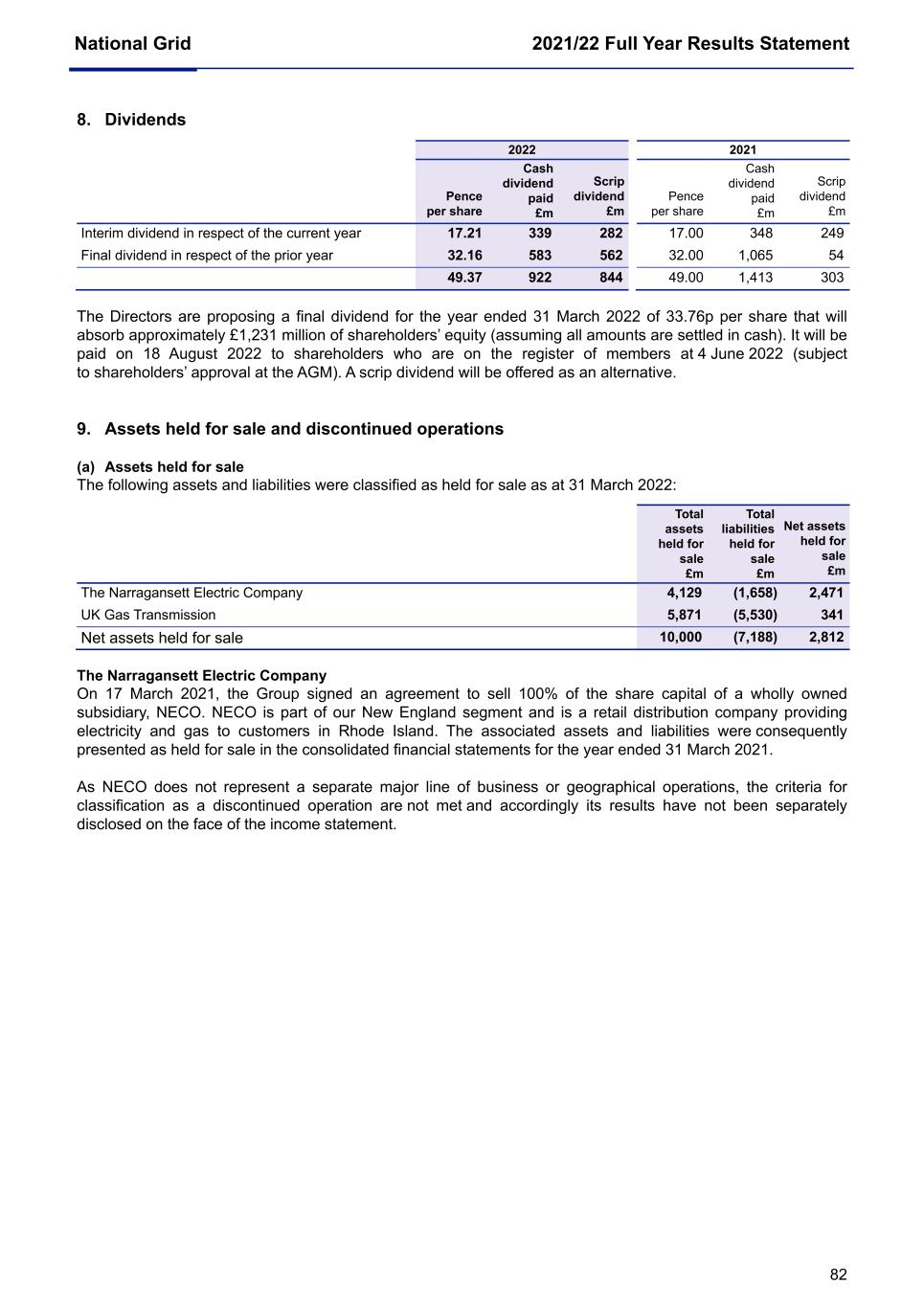
National Grid 2021/22 Full Year Results Statement 82 8. Dividends 2022 2021 Pence per share Cash dividend paid £m Scrip dividend £m Pence per share Cash dividend paid £m Scrip dividend £m Interim dividend in respect of the current year 17.21 339 282 17.00 348 249 Final dividend in respect of the prior year 32.16 583 562 32.00 1,065 54 49.37 922 844 49.00 1,413 303 The Directors are proposing a final dividend for the year ended 31 March 2022 of 33.76p per share that will absorb approximately £1,231 million of shareholders’ equity (assuming all amounts are settled in cash). It will be paid on 18 August 2022 to shareholders who are on the register of members at 4 June 2022 (subject to shareholders’ approval at the AGM). A scrip dividend will be offered as an alternative. 9. Assets held for sale and discontinued operations (a) Assets held for sale The following assets and liabilities were classified as held for sale as at 31 March 2022: Total assets held for sale £m Total liabilities held for sale £m Net assets held for sale £m The Narragansett Electric Company 4,129 (1,658) 2,471 UK Gas Transmission 5,871 (5,530) 341 Net assets held for sale 10,000 (7,188) 2,812 The Narragansett Electric Company On 17 March 2021, the Group signed an agreement to sell 100% of the share capital of a wholly owned subsidiary, NECO. NECO is part of our New England segment and is a retail distribution company providing electricity and gas to customers in Rhode Island. The associated assets and liabilities were consequently presented as held for sale in the consolidated financial statements for the year ended 31 March 2021. As NECO does not represent a separate major line of business or geographical operations, the criteria for classification as a discontinued operation are not met and accordingly its results have not been separately disclosed on the face of the income statement.
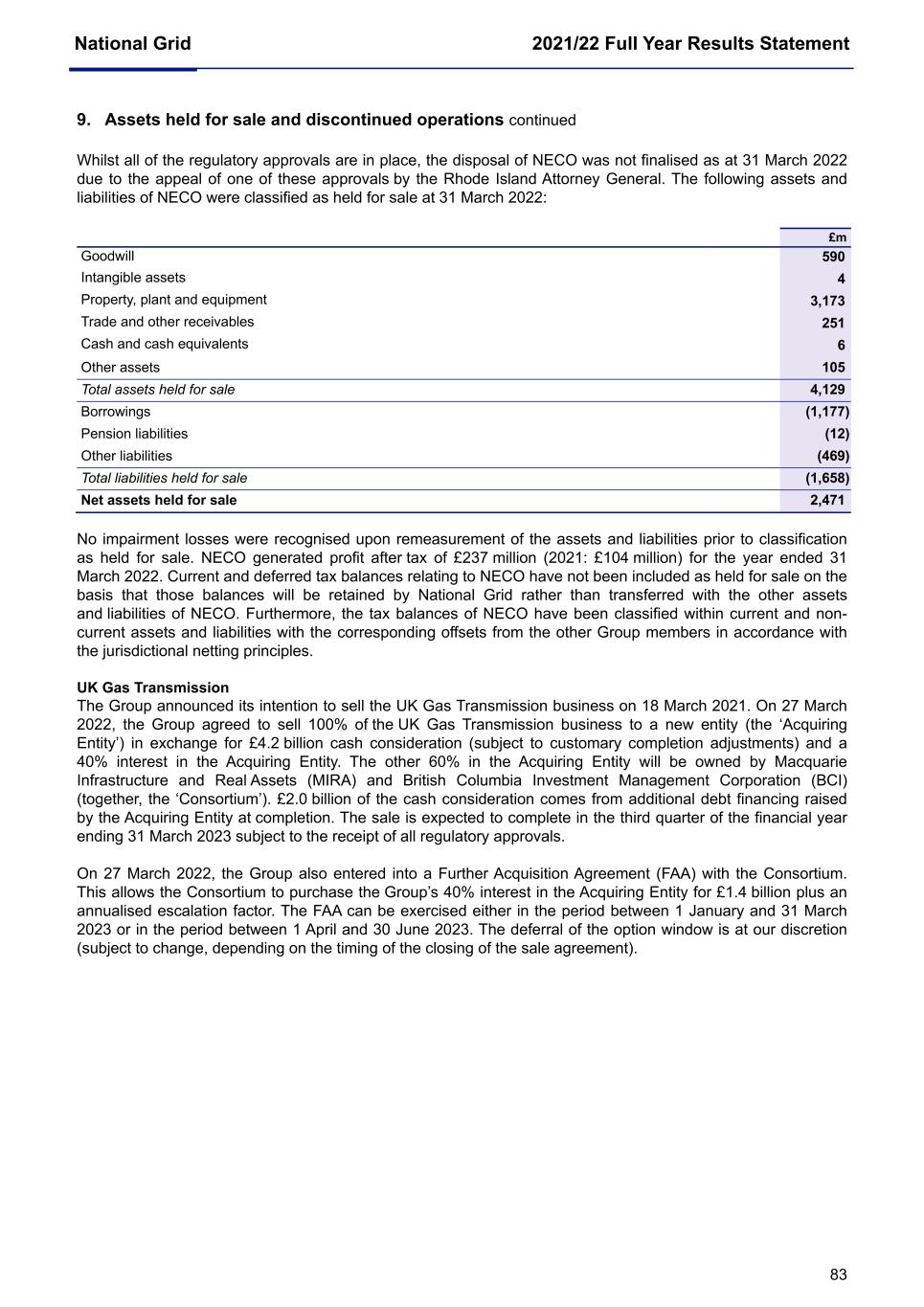
National Grid 2021/22 Full Year Results Statement 83 9. Assets held for sale and discontinued operations continued Whilst all of the regulatory approvals are in place, the disposal of NECO was not finalised as at 31 March 2022 due to the appeal of one of these approvals by the Rhode Island Attorney General. The following assets and liabilities of NECO were classified as held for sale at 31 March 2022: £m Goodwill 590 Intangible assets 4 Property, plant and equipment 3,173 Trade and other receivables 251 Cash and cash equivalents 6 Other assets 105 Total assets held for sale 4,129 Borrowings (1,177) Pension liabilities (12) Other liabilities (469) Total liabilities held for sale (1,658) Net assets held for sale 2,471 No impairment losses were recognised upon remeasurement of the assets and liabilities prior to classification as held for sale. NECO generated profit after tax of £237 million (2021: £104 million) for the year ended 31 March 2022. Current and deferred tax balances relating to NECO have not been included as held for sale on the basis that those balances will be retained by National Grid rather than transferred with the other assets and liabilities of NECO. Furthermore, the tax balances of NECO have been classified within current and non- current assets and liabilities with the corresponding offsets from the other Group members in accordance with the jurisdictional netting principles. UK Gas Transmission The Group announced its intention to sell the UK Gas Transmission business on 18 March 2021. On 27 March 2022, the Group agreed to sell 100% of the UK Gas Transmission business to a new entity (the ‘Acquiring Entity’) in exchange for £4.2 billion cash consideration (subject to customary completion adjustments) and a 40% interest in the Acquiring Entity. The other 60% in the Acquiring Entity will be owned by Macquarie Infrastructure and Real Assets (MIRA) and British Columbia Investment Management Corporation (BCI) (together, the ‘Consortium’). £2.0 billion of the cash consideration comes from additional debt financing raised by the Acquiring Entity at completion. The sale is expected to complete in the third quarter of the financial year ending 31 March 2023 subject to the receipt of all regulatory approvals. On 27 March 2022, the Group also entered into a Further Acquisition Agreement (FAA) with the Consortium. This allows the Consortium to purchase the Group’s 40% interest in the Acquiring Entity for £1.4 billion plus an annualised escalation factor. The FAA can be exercised either in the period between 1 January and 31 March 2023 or in the period between 1 April and 30 June 2023. The deferral of the option window is at our discretion (subject to change, depending on the timing of the closing of the sale agreement).
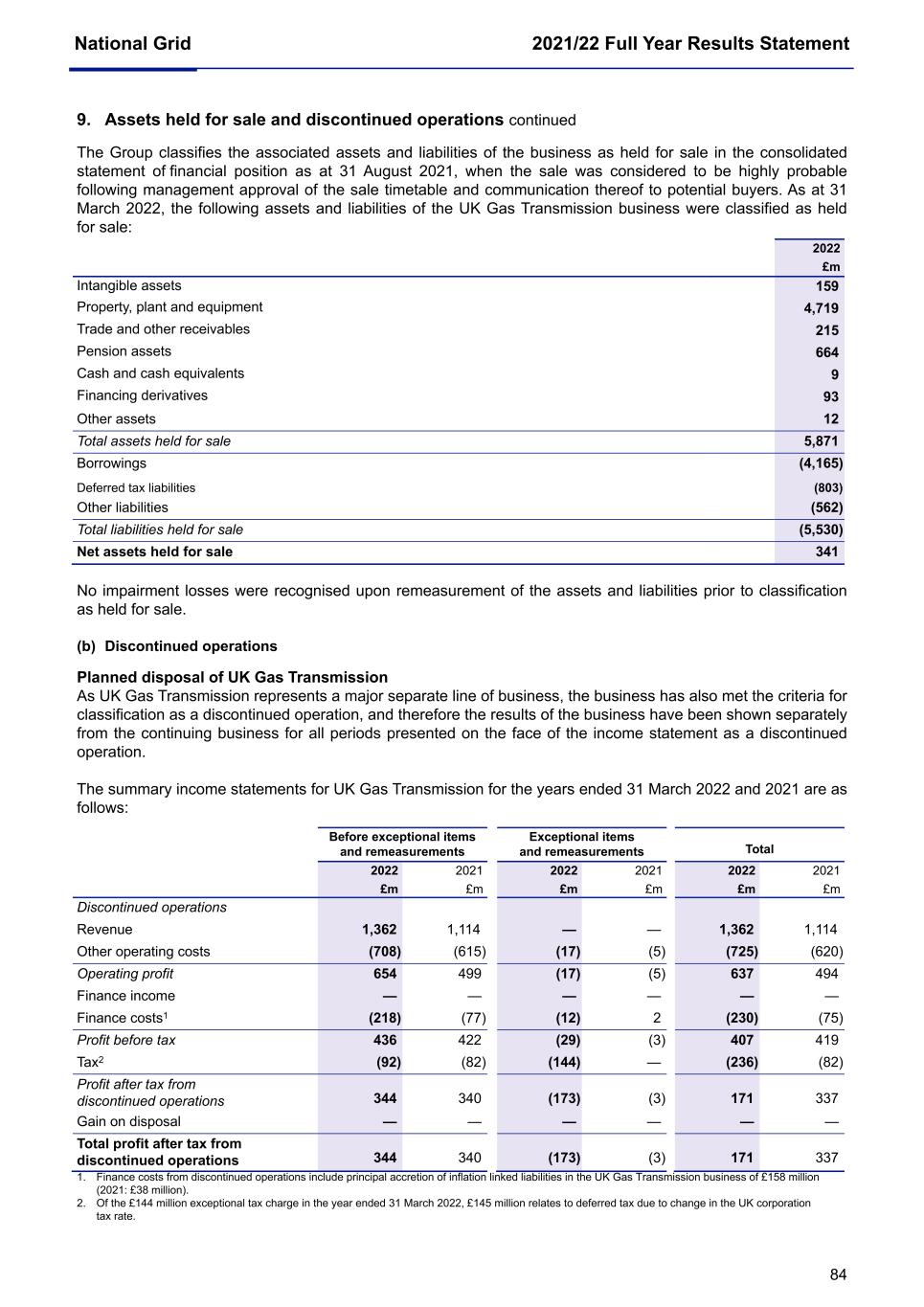
National Grid 2021/22 Full Year Results Statement 84 9. Assets held for sale and discontinued operations continued The Group classifies the associated assets and liabilities of the business as held for sale in the consolidated statement of financial position as at 31 August 2021, when the sale was considered to be highly probable following management approval of the sale timetable and communication thereof to potential buyers. As at 31 March 2022, the following assets and liabilities of the UK Gas Transmission business were classified as held for sale: 2022 £m Intangible assets 159 Property, plant and equipment 4,719 Trade and other receivables 215 Pension assets 664 Cash and cash equivalents 9 Financing derivatives 93 Other assets 12 Total assets held for sale 5,871 Borrowings (4,165) Deferred tax liabilities (803) Other liabilities (562) Total liabilities held for sale (5,530) Net assets held for sale 341 No impairment losses were recognised upon remeasurement of the assets and liabilities prior to classification as held for sale. (b) Discontinued operations Planned disposal of UK Gas Transmission As UK Gas Transmission represents a major separate line of business, the business has also met the criteria for classification as a discontinued operation, and therefore the results of the business have been shown separately from the continuing business for all periods presented on the face of the income statement as a discontinued operation. The summary income statements for UK Gas Transmission for the years ended 31 March 2022 and 2021 are as follows: Before exceptional items and remeasurements Exceptional items and remeasurements Total 2022 2021 2022 2021 2022 2021 £m £m £m £m £m £m Discontinued operations Revenue 1,362 1,114 — — 1,362 1,114 Other operating costs (708) (615) (17) (5) (725) (620) Operating profit 654 499 (17) (5) 637 494 Finance income — — — — — — Finance costs1 (218) (77) (12) 2 (230) (75) Profit before tax 436 422 (29) (3) 407 419 Tax2 (92) (82) (144) — (236) (82) Profit after tax from discontinued operations 344 340 (173) (3) 171 337 Gain on disposal — — — — — — Total profit after tax from discontinued operations 344 340 (173) (3) 171 337 1. Finance costs from discontinued operations include principal accretion of inflation linked liabilities in the UK Gas Transmission business of £158 million (2021: £38 million). 2. Of the £144 million exceptional tax charge in the year ended 31 March 2022, £145 million relates to deferred tax due to change in the UK corporation tax rate.
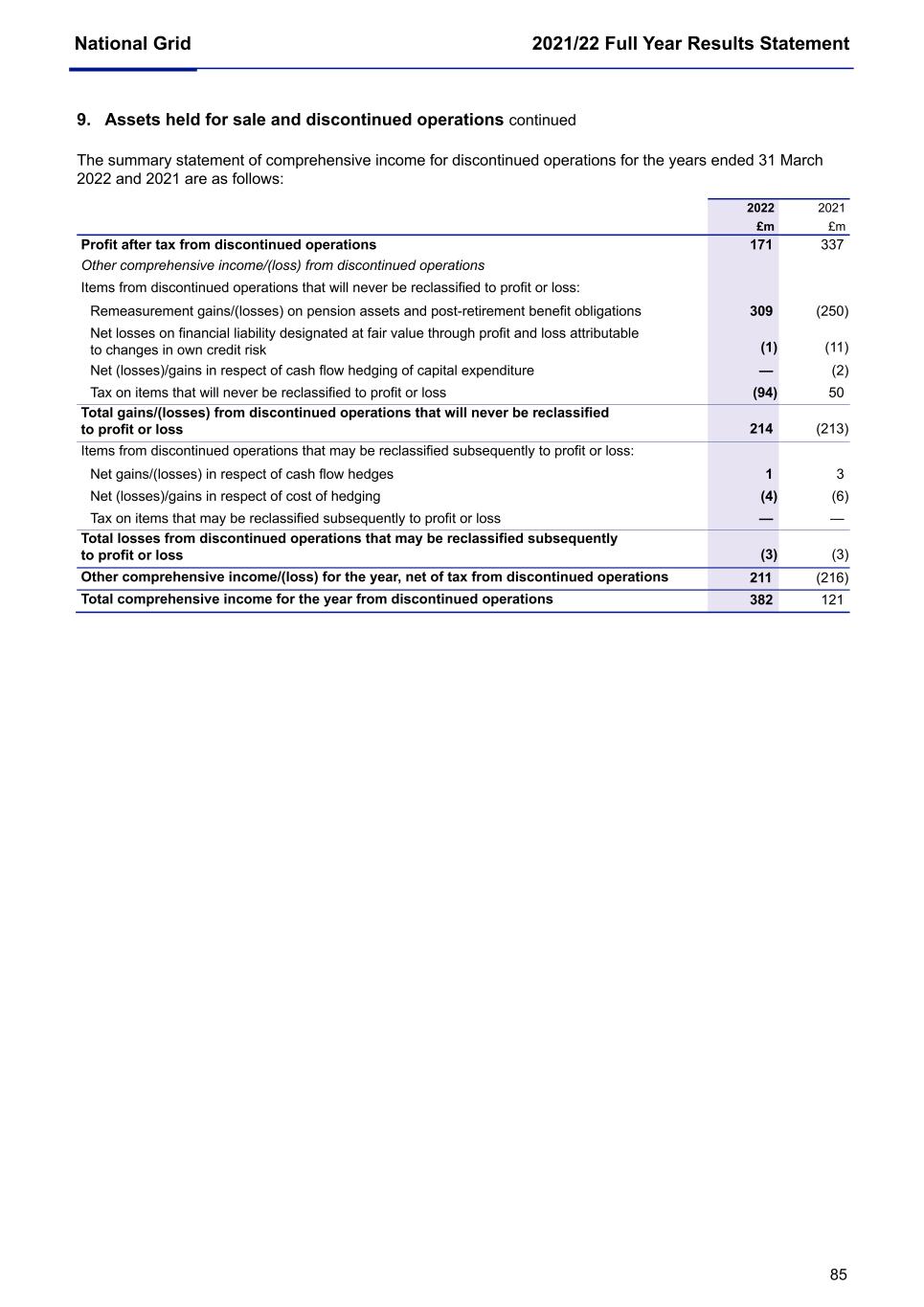
National Grid 2021/22 Full Year Results Statement 85 9. Assets held for sale and discontinued operations continued The summary statement of comprehensive income for discontinued operations for the years ended 31 March 2022 and 2021 are as follows: 2022 2021 £m £m Profit after tax from discontinued operations 171 337 Other comprehensive income/(loss) from discontinued operations Items from discontinued operations that will never be reclassified to profit or loss: Remeasurement gains/(losses) on pension assets and post-retirement benefit obligations 309 (250) Net losses on financial liability designated at fair value through profit and loss attributable to changes in own credit risk (1) (11) Net (losses)/gains in respect of cash flow hedging of capital expenditure — (2) Tax on items that will never be reclassified to profit or loss (94) 50 Total gains/(losses) from discontinued operations that will never be reclassified to profit or loss 214 (213) Items from discontinued operations that may be reclassified subsequently to profit or loss: Net gains/(losses) in respect of cash flow hedges 1 3 Net (losses)/gains in respect of cost of hedging (4) (6) Tax on items that may be reclassified subsequently to profit or loss — — Total losses from discontinued operations that may be reclassified subsequently to profit or loss (3) (3) Other comprehensive income/(loss) for the year, net of tax from discontinued operations 211 (216) Total comprehensive income for the year from discontinued operations 382 121
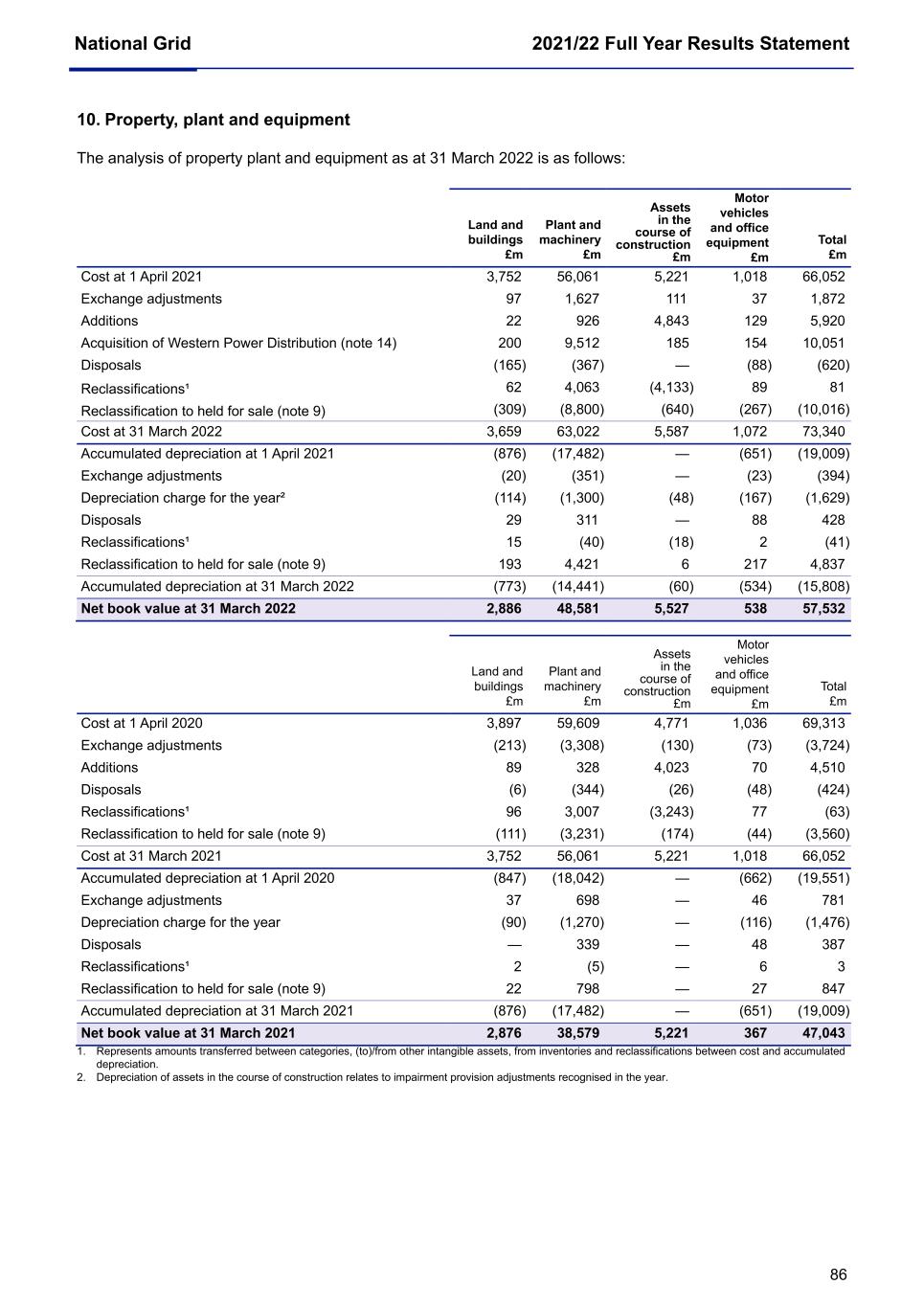
National Grid 2021/22 Full Year Results Statement 86 10. Property, plant and equipment The analysis of property plant and equipment as at 31 March 2022 is as follows: Land and buildings £m Plant and machinery £m Assets in the course of construction £m Motor vehicles and office equipment £m Total £m Cost at 1 April 2021 3,752 56,061 5,221 1,018 66,052 Exchange adjustments 97 1,627 111 37 1,872 Additions 22 926 4,843 129 5,920 Acquisition of Western Power Distribution (note 14) 200 9,512 185 154 10,051 Disposals (165) (367) — (88) (620) Reclassifications¹ 62 4,063 (4,133) 89 81 Reclassification to held for sale (note 9) (309) (8,800) (640) (267) (10,016) Cost at 31 March 2022 3,659 63,022 5,587 1,072 73,340 Accumulated depreciation at 1 April 2021 (876) (17,482) — (651) (19,009) Exchange adjustments (20) (351) — (23) (394) Depreciation charge for the year² (114) (1,300) (48) (167) (1,629) Disposals 29 311 — 88 428 Reclassifications¹ 15 (40) (18) 2 (41) Reclassification to held for sale (note 9) 193 4,421 6 217 4,837 Accumulated depreciation at 31 March 2022 (773) (14,441) (60) (534) (15,808) Net book value at 31 March 2022 2,886 48,581 5,527 538 57,532 Land and buildings £m Plant and machinery £m Assets in the course of construction £m Motor vehicles and office equipment £m Total £m Cost at 1 April 2020 3,897 59,609 4,771 1,036 69,313 Exchange adjustments (213) (3,308) (130) (73) (3,724) Additions 89 328 4,023 70 4,510 Disposals (6) (344) (26) (48) (424) Reclassifications¹ 96 3,007 (3,243) 77 (63) Reclassification to held for sale (note 9) (111) (3,231) (174) (44) (3,560) Cost at 31 March 2021 3,752 56,061 5,221 1,018 66,052 Accumulated depreciation at 1 April 2020 (847) (18,042) — (662) (19,551) Exchange adjustments 37 698 — 46 781 Depreciation charge for the year (90) (1,270) — (116) (1,476) Disposals — 339 — 48 387 Reclassifications¹ 2 (5) — 6 3 Reclassification to held for sale (note 9) 22 798 — 27 847 Accumulated depreciation at 31 March 2021 (876) (17,482) — (651) (19,009) Net book value at 31 March 2021 2,876 38,579 5,221 367 47,043 1. Represents amounts transferred between categories, (to)/from other intangible assets, from inventories and reclassifications between cost and accumulated depreciation. 2. Depreciation of assets in the course of construction relates to impairment provision adjustments recognised in the year.
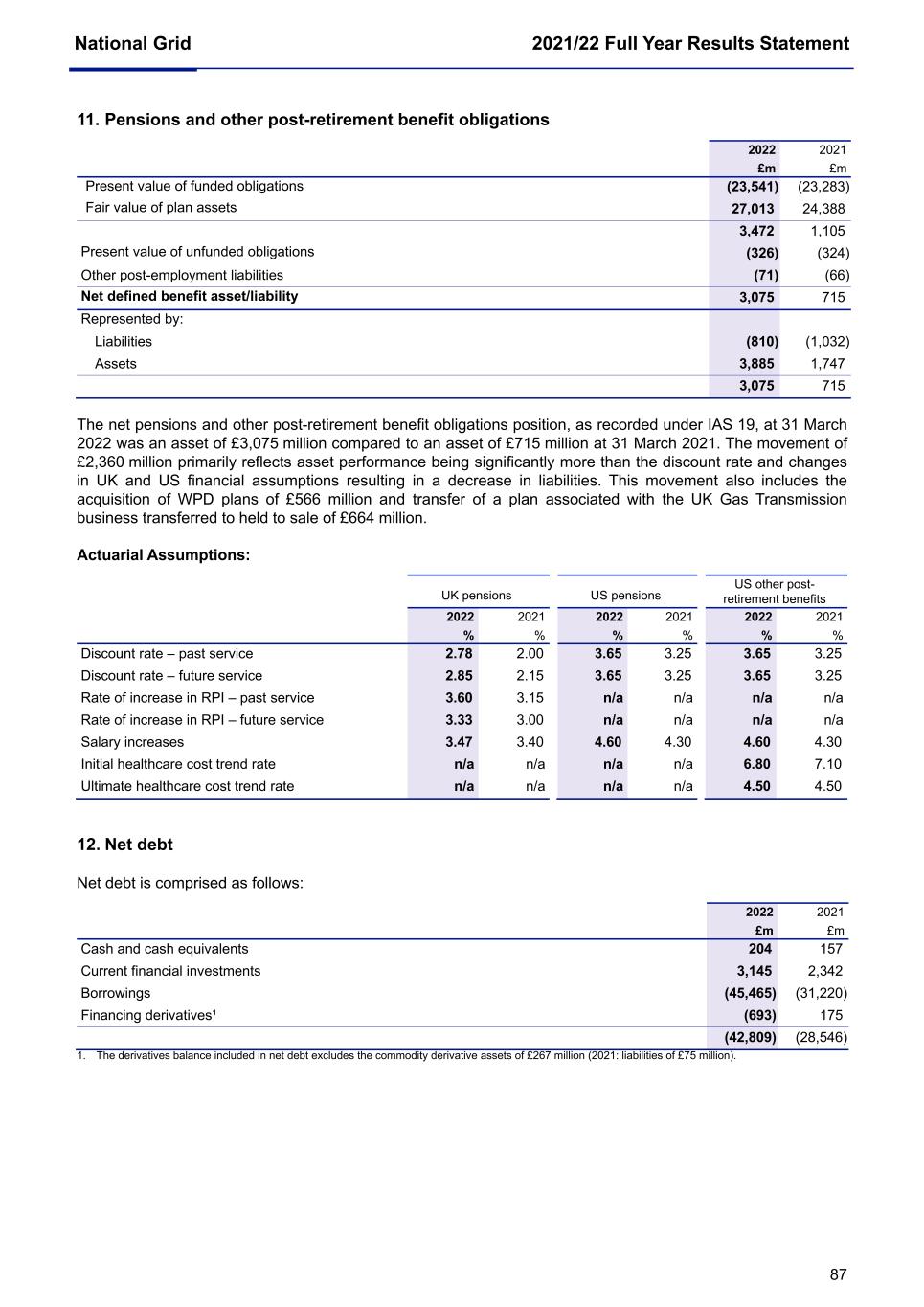
National Grid 2021/22 Full Year Results Statement 87 11. Pensions and other post-retirement benefit obligations 2022 2021 £m £m Present value of funded obligations (23,541) (23,283) Fair value of plan assets 27,013 24,388 3,472 1,105 Present value of unfunded obligations (326) (324) Other post-employment liabilities (71) (66) Net defined benefit asset/liability 3,075 715 Represented by: Liabilities (810) (1,032) Assets 3,885 1,747 3,075 715 The net pensions and other post-retirement benefit obligations position, as recorded under IAS 19, at 31 March 2022 was an asset of £3,075 million compared to an asset of £715 million at 31 March 2021. The movement of £2,360 million primarily reflects asset performance being significantly more than the discount rate and changes in UK and US financial assumptions resulting in a decrease in liabilities. This movement also includes the acquisition of WPD plans of £566 million and transfer of a plan associated with the UK Gas Transmission business transferred to held to sale of £664 million. Actuarial Assumptions: UK pensions US pensions US other post- retirement benefits 2022 2021 2022 2021 2022 2021 % % % % % % Discount rate – past service 2.78 2.00 3.65 3.25 3.65 3.25 Discount rate – future service 2.85 2.15 3.65 3.25 3.65 3.25 Rate of increase in RPI – past service 3.60 3.15 n/a n/a n/a n/a Rate of increase in RPI – future service 3.33 3.00 n/a n/a n/a n/a Salary increases 3.47 3.40 4.60 4.30 4.60 4.30 Initial healthcare cost trend rate n/a n/a n/a n/a 6.80 7.10 Ultimate healthcare cost trend rate n/a n/a n/a n/a 4.50 4.50 12. Net debt Net debt is comprised as follows: 2022 2021 £m £m Cash and cash equivalents 204 157 Current financial investments 3,145 2,342 Borrowings (45,465) (31,220) Financing derivatives¹ (693) 175 (42,809) (28,546) 1. The derivatives balance included in net debt excludes the commodity derivative assets of £267 million (2021: liabilities of £75 million).
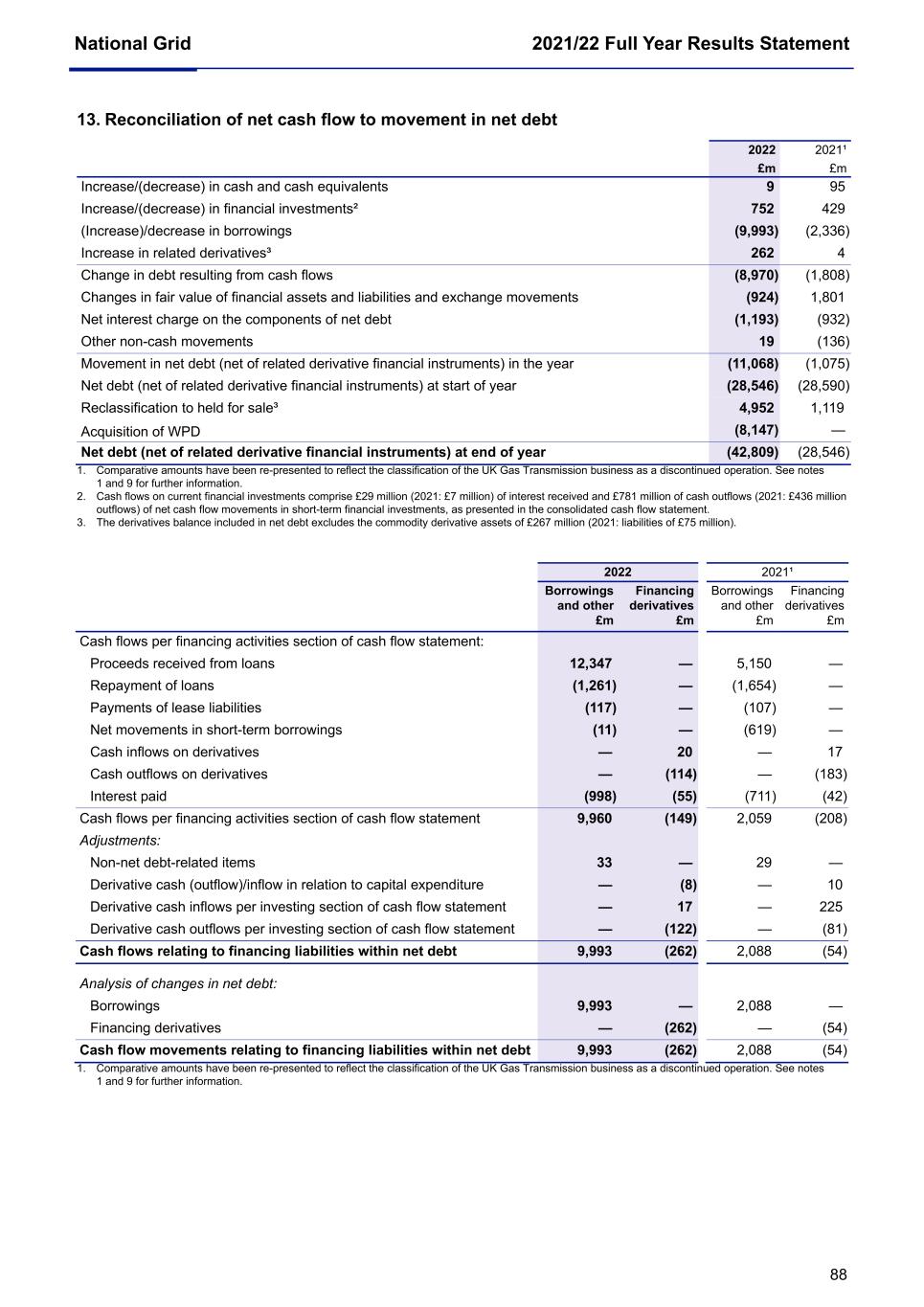
National Grid 2021/22 Full Year Results Statement 88 13. Reconciliation of net cash flow to movement in net debt 2022 2021¹ £m £m Increase/(decrease) in cash and cash equivalents 9 95 Increase/(decrease) in financial investments² 752 429 (Increase)/decrease in borrowings (9,993) (2,336) Increase in related derivatives³ 262 4 Change in debt resulting from cash flows (8,970) (1,808) Changes in fair value of financial assets and liabilities and exchange movements (924) 1,801 Net interest charge on the components of net debt (1,193) (932) Other non-cash movements 19 (136) Movement in net debt (net of related derivative financial instruments) in the year (11,068) (1,075) Net debt (net of related derivative financial instruments) at start of year (28,546) (28,590) Reclassification to held for sale³ 4,952 1,119 Acquisition of WPD (8,147) — Net debt (net of related derivative financial instruments) at end of year (42,809) (28,546) 1. Comparative amounts have been re-presented to reflect the classification of the UK Gas Transmission business as a discontinued operation. See notes 1 and 9 for further information. 2. Cash flows on current financial investments comprise £29 million (2021: £7 million) of interest received and £781 million of cash outflows (2021: £436 million outflows) of net cash flow movements in short-term financial investments, as presented in the consolidated cash flow statement. 3. The derivatives balance included in net debt excludes the commodity derivative assets of £267 million (2021: liabilities of £75 million). 2022 2021¹ Borrowings and other £m Financing derivatives £m Borrowings and other £m Financing derivatives £m Cash flows per financing activities section of cash flow statement: Proceeds received from loans 12,347 — 5,150 — Repayment of loans (1,261) — (1,654) — Payments of lease liabilities (117) — (107) — Net movements in short-term borrowings (11) — (619) — Cash inflows on derivatives — 20 — 17 Cash outflows on derivatives — (114) — (183) Interest paid (998) (55) (711) (42) Cash flows per financing activities section of cash flow statement 9,960 (149) 2,059 (208) Adjustments: Non-net debt-related items 33 — 29 — Derivative cash (outflow)/inflow in relation to capital expenditure — (8) — 10 Derivative cash inflows per investing section of cash flow statement — 17 — 225 Derivative cash outflows per investing section of cash flow statement — (122) — (81) Cash flows relating to financing liabilities within net debt 9,993 (262) 2,088 (54) Analysis of changes in net debt: Borrowings 9,993 — 2,088 — Financing derivatives — (262) — (54) Cash flow movements relating to financing liabilities within net debt 9,993 (262) 2,088 (54) 1. Comparative amounts have been re-presented to reflect the classification of the UK Gas Transmission business as a discontinued operation. See notes 1 and 9 for further information.
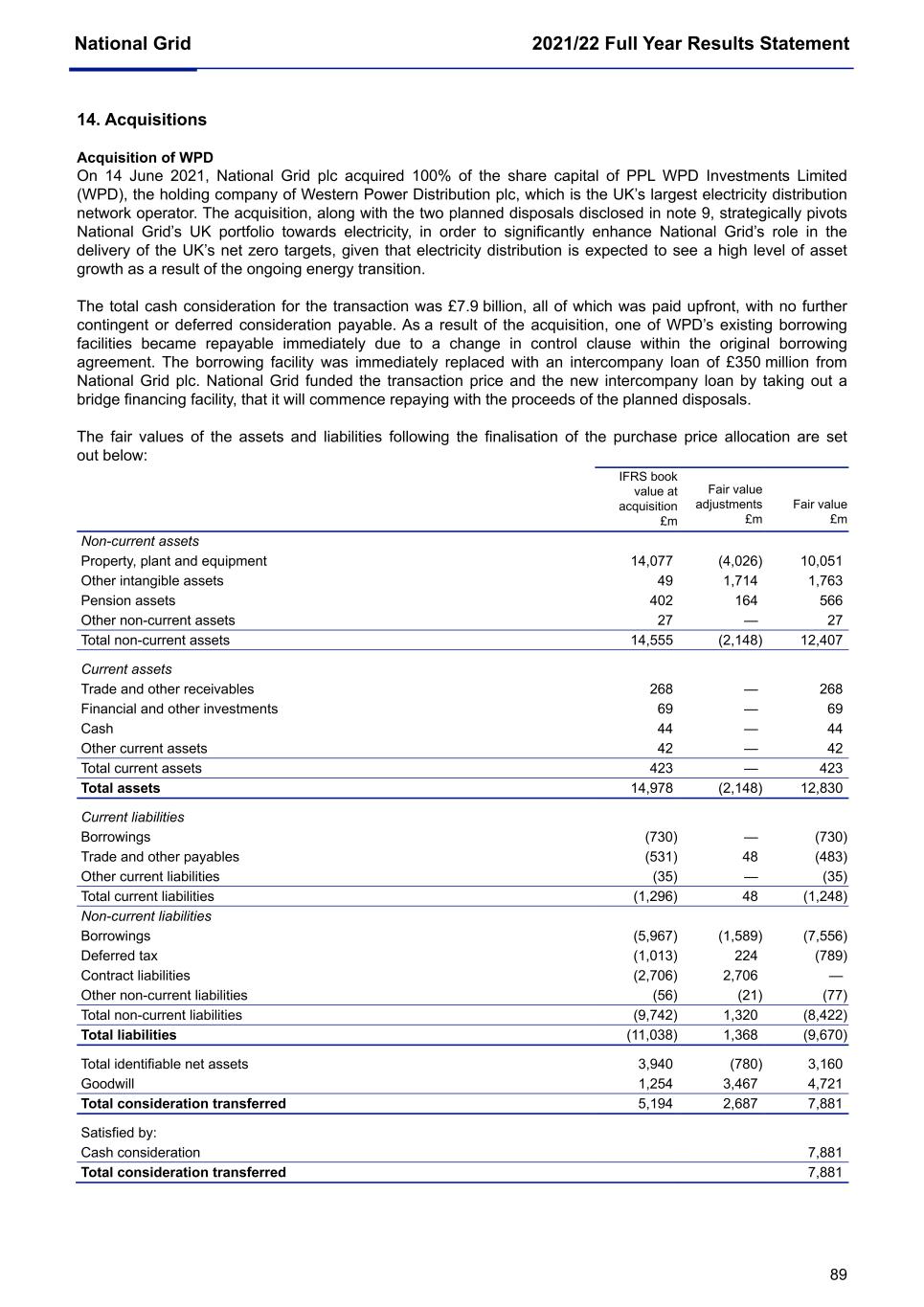
National Grid 2021/22 Full Year Results Statement 89 14. Acquisitions Acquisition of WPD On 14 June 2021, National Grid plc acquired 100% of the share capital of PPL WPD Investments Limited (WPD), the holding company of Western Power Distribution plc, which is the UK’s largest electricity distribution network operator. The acquisition, along with the two planned disposals disclosed in note 9, strategically pivots National Grid’s UK portfolio towards electricity, in order to significantly enhance National Grid’s role in the delivery of the UK’s net zero targets, given that electricity distribution is expected to see a high level of asset growth as a result of the ongoing energy transition. The total cash consideration for the transaction was £7.9 billion, all of which was paid upfront, with no further contingent or deferred consideration payable. As a result of the acquisition, one of WPD’s existing borrowing facilities became repayable immediately due to a change in control clause within the original borrowing agreement. The borrowing facility was immediately replaced with an intercompany loan of £350 million from National Grid plc. National Grid funded the transaction price and the new intercompany loan by taking out a bridge financing facility, that it will commence repaying with the proceeds of the planned disposals. The fair values of the assets and liabilities following the finalisation of the purchase price allocation are set out below: IFRS book value at acquisition £m Fair value adjustments £m Fair value £m Non-current assets Property, plant and equipment 14,077 (4,026) 10,051 Other intangible assets 49 1,714 1,763 Pension assets 402 164 566 Other non-current assets 27 — 27 Total non-current assets 14,555 (2,148) 12,407 Current assets Trade and other receivables 268 — 268 Financial and other investments 69 — 69 Cash 44 — 44 Other current assets 42 — 42 Total current assets 423 — 423 Total assets 14,978 (2,148) 12,830 Current liabilities Borrowings (730) — (730) Trade and other payables (531) 48 (483) Other current liabilities (35) — (35) Total current liabilities (1,296) 48 (1,248) Non-current liabilities Borrowings (5,967) (1,589) (7,556) Deferred tax (1,013) 224 (789) Contract liabilities (2,706) 2,706 — Other non-current liabilities (56) (21) (77) Total non-current liabilities (9,742) 1,320 (8,422) Total liabilities (11,038) 1,368 (9,670) Total identifiable net assets 3,940 (780) 3,160 Goodwill 1,254 3,467 4,721 Total consideration transferred 5,194 2,687 7,881 Satisfied by: Cash consideration 7,881 Total consideration transferred 7,881
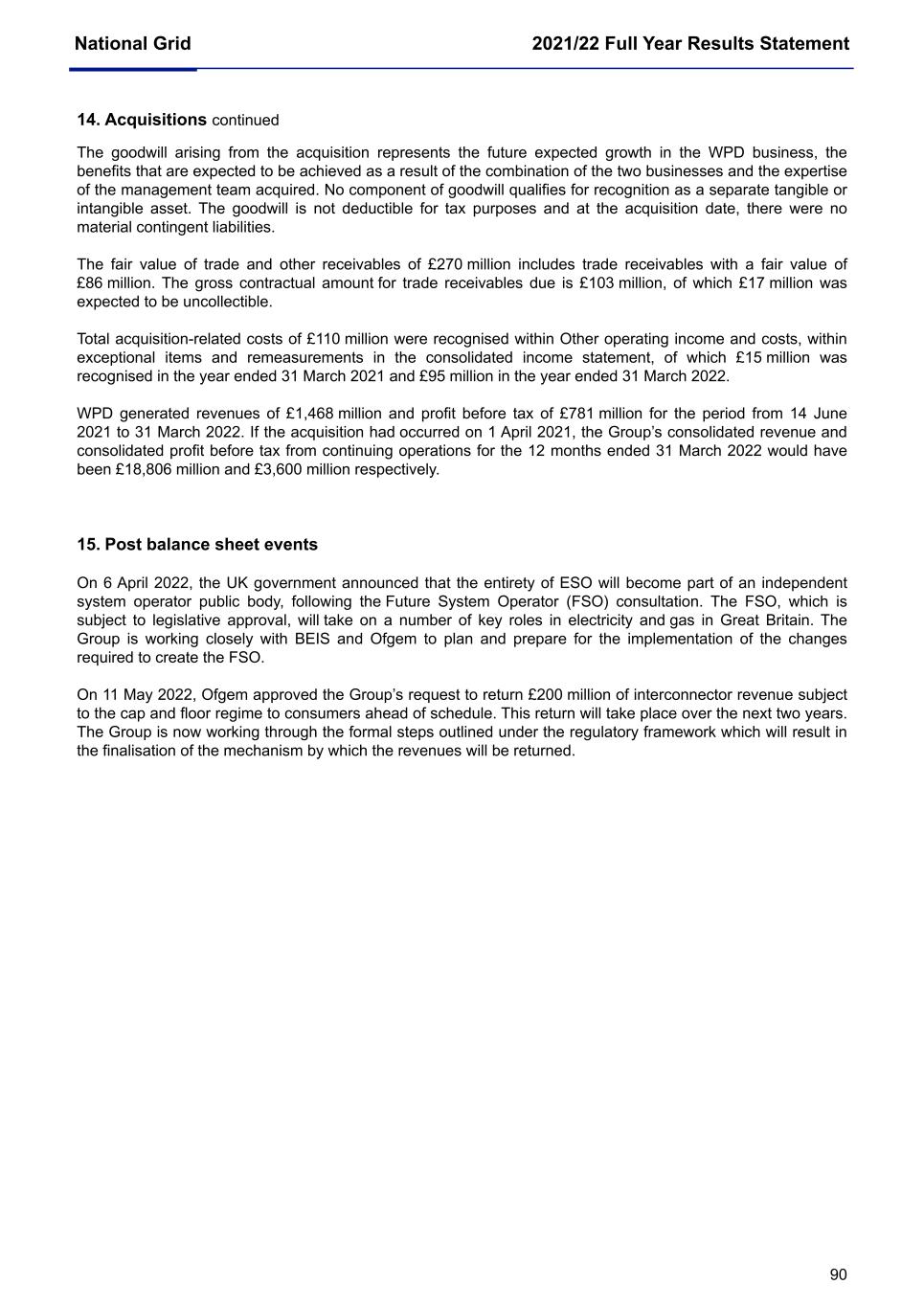
National Grid 2021/22 Full Year Results Statement 90 14. Acquisitions continued The goodwill arising from the acquisition represents the future expected growth in the WPD business, the benefits that are expected to be achieved as a result of the combination of the two businesses and the expertise of the management team acquired. No component of goodwill qualifies for recognition as a separate tangible or intangible asset. The goodwill is not deductible for tax purposes and at the acquisition date, there were no material contingent liabilities. The fair value of trade and other receivables of £270 million includes trade receivables with a fair value of £86 million. The gross contractual amount for trade receivables due is £103 million, of which £17 million was expected to be uncollectible. Total acquisition-related costs of £110 million were recognised within Other operating income and costs, within exceptional items and remeasurements in the consolidated income statement, of which £15 million was recognised in the year ended 31 March 2021 and £95 million in the year ended 31 March 2022. WPD generated revenues of £1,468 million and profit before tax of £781 million for the period from 14 June 2021 to 31 March 2022. If the acquisition had occurred on 1 April 2021, the Group’s consolidated revenue and consolidated profit before tax from continuing operations for the 12 months ended 31 March 2022 would have been £18,806 million and £3,600 million respectively. 15. Post balance sheet events On 6 April 2022, the UK government announced that the entirety of ESO will become part of an independent system operator public body, following the Future System Operator (FSO) consultation. The FSO, which is subject to legislative approval, will take on a number of key roles in electricity and gas in Great Britain. The Group is working closely with BEIS and Ofgem to plan and prepare for the implementation of the changes required to create the FSO. On 11 May 2022, Ofgem approved the Group’s request to return £200 million of interconnector revenue subject to the cap and floor regime to consumers ahead of schedule. This return will take place over the next two years. The Group is now working through the formal steps outlined under the regulatory framework which will result in the finalisation of the mechanism by which the revenues will be returned.
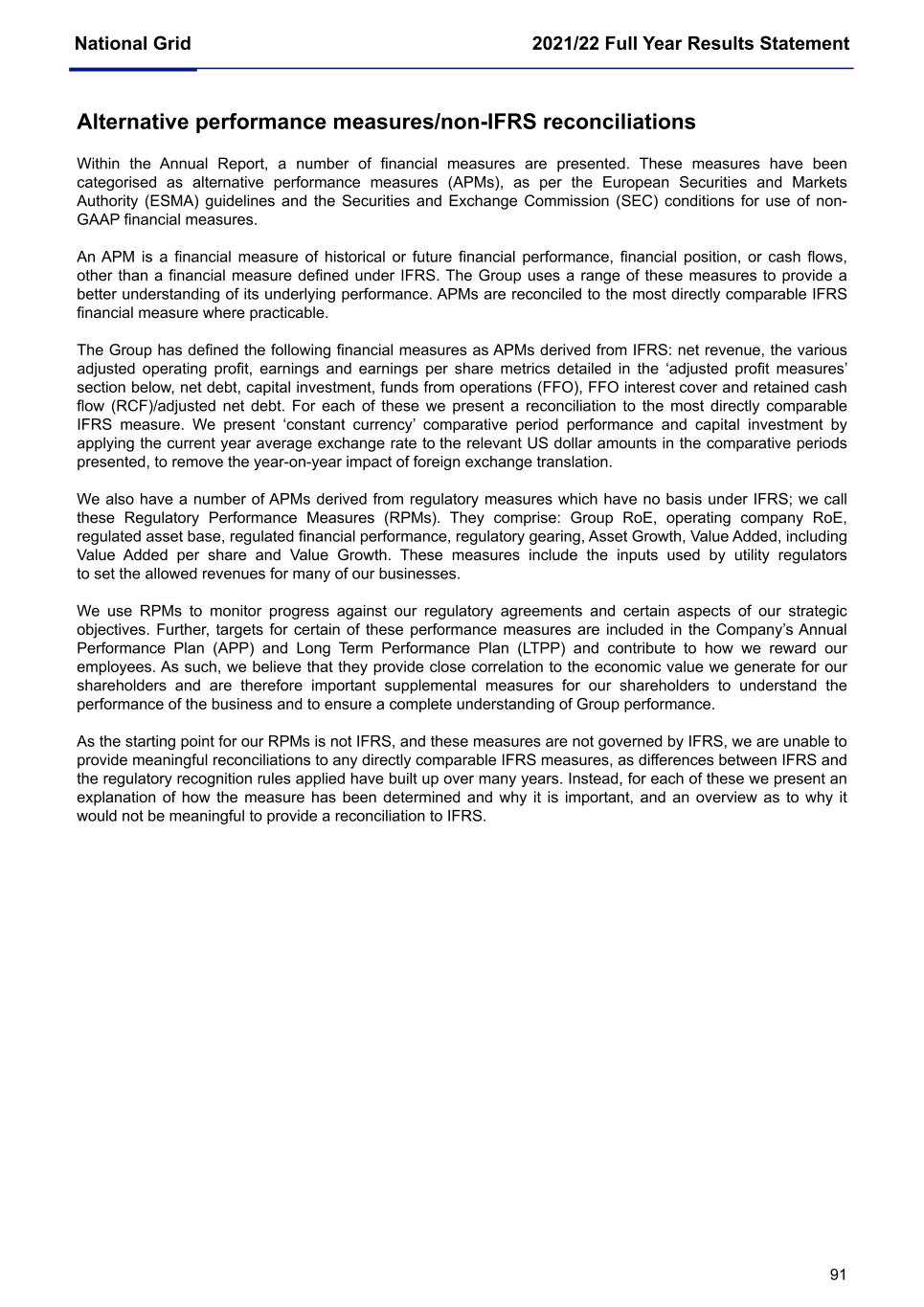
National Grid 2021/22 Full Year Results Statement 91 Alternative performance measures/non-IFRS reconciliations Within the Annual Report, a number of financial measures are presented. These measures have been categorised as alternative performance measures (APMs), as per the European Securities and Markets Authority (ESMA) guidelines and the Securities and Exchange Commission (SEC) conditions for use of non- GAAP financial measures. An APM is a financial measure of historical or future financial performance, financial position, or cash flows, other than a financial measure defined under IFRS. The Group uses a range of these measures to provide a better understanding of its underlying performance. APMs are reconciled to the most directly comparable IFRS financial measure where practicable. The Group has defined the following financial measures as APMs derived from IFRS: net revenue, the various adjusted operating profit, earnings and earnings per share metrics detailed in the ‘adjusted profit measures’ section below, net debt, capital investment, funds from operations (FFO), FFO interest cover and retained cash flow (RCF)/adjusted net debt. For each of these we present a reconciliation to the most directly comparable IFRS measure. We present ‘constant currency’ comparative period performance and capital investment by applying the current year average exchange rate to the relevant US dollar amounts in the comparative periods presented, to remove the year-on-year impact of foreign exchange translation. We also have a number of APMs derived from regulatory measures which have no basis under IFRS; we call these Regulatory Performance Measures (RPMs). They comprise: Group RoE, operating company RoE, regulated asset base, regulated financial performance, regulatory gearing, Asset Growth, Value Added, including Value Added per share and Value Growth. These measures include the inputs used by utility regulators to set the allowed revenues for many of our businesses. We use RPMs to monitor progress against our regulatory agreements and certain aspects of our strategic objectives. Further, targets for certain of these performance measures are included in the Company’s Annual Performance Plan (APP) and Long Term Performance Plan (LTPP) and contribute to how we reward our employees. As such, we believe that they provide close correlation to the economic value we generate for our shareholders and are therefore important supplemental measures for our shareholders to understand the performance of the business and to ensure a complete understanding of Group performance. As the starting point for our RPMs is not IFRS, and these measures are not governed by IFRS, we are unable to provide meaningful reconciliations to any directly comparable IFRS measures, as differences between IFRS and the regulatory recognition rules applied have built up over many years. Instead, for each of these we present an explanation of how the measure has been determined and why it is important, and an overview as to why it would not be meaningful to provide a reconciliation to IFRS.
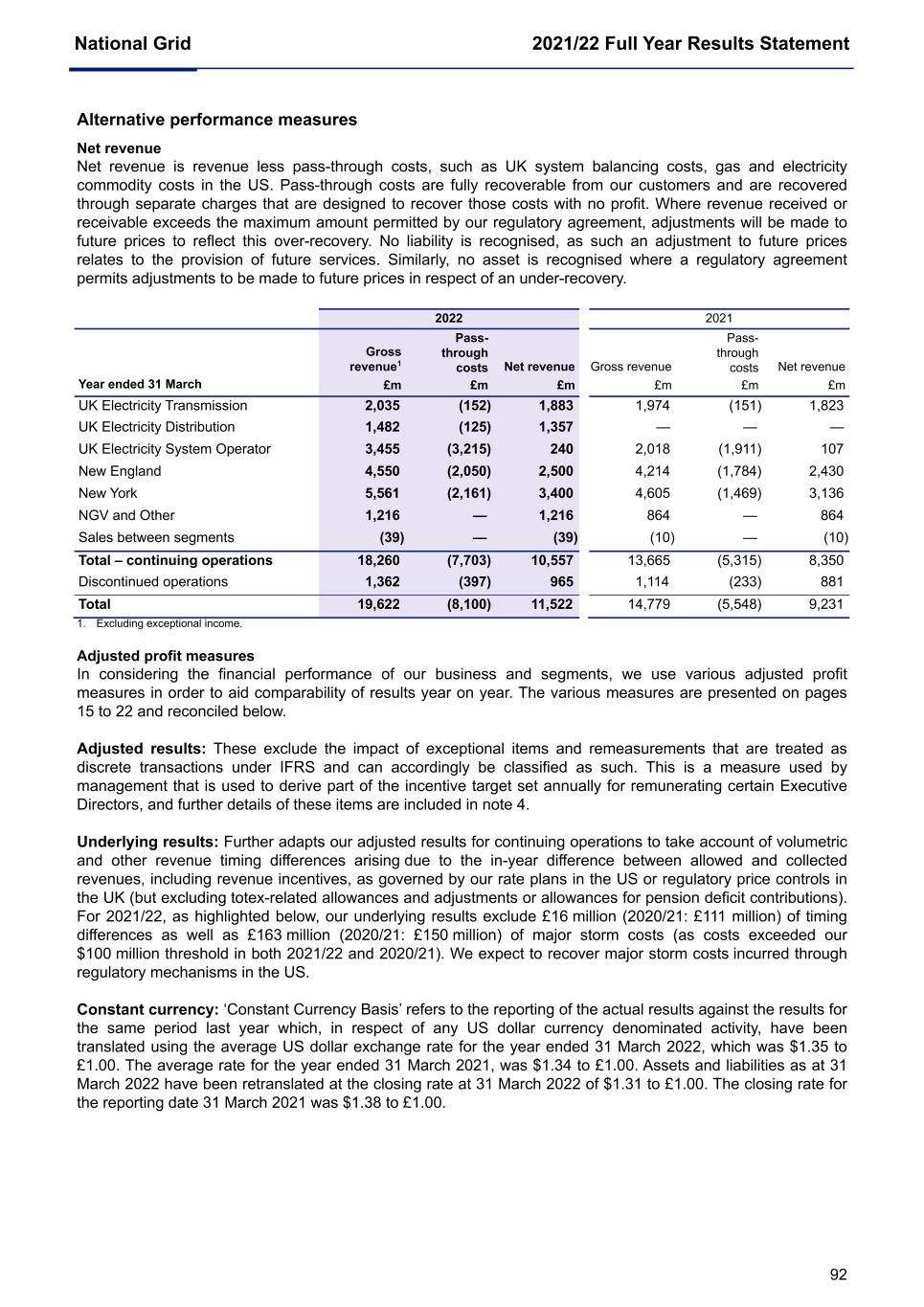
National Grid 2021/22 Full Year Results Statement 92 Alternative performance measures Net revenue Net revenue is revenue less pass-through costs, such as UK system balancing costs, gas and electricity commodity costs in the US. Pass-through costs are fully recoverable from our customers and are recovered through separate charges that are designed to recover those costs with no profit. Where revenue received or receivable exceeds the maximum amount permitted by our regulatory agreement, adjustments will be made to future prices to reflect this over-recovery. No liability is recognised, as such an adjustment to future prices relates to the provision of future services. Similarly, no asset is recognised where a regulatory agreement permits adjustments to be made to future prices in respect of an under-recovery. 2022 2021 Year ended 31 March Gross revenue1 Pass- through costs Net revenue Gross revenue Pass- through costs Net revenue £m £m £m £m £m £m UK Electricity Transmission 2,035 (152) 1,883 1,974 (151) 1,823 UK Electricity Distribution 1,482 (125) 1,357 — — — UK Electricity System Operator 3,455 (3,215) 240 2,018 (1,911) 107 New England 4,550 (2,050) 2,500 4,214 (1,784) 2,430 New York 5,561 (2,161) 3,400 4,605 (1,469) 3,136 NGV and Other 1,216 — 1,216 864 — 864 Sales between segments (39) — (39) (10) — (10) Total – continuing operations 18,260 (7,703) 10,557 13,665 (5,315) 8,350 Discontinued operations 1,362 (397) 965 1,114 (233) 881 Total 19,622 (8,100) 11,522 14,779 (5,548) 9,231 1. Excluding exceptional income. Adjusted profit measures In considering the financial performance of our business and segments, we use various adjusted profit measures in order to aid comparability of results year on year. The various measures are presented on pages 15 to 22 and reconciled below. Adjusted results: These exclude the impact of exceptional items and remeasurements that are treated as discrete transactions under IFRS and can accordingly be classified as such. This is a measure used by management that is used to derive part of the incentive target set annually for remunerating certain Executive Directors, and further details of these items are included in note 4. Underlying results: Further adapts our adjusted results for continuing operations to take account of volumetric and other revenue timing differences arising due to the in-year difference between allowed and collected revenues, including revenue incentives, as governed by our rate plans in the US or regulatory price controls in the UK (but excluding totex-related allowances and adjustments or allowances for pension deficit contributions). For 2021/22, as highlighted below, our underlying results exclude £16 million (2020/21: £111 million) of timing differences as well as £163 million (2020/21: £150 million) of major storm costs (as costs exceeded our $100 million threshold in both 2021/22 and 2020/21). We expect to recover major storm costs incurred through regulatory mechanisms in the US. Constant currency: ‘Constant Currency Basis’ refers to the reporting of the actual results against the results for the same period last year which, in respect of any US dollar currency denominated activity, have been translated using the average US dollar exchange rate for the year ended 31 March 2022, which was $1.35 to £1.00. The average rate for the year ended 31 March 2021, was $1.34 to £1.00. Assets and liabilities as at 31 March 2022 have been retranslated at the closing rate at 31 March 2022 of $1.31 to £1.00. The closing rate for the reporting date 31 March 2021 was $1.38 to £1.00.
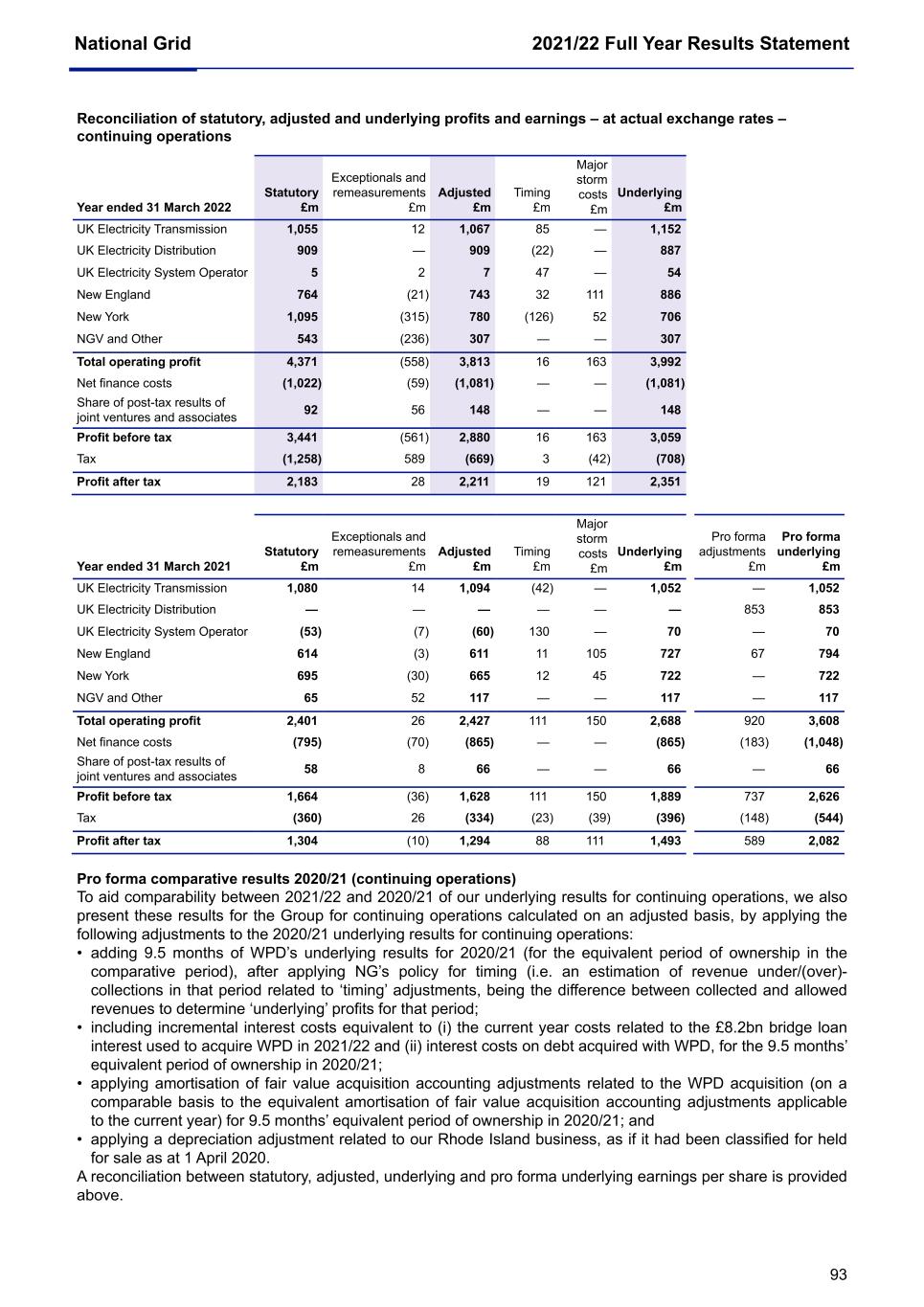
National Grid 2021/22 Full Year Results Statement 93 Reconciliation of statutory, adjusted and underlying profits and earnings – at actual exchange rates – continuing operations Year ended 31 March 2022 Statutory £m Exceptionals and remeasurements £m Adjusted £m Timing £m Major storm costs £m Underlying £m UK Electricity Transmission 1,055 12 1,067 85 — 1,152 UK Electricity Distribution 909 — 909 (22) — 887 UK Electricity System Operator 5 2 7 47 — 54 New England 764 (21) 743 32 111 886 New York 1,095 (315) 780 (126) 52 706 NGV and Other 543 (236) 307 — — 307 Total operating profit 4,371 (558) 3,813 16 163 3,992 Net finance costs (1,022) (59) (1,081) — — (1,081) Share of post-tax results of joint ventures and associates 92 56 148 — — 148 Profit before tax 3,441 (561) 2,880 16 163 3,059 Tax (1,258) 589 (669) 3 (42) (708) Profit after tax 2,183 28 2,211 19 121 2,351 Year ended 31 March 2021 Statutory £m Exceptionals and remeasurements £m Adjusted £m Timing £m Major storm costs £m Underlying £m Pro forma adjustments £m Pro forma underlying £m UK Electricity Transmission 1,080 14 1,094 (42) — 1,052 — 1,052 UK Electricity Distribution — — — — — — 853 853 UK Electricity System Operator (53) (7) (60) 130 — 70 — 70 New England 614 (3) 611 11 105 727 67 794 New York 695 (30) 665 12 45 722 — 722 NGV and Other 65 52 117 — — 117 — 117 Total operating profit 2,401 26 2,427 111 150 2,688 920 3,608 Net finance costs (795) (70) (865) — — (865) (183) (1,048) Share of post-tax results of joint ventures and associates 58 8 66 — — 66 — 66 Profit before tax 1,664 (36) 1,628 111 150 1,889 737 2,626 Tax (360) 26 (334) (23) (39) (396) (148) (544) Profit after tax 1,304 (10) 1,294 88 111 1,493 589 2,082 Pro forma comparative results 2020/21 (continuing operations) To aid comparability between 2021/22 and 2020/21 of our underlying results for continuing operations, we also present these results for the Group for continuing operations calculated on an adjusted basis, by applying the following adjustments to the 2020/21 underlying results for continuing operations: • adding 9.5 months of WPD’s underlying results for 2020/21 (for the equivalent period of ownership in the comparative period), after applying NG’s policy for timing (i.e. an estimation of revenue under/(over)- collections in that period related to ‘timing’ adjustments, being the difference between collected and allowed revenues to determine ‘underlying’ profits for that period; • including incremental interest costs equivalent to (i) the current year costs related to the £8.2bn bridge loan interest used to acquire WPD in 2021/22 and (ii) interest costs on debt acquired with WPD, for the 9.5 months’ equivalent period of ownership in 2020/21; • applying amortisation of fair value acquisition accounting adjustments related to the WPD acquisition (on a comparable basis to the equivalent amortisation of fair value acquisition accounting adjustments applicable to the current year) for 9.5 months’ equivalent period of ownership in 2020/21; and • applying a depreciation adjustment related to our Rhode Island business, as if it had been classified for held for sale as at 1 April 2020. A reconciliation between statutory, adjusted, underlying and pro forma underlying earnings per share is provided above.
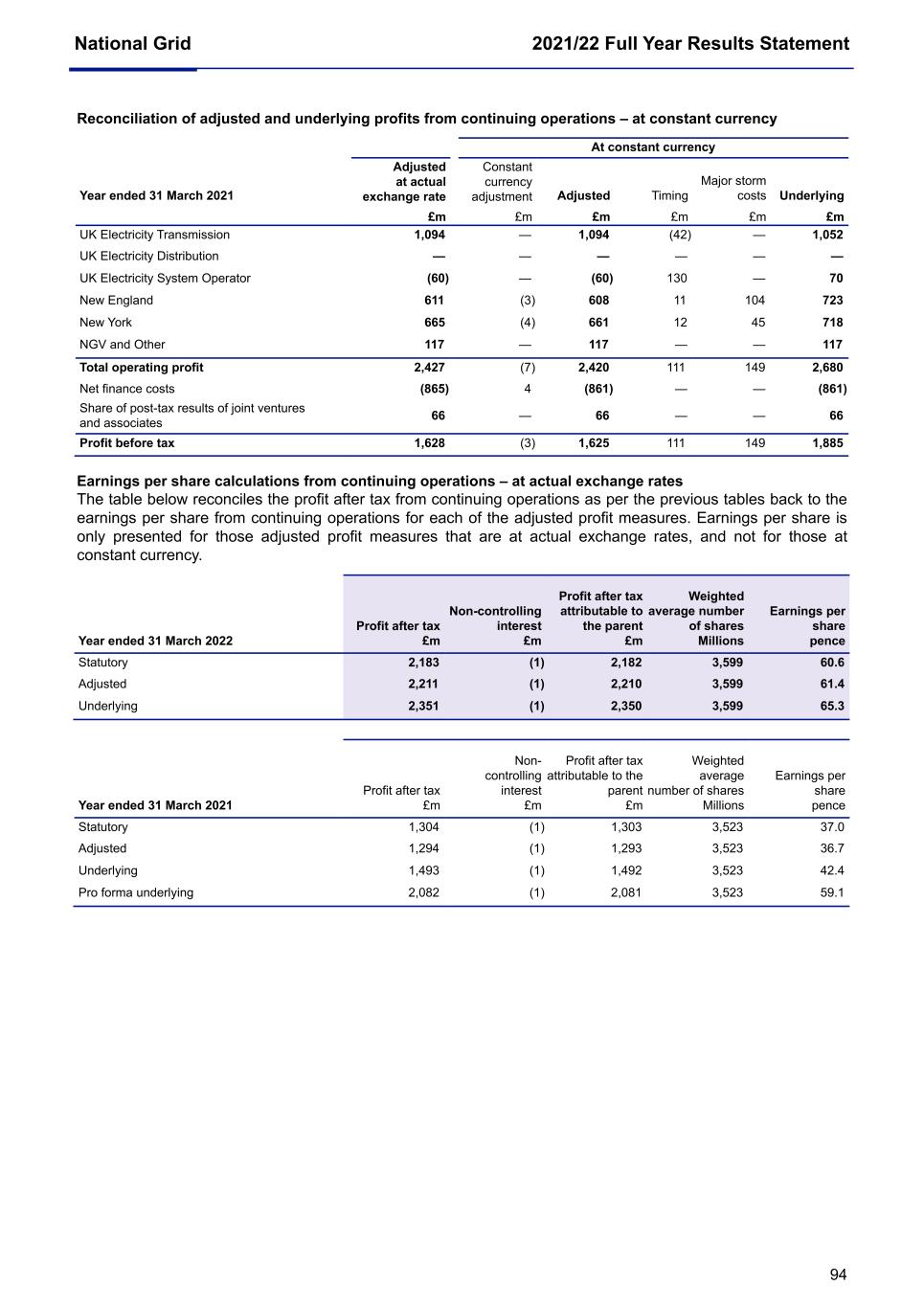
National Grid 2021/22 Full Year Results Statement 94 Reconciliation of adjusted and underlying profits from continuing operations – at constant currency At constant currency Year ended 31 March 2021 Adjusted at actual exchange rate Constant currency adjustment Adjusted Timing Major storm costs Underlying £m £m £m £m £m £m UK Electricity Transmission 1,094 — 1,094 (42) — 1,052 UK Electricity Distribution — — — — — — UK Electricity System Operator (60) — (60) 130 — 70 New England 611 (3) 608 11 104 723 New York 665 (4) 661 12 45 718 NGV and Other 117 — 117 — — 117 Total operating profit 2,427 (7) 2,420 111 149 2,680 Net finance costs (865) 4 (861) — — (861) Share of post-tax results of joint ventures and associates 66 — 66 — — 66 Profit before tax 1,628 (3) 1,625 111 149 1,885 Earnings per share calculations from continuing operations – at actual exchange rates The table below reconciles the profit after tax from continuing operations as per the previous tables back to the earnings per share from continuing operations for each of the adjusted profit measures. Earnings per share is only presented for those adjusted profit measures that are at actual exchange rates, and not for those at constant currency. Year ended 31 March 2022 Profit after tax £m Non-controlling interest £m Profit after tax attributable to the parent £m Weighted average number of shares Millions Earnings per share pence Statutory 2,183 (1) 2,182 3,599 60.6 Adjusted 2,211 (1) 2,210 3,599 61.4 Underlying 2,351 (1) 2,350 3,599 65.3 Year ended 31 March 2021 Profit after tax £m Non- controlling interest £m Profit after tax attributable to the parent £m Weighted average number of shares Millions Earnings per share pence Statutory 1,304 (1) 1,303 3,523 37.0 Adjusted 1,294 (1) 1,293 3,523 36.7 Underlying 1,493 (1) 1,492 3,523 42.4 Pro forma underlying 2,082 (1) 2,081 3,523 59.1
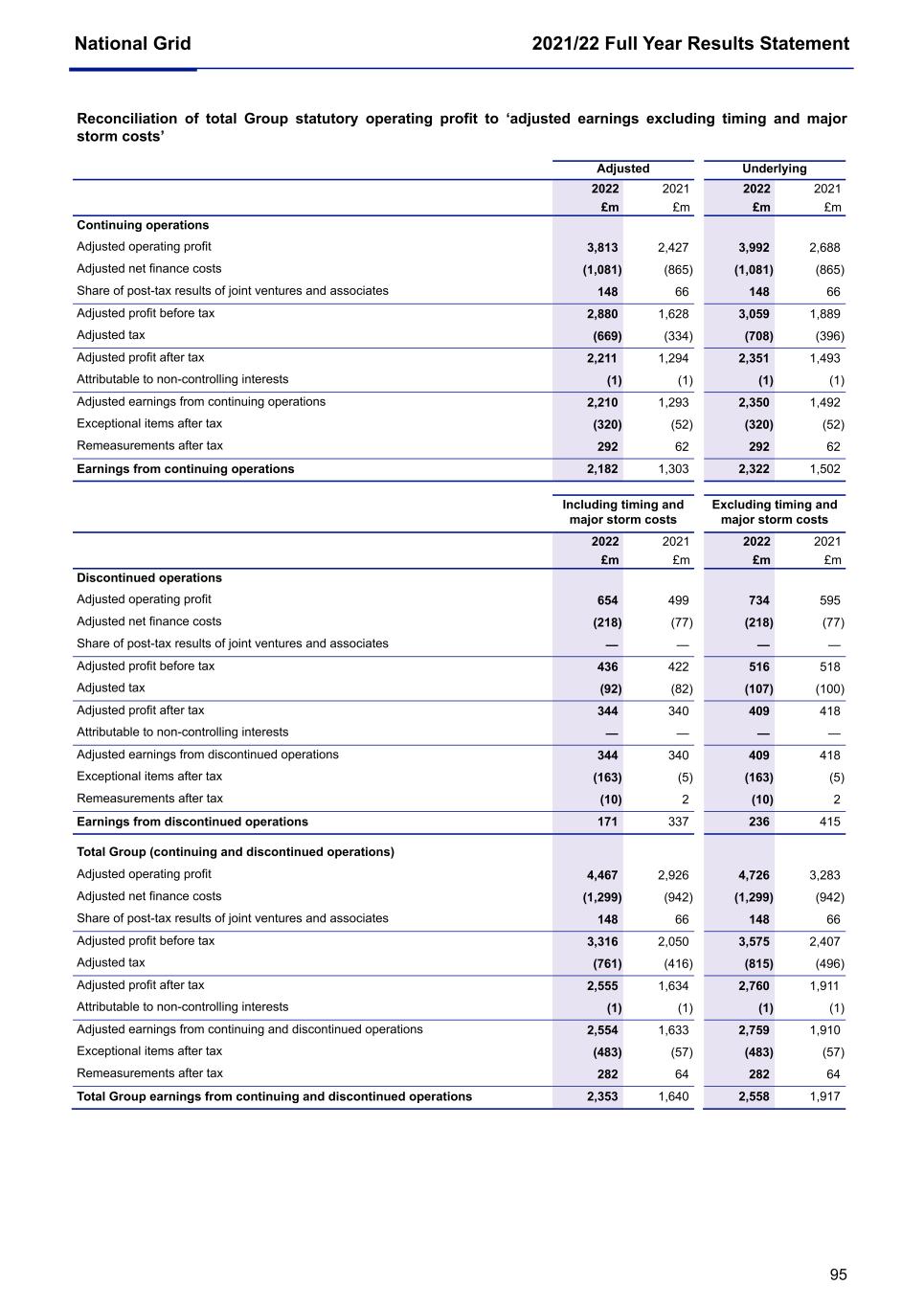
National Grid 2021/22 Full Year Results Statement 95 Reconciliation of total Group statutory operating profit to ‘adjusted earnings excluding timing and major storm costs’ Adjusted Underlying 2022 2021 2022 2021 £m £m £m £m Continuing operations Adjusted operating profit 3,813 2,427 3,992 2,688 Adjusted net finance costs (1,081) (865) (1,081) (865) Share of post-tax results of joint ventures and associates 148 66 148 66 Adjusted profit before tax 2,880 1,628 3,059 1,889 Adjusted tax (669) (334) (708) (396) Adjusted profit after tax 2,211 1,294 2,351 1,493 Attributable to non-controlling interests (1) (1) (1) (1) Adjusted earnings from continuing operations 2,210 1,293 2,350 1,492 Exceptional items after tax (320) (52) (320) (52) Remeasurements after tax 292 62 292 62 Earnings from continuing operations 2,182 1,303 2,322 1,502 Including timing and major storm costs Excluding timing and major storm costs 2022 2021 2022 2021 £m £m £m £m Discontinued operations Adjusted operating profit 654 499 734 595 Adjusted net finance costs (218) (77) (218) (77) Share of post-tax results of joint ventures and associates — — — — Adjusted profit before tax 436 422 516 518 Adjusted tax (92) (82) (107) (100) Adjusted profit after tax 344 340 409 418 Attributable to non-controlling interests — — — — Adjusted earnings from discontinued operations 344 340 409 418 Exceptional items after tax (163) (5) (163) (5) Remeasurements after tax (10) 2 (10) 2 Earnings from discontinued operations 171 337 236 415 Total Group (continuing and discontinued operations) Adjusted operating profit 4,467 2,926 4,726 3,283 Adjusted net finance costs (1,299) (942) (1,299) (942) Share of post-tax results of joint ventures and associates 148 66 148 66 Adjusted profit before tax 3,316 2,050 3,575 2,407 Adjusted tax (761) (416) (815) (496) Adjusted profit after tax 2,555 1,634 2,760 1,911 Attributable to non-controlling interests (1) (1) (1) (1) Adjusted earnings from continuing and discontinued operations 2,554 1,633 2,759 1,910 Exceptional items after tax (483) (57) (483) (57) Remeasurements after tax 282 64 282 64 Total Group earnings from continuing and discontinued operations 2,353 1,640 2,558 1,917
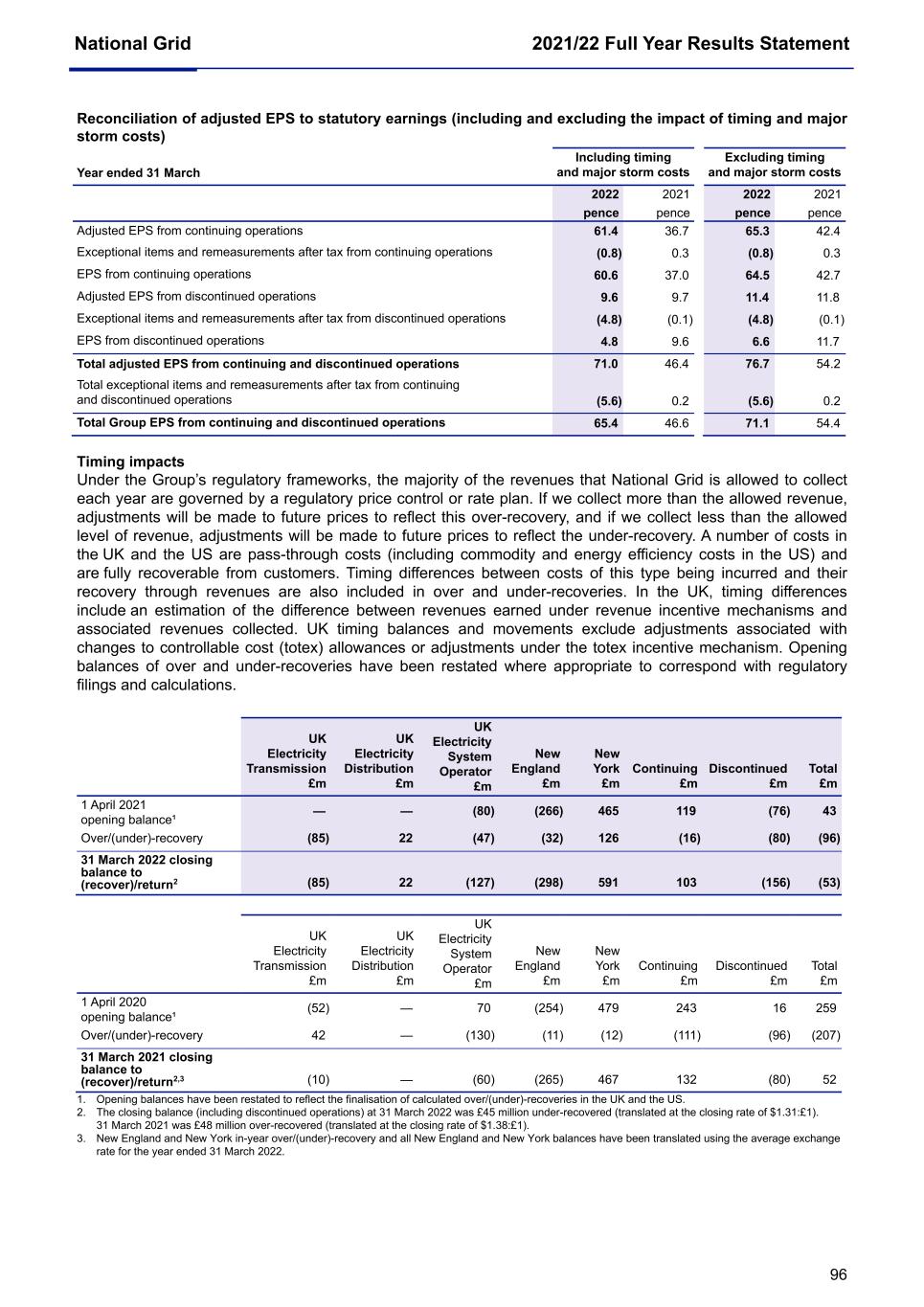
National Grid 2021/22 Full Year Results Statement 96 Reconciliation of adjusted EPS to statutory earnings (including and excluding the impact of timing and major storm costs) Year ended 31 March Including timing and major storm costs Excluding timing and major storm costs 2022 2021 2022 2021 pence pence pence pence Adjusted EPS from continuing operations 61.4 36.7 65.3 42.4 Exceptional items and remeasurements after tax from continuing operations (0.8) 0.3 (0.8) 0.3 EPS from continuing operations 60.6 37.0 64.5 42.7 Adjusted EPS from discontinued operations 9.6 9.7 11.4 11.8 Exceptional items and remeasurements after tax from discontinued operations (4.8) (0.1) (4.8) (0.1) EPS from discontinued operations 4.8 9.6 6.6 11.7 Total adjusted EPS from continuing and discontinued operations 71.0 46.4 76.7 54.2 Total exceptional items and remeasurements after tax from continuing and discontinued operations (5.6) 0.2 (5.6) 0.2 Total Group EPS from continuing and discontinued operations 65.4 46.6 71.1 54.4 Timing impacts Under the Group’s regulatory frameworks, the majority of the revenues that National Grid is allowed to collect each year are governed by a regulatory price control or rate plan. If we collect more than the allowed revenue, adjustments will be made to future prices to reflect this over-recovery, and if we collect less than the allowed level of revenue, adjustments will be made to future prices to reflect the under-recovery. A number of costs in the UK and the US are pass-through costs (including commodity and energy efficiency costs in the US) and are fully recoverable from customers. Timing differences between costs of this type being incurred and their recovery through revenues are also included in over and under-recoveries. In the UK, timing differences include an estimation of the difference between revenues earned under revenue incentive mechanisms and associated revenues collected. UK timing balances and movements exclude adjustments associated with changes to controllable cost (totex) allowances or adjustments under the totex incentive mechanism. Opening balances of over and under-recoveries have been restated where appropriate to correspond with regulatory filings and calculations. UK Electricity Transmission £m UK Electricity Distribution £m UK Electricity System Operator £m New England £m New York £m Continuing £m Discontinued £m Total £m 1 April 2021 opening balance¹ — — (80) (266) 465 119 (76) 43 Over/(under)-recovery (85) 22 (47) (32) 126 (16) (80) (96) 31 March 2022 closing balance to (recover)/return2 (85) 22 (127) (298) 591 103 (156) (53) UK Electricity Transmission £m UK Electricity Distribution £m UK Electricity System Operator £m New England £m New York £m Continuing £m Discontinued £m Total £m 1 April 2020 opening balance¹ (52) — 70 (254) 479 243 16 259 Over/(under)-recovery 42 — (130) (11) (12) (111) (96) (207) 31 March 2021 closing balance to (recover)/return2,3 (10) — (60) (265) 467 132 (80) 52 1. Opening balances have been restated to reflect the finalisation of calculated over/(under)-recoveries in the UK and the US. 2. The closing balance (including discontinued operations) at 31 March 2022 was £45 million under-recovered (translated at the closing rate of $1.31:£1). 31 March 2021 was £48 million over-recovered (translated at the closing rate of $1.38:£1). 3. New England and New York in-year over/(under)-recovery and all New England and New York balances have been translated using the average exchange rate for the year ended 31 March 2022.
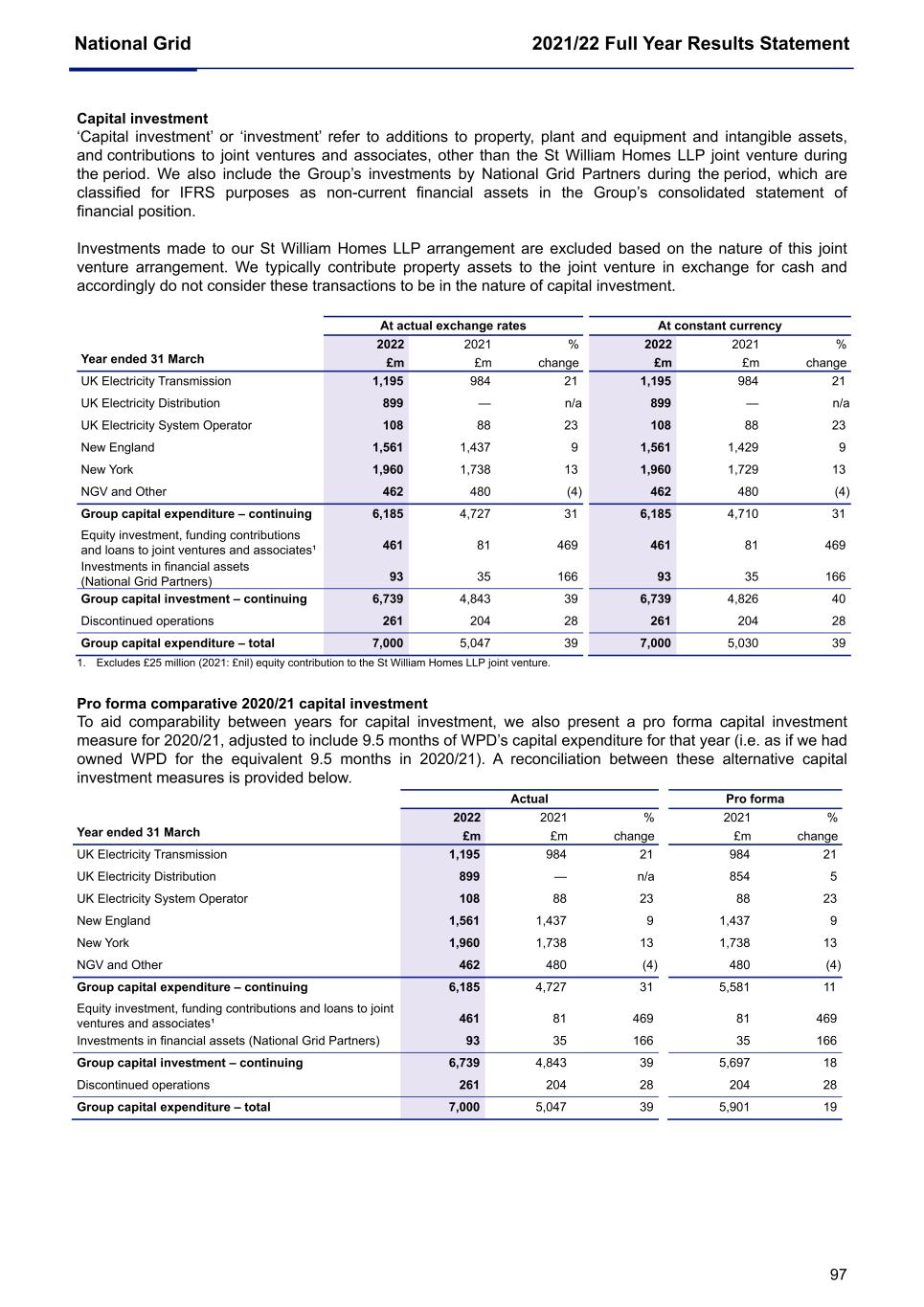
National Grid 2021/22 Full Year Results Statement 97 Capital investment ‘Capital investment’ or ‘investment’ refer to additions to property, plant and equipment and intangible assets, and contributions to joint ventures and associates, other than the St William Homes LLP joint venture during the period. We also include the Group’s investments by National Grid Partners during the period, which are classified for IFRS purposes as non-current financial assets in the Group’s consolidated statement of financial position. Investments made to our St William Homes LLP arrangement are excluded based on the nature of this joint venture arrangement. We typically contribute property assets to the joint venture in exchange for cash and accordingly do not consider these transactions to be in the nature of capital investment. At actual exchange rates At constant currency Year ended 31 March 2022 2021 % 2022 2021 % £m £m change £m £m change UK Electricity Transmission 1,195 984 21 1,195 984 21 UK Electricity Distribution 899 — n/a 899 — n/a UK Electricity System Operator 108 88 23 108 88 23 New England 1,561 1,437 9 1,561 1,429 9 New York 1,960 1,738 13 1,960 1,729 13 NGV and Other 462 480 (4) 462 480 (4) Group capital expenditure – continuing 6,185 4,727 31 6,185 4,710 31 Equity investment, funding contributions and loans to joint ventures and associates¹ 461 81 469 461 81 469 Investments in financial assets (National Grid Partners) 93 35 166 93 35 166 Group capital investment – continuing 6,739 4,843 39 6,739 4,826 40 Discontinued operations 261 204 28 261 204 28 Group capital expenditure – total 7,000 5,047 39 7,000 5,030 39 1. Excludes £25 million (2021: £nil) equity contribution to the St William Homes LLP joint venture. Pro forma comparative 2020/21 capital investment To aid comparability between years for capital investment, we also present a pro forma capital investment measure for 2020/21, adjusted to include 9.5 months of WPD’s capital expenditure for that year (i.e. as if we had owned WPD for the equivalent 9.5 months in 2020/21). A reconciliation between these alternative capital investment measures is provided below. Actual Pro forma Year ended 31 March 2022 2021 % 2021 % £m £m change £m change UK Electricity Transmission 1,195 984 21 984 21 UK Electricity Distribution 899 — n/a 854 5 UK Electricity System Operator 108 88 23 88 23 New England 1,561 1,437 9 1,437 9 New York 1,960 1,738 13 1,738 13 NGV and Other 462 480 (4) 480 (4) Group capital expenditure – continuing 6,185 4,727 31 5,581 11 Equity investment, funding contributions and loans to joint ventures and associates¹ 461 81 469 81 469 Investments in financial assets (National Grid Partners) 93 35 166 35 166 Group capital investment – continuing 6,739 4,843 39 5,697 18 Discontinued operations 261 204 28 204 28 Group capital expenditure – total 7,000 5,047 39 5,901 19
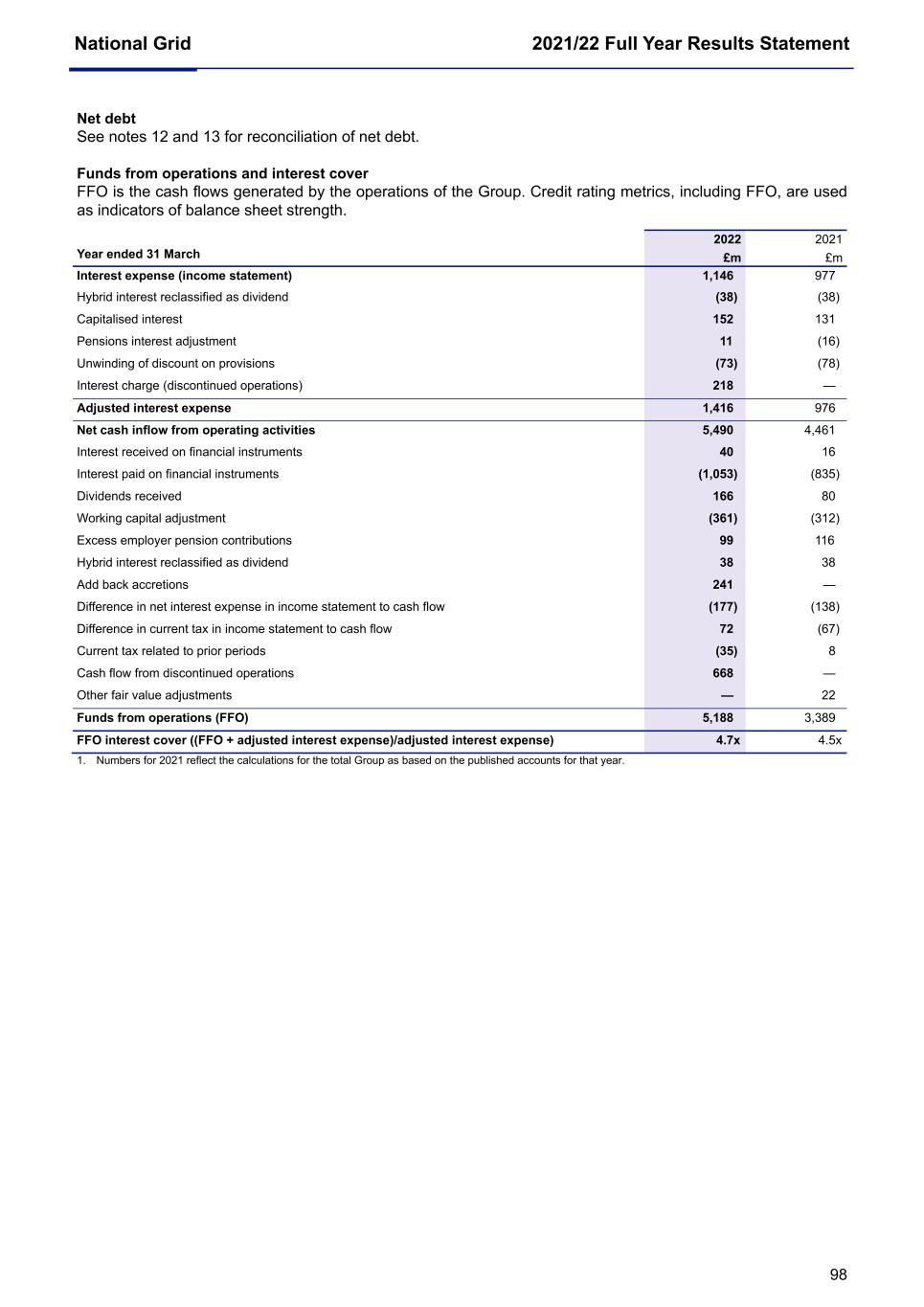
National Grid 2021/22 Full Year Results Statement 98 Net debt See notes 12 and 13 for reconciliation of net debt. Funds from operations and interest cover FFO is the cash flows generated by the operations of the Group. Credit rating metrics, including FFO, are used as indicators of balance sheet strength. Year ended 31 March 2022 2021 £m £m Interest expense (income statement) 1,146 977 Hybrid interest reclassified as dividend (38) (38) Capitalised interest 152 131 Pensions interest adjustment 11 (16) Unwinding of discount on provisions (73) (78) Interest charge (discontinued operations) 218 — Adjusted interest expense 1,416 976 Net cash inflow from operating activities 5,490 4,461 Interest received on financial instruments 40 16 Interest paid on financial instruments (1,053) (835) Dividends received 166 80 Working capital adjustment (361) (312) Excess employer pension contributions 99 116 Hybrid interest reclassified as dividend 38 38 Add back accretions 241 — Difference in net interest expense in income statement to cash flow (177) (138) Difference in current tax in income statement to cash flow 72 (67) Current tax related to prior periods (35) 8 Cash flow from discontinued operations 668 — Other fair value adjustments — 22 Funds from operations (FFO) 5,188 3,389 FFO interest cover ((FFO + adjusted interest expense)/adjusted interest expense) 4.7x 4.5x 1. Numbers for 2021 reflect the calculations for the total Group as based on the published accounts for that year.
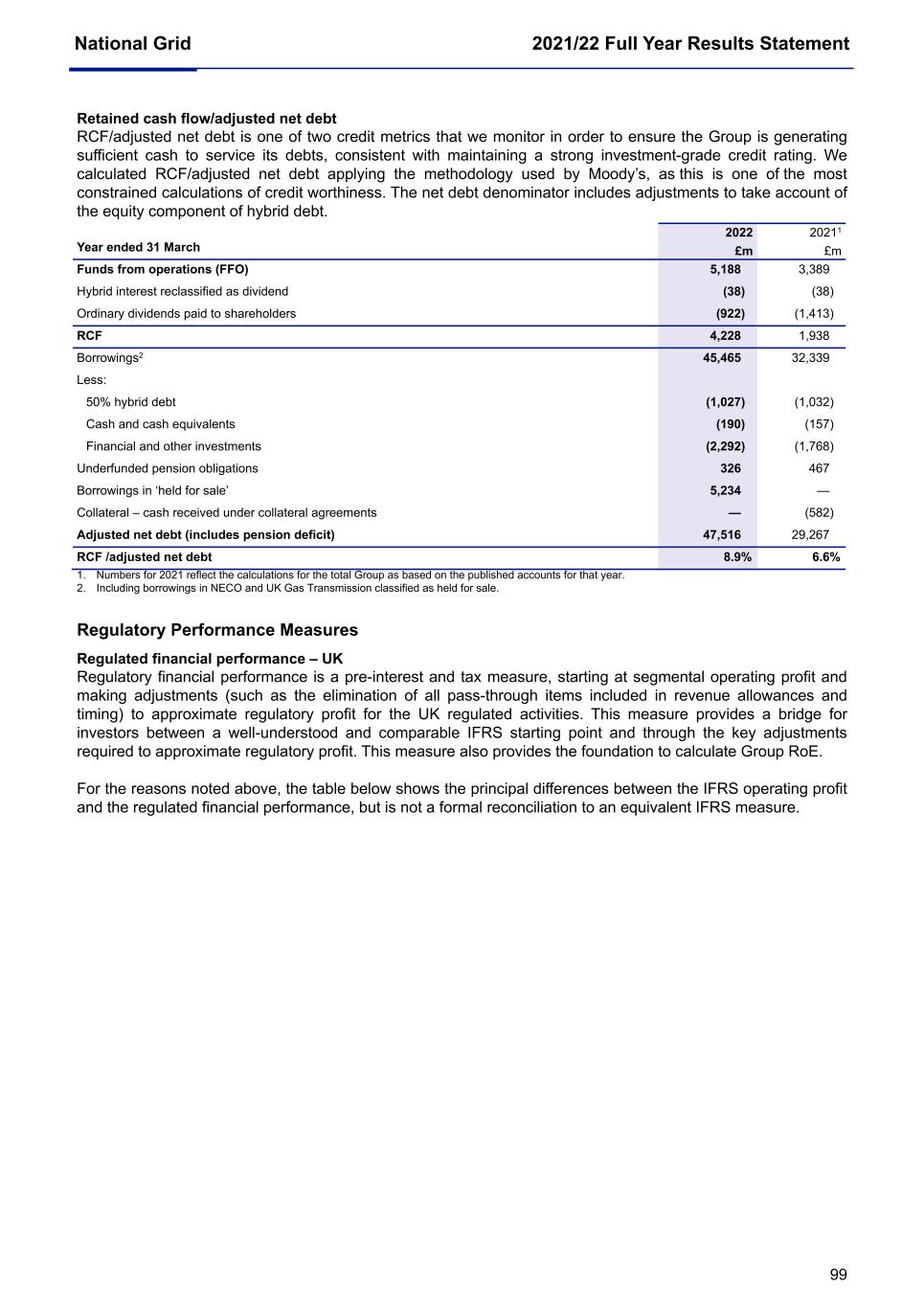
National Grid 2021/22 Full Year Results Statement 99 Retained cash flow/adjusted net debt RCF/adjusted net debt is one of two credit metrics that we monitor in order to ensure the Group is generating sufficient cash to service its debts, consistent with maintaining a strong investment-grade credit rating. We calculated RCF/adjusted net debt applying the methodology used by Moody’s, as this is one of the most constrained calculations of credit worthiness. The net debt denominator includes adjustments to take account of the equity component of hybrid debt. Year ended 31 March 2022 20211 £m £m Funds from operations (FFO) 5,188 3,389 Hybrid interest reclassified as dividend (38) (38) Ordinary dividends paid to shareholders (922) (1,413) RCF 4,228 1,938 Borrowings2 45,465 32,339 Less: 50% hybrid debt (1,027) (1,032) Cash and cash equivalents (190) (157) Financial and other investments (2,292) (1,768) Underfunded pension obligations 326 467 Borrowings in ‘held for sale’ 5,234 — Collateral – cash received under collateral agreements — (582) Adjusted net debt (includes pension deficit) 47,516 29,267 RCF /adjusted net debt 8.9% 6.6% 1. Numbers for 2021 reflect the calculations for the total Group as based on the published accounts for that year. 2. Including borrowings in NECO and UK Gas Transmission classified as held for sale. Regulatory Performance Measures Regulated financial performance – UK Regulatory financial performance is a pre-interest and tax measure, starting at segmental operating profit and making adjustments (such as the elimination of all pass-through items included in revenue allowances and timing) to approximate regulatory profit for the UK regulated activities. This measure provides a bridge for investors between a well-understood and comparable IFRS starting point and through the key adjustments required to approximate regulatory profit. This measure also provides the foundation to calculate Group RoE. For the reasons noted above, the table below shows the principal differences between the IFRS operating profit and the regulated financial performance, but is not a formal reconciliation to an equivalent IFRS measure.
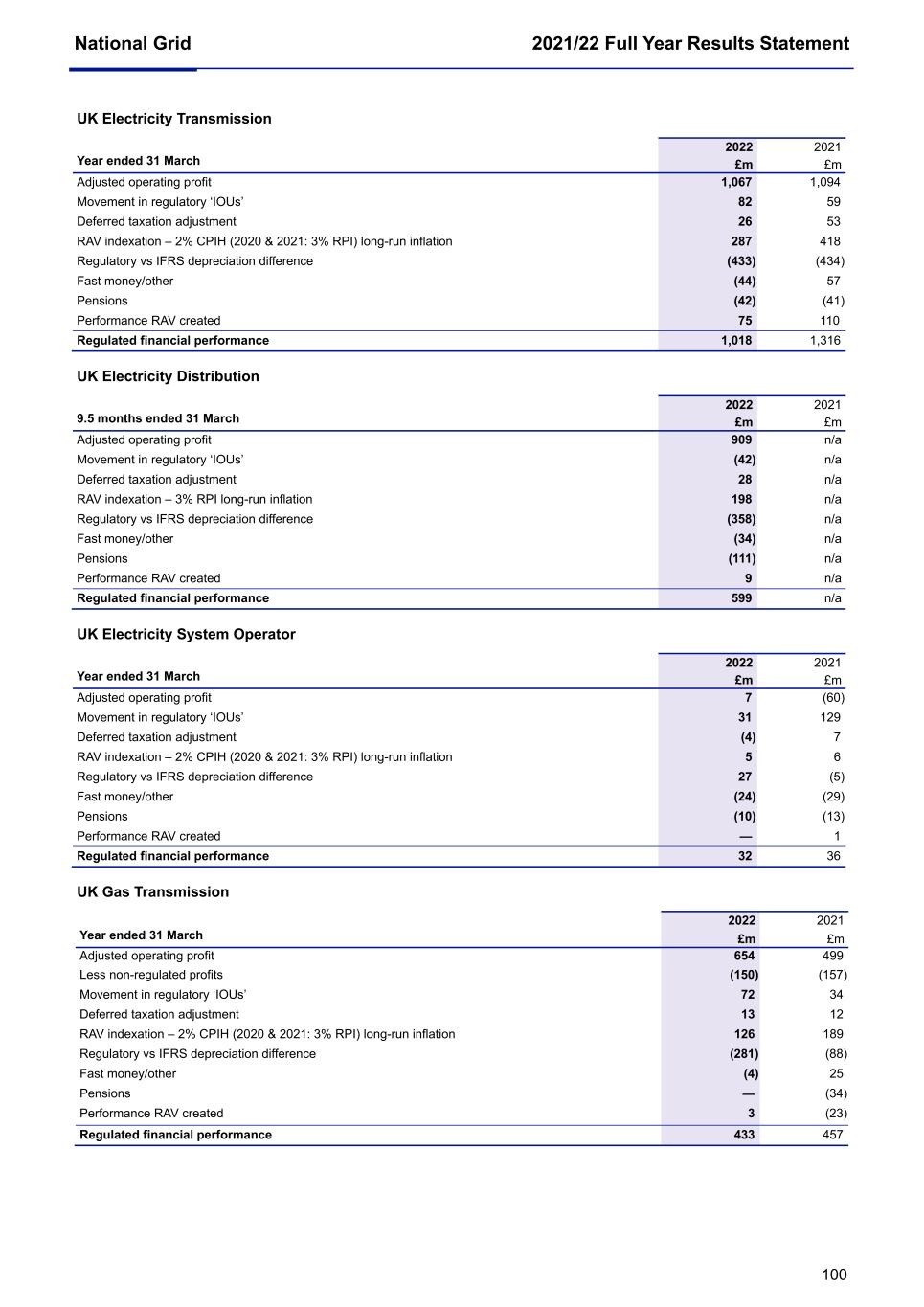
National Grid 2021/22 Full Year Results Statement 100 UK Electricity Transmission Year ended 31 March 2022 2021 £m £m Adjusted operating profit 1,067 1,094 Movement in regulatory ‘IOUs’ 82 59 Deferred taxation adjustment 26 53 RAV indexation – 2% CPIH (2020 & 2021: 3% RPI) long-run inflation 287 418 Regulatory vs IFRS depreciation difference (433) (434) Fast money/other (44) 57 Pensions (42) (41) Performance RAV created 75 110 Regulated financial performance 1,018 1,316 UK Electricity Distribution 9.5 months ended 31 March 2022 2021 £m £m Adjusted operating profit 909 n/a Movement in regulatory ‘IOUs’ (42) n/a Deferred taxation adjustment 28 n/a RAV indexation – 3% RPI long-run inflation 198 n/a Regulatory vs IFRS depreciation difference (358) n/a Fast money/other (34) n/a Pensions (111) n/a Performance RAV created 9 n/a Regulated financial performance 599 n/a UK Electricity System Operator Year ended 31 March 2022 2021 £m £m Adjusted operating profit 7 (60) Movement in regulatory ‘IOUs’ 31 129 Deferred taxation adjustment (4) 7 RAV indexation – 2% CPIH (2020 & 2021: 3% RPI) long-run inflation 5 6 Regulatory vs IFRS depreciation difference 27 (5) Fast money/other (24) (29) Pensions (10) (13) Performance RAV created — 1 Regulated financial performance 32 36 UK Gas Transmission Year ended 31 March 2022 2021 £m £m Adjusted operating profit 654 499 Less non-regulated profits (150) (157) Movement in regulatory ‘IOUs’ 72 34 Deferred taxation adjustment 13 12 RAV indexation – 2% CPIH (2020 & 2021: 3% RPI) long-run inflation 126 189 Regulatory vs IFRS depreciation difference (281) (88) Fast money/other (4) 25 Pensions — (34) Performance RAV created 3 (23) Regulated financial performance 433 457
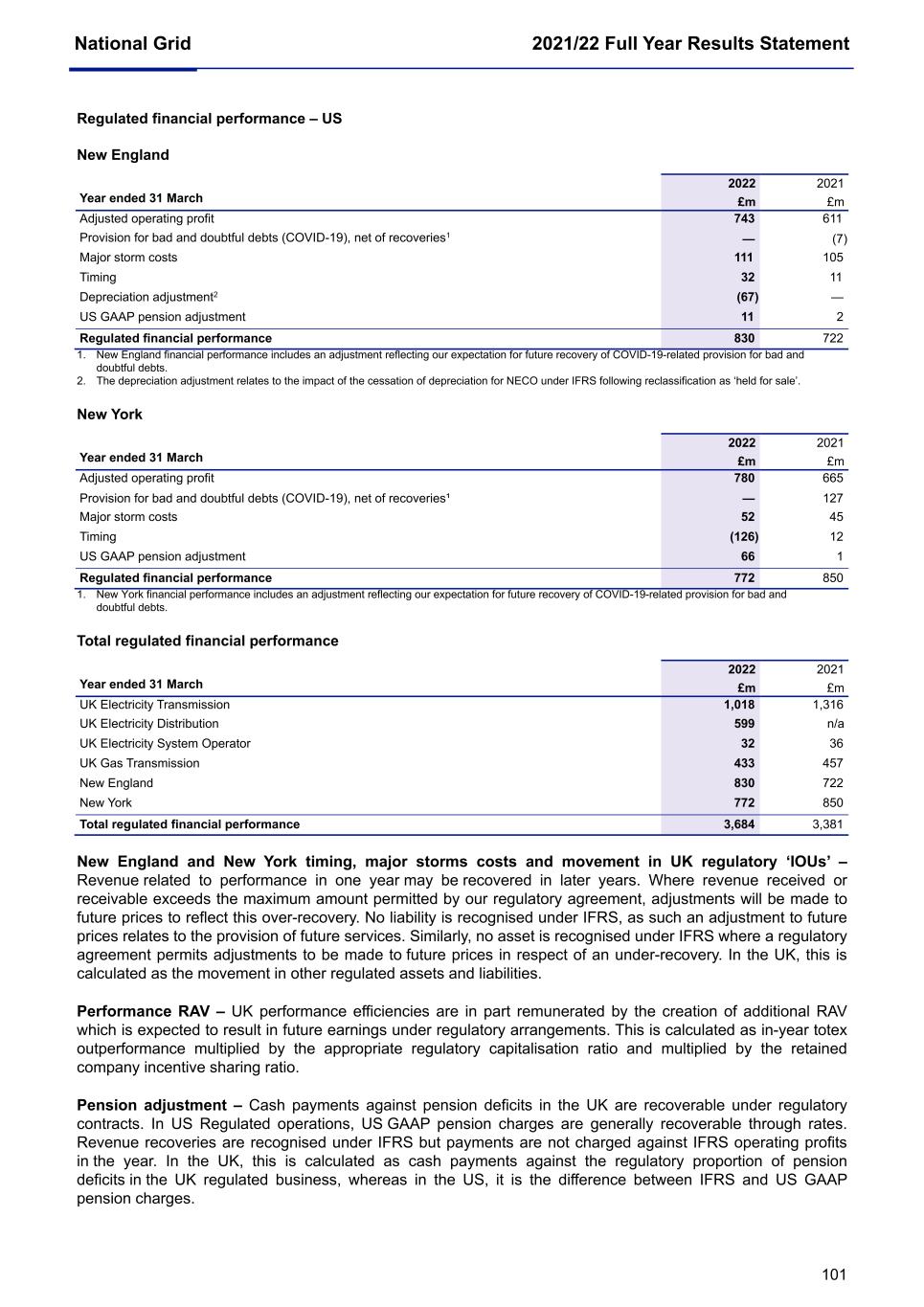
National Grid 2021/22 Full Year Results Statement 101 Regulated financial performance – US New England Year ended 31 March 2022 2021 £m £m Adjusted operating profit 743 611 Provision for bad and doubtful debts (COVID-19), net of recoveries1 — (7) Major storm costs 111 105 Timing 32 11 Depreciation adjustment2 (67) — US GAAP pension adjustment 11 2 Regulated financial performance 830 722 1. New England financial performance includes an adjustment reflecting our expectation for future recovery of COVID-19-related provision for bad and doubtful debts. 2. The depreciation adjustment relates to the impact of the cessation of depreciation for NECO under IFRS following reclassification as ‘held for sale’. New York Year ended 31 March 2022 2021 £m £m Adjusted operating profit 780 665 Provision for bad and doubtful debts (COVID-19), net of recoveries¹ — 127 Major storm costs 52 45 Timing (126) 12 US GAAP pension adjustment 66 1 Regulated financial performance 772 850 1. New York financial performance includes an adjustment reflecting our expectation for future recovery of COVID-19-related provision for bad and doubtful debts. Total regulated financial performance Year ended 31 March 2022 2021 £m £m UK Electricity Transmission 1,018 1,316 UK Electricity Distribution 599 n/a UK Electricity System Operator 32 36 UK Gas Transmission 433 457 New England 830 722 New York 772 850 Total regulated financial performance 3,684 3,381 New England and New York timing, major storms costs and movement in UK regulatory ‘IOUs’ – Revenue related to performance in one year may be recovered in later years. Where revenue received or receivable exceeds the maximum amount permitted by our regulatory agreement, adjustments will be made to future prices to reflect this over-recovery. No liability is recognised under IFRS, as such an adjustment to future prices relates to the provision of future services. Similarly, no asset is recognised under IFRS where a regulatory agreement permits adjustments to be made to future prices in respect of an under-recovery. In the UK, this is calculated as the movement in other regulated assets and liabilities. Performance RAV – UK performance efficiencies are in part remunerated by the creation of additional RAV which is expected to result in future earnings under regulatory arrangements. This is calculated as in-year totex outperformance multiplied by the appropriate regulatory capitalisation ratio and multiplied by the retained company incentive sharing ratio. Pension adjustment – Cash payments against pension deficits in the UK are recoverable under regulatory contracts. In US Regulated operations, US GAAP pension charges are generally recoverable through rates. Revenue recoveries are recognised under IFRS but payments are not charged against IFRS operating profits in the year. In the UK, this is calculated as cash payments against the regulatory proportion of pension deficits in the UK regulated business, whereas in the US, it is the difference between IFRS and US GAAP pension charges.
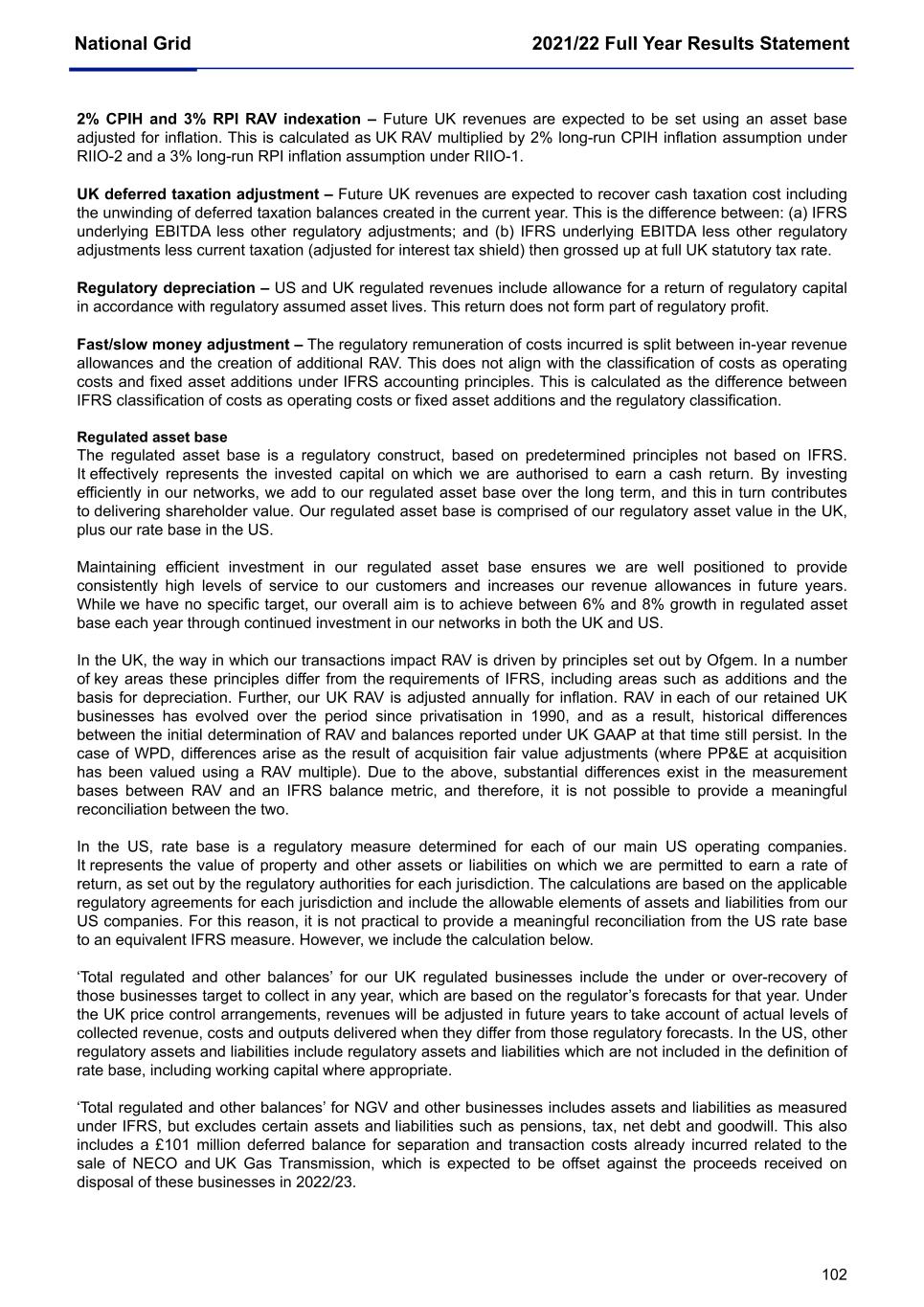
National Grid 2021/22 Full Year Results Statement 102 2% CPIH and 3% RPI RAV indexation – Future UK revenues are expected to be set using an asset base adjusted for inflation. This is calculated as UK RAV multiplied by 2% long-run CPIH inflation assumption under RIIO-2 and a 3% long-run RPI inflation assumption under RIIO-1. UK deferred taxation adjustment – Future UK revenues are expected to recover cash taxation cost including the unwinding of deferred taxation balances created in the current year. This is the difference between: (a) IFRS underlying EBITDA less other regulatory adjustments; and (b) IFRS underlying EBITDA less other regulatory adjustments less current taxation (adjusted for interest tax shield) then grossed up at full UK statutory tax rate. Regulatory depreciation – US and UK regulated revenues include allowance for a return of regulatory capital in accordance with regulatory assumed asset lives. This return does not form part of regulatory profit. Fast/slow money adjustment – The regulatory remuneration of costs incurred is split between in-year revenue allowances and the creation of additional RAV. This does not align with the classification of costs as operating costs and fixed asset additions under IFRS accounting principles. This is calculated as the difference between IFRS classification of costs as operating costs or fixed asset additions and the regulatory classification. Regulated asset base The regulated asset base is a regulatory construct, based on predetermined principles not based on IFRS. It effectively represents the invested capital on which we are authorised to earn a cash return. By investing efficiently in our networks, we add to our regulated asset base over the long term, and this in turn contributes to delivering shareholder value. Our regulated asset base is comprised of our regulatory asset value in the UK, plus our rate base in the US. Maintaining efficient investment in our regulated asset base ensures we are well positioned to provide consistently high levels of service to our customers and increases our revenue allowances in future years. While we have no specific target, our overall aim is to achieve between 6% and 8% growth in regulated asset base each year through continued investment in our networks in both the UK and US. In the UK, the way in which our transactions impact RAV is driven by principles set out by Ofgem. In a number of key areas these principles differ from the requirements of IFRS, including areas such as additions and the basis for depreciation. Further, our UK RAV is adjusted annually for inflation. RAV in each of our retained UK businesses has evolved over the period since privatisation in 1990, and as a result, historical differences between the initial determination of RAV and balances reported under UK GAAP at that time still persist. In the case of WPD, differences arise as the result of acquisition fair value adjustments (where PP&E at acquisition has been valued using a RAV multiple). Due to the above, substantial differences exist in the measurement bases between RAV and an IFRS balance metric, and therefore, it is not possible to provide a meaningful reconciliation between the two. In the US, rate base is a regulatory measure determined for each of our main US operating companies. It represents the value of property and other assets or liabilities on which we are permitted to earn a rate of return, as set out by the regulatory authorities for each jurisdiction. The calculations are based on the applicable regulatory agreements for each jurisdiction and include the allowable elements of assets and liabilities from our US companies. For this reason, it is not practical to provide a meaningful reconciliation from the US rate base to an equivalent IFRS measure. However, we include the calculation below. ‘Total regulated and other balances’ for our UK regulated businesses include the under or over-recovery of those businesses target to collect in any year, which are based on the regulator’s forecasts for that year. Under the UK price control arrangements, revenues will be adjusted in future years to take account of actual levels of collected revenue, costs and outputs delivered when they differ from those regulatory forecasts. In the US, other regulatory assets and liabilities include regulatory assets and liabilities which are not included in the definition of rate base, including working capital where appropriate. ‘Total regulated and other balances’ for NGV and other businesses includes assets and liabilities as measured under IFRS, but excludes certain assets and liabilities such as pensions, tax, net debt and goodwill. This also includes a £101 million deferred balance for separation and transaction costs already incurred related to the sale of NECO and UK Gas Transmission, which is expected to be offset against the proceeds received on disposal of these businesses in 2022/23.
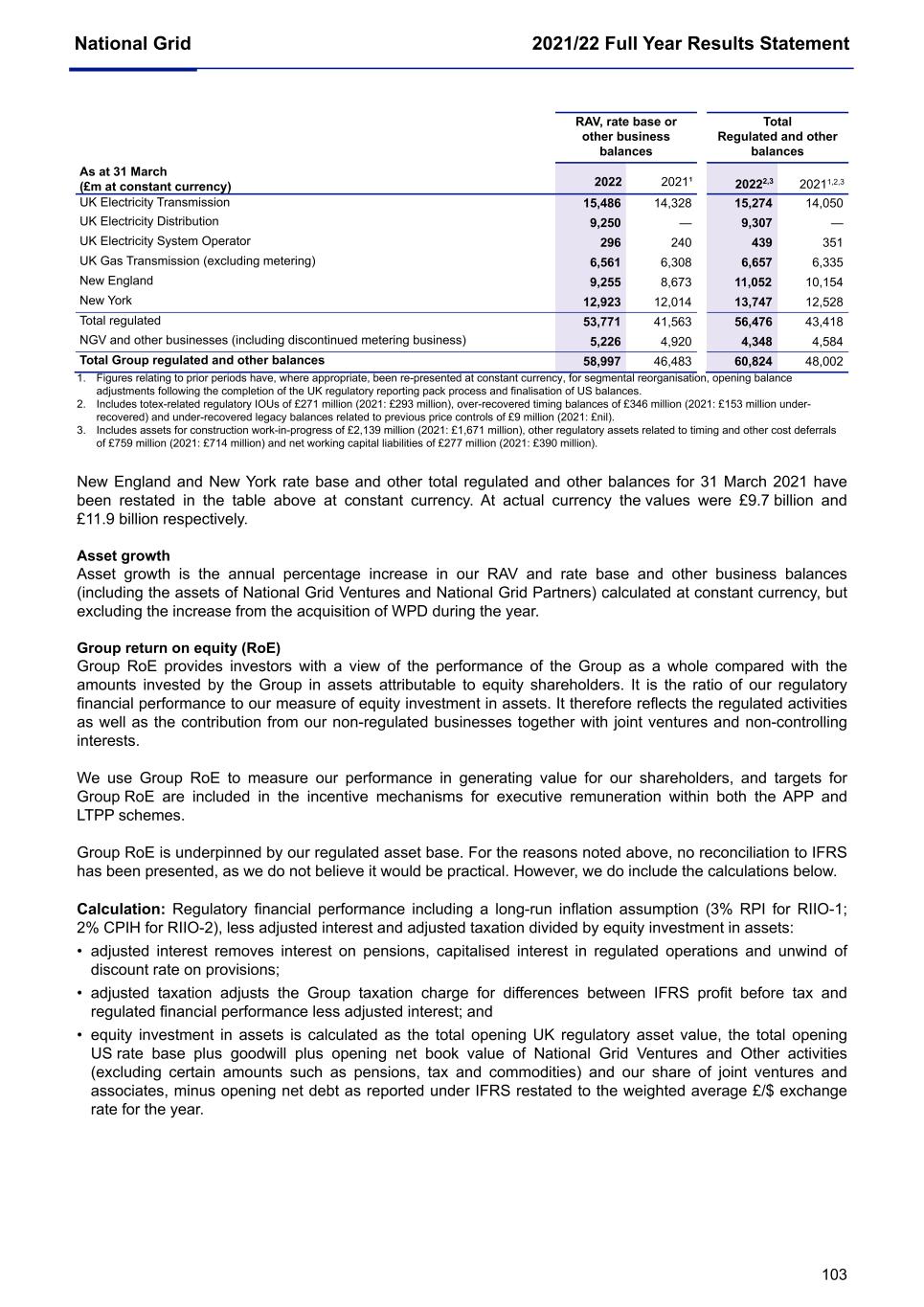
National Grid 2021/22 Full Year Results Statement 103 RAV, rate base or other business balances Total Regulated and other balances As at 31 March (£m at constant currency) 2022 2021¹ 20222,3 20211,2,3 UK Electricity Transmission 15,486 14,328 15,274 14,050 UK Electricity Distribution 9,250 — 9,307 — UK Electricity System Operator 296 240 439 351 UK Gas Transmission (excluding metering) 6,561 6,308 6,657 6,335 New England 9,255 8,673 11,052 10,154 New York 12,923 12,014 13,747 12,528 Total regulated 53,771 41,563 56,476 43,418 NGV and other businesses (including discontinued metering business) 5,226 4,920 4,348 4,584 Total Group regulated and other balances 58,997 46,483 60,824 48,002 1. Figures relating to prior periods have, where appropriate, been re-presented at constant currency, for segmental reorganisation, opening balance adjustments following the completion of the UK regulatory reporting pack process and finalisation of US balances. 2. Includes totex-related regulatory IOUs of £271 million (2021: £293 million), over-recovered timing balances of £346 million (2021: £153 million under- recovered) and under-recovered legacy balances related to previous price controls of £9 million (2021: £nil). 3. Includes assets for construction work-in-progress of £2,139 million (2021: £1,671 million), other regulatory assets related to timing and other cost deferrals of £759 million (2021: £714 million) and net working capital liabilities of £277 million (2021: £390 million). New England and New York rate base and other total regulated and other balances for 31 March 2021 have been restated in the table above at constant currency. At actual currency the values were £9.7 billion and £11.9 billion respectively. Asset growth Asset growth is the annual percentage increase in our RAV and rate base and other business balances (including the assets of National Grid Ventures and National Grid Partners) calculated at constant currency, but excluding the increase from the acquisition of WPD during the year. Group return on equity (RoE) Group RoE provides investors with a view of the performance of the Group as a whole compared with the amounts invested by the Group in assets attributable to equity shareholders. It is the ratio of our regulatory financial performance to our measure of equity investment in assets. It therefore reflects the regulated activities as well as the contribution from our non-regulated businesses together with joint ventures and non-controlling interests. We use Group RoE to measure our performance in generating value for our shareholders, and targets for Group RoE are included in the incentive mechanisms for executive remuneration within both the APP and LTPP schemes. Group RoE is underpinned by our regulated asset base. For the reasons noted above, no reconciliation to IFRS has been presented, as we do not believe it would be practical. However, we do include the calculations below. Calculation: Regulatory financial performance including a long-run inflation assumption (3% RPI for RIIO-1; 2% CPIH for RIIO-2), less adjusted interest and adjusted taxation divided by equity investment in assets: • adjusted interest removes interest on pensions, capitalised interest in regulated operations and unwind of discount rate on provisions; • adjusted taxation adjusts the Group taxation charge for differences between IFRS profit before tax and regulated financial performance less adjusted interest; and • equity investment in assets is calculated as the total opening UK regulatory asset value, the total opening US rate base plus goodwill plus opening net book value of National Grid Ventures and Other activities (excluding certain amounts such as pensions, tax and commodities) and our share of joint ventures and associates, minus opening net debt as reported under IFRS restated to the weighted average £/$ exchange rate for the year.
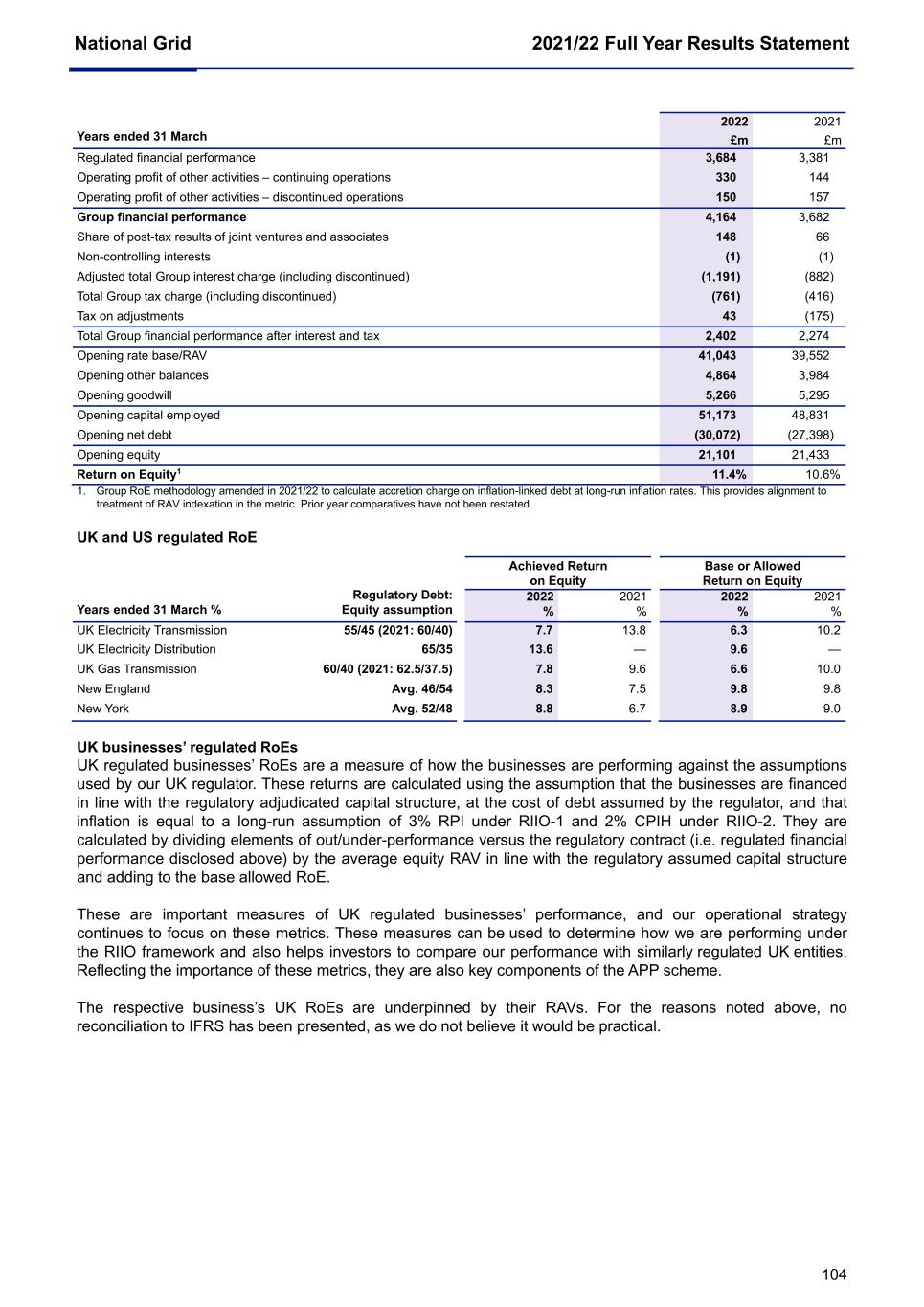
National Grid 2021/22 Full Year Results Statement 104 Years ended 31 March 2022 2021 £m £m Regulated financial performance 3,684 3,381 Operating profit of other activities – continuing operations 330 144 Operating profit of other activities – discontinued operations 150 157 Group financial performance 4,164 3,682 Share of post-tax results of joint ventures and associates 148 66 Non-controlling interests (1) (1) Adjusted total Group interest charge (including discontinued) (1,191) (882) Total Group tax charge (including discontinued) (761) (416) Tax on adjustments 43 (175) Total Group financial performance after interest and tax 2,402 2,274 Opening rate base/RAV 41,043 39,552 Opening other balances 4,864 3,984 Opening goodwill 5,266 5,295 Opening capital employed 51,173 48,831 Opening net debt (30,072) (27,398) Opening equity 21,101 21,433 Return on Equity1 11.4% 10.6% 1. Group RoE methodology amended in 2021/22 to calculate accretion charge on inflation-linked debt at long-run inflation rates. This provides alignment to treatment of RAV indexation in the metric. Prior year comparatives have not been restated. UK and US regulated RoE Years ended 31 March % Regulatory Debt: Equity assumption Achieved Return on Equity Base or Allowed Return on Equity 2022 % 2021 % 2022 % 2021 % UK Electricity Transmission 55/45 (2021: 60/40) 7.7 13.8 6.3 10.2 UK Electricity Distribution 65/35 13.6 — 9.6 — UK Gas Transmission 60/40 (2021: 62.5/37.5) 7.8 9.6 6.6 10.0 New England Avg. 46/54 8.3 7.5 9.8 9.8 New York Avg. 52/48 8.8 6.7 8.9 9.0 UK businesses’ regulated RoEs UK regulated businesses’ RoEs are a measure of how the businesses are performing against the assumptions used by our UK regulator. These returns are calculated using the assumption that the businesses are financed in line with the regulatory adjudicated capital structure, at the cost of debt assumed by the regulator, and that inflation is equal to a long-run assumption of 3% RPI under RIIO-1 and 2% CPIH under RIIO-2. They are calculated by dividing elements of out/under-performance versus the regulatory contract (i.e. regulated financial performance disclosed above) by the average equity RAV in line with the regulatory assumed capital structure and adding to the base allowed RoE. These are important measures of UK regulated businesses’ performance, and our operational strategy continues to focus on these metrics. These measures can be used to determine how we are performing under the RIIO framework and also helps investors to compare our performance with similarly regulated UK entities. Reflecting the importance of these metrics, they are also key components of the APP scheme. The respective business’s UK RoEs are underpinned by their RAVs. For the reasons noted above, no reconciliation to IFRS has been presented, as we do not believe it would be practical.
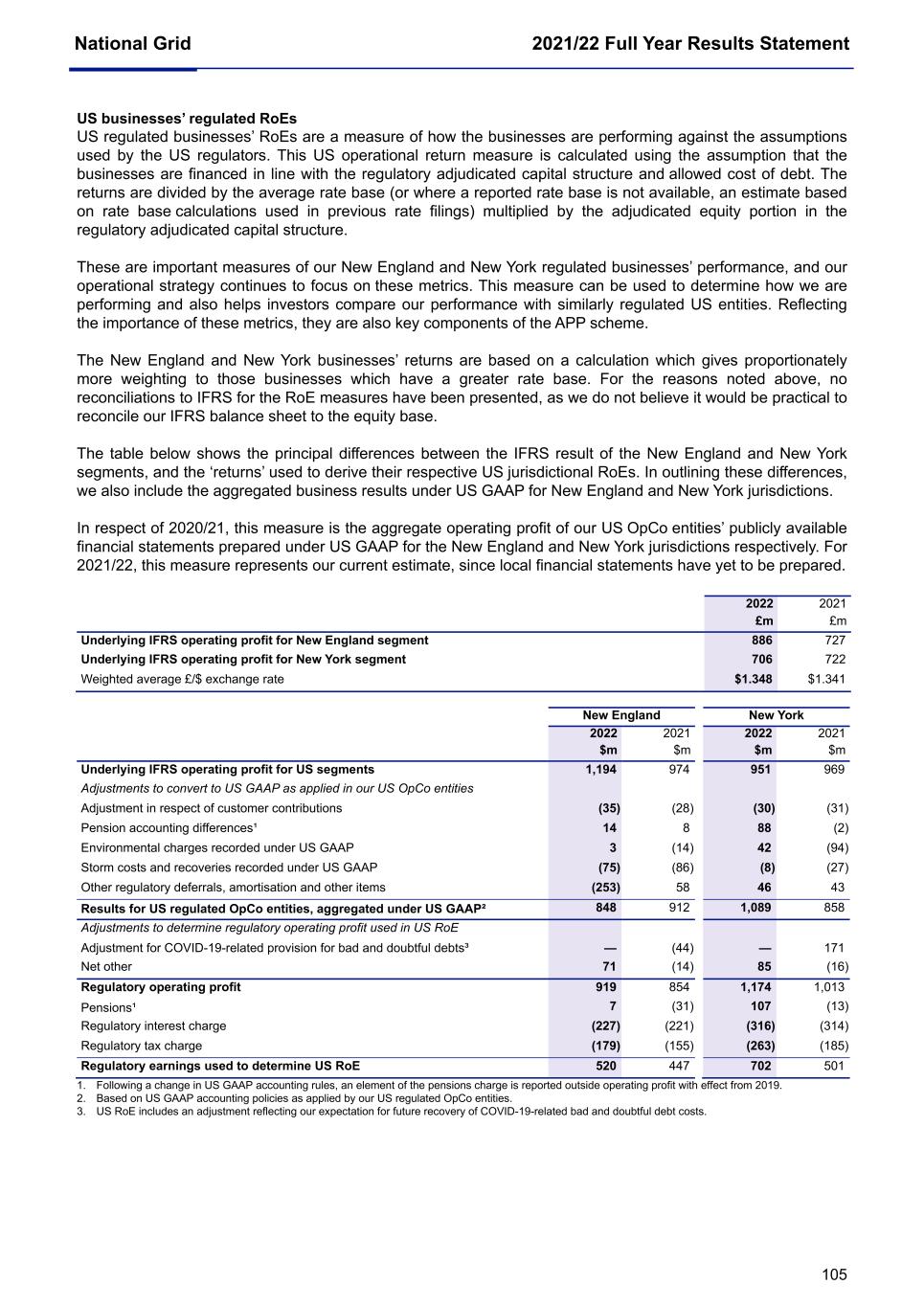
National Grid 2021/22 Full Year Results Statement 105 US businesses’ regulated RoEs US regulated businesses’ RoEs are a measure of how the businesses are performing against the assumptions used by the US regulators. This US operational return measure is calculated using the assumption that the businesses are financed in line with the regulatory adjudicated capital structure and allowed cost of debt. The returns are divided by the average rate base (or where a reported rate base is not available, an estimate based on rate base calculations used in previous rate filings) multiplied by the adjudicated equity portion in the regulatory adjudicated capital structure. These are important measures of our New England and New York regulated businesses’ performance, and our operational strategy continues to focus on these metrics. This measure can be used to determine how we are performing and also helps investors compare our performance with similarly regulated US entities. Reflecting the importance of these metrics, they are also key components of the APP scheme. The New England and New York businesses’ returns are based on a calculation which gives proportionately more weighting to those businesses which have a greater rate base. For the reasons noted above, no reconciliations to IFRS for the RoE measures have been presented, as we do not believe it would be practical to reconcile our IFRS balance sheet to the equity base. The table below shows the principal differences between the IFRS result of the New England and New York segments, and the ‘returns’ used to derive their respective US jurisdictional RoEs. In outlining these differences, we also include the aggregated business results under US GAAP for New England and New York jurisdictions. In respect of 2020/21, this measure is the aggregate operating profit of our US OpCo entities’ publicly available financial statements prepared under US GAAP for the New England and New York jurisdictions respectively. For 2021/22, this measure represents our current estimate, since local financial statements have yet to be prepared. 2022 2021 £m £m Underlying IFRS operating profit for New England segment 886 727 Underlying IFRS operating profit for New York segment 706 722 Weighted average £/$ exchange rate $1.348 $1.341 New England New York 2022 2021 2022 2021 $m $m $m $m Underlying IFRS operating profit for US segments 1,194 974 951 969 Adjustments to convert to US GAAP as applied in our US OpCo entities Adjustment in respect of customer contributions (35) (28) (30) (31) Pension accounting differences¹ 14 8 88 (2) Environmental charges recorded under US GAAP 3 (14) 42 (94) Storm costs and recoveries recorded under US GAAP (75) (86) (8) (27) Other regulatory deferrals, amortisation and other items (253) 58 46 43 Results for US regulated OpCo entities, aggregated under US GAAP² 848 912 1,089 858 Adjustments to determine regulatory operating profit used in US RoE Adjustment for COVID-19-related provision for bad and doubtful debts³ — (44) — 171 Net other 71 (14) 85 (16) Regulatory operating profit 919 854 1,174 1,013 Pensions¹ 7 (31) 107 (13) Regulatory interest charge (227) (221) (316) (314) Regulatory tax charge (179) (155) (263) (185) Regulatory earnings used to determine US RoE 520 447 702 501 1. Following a change in US GAAP accounting rules, an element of the pensions charge is reported outside operating profit with effect from 2019. 2. Based on US GAAP accounting policies as applied by our US regulated OpCo entities. 3. US RoE includes an adjustment reflecting our expectation for future recovery of COVID-19-related bad and doubtful debt costs.
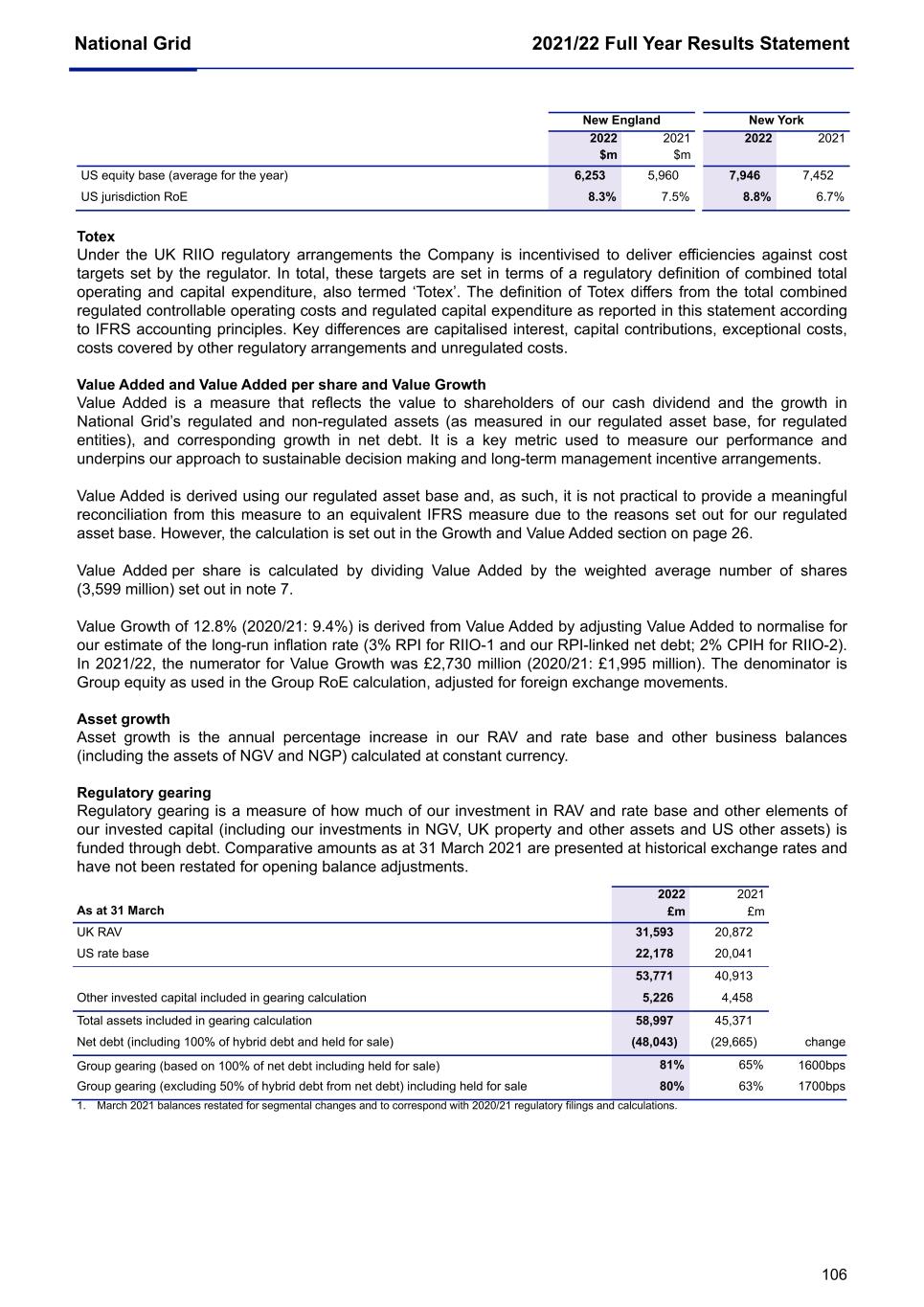
National Grid 2021/22 Full Year Results Statement 106 New England New York 2022 2021 2022 2021 $m $m US equity base (average for the year) 6,253 5,960 7,946 7,452 US jurisdiction RoE 8.3% 7.5% 8.8% 6.7% Totex Under the UK RIIO regulatory arrangements the Company is incentivised to deliver efficiencies against cost targets set by the regulator. In total, these targets are set in terms of a regulatory definition of combined total operating and capital expenditure, also termed ‘Totex’. The definition of Totex differs from the total combined regulated controllable operating costs and regulated capital expenditure as reported in this statement according to IFRS accounting principles. Key differences are capitalised interest, capital contributions, exceptional costs, costs covered by other regulatory arrangements and unregulated costs. Value Added and Value Added per share and Value Growth Value Added is a measure that reflects the value to shareholders of our cash dividend and the growth in National Grid’s regulated and non-regulated assets (as measured in our regulated asset base, for regulated entities), and corresponding growth in net debt. It is a key metric used to measure our performance and underpins our approach to sustainable decision making and long-term management incentive arrangements. Value Added is derived using our regulated asset base and, as such, it is not practical to provide a meaningful reconciliation from this measure to an equivalent IFRS measure due to the reasons set out for our regulated asset base. However, the calculation is set out in the Growth and Value Added section on page 26. Value Added per share is calculated by dividing Value Added by the weighted average number of shares (3,599 million) set out in note 7. Value Growth of 12.8% (2020/21: 9.4%) is derived from Value Added by adjusting Value Added to normalise for our estimate of the long-run inflation rate (3% RPI for RIIO-1 and our RPI-linked net debt; 2% CPIH for RIIO-2). In 2021/22, the numerator for Value Growth was £2,730 million (2020/21: £1,995 million). The denominator is Group equity as used in the Group RoE calculation, adjusted for foreign exchange movements. Asset growth Asset growth is the annual percentage increase in our RAV and rate base and other business balances (including the assets of NGV and NGP) calculated at constant currency. Regulatory gearing Regulatory gearing is a measure of how much of our investment in RAV and rate base and other elements of our invested capital (including our investments in NGV, UK property and other assets and US other assets) is funded through debt. Comparative amounts as at 31 March 2021 are presented at historical exchange rates and have not been restated for opening balance adjustments. As at 31 March 2022 2021 £m £m UK RAV 31,593 20,872 US rate base 22,178 20,041 53,771 40,913 Other invested capital included in gearing calculation 5,226 4,458 Total assets included in gearing calculation 58,997 45,371 Net debt (including 100% of hybrid debt and held for sale) (48,043) (29,665) change Group gearing (based on 100% of net debt including held for sale) 81% 65% 1600bps Group gearing (excluding 50% of hybrid debt from net debt) including held for sale 80% 63% 1700bps 1. March 2021 balances restated for segmental changes and to correspond with 2020/21 regulatory filings and calculations.
Serious News for Serious Traders! Try StreetInsider.com Premium Free!
You May Also Be Interested In
- National Grid Opens Applications for DEI Engineering Scholarship and Internship Program
- GDRX INVESTOR ALERT: Robbins Geller Rudman & Dowd LLP Announces that GoodRx Holdings, Inc. Investors with Substantial Losses Have Opportunity to Lead the GoodRx Class Action Lawsuit
- Highline Recognizes Eleven Townships in Michigan’s Menominee County for being Designated as Smart Rural Communities
Create E-mail Alert Related Categories
SEC FilingsSign up for StreetInsider Free!
Receive full access to all new and archived articles, unlimited portfolio tracking, e-mail alerts, custom newswires and RSS feeds - and more!



 Tweet
Tweet Share
Share